|
| Working hours during the Easter Holidays |
|
We would like to inform you that due to the upcoming Easter Holidays, the Embassy of the Republic of Serbia in the Russian Federation will be closed on Friday, April 18, and on Monday, April 21. |
|
|
| Embassy closed on February 17th, 2025 |
|
Due to the national holiday - Statehood Day, Consular section of the Embassy will be closed on February 17th, 2025. |
|
|
| EMBASSY CLOSED FOR THE HOLIDAYS |
|
THE EMBASSY OF THE REPUBLIC OF SERBIA IN THE RUSSIAN FEDERATION WILL BE CLOSED FROM DECEMBER 30, 2024 TO JANUARY 8, 2025 DUE TO THE NEW YEAR AND CHRISTMAS HOLIDAYS IN THE REPUBLIC OF SERBIA AND THE RUSSIAN FEDERATION.
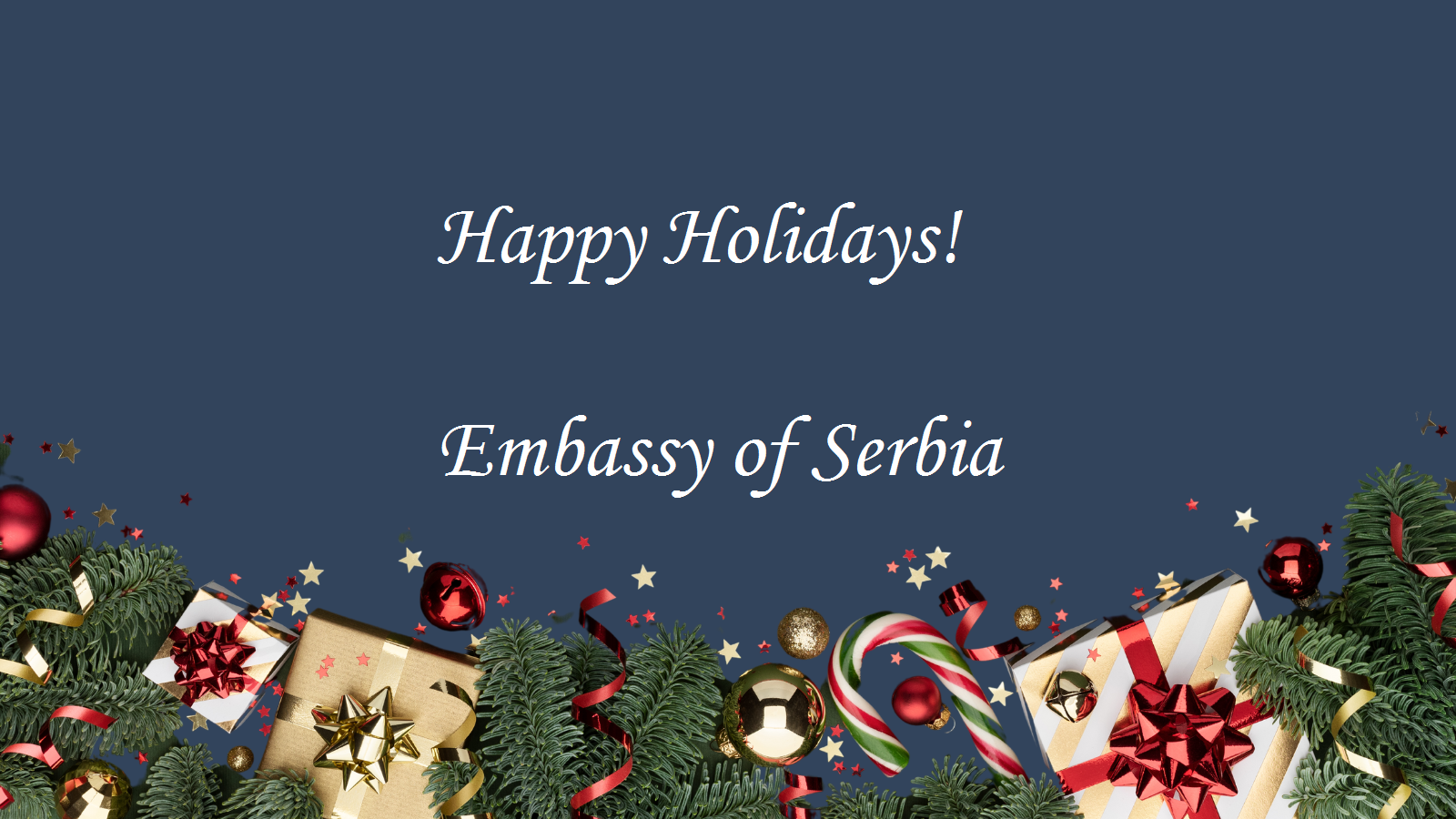 |
|
|
| New Year's program for children from the Serbian diaspora in Russia |
|
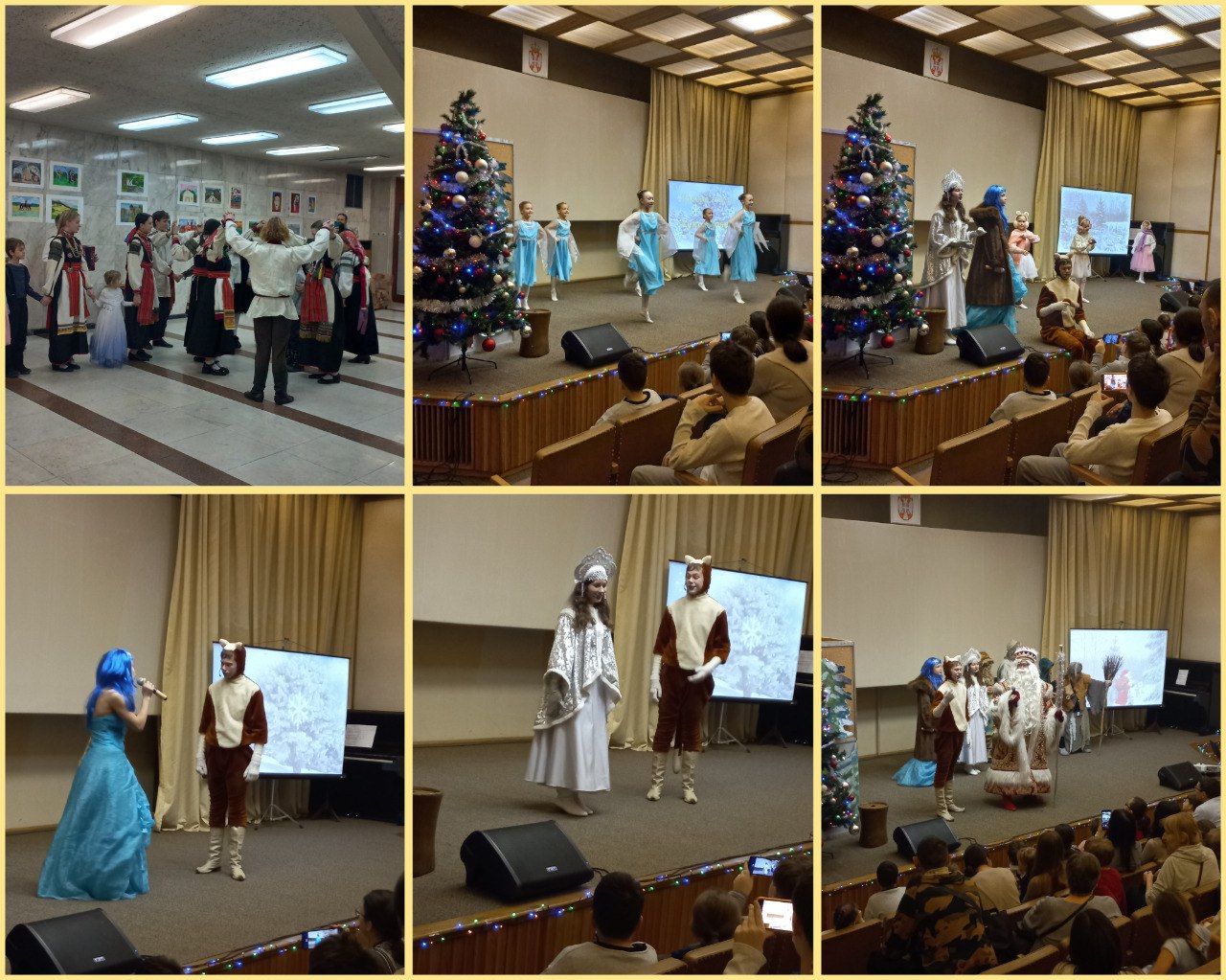
Our Embassy organized a New Year's program and distribution of holiday gifts for children of Serbian citizens living in Russia.
About 90 of our children enjoyed the New Year's fairy tale prepared for them by students and teachers of the M.A. Balakirev Children's Art School. Russian participants in the program were also pleased with New Year's gifts.
According to a long-standing tradition, this year New Year's gifts were provided by a Serbian businessman from Moscow, Mr. Goran Vukovic, to whom we are immensely grateful for his diligent, long-term support in organizing New Year's programs held in our Embassy for the Serbian children living in Russia. |
|
|
| Embassy closed on November 11th |
|
Due to the upcoming national holiday - Armistice Day, the Embassy will be closed on November 11th. |
|
|
| A BOOK OF CONDOLENCES OPENED AT THE EMBASSY OF THE REPUBLIC OF SERBIA |
|
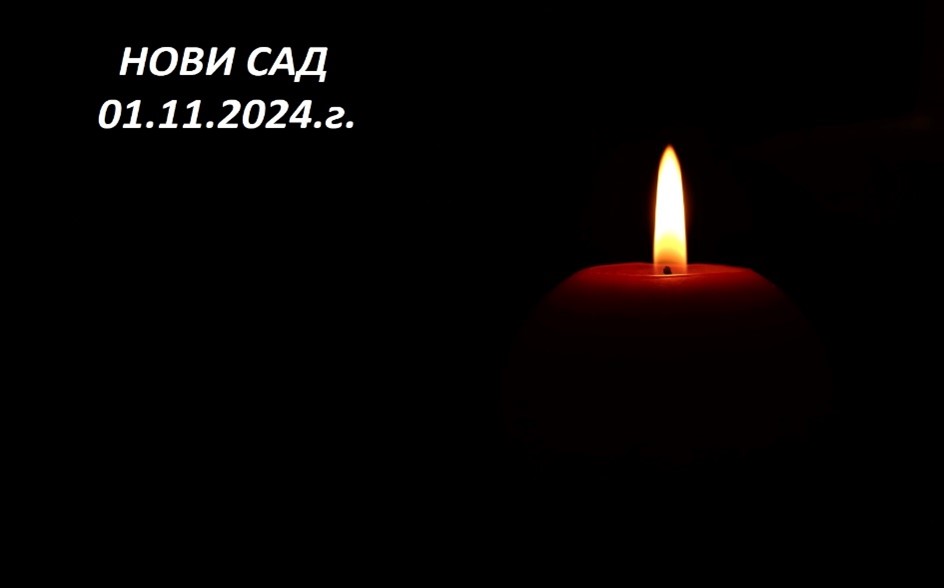
The Book of condolences will be opened at the Embassy of the Republic of Serbia from Saturday, November 2nd till Monday, November 4th, 2024, from 9:00 a.m. to 2:00 p.m in connection with the great tragedy that happened at the train station in the city of Novi Sad, where at least 14 people died and more than 30 people were injured. All of those who wish to send their condolences electronically can use the following e-mail address - ambasada.moskva@mfa.rs . |
|
|
| Embassy celebrates the 80th anniversary of the liberation of Belgrade in World War II |
|
On the occasion of the 80th anniversary of the liberation of Belgrade in World War II, the Embassy organized a reception on October 17, as well as a cultural and artistic multimedia program, followed by a buffet. Among the approximately 350 guests of honor, there were 50 war veterans, Deputy Prime Minister of the Republic of Serbia Aleksandar Vulin, Deputy Minister of Foreign Affairs of the Russian Federation Aleksandr Grushko, official representative of the Russian Foreign Ministry Maria Zakharova, the entire staff of the Fourth European Department of the Russian Foreign Ministry, senators of the Federation Council, members of the State Duma, high-ranking officials of the relevant ministries of the Russian Federation, representatives of the Governments of Moscow and St. Petersburg. Among the guests were the head of the Metochion of the Serbian Orthodox Church under the Moscow Patriarchate Bishop Stefan of Remesia, adviser to the Patriarch of Moscow and All Rus' Archpriest Nikolai Balashov, heads of several universities, libraries, representatives of Serbian and Russian business, the Nikola Tesla Association, as well as numerous Serbian students who helped the Embassy organize this event.
In addition to Ambassador Momčilo Babić, the Deputy Prime Minister of Serbia Aleksandar Vulin, Assistant to the Russian Foreign Ministry Aleksandr Grushko, State Duma deputy Maria Butina, and a high representative of the Moscow Council of Veterans, Colonel General R. Akchurin addressed the audience with an appropriate speech.
As part of the cultural and artistic program, the choir of the Academic Song and Dance Ensemble of the Russian Army named after A. V. Alexandrov and the Serbian graduate student of the Gnessin Russian Academy of Music Matija Stepanović performed.
The program and speeches by officials were accompanied by the broadcast of documentaries about the battles for the liberation of Belgrade, as well as original photo exibition testifying to the joint actions of the Red Army and Yugoslav, that is Serbian, partisans. The Embassy also hosted an exhibition of documentary photographs "Operation Belgrade 1944", which aroused great interest among those present.
Particular attention was drawn to the presence of a 102-year-old participant of the Second World War, Yekaterina Ivanovna Evdokimova, who expressed her deep gratitude to the Ambassador and the staff of the Embassy for the exceptional program with an abundance of documentary material that reminded her of the war days.
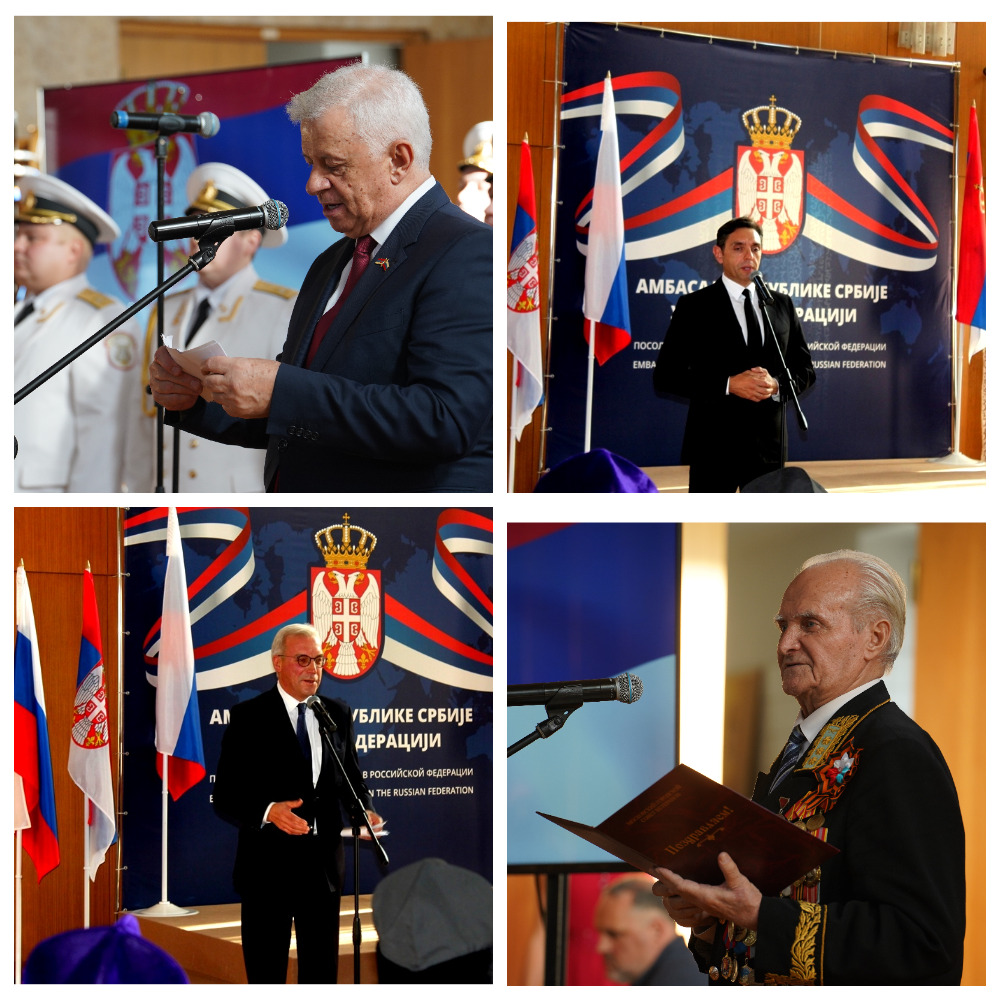
.jpg)
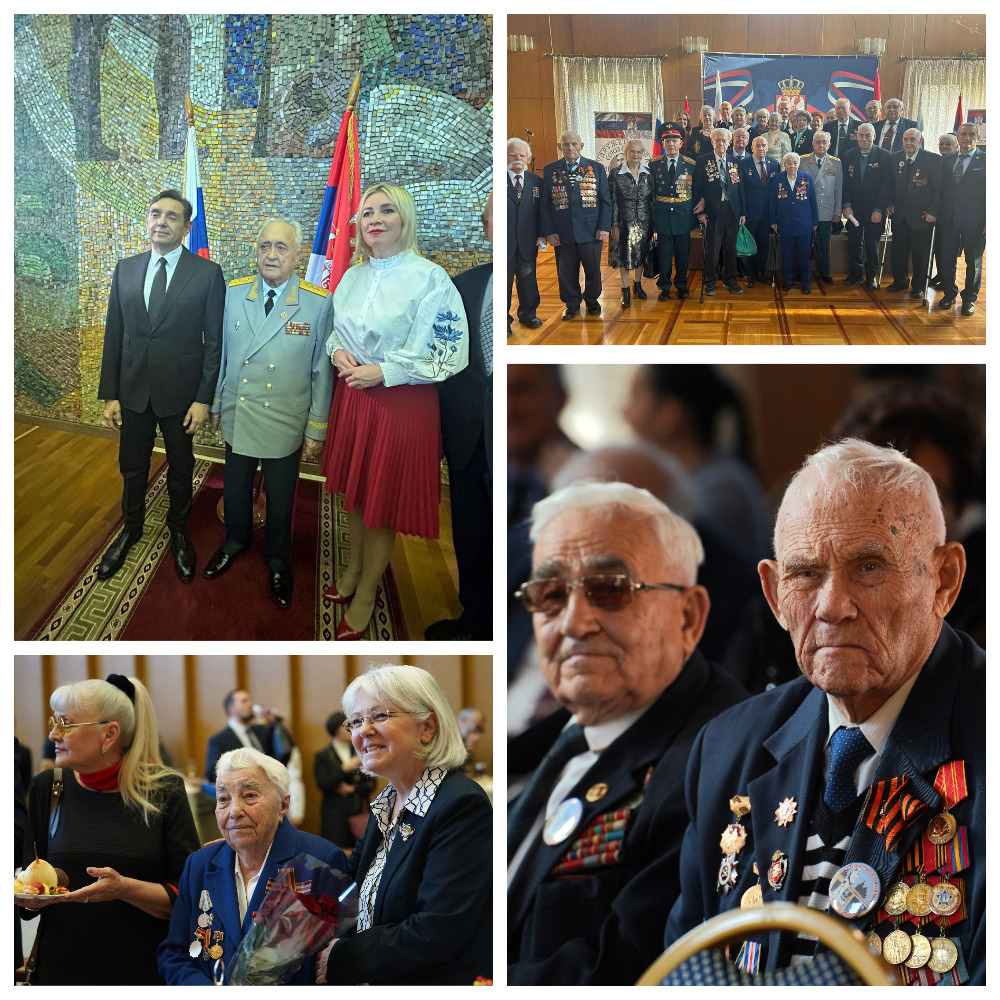 |
|
|
| Ambassador Babic meets the director of the Alexandrinsky Theater Sergey Emelyanov |
|
Ambassador Babic met with the director of the National Dramatic Theater of Russia (Aleksandrinsky Theater) Sergey Emelyanov, with whom he discussed the improvement of cooperation between the theaters of Serbia and Russia.
The interlocutors noted with satisfaction that the cooperation between the Alexandrinsky Theater and the National Theater in Belgrade is developing intensively and in several directions after the signing of the Agreement on Cooperation in March 2023.
At the meeting, the commitment to the improvement of cooperation in the sphere of culture was expressed with the goal of improvement, preservation and development of theatrical art, and preservation of cultural and historical heritage.
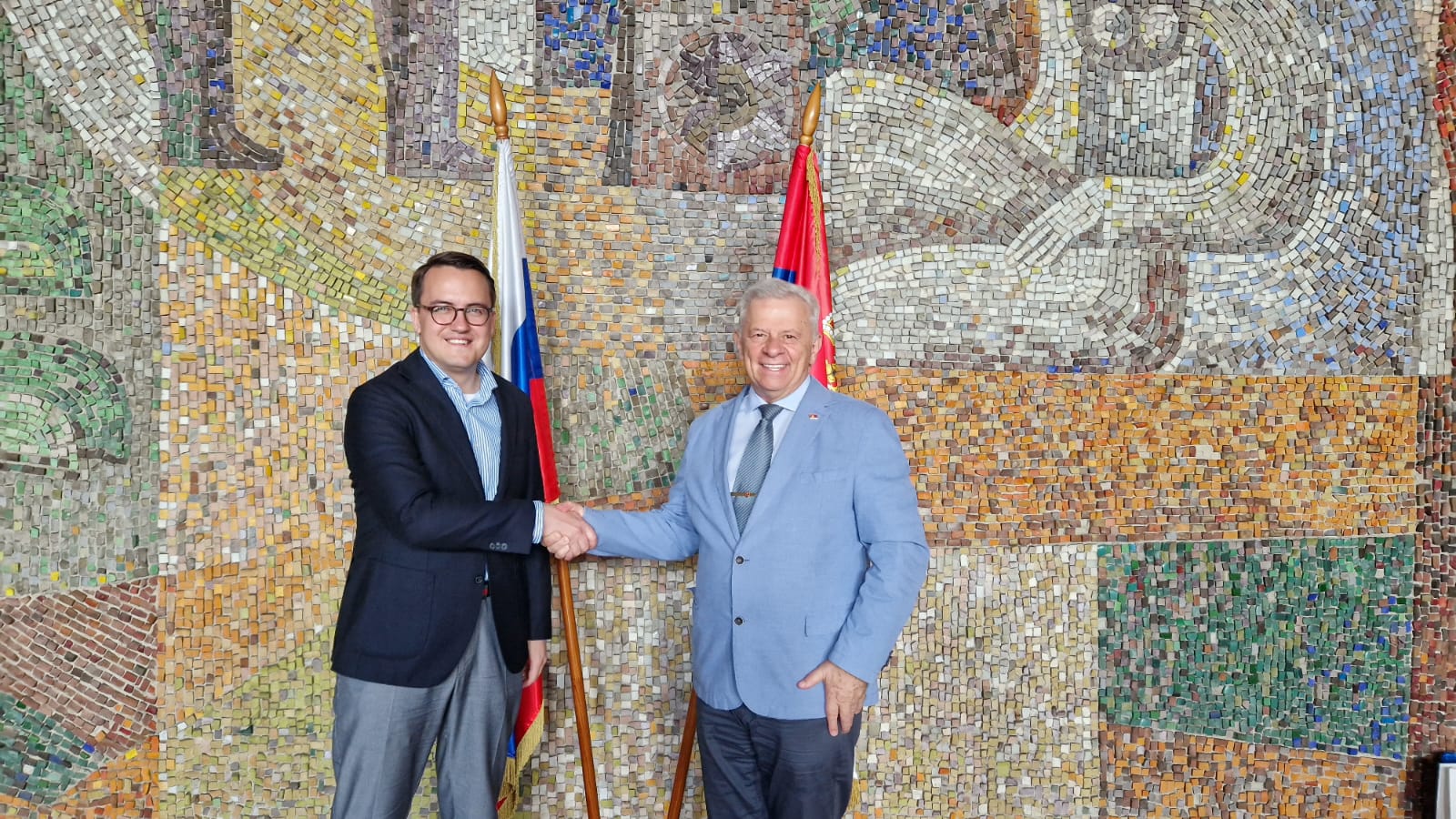
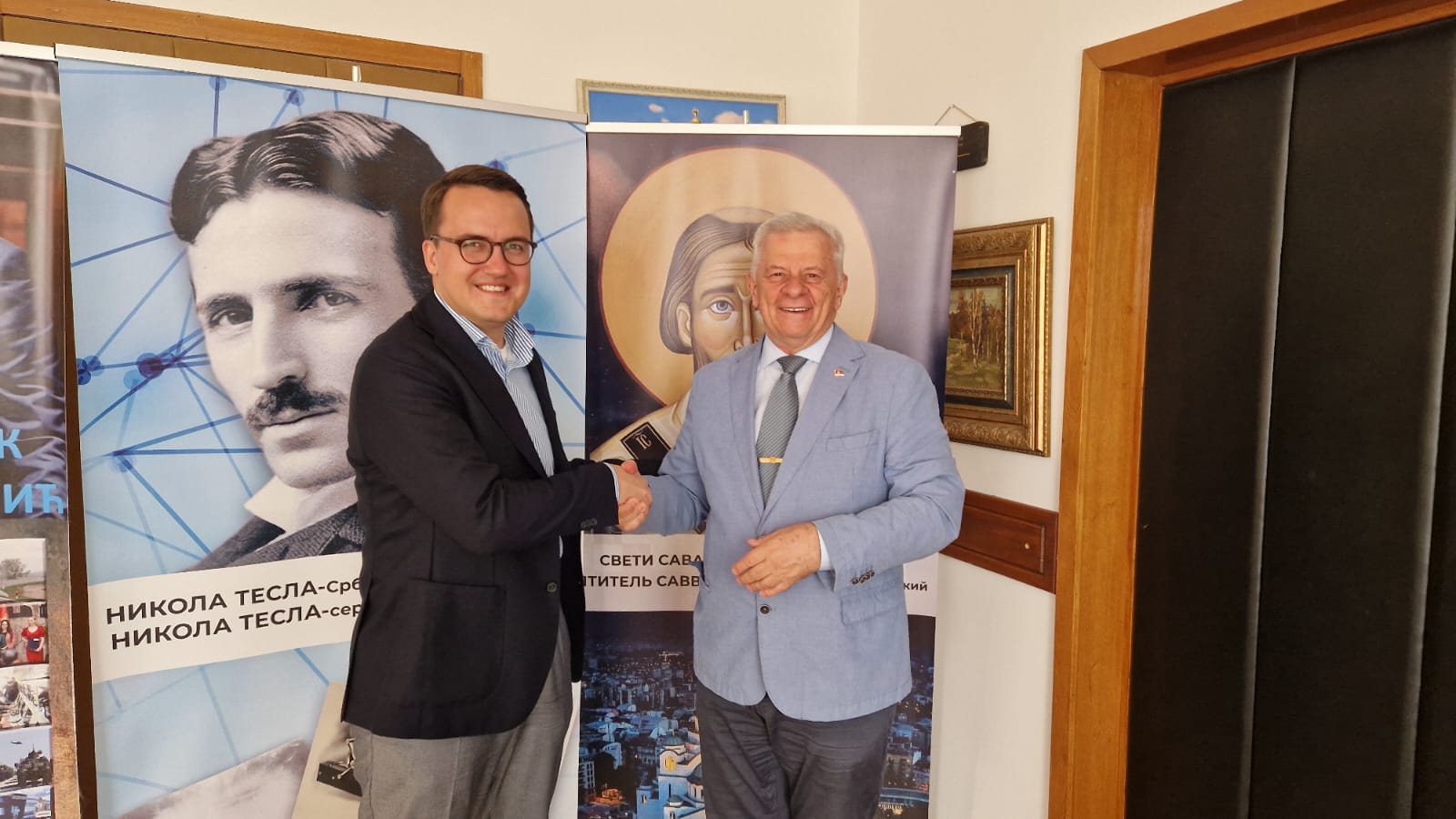 |
|
|
| 17th cross-country race of the Radio-television of Serbia in Moscow |
|
The 17th cross-country race of the Radio-television of Serbia for children and parents in the diaspora was held in Moscow on June 2nd. This year the event, which has traditionally been supported from the very beginning by the Embassy of the Republic of Serbia, was opened by Vice-Consul M. Voroncova. The largest sporting event for the diaspora brought together about a hundred children with their parents. This year's special guest was judge Dаlibor Djurdevic.
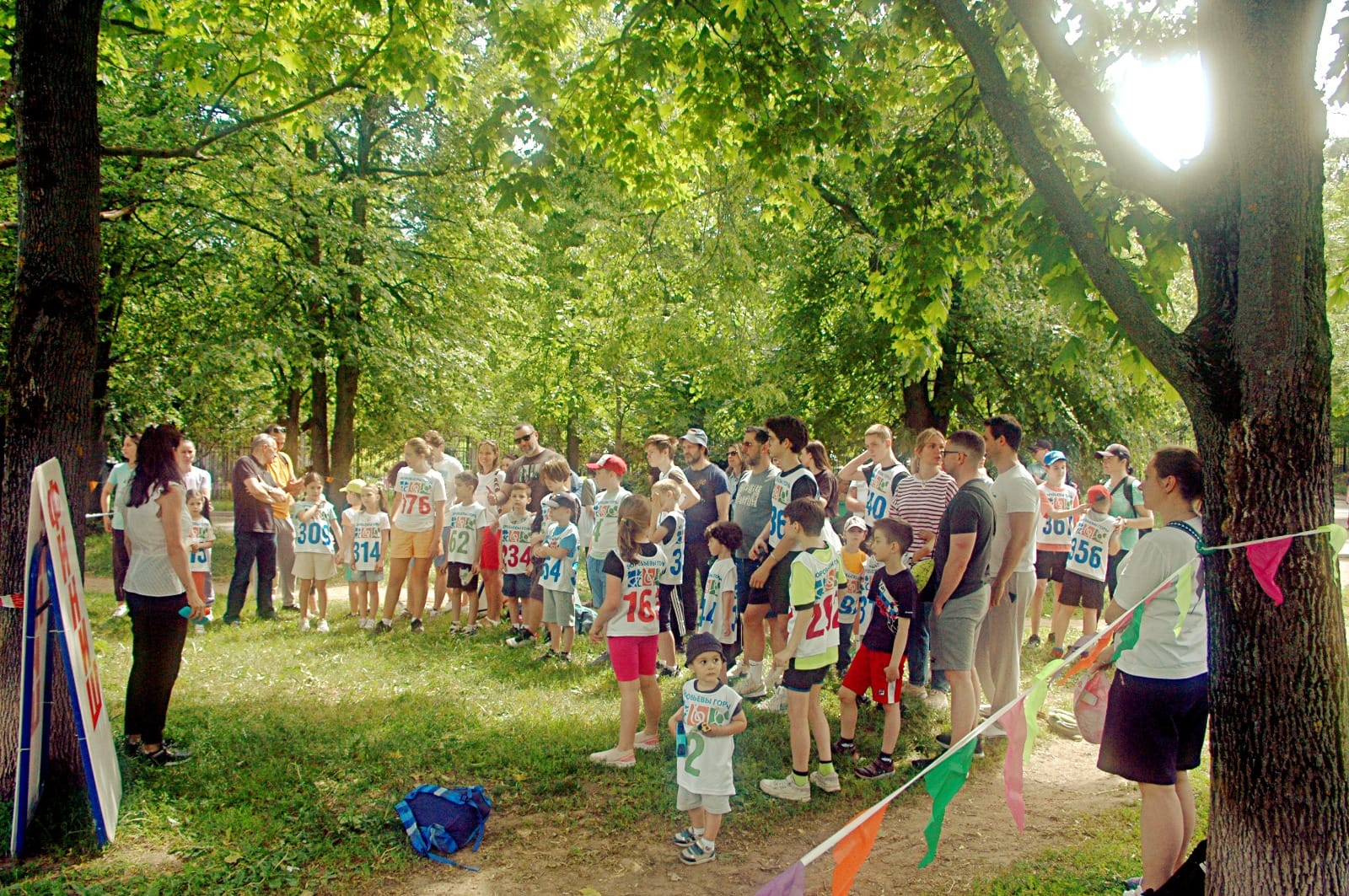
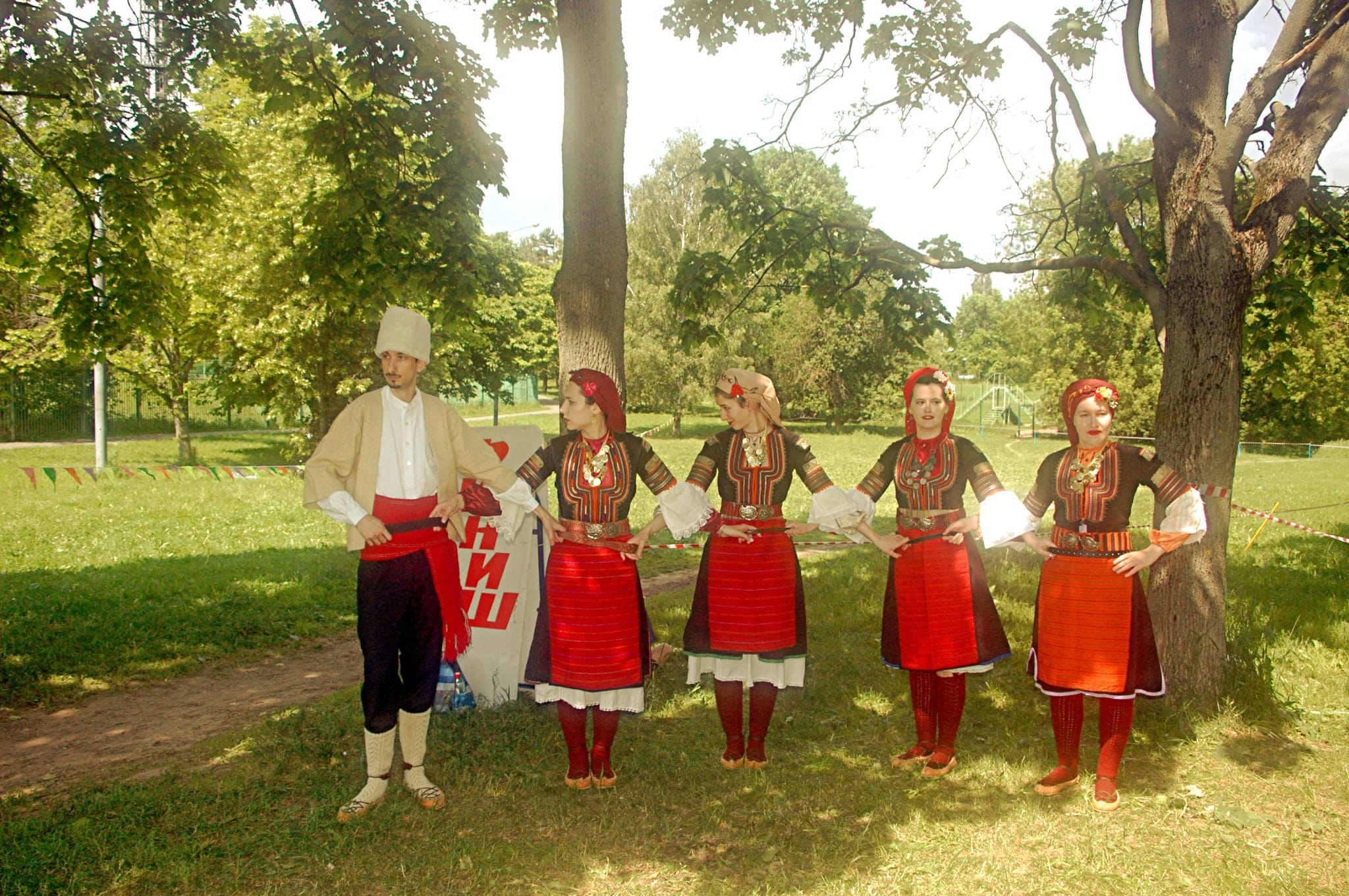
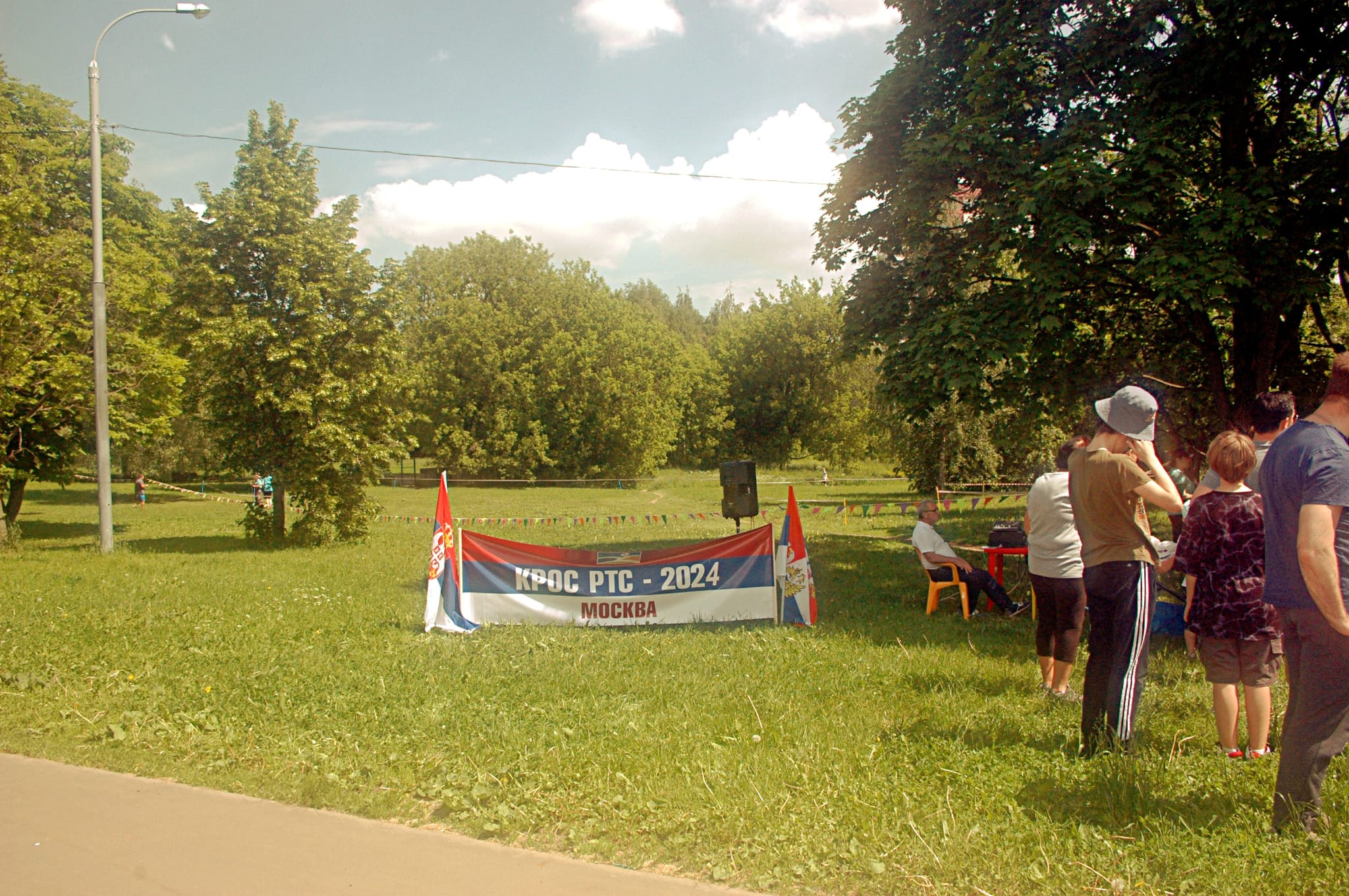 |
|
|
| Ambassador meets the delegation of the Faculty of World Politics of Lomonosov Moscow State University |
|
The Ambassador Momcilo Babić met the representatives of the Faculty of World Politics of Lomonosov Moscow State University, deputy dean for master's degree Tatjana Skorospelova and deputy dean for scientific work Anastasia Ponomarjova, on May 21st at the Embassy of the Republic of Serbia.
During a cordial conversation, the ambassador was introduced to several projects that the Faculty of World Politics has realized so far with the Faculty of Security of Belgrade University. The Russian side also presented the plans for the implementation of new joint projects, including the organization of round tables and conferences on the current situation in the Balkans region.
On this occasion, the collocutors exchanged the views on the possibility of providing scholarships for Serbian students to study in this prestigious high education institution. In addition, the ambassador expressed the support for the implementation of all initiatives and joint projects planned with the University of Belgrade.
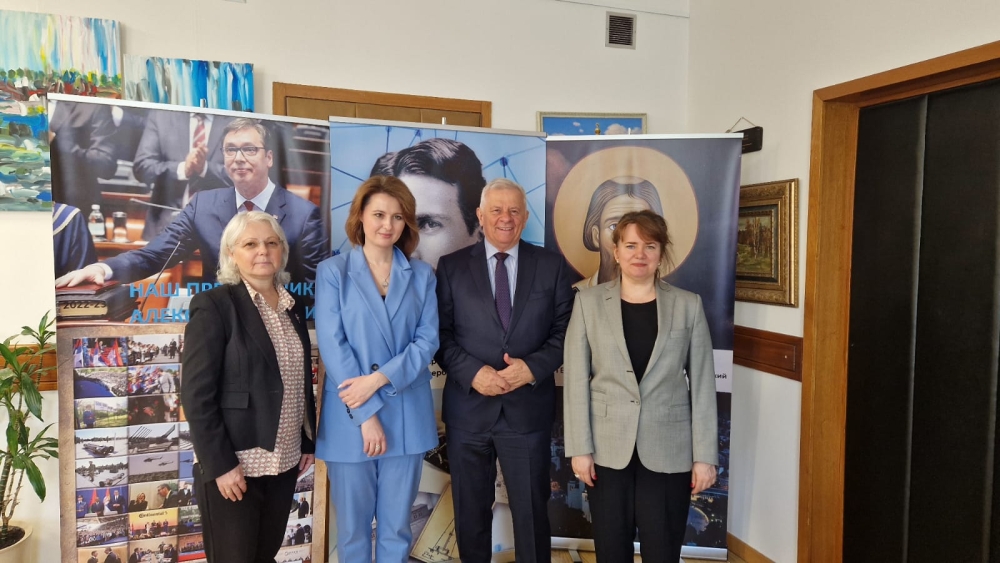 |
|
|
| Elementary school students from Kosovo and Metohija visited the Embassy of Serbia in Moscow |
|
On April 22nd, our Embassy was visited by a group of students from the Elementary School "Janko Jovićević" from Goraždevac, accompanied by teacher Ljubiša Miljanović and representatives of the Russian project "Help by deed", led by manager Olga Serebrovskaya. In a cordial conversation with Ambassador Momcilo Babić and employees from the Embassy, impressions about friendly Russia and the life of the Serbian people in Kosovo and Metohija were exchanged. During their stay in Russia, our children will have the opportunity to get to know the cultural and historical sights of Moscow, and they will visit Sergeev Posad, as well as the city of Dolgoprudny, where they will have the opportunity to make new acquaintances with their Russian peers. This arrival of Serbian children from Kosovo and Metohija to the RF, as in previous years, was realized thanks to the support of Mr. Nebojša Janković, the owner of "Comita" Ltd. from Russia.
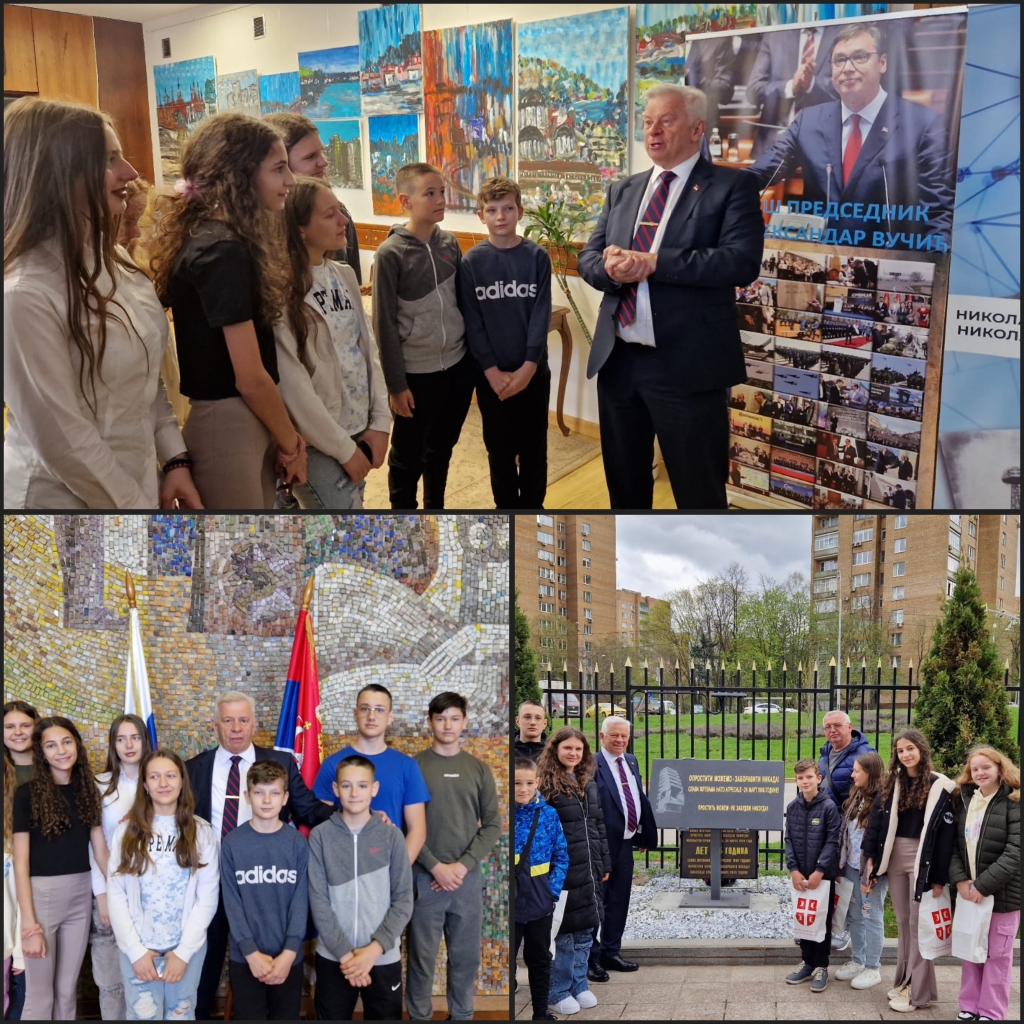 |
|
|
| Embassy closed for the holidays |
|
Due to the upcoming national holidays, we would like to inform you that the Embassy will be closed from May 1 to 6.
The first working day will be May 7. |
|
|
| Ambassador of Serbia meets Ambassadors of the Central Asian counties |
|
Ambassador Momcilo Babic met with the Ambassadors of friendly Central Asian countries - Ambassador of Turkmenistan Esen Aydogdyyev, Ambassador of Tajikistan Gulmahmadzoda Davlatshoh Kurbonali and Ambassador of Uzbekistan Asadov Botirjon Zakiroviсh, and, in cordial conversations, discussed the possibilities for the cooperation of the Republic of Serbia with the mentioned countries.
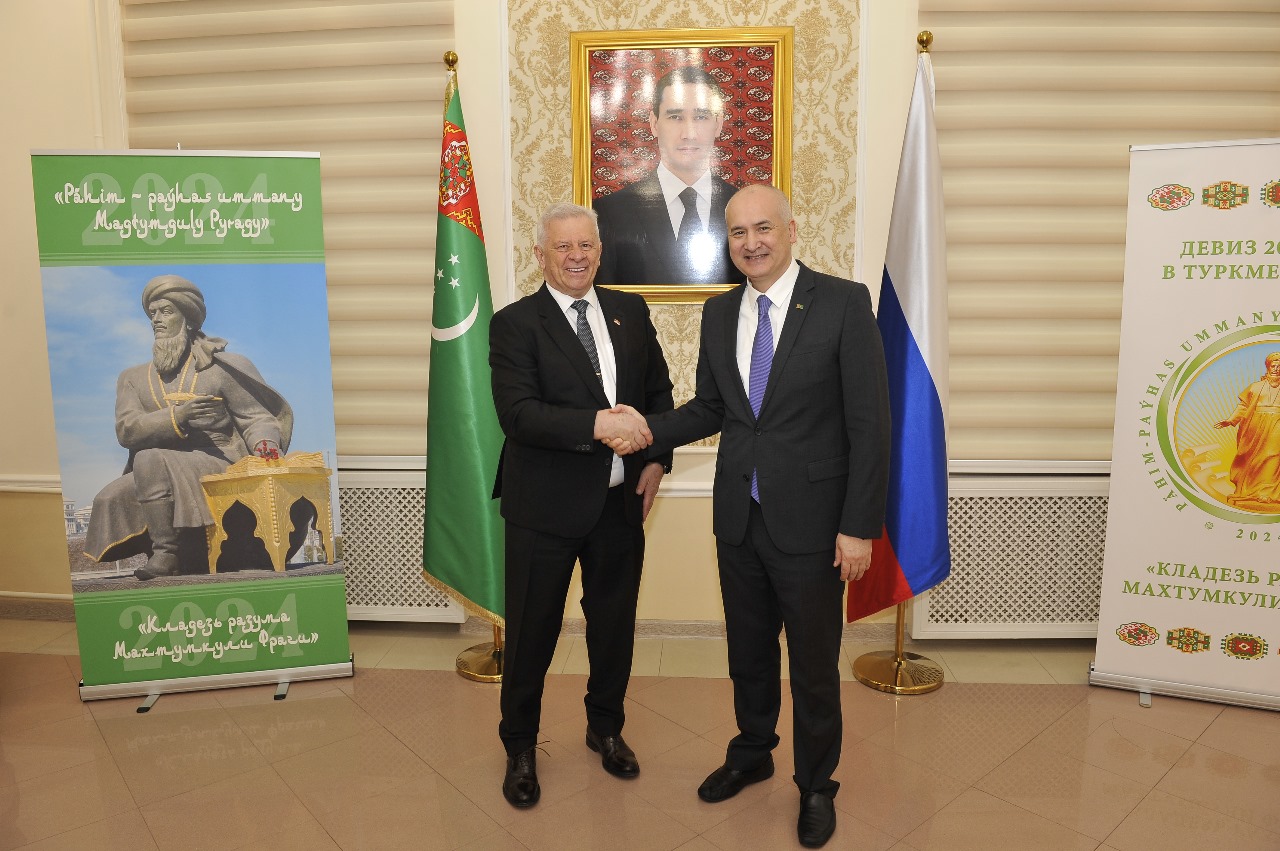
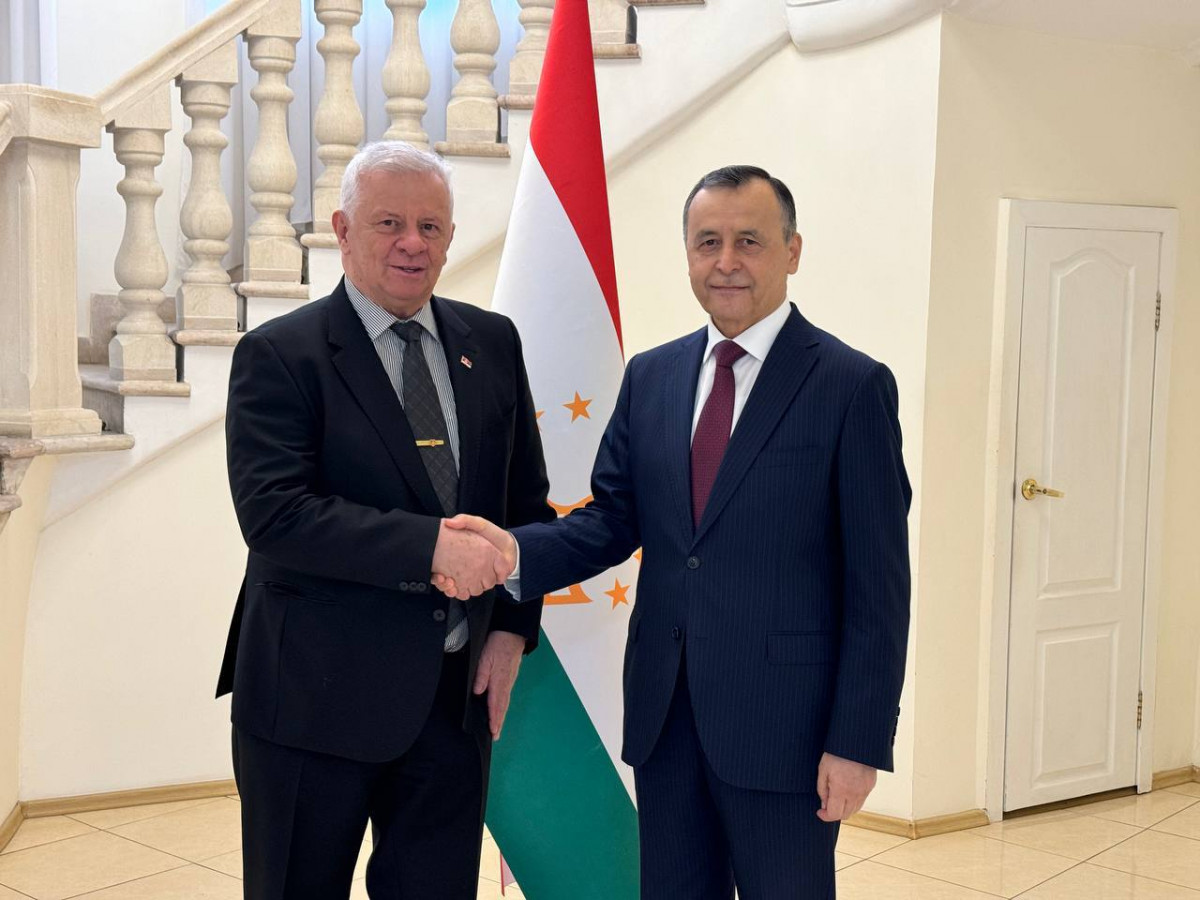
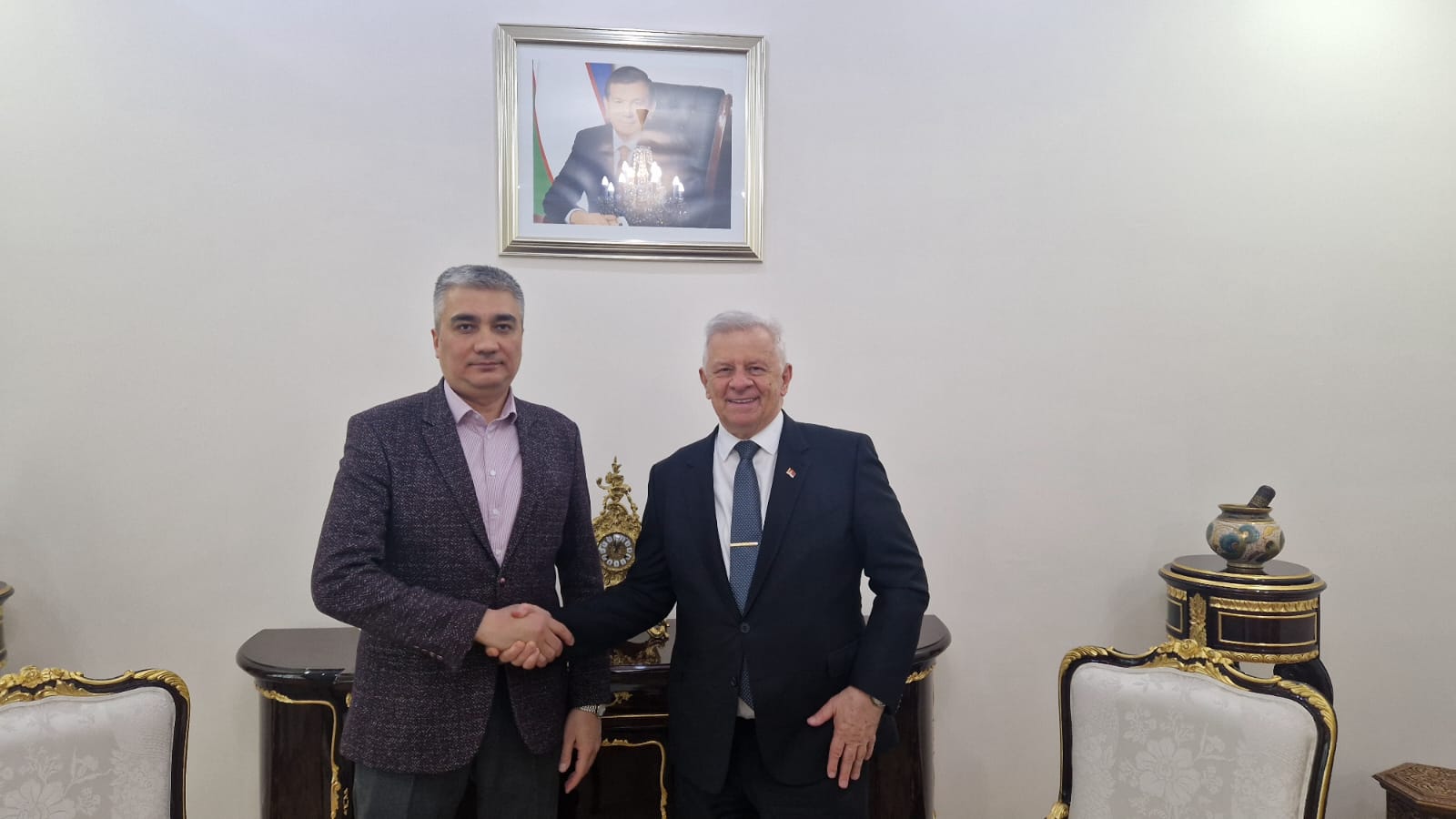 |
|
|
| Ambassador Momčilo Babić met with Lynne M. Tracy Ambassador of the United States of America to the Russian Federation |
|
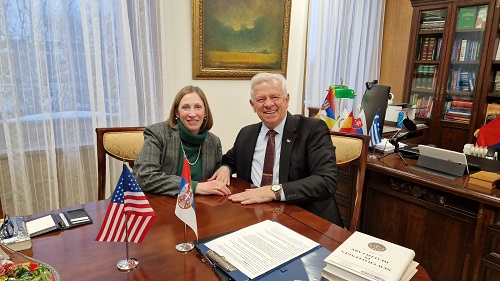
Ambassador of the United States H.E. Ms. Lynne Tracy visited the Embassy of the Republic of Serbia. She talked with Ambassador Momcilo Babić about current issues of international relations, and especially relations between the USA and Serbia - which have positive trends.
The issue of cooperation between the two parties in commemorating the character and work of Nikola Tesla, "an American of Serbian origin", as he himself said, was discussed in particular. It was established that Tesla lives on in his inventions with which he changed the world, surpassed his origins and became a meritorious citizen of the world, one of the most meritorious in history. Agreed to continue consultations on this, as well as on all important issues of international relations and the preservation of peace in the world, which are facing great challenges.
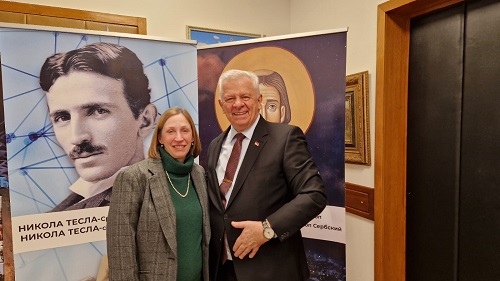 |
|
|
| Statement by Minister of Foreign Affairs of the Republic of Serbia Nikola Selaković at the meeting of the UN Security Council on the report on the work of UNMIK |
|
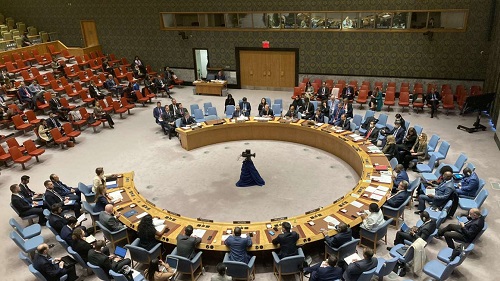
Mr. President,
Madam Special Representative,
Ladies and gentleman,
It gives me honor to address this distinguished body once again and to discuss the latest report of the Secretary-General on the work of the UNMIK.
I would like to thank the Secretary-General and the Special Representative for submitting the report. We take note of the efforts that Ms. Ziadeh makes in performing this very responsible duty, especially bearing in mind the necessity of a comprehensive overview and the complexity of the situation on the ground.
I also take this opportunity to underline that the Republic of Serbia highly values the activities of UNMIK in Kosovo and Metohija, established under UN Security Council Resolution 1244. We advocate for its continued operation in an unchanged and undiminished scope and capacity, especially bearing in mind that the Mission has not yet achieved the main goal of its mandate - a peaceful and normal life for all citizens of our southern province.
Ladies and gentlemen,
Unfortunately, the last few months have not brought more stability in Kosovo and Metohija and the situation in the Province is not exactly as presented in the report. Unilateral moves of Pristina continue to consciously and systematically deepen ethnic differences, causing discrimination against the non-Albanian population. To our knowledge, 105 ethnically motivated attacks have been recorded since the beginning of this year. In addition, Pristina is actively working on administrative and bureaucratic obstacles, by taking measures that were not agreed upon in the dialogue as the basic mechanism for negotiations and reaching solutions between Belgrade and Pristina. Pristina’s approach is problematic in many ways. This irresponsible conduct of Pristina is consciously sabotaging the efforts not only of Belgrade, but also of the EU and other involved parties of the international community, with the clear intention of achieving two goals - the first being to avoid the implementation of assumed commitments. The second, the ultimate and far more alarming goal is the intimidation, marginalization and persecution of Serbs.
In all previous statements before this this distinguished body, Pristina focused on what happened in the past while failing to mention, which is painful to witness, how non-Albanians in Kosovo and Metohija live today. Serbs are still intimidated in different ways, forced to leave their homes, villages and cities. Those displaced are discouraged from returning to where they were born and lived their lives.
The provisional institutions work systematically to remove and erase as much as possible of the cultural and national diversity that is left. At the same time, Pristina is consciously fueling inter-ethnic tensions using all available methods.
Attending religious celebrations seems to be a crime in Kosovo and Methohija. It is the case of Nikola Nedeljković who was arrested for allegedly "inciting ethnic hatred and intolerance", but actually his imprisonment was for attending the St. Vitus Day (Vidovdan) celebration.
Nikola was sentenced to eight months in prison without any material evidence. On the other hand, let me remind you that even to this day there is not a single perpetrator held legally accountable for the more than 1,000 Serbs killed since 1999. Due to planned intimidation, almost all towns and villages in Kosovo and Metohija are ethnically cleansed. Representatives of Pristina are ignoring the suffering, insulting the open wounds of the Serbs who had to leave their ancestral homes, and I underline, there are more than 200,000 of them. Such conduct has not change for last 23 years and is in complete opposite to the democratic values and principles that the provisional institutions of self-government often promote in their statements.
Therefore, I consider it necessary to emphasize that the true political will of the involved international actors and Pristina is necessary in order to create the conditions for the beginning of the end of discrimination on a national basis and common life in the Province.
Esteemed members of the Security Council, I would like to draw your attention to the rigid, problematic and extremely irresponsible conduct of the other negotiating party within the dialogue. In achieving the above-mentioned goals, Pristina applies the so-called policy of reciprocity, a well-thought-out, malicious strategy that, unfortunately, was not constructed independently. By continuously insisting on mutual recognition as a central part of the dialogue, the so-called policy of reciprocity demonstrates the essential unwillingness of the current political leadership of Pristina to find any compromise solution. Let me remind you that the talks between Belgrade and Pristina did not start with last elections in Pristina, but have been in progress for 11 years since the technical dialogue started (8 March 2011). Therefore, we assess as inadmissible attempts to disregard the current format of the dialogue, and annul the agreements only because they are not to the liking of the current political factors. It is unacceptable that the current geopolitical circumstances are being used to simply erase what has been painstakingly worked on for years. Belgrade, I underline, was institutionally involved in the dialogue from the very beginning, while the commitment of the other side has varied and continues to vary depending on the political option that is in power.
The harsher political rhetoric and narrative of the current leadership of the provisional institutions of self-government in Pristina are accompanied by concrete destabilizing steps. In the reporting period, measures on license plates were imposed, disguised as attempts at alleged integration into society.
Let me remind you again, there was no agreement on such measures in the dialogue between Belgrade and Pristina. I believe, ladies and gentlemen, that even today we will hear from the representative of Pristina that their side has fulfilled all obligations, but the decision on re-registration of license plates shows that Pristina is not only failing to fulfill what has been agreed upon, but it nullifies the results of the dialogue, creating a new crisis all over again. The effect of such forcibly imposed measures is best illustrated by the fact that since the decision was made a single-digit number of re-registered vehicles with Serbian license plates has been recorded, of which only two are Serbs from the north of Kosovo and Metohija. This is another indicator that Pristina does not enjoy full support, but that, on the other hand, it continuously provokes the natural reaction of the Serbian population, which cannot endlessly be subject to the arbitrariness of temporary institutions.
I believe that even today we will hear already known narrative of representatives from Pristina who try to present every reaction of the Serbs in Kosovo and Metohija as an activity organized by Belgrade in alleged attempts at destabilization. Such claims are simply not true. Serbia, for its part, cannot in any way contain the revolt present among the non-Albanian population of Kosovo and Metohija. It is an undeniable fact that citizens' protests represent a voice against many years of institutional violence and the deprivation of rights of the non-Albanian population, which, in this case, is denied the right to peaceful enjoyment of private property acquired in a legal manner.
Pristina does not cease in its attempts to confiscate property, and, as is well-known, one of the targets is the Serbian Orthodox Church. By calling into question the return of property to the Dečani Monaster Pristina paradoxically does not execute the decisions of its own so-called Constitutional Court.
Ladies and gentlemen,
I thought for a long time how to best illustrate the true picture of everyday life of the non-Albanian population in Kosovo and Metohija. I will mention only some of the facts. Numerous ethnically motivated incidents, hate speech, intimidation, violations of the right to a fair trial, threats to the right to freedom of movement and religious rights, desecration of churches and graves were recorded in the last reporting period as well. The frequent attacks on the sites of the Serbian Orthodox Church are also unacceptable, and especially the humiliating attitude towards the Serbian cultural and spiritual heritage, including the 4 monuments that have been inscribed on the UNESCO World Heritage List. Numerous administrative and technical barriers are imposed on priests and monastic communities, making it difficult and even impossible for them to survive on church properties.
When it comes to civil rights, try to imagine that the basic political and civil right to vote has been taken away from you.
This is precisely what the Serbs in the Province have experienced along with frequent intimidation and violent incursions of the ROSU special forces, which are an instrument for the implementation of Pristina's goals under the pretext of allegedly fighting crime.
In December last year Bratislav Nikolić the president of municipality of Štrpce has been detained, as suspected of the organized crime and corruption - still not charged, kept in detention unit in Podujevo, only for the reason to make additional and final pressure on the Serbian community living in the enclave of Štrpce. How can this be justified as the fight against crime when special forces are used to raid village festivals, schools and kidnap drivers of ambulance transporting infusion containers and medicines? What are the motives behind and how can one rationalize these actions? Just try to imagine and put yourself in the shoes of Ms. Dragica Gašić, the only Serbian returnee in Djakovica. Imagine that you are still not allowed to buy bread because of your origin and nationality, because you live in a municipality that the local Albanians proudly consider forbidden to non-Albanians. Imagine that as many as eleven Albanian civil society organizations demand your expulsion, as well as a ban on any non-Albanian ever returning to that town. Then you will realize the level of intimidation that Serb returnees are facing. It will be clear to you why the percentage of returnees is below 2% and why it is still one of the lowest in the world. Let me pose a question - are these the characteristics of a society that presents itself to the world as a fully fledged democracy and a factor of stability in the region?
We are aware that the dialogue has a wider dimension and that it can affect the situation in the entire region.
This is reflected in every statement given by Serbian officials, including the President of the Republic of Serbia, Aleksandar Vučić. "It is better to negotiate for a hundred years than to fight for a day" are the words of our President that best describe the policy of peace, reconciliation, and regional cooperation pursued by the Serbian leadership, which is guided by the vision of building a common and prosperous future of the Balkans.
I believe that it is a duty of today's leaders to create a clear common vision for the future generations. Such a vision was shown by the leaders of Belgrade, Skoplje and Tirana by creating Open Balkan, an initiative from the region for the region, which is already producing concrete results. Serbia has on several occasions reached out to Pristina inviting it to join this initiative. We counted on an awareness of the importance of economic connectivity and progress for the benefit of the citizens of the entire Balkans. However, our invitation was not met with understating from the other side.
Ladies and gentlemen,
We categorically reject Pristina's argumentation regarding the alleged unconstitutionality of the formation of the Community of Serb Municipalities. It is clear that Pristina's attitude towards this obligation reflects its attitude towards the Serbian people in the Province. It also indicates that Pristina is against Serbian people being organized as an ethnic community and thus exercising their collective rights.
The aim of their approach, as a preferred model, is a community without Serbs, such as those in Pristina, Djakovica or Pec, or some similar localities in the Province. For our side, it is unacceptable that Pristina has refused to fulfil its obligations and discuss the formation of the Community of Serb Municipalities for as much as 3,470 days but I assure you that, regardless of this fact, Serbia will not give up on its efforts to find a compromise solution for the current situation.
I will remind you that the representatives of Pristina, although they often repeat in their statements that the case of the so-called Kosovo is a fait accompli, continue not to be recognized by the majority of UN member states for 14 years now. If the so-called Kosovo's independence is a reality, how come that we have the dialogue? And how come that Belgrade is faced with increasing pressures as regards the need for mutual recognition? What the current political leadership of Pristina refuses to accept is that Belgrade cannot be left out in the search for a final solution. The same also applies to the case of the increasingly frequent indications about Pristina's upcoming membership in international organizations. Will these moves help to create the necessary atmosphere for dialogue? Are we, in this way, rewarding Pristina's destructive behaviour and refusal of dialogue? Our view is that the attempts of the so-called Kosovo to join international organizations are an unacceptable act and Serbia will work decisively against such steps.
During the last session in April this year, we could hear the calls of some members of the UN Security Council to reduce and even terminate UNMIK, with the explanation that Pristina has its own functional institutions. However, the circumstances I have presented to you and the situation on the ground remind us again that international presence in our southern province is still necessary. In this regard, we support the efforts made by UNMIK, KFOR, EULEX and OMIK within their mandates. The Serbian and other non-Albanian population in Kosovo and Metohija has the highest confidence in the international presence and considers it a guarantor of security, which additionally confirms that international missions need to remain engaged in an undiminished scope and capacity in accordance with UN Security Council Resolution 1244.
In conclusion,
I would like to point out that lately in all international forums we keep hearing calls for respect of the principles of the UN. We support the territorial integrity of all UN member states. But, what about Serbia? I would like to ask the esteemed members of this distinguished body whether the need to implement the principles of the UN Charter applies only to some or all of its members? As a country that consistently respects international law and still suffers the consequences of it being violated, we believe that the UN Charter and international law, including the territorial integrity and sovereignty of states, should be respected by all and apply indiscriminately to all UN member states.
Ladies and gentleman,
It was this body that more than two decades ago adopted Resolution 1244, which confirmed the territorial integrity of Serbia. This fact did not prevent certain countries from recognizing the so-called “Kosovo” and thus violating the UN principles, but also the resolution that they adopted, by adjusting international law to their interests and goals. Precisely because of this, the more and more frequent mentioning of the case of "Kosovo" is an indication that the precedent made opened a Pandora's box, because the strength of each principle rests on its full and universal application and unconditional adherence.
You will notice that I posed a lot of questions in my statement and I express hope that today we will hear answers to at least some of them from you, esteemed members of the UN Security Council and representatives of Pristina, because the inhabitants of Kosovo and Metohija, of any nationality, whether they are Serbs or Albanians deserve it.
All the inhabitants of Kosovo and Metohija have every right to expect an improvement in the atmosphere and the reduction of tensions on the ethnic level, which are a prerequisite for a normal life. For such a step to be made, we need constructiveness, which is not lacking on the Serbian side, genuine support of international actors. I emphasize that Serbia has always been and remains deeply committed to finding a sustainable solution by peaceful means, for the sake of peace, stability and a common future.
Thank you. |
|
|
| Presentation of credentials of Ambassador M. Babić to the President of the Russian Federation V. Putin |
|
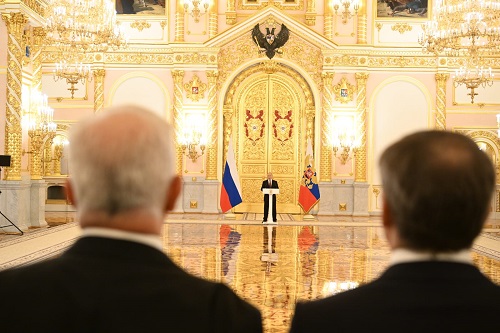
Ambassador Momčilo Babić presented Letters of credence to the President of Russia, Vladimir Putin, at a ceremony, held today, on September 20th, at the Kremlin, together with 23 other ambassadors of other countries.
In his address, President Putin pointed out that Russia and Serbia are linked by relations of strategic partnership based on the tradition of friendship, cultural, spiritual and historical closeness of our brotherly nations.
He also stated that they regularly discuss with President Vučić, in personal meetings and in telephone conversations, the key issues of further development of cooperation. He pointed out that they appreciate the aspiration of Serbian friends to implement a balanced independent course on the international scene and that joint work on deepening political dialogue, expanding mutual cooperation in the economy, trade, scientific-technical and cultural-humanistic spheres continues.
President Putin particularly emphasized that within the framework of international law, starting primarily from UN Security Council resolution 1244, and in the future, they will continue to provide Serbian friends with comprehensive support in defending the legitimate rights and interests of Serbia, protecting its state sovereignty and territorial integrity.
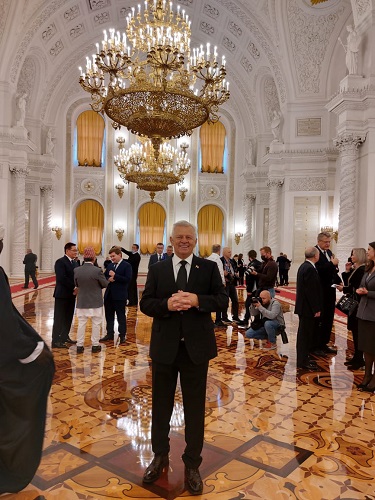
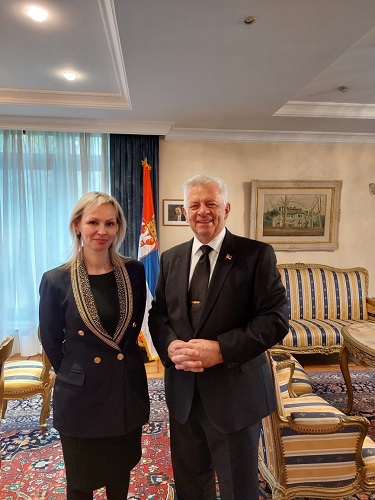
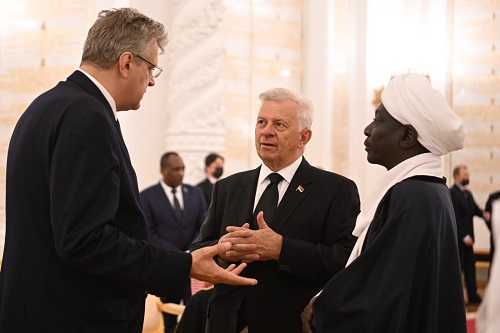
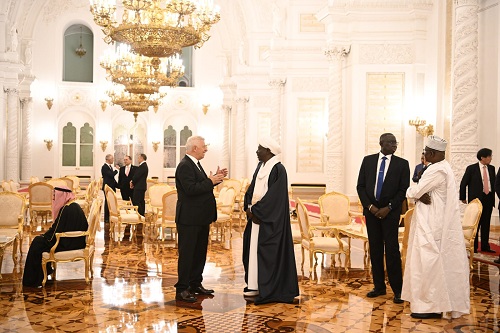
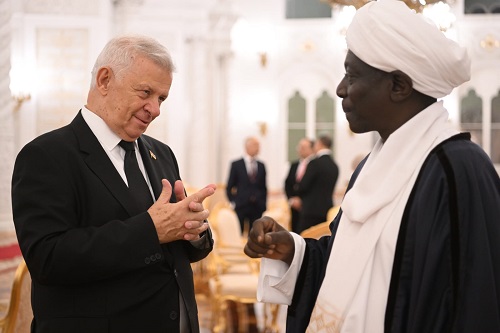 |
|
|
| Meeting with the ambassador of the Russian Federation |
|
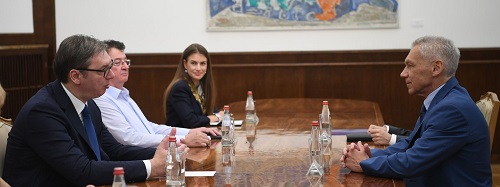
02.08.2022
Today, the President of the Republic of Serbia, Aleksandar Vučić, hosted the Ambassador of the Russian Federation, Aleksandr Bochan-Kharchenko, with whom he talked about the current situation in the region, especially after the tensions caused by the irresponsible and unilateral actions of Priština which were aimed at restricting the freedom of movement of Serbs in Kosovo and Metohija.
President Vučić said it was good that, under the pressure from international representatives, Priština had abandoned its original intention of provoking a conflict and leading the entire region into instability.
"Serbia will always stand for peace and dialogue since this is the only way to resolve open issues," said President Vučić.
Ambassador Bochan-Kharchenko reiterated Moscow's official position that Priština's actions were irresponsible and that any possibility of escalation should be prevented.
The two interlocutors also talked about the bilateral relations between the two countries – which are characterized as sincerely friendly – as well as about joint projects whose implementation is already taking place or in preparation.
Source / Photo: www.predsednik.rs
|
|
|
| Meeting with the Vice-President of the Council of the Russian Federation, Konstantin Kosachev |
|
On July 21, 2022, Ambassador Momčilo Babić met with the Vice-President of the Council of the Russian Federation, Konstantin Kosačov.
During the meeting, opinions were exchanged on the most current issues of bilateral and parliamentary cooperation.
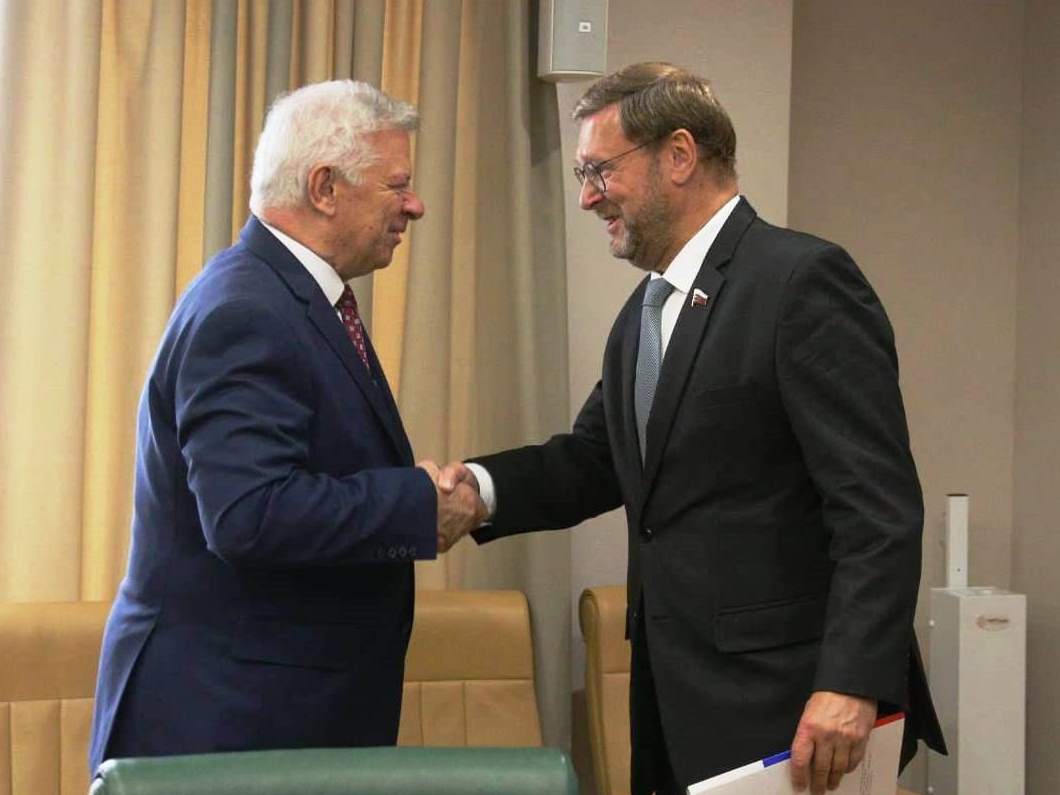
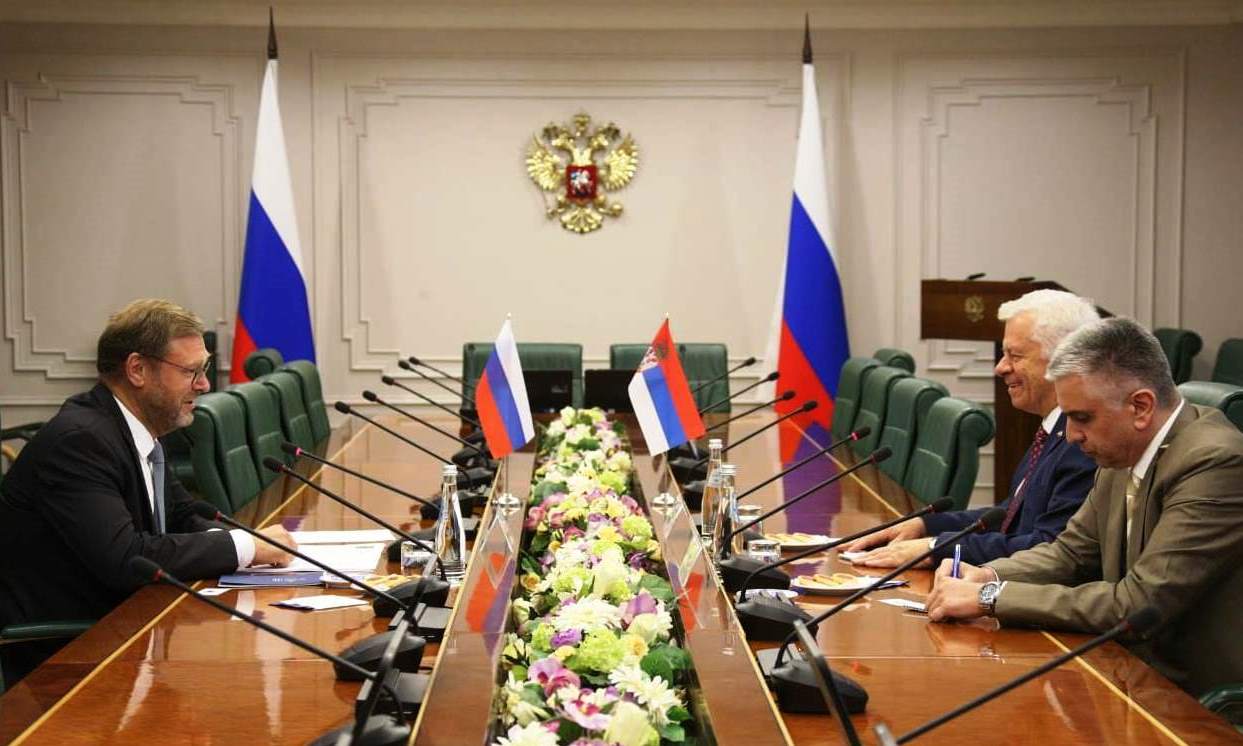
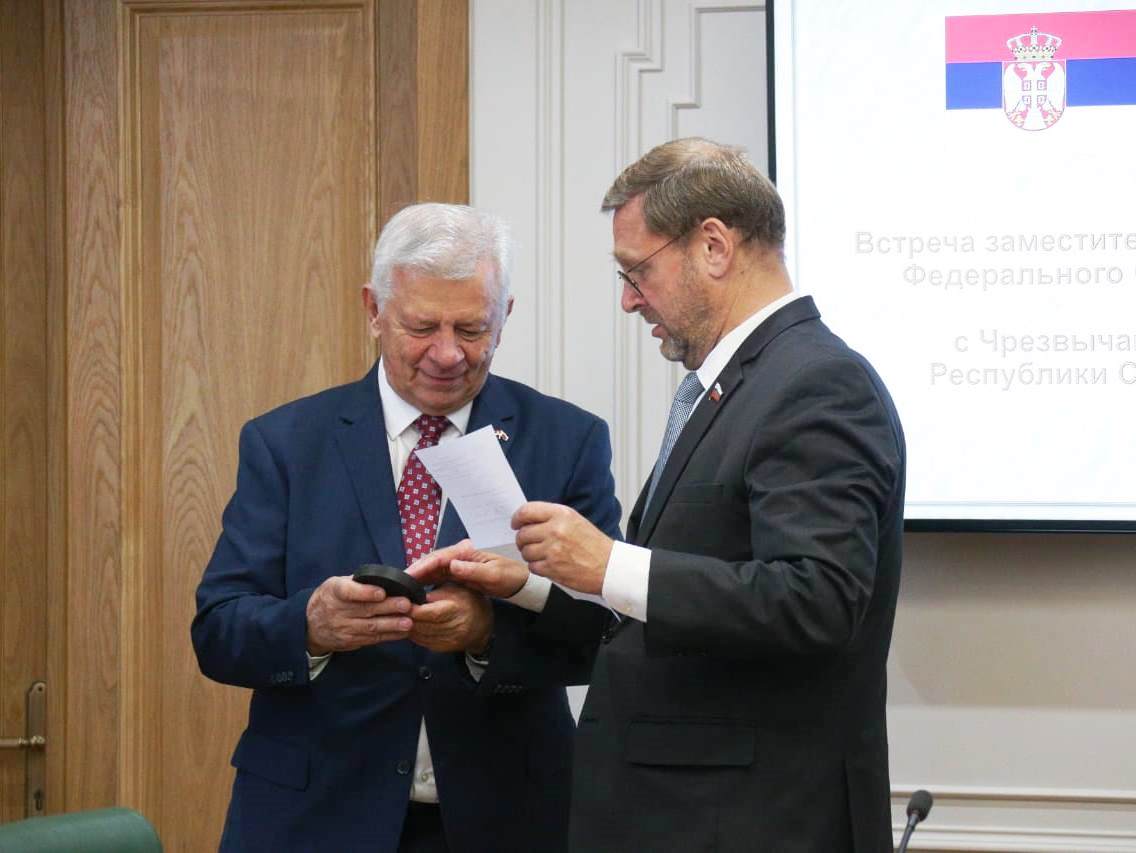
|
|
|
| Meeting of the Ambassador M.Babić with Igor Bagdashev, the director of the State Protocol Department of MFA of the RF |
|
On July 15, 2022, Ambassador Momčilo Babić met with Igor Bagdashev, the director of the State Protocol Department of the Ministry of Foreign Affairs of the Russian Federation.
During the meeting, opinions on the most current issues were exchanged.
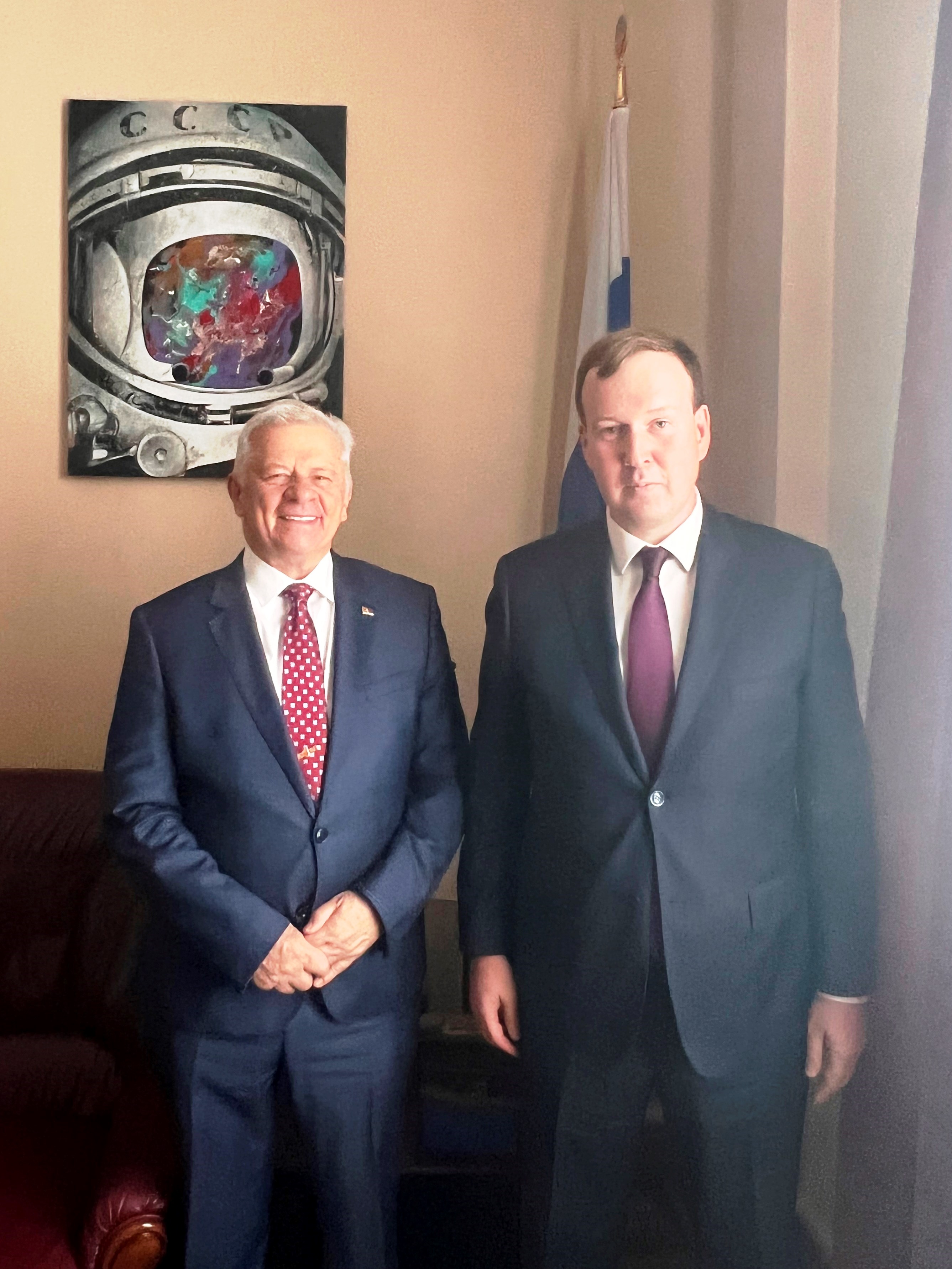 |
|
|
| Ambassador Babic meets with Ambassador of Poland |
|
Ambassador Momcilo Babic met at the Serbian Embassy with H.E. Krzysztof Krajewski, Ambassador of Poland to the Russian Federation. The two sides met one-on-one, where, in a friendly atmosphere, they discussed current global and regional issues and expressed concern about peace and prosperity in European political area.
Even though people look at problems from different perspective, ambassadors highlighted the importance of negotiations and finding solutions at the negotiation table.
The two sides concluded that bilateral relations move within the framework of cooperation and mutual understanding between the two countries.
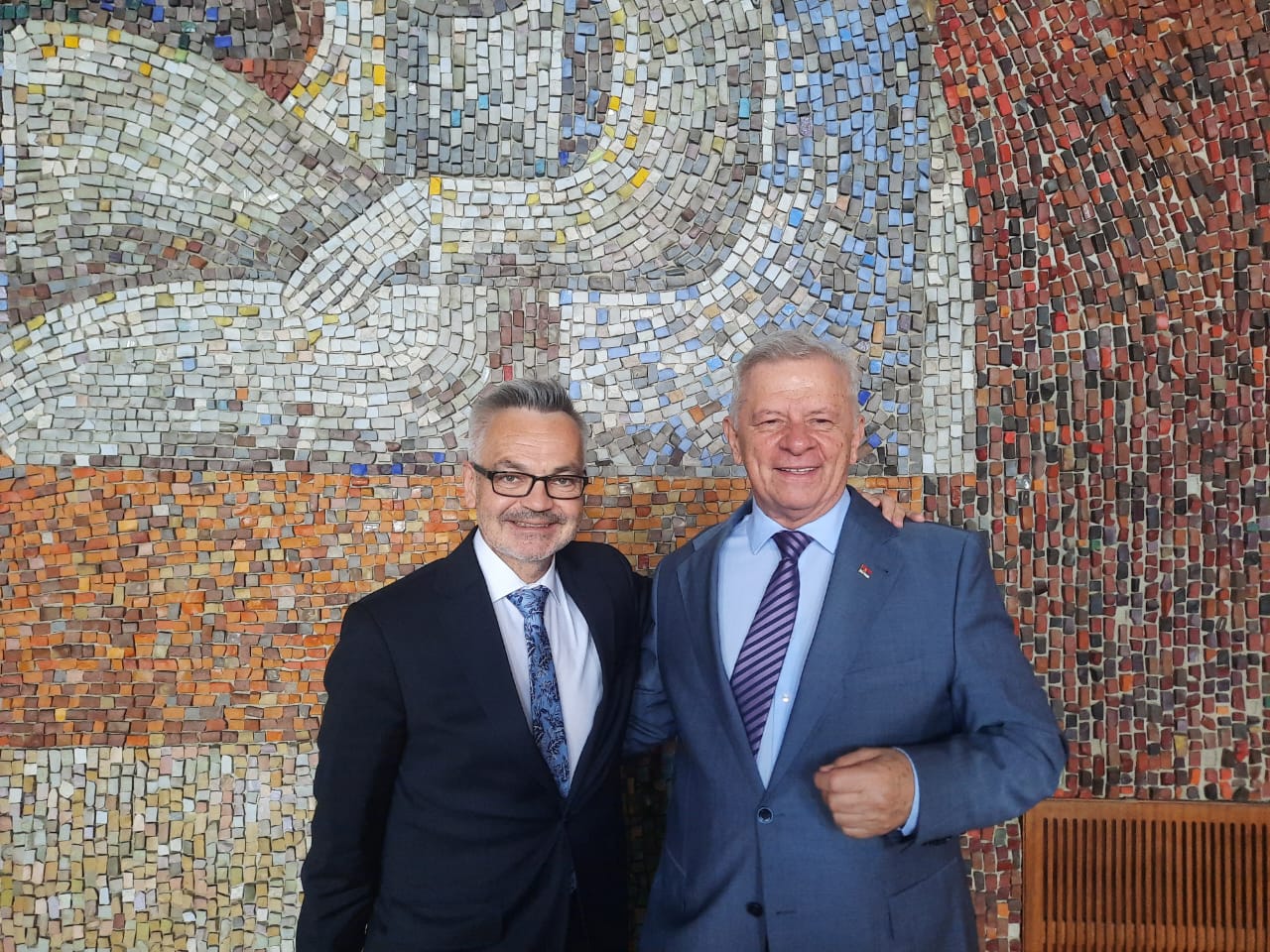 |
|
|
| Ambassador of the Republic of Serbia Momcilo Babic visited Presentation of the Lord Church in Zhulebino |
|
Ambassador Extraordinary and Plenipotentiary of the Republic of Serbia Momcilo Babic, at the invitation of curator of the Program for the construction of temples in Moscow, adviser to the Mayor of Moscow and Patriarch of Moscow and All Russia, Vladimir Resin, visited the largest temple complex in Zhulebino on Saranskaya Street, the South-Eastern Administrative District of Moscow.
The meeting was also attended by the administrator of the North-Eastern and South-Eastern vicariates, Archbishop Matthew of Yegoryevsk, prefect of the South-Eastern administrative district of Moscow, Andrey Tsybin, acting. rector of the church, Priest Mark Kravchenko, responsible for the implementation of the Program for the construction of Orthodox churches in the South-Eastern Vicariate, Priest Vitaly Ulyanov
Momcilo Babic examined the main temple premises, the altar, the iconostasis and the economic and engineering complex. Vladimir Resin, His Eminence Matthew and representatives of the prefecture informed Ambassador about the history of the temple complex and the construction of its central part - the Church of the Presentation of the Lord.
Historical and spiritual closeness of the Russian and Serbian people, the role of the Orthodox Church in that unity, as well as the importance of strengthening friendly ties between the two countries were highlighted in the conversation.
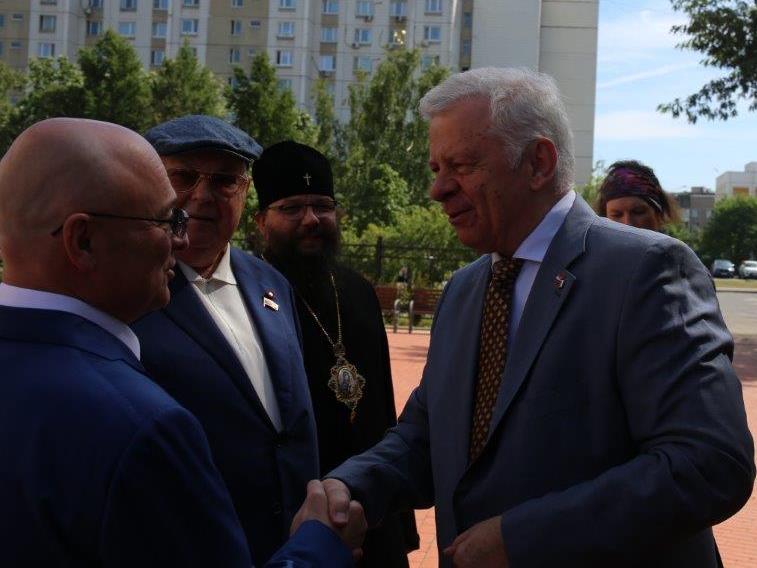
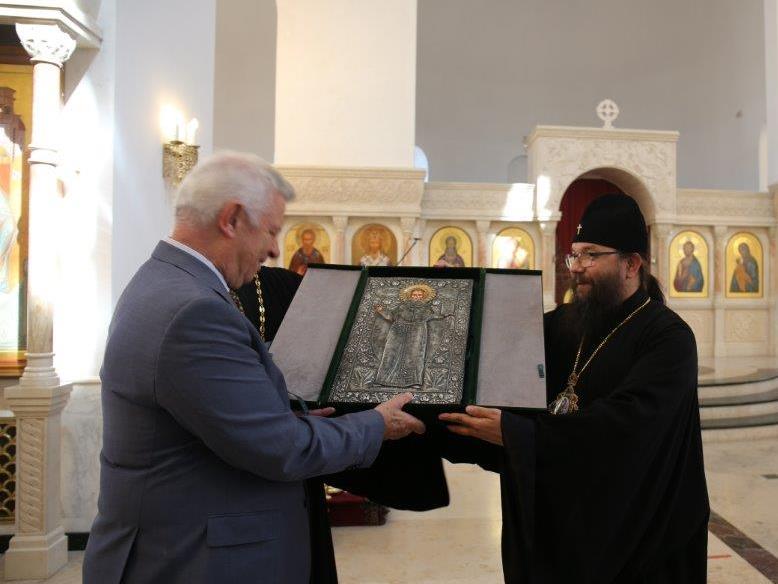
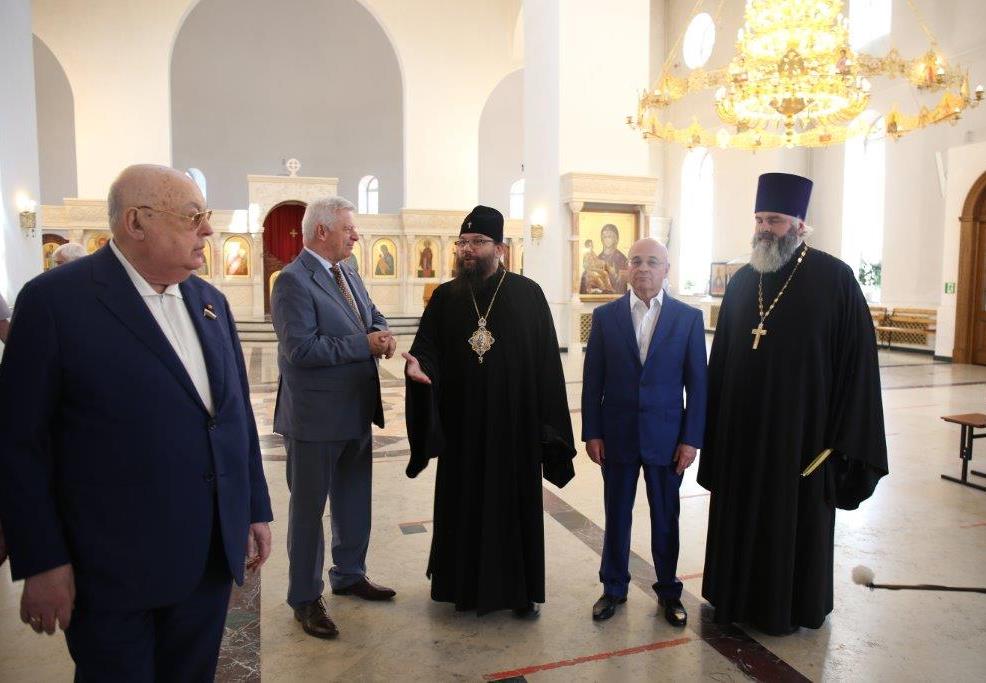
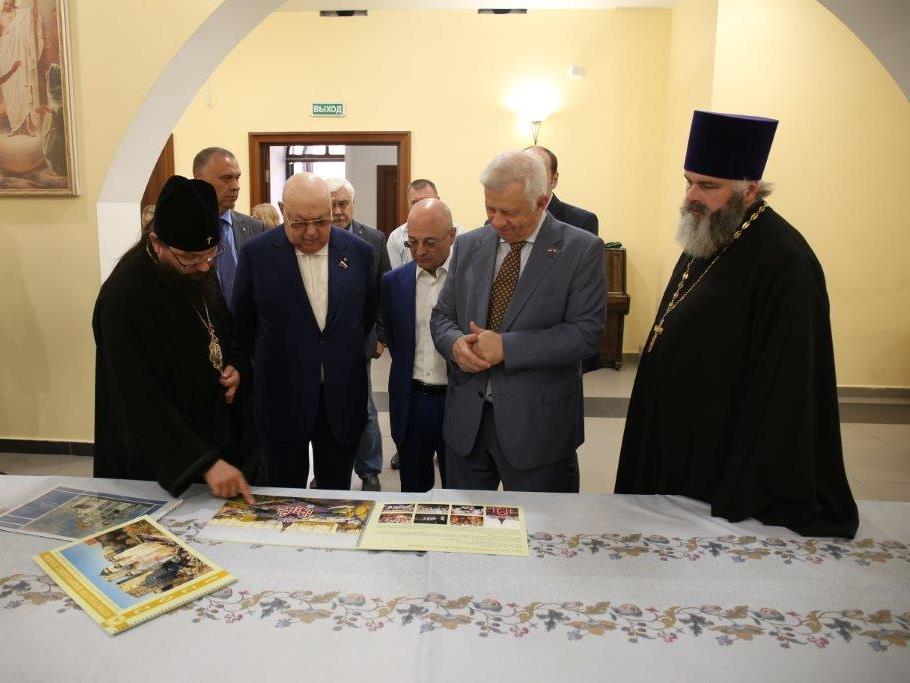
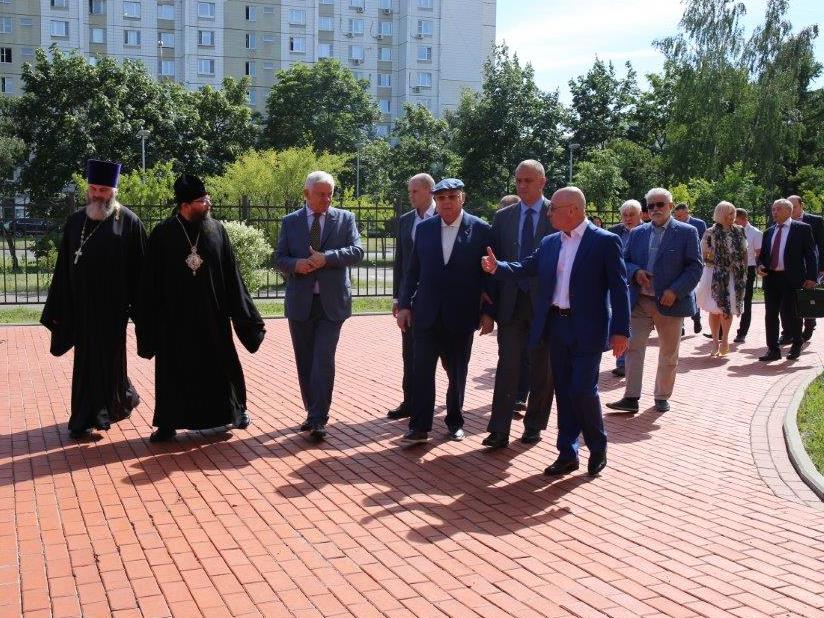 |
|
|
| Meeting of the Ambassador Momcilo Babić with the representatives of the Belgorod State Technical University V.G.Shuhov, 29th June 2022 |
|
Ambassador Momcilo Babić discussed with the representatives of the Belgorod State Technical University V.G.Shuhov, Ph.D. Nemanja Vukčević and Viktorija Ryapuhina, the director of the Institute of Serbian Language and Communications in Belogorod, about possibilities for improving cooperation through the joint implementation of various initiatives in the field of culture and education.
Ambassador Babic was informed about activities of the Institute of Serbian Language and Communications, which is extremely popular among Serbian and Russian students.
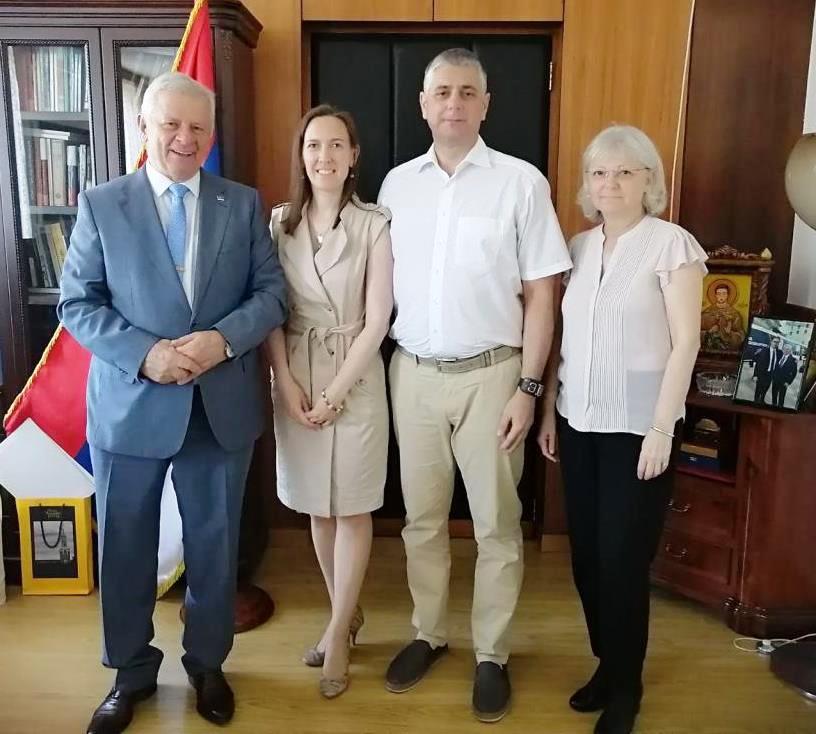 |
|
|
| Meeting of the Ambassador M.Babic with the President of the Interstate Bank of the CIS |
|
On the 27th of June, Ambassador Momcilo Babic met with the President of the Interstate Bank of the Commonwealth of Independent States, Nikolai Vyacheslavovich Gavrilov. They discussed possibilities of interbank cooperation.
The Interstate Bank is an international banking settlement and credit institution with 100% participation of state capitals of member countries of the Commonwealth of Independent States. The Interstate Bank was founded in 1993 by ten CIS countries.
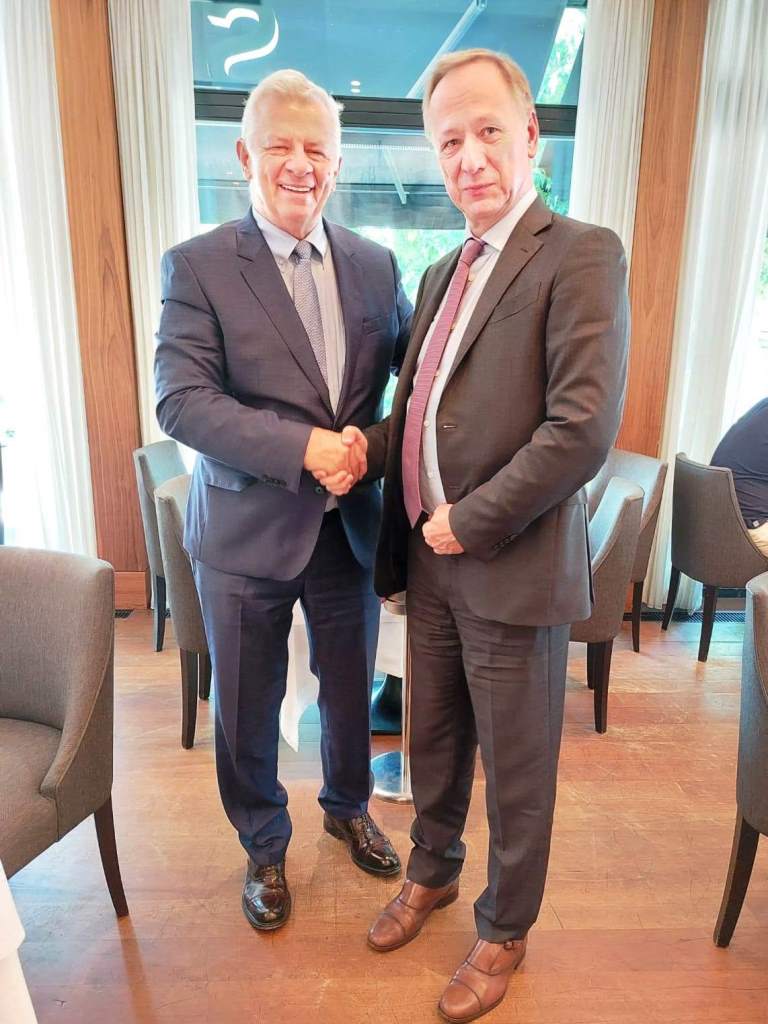 |
|
|
| Ambassador Momcilo Babic attended the handover ceremony of the PABSEC Chairmanship to the Republic of Serbia |
|
Ambassador Momcilo Babic and MP Igor Becic, attended the handover ceremony of the PABSEC Chairmanship to the Republic of Serbia, held on the 21st of June, at State Duma of the Russian Federation.
At the meeting there were representatives of the Federation Council: members of the Committee of the Federation Council Alexei Kondratenko and Nikolai Semisotov; representatives of the State Duma of the Russian Federation: President of the State Duma Committee Olga Timofeeva; First Deputy Chairman of the Committee Nikolai Kolomeytsev; Committee members Yevgeny Besonov, Mikhail Sheremet, Grigory Shilkin; Representatives of the State Duma Cabinet: Deputy Chief of Staff Sergei Karseka, Head of the Secretariat of the Deputy President of the State Duma Yevgeny Shianov, Chief Adviser of the Directorate for International Relations Irina Zolotareva, Chief Consultant of the Directorate for International Cooperation Valery Stavitsky, and Secretary General of the PABSEC Asaf Hadzijev. The President of the State Duma, Aleksandar Babakov, was prevented from attending this event due to illness.
During the meeting, current issues concerning the work of the organization were discussed, as well as preparations for the celebration of the 30th anniversary of the PABSEC. Deputy Head of the Permanent Delegation of the Russian Federation PABSEC Alexei Kondratenko used this opportunity to wish Mr. Becic success in his further work, and the President of the State Duma Committee for the Development of Society, Olga Timofejeva, emphasized the importance of inter-parliamentary cooperation in the Black Sea region.
Becic said that taking over the presidency is a big deal for the National Assembly, and expressed his gratitude for support of Serbian territorial integrity and sovereignty. Becic underlined importance of bilateral cooperation between the two countries, which is mainly contributed by friendly relations between President Vucic and President Putin.
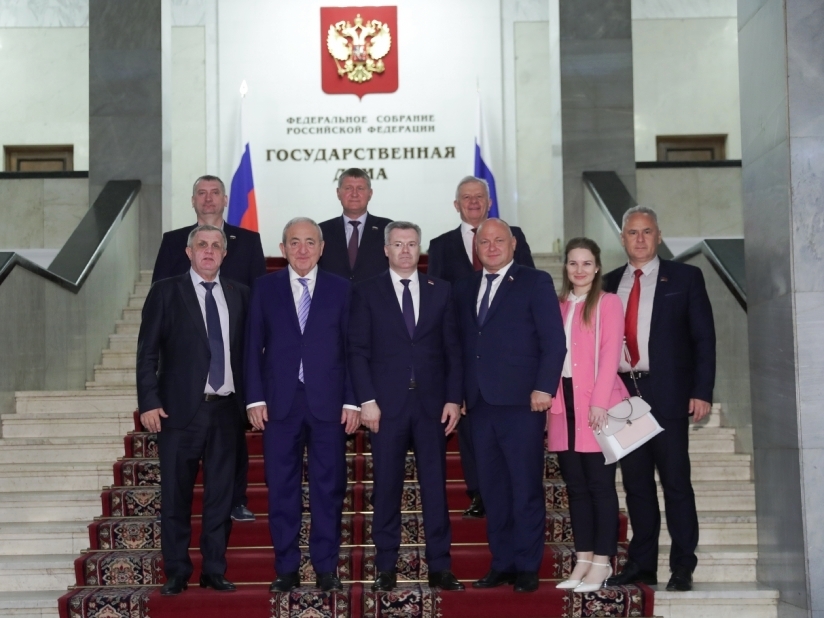 |
|
|
| Ambassador Momcilo Babic attended the 25th St. Petersburg International Economic Forum |
|
On behalf of the Embassy of the Republic of Serbia in the Russian Federation, Ambassador Momcilo Babic and the First Counselor Boris Sekulic attended the 25th International Economic Forum in St. Petersburg.
Ambassador Babic met with Denis Bucayev, Director General of the state-owned company Russian Environmental Operator, on the sidelines of the Forum. Mr. Bucayev acquainted Mr. Babic with the company business in the field of utilization of solid communal waste in the Russian Federation. Interest was expressed in establishing cooperation with Serbian companies, as well as in investment and technological projects in Serbia.
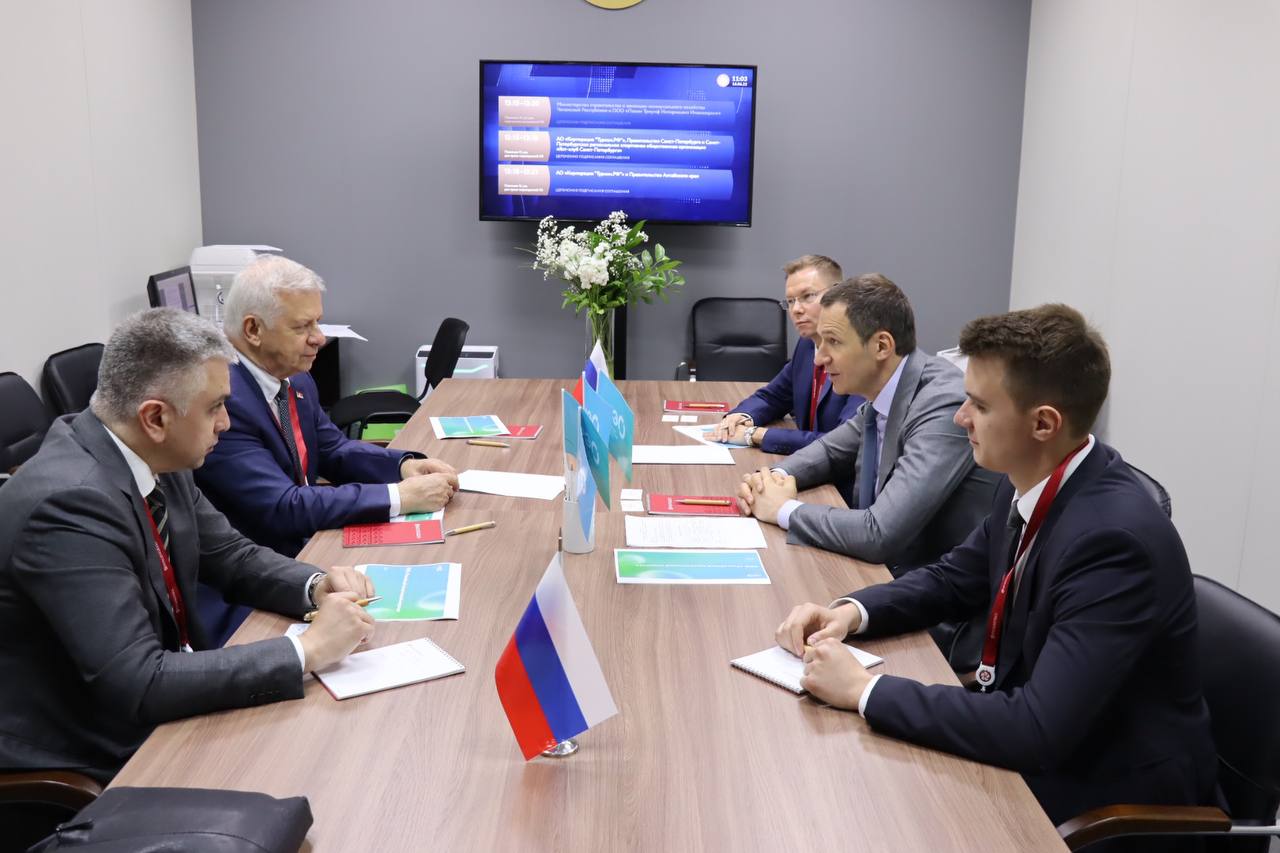
On the sidelines of SPIEF, Ambassador Momcilo Babic met with Alexander Dyukov, Chairman of the management Board of Gazprom Neft. Mr. Dyukov used this opportunity to brief the ambassador on the results of cooperation between Gazprom Neft and NIS Serbia, the current challenges company is facing and with the prospects of future cooperation and development.
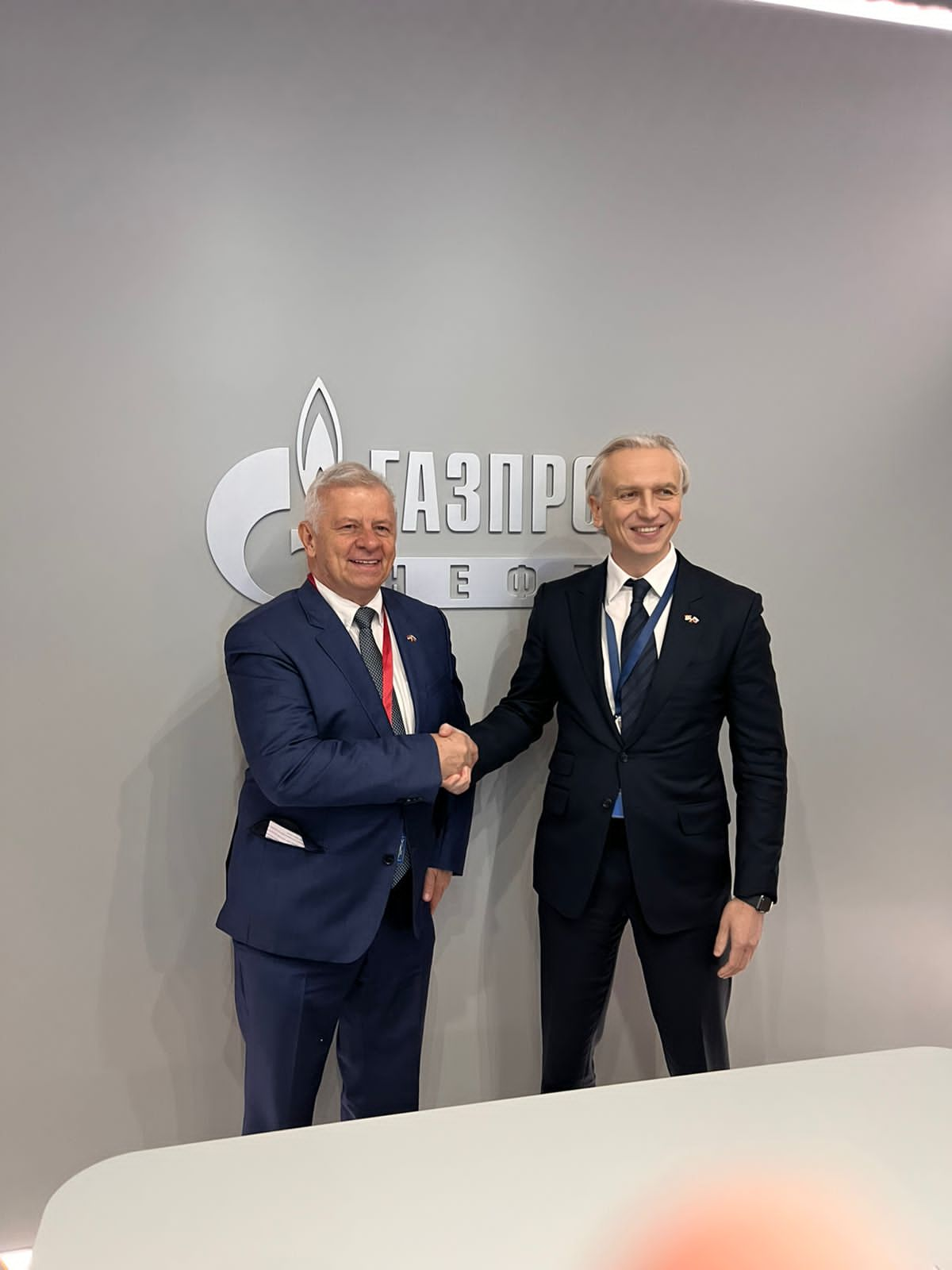
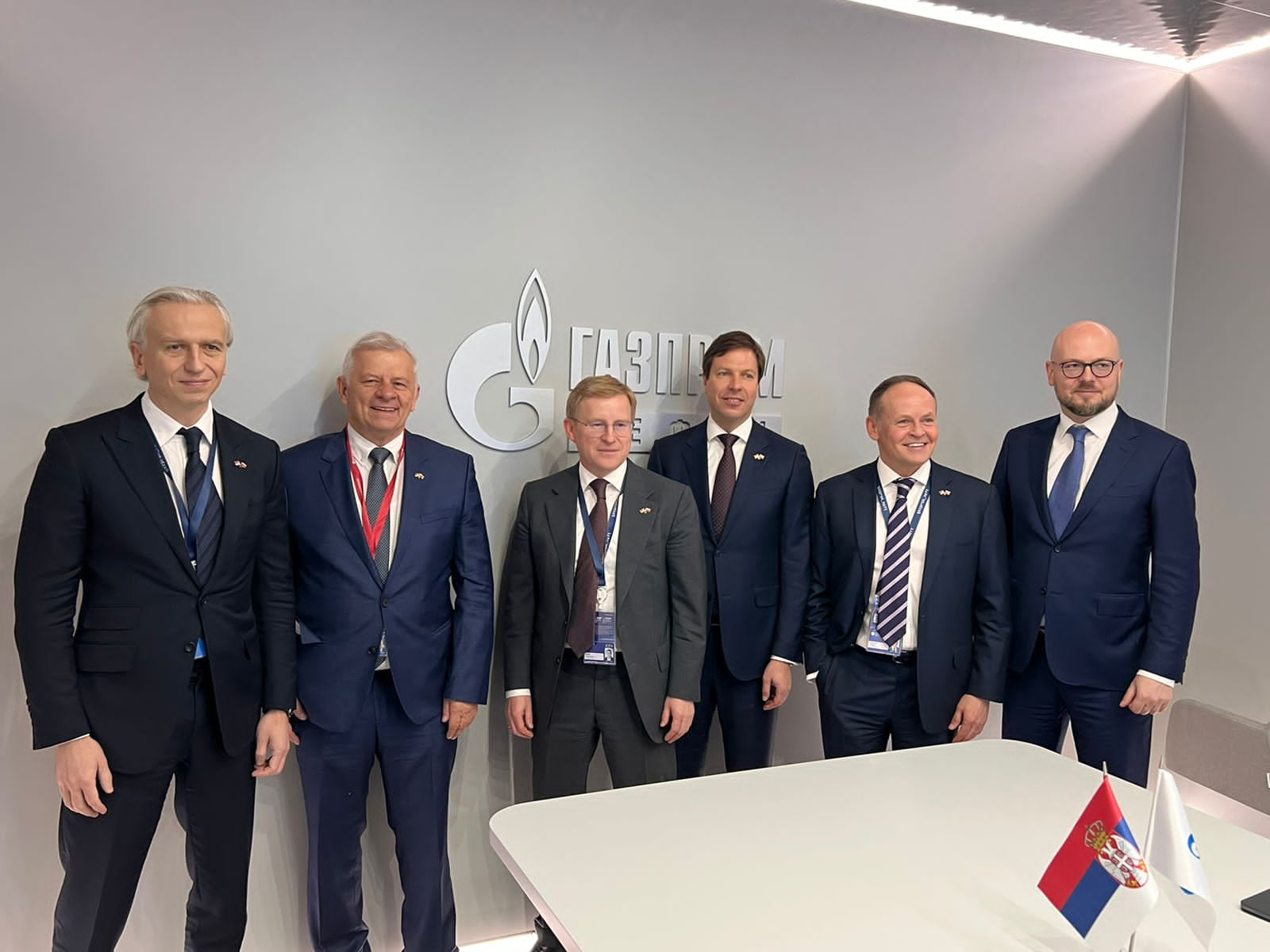 |
|
|
| On the 1st of June, the Ambassador of the Republic of Serbia to Moscow, Momcilo Babic, met with the Deputy General Director of the Sinara Holding, Anton Zubikhin |
|
Zubikhin informed Ambassador Babic in detail about the realization of the "Belgrade Diameters" project, on which the Russian company "Sinara" is working together with the company "Russian Railways" within the development of the city railway and improving the rail network in Belgrade.
During the conversation, Zubikhin presented the company "Sinara", which is one of the leading Russian holdings in the field of transport engineering (production of locomotives, wagons, buses, trolleybuses, trams for public transport) to the Ambassador. The strategic partner of the holding is the company "Russian Railways".
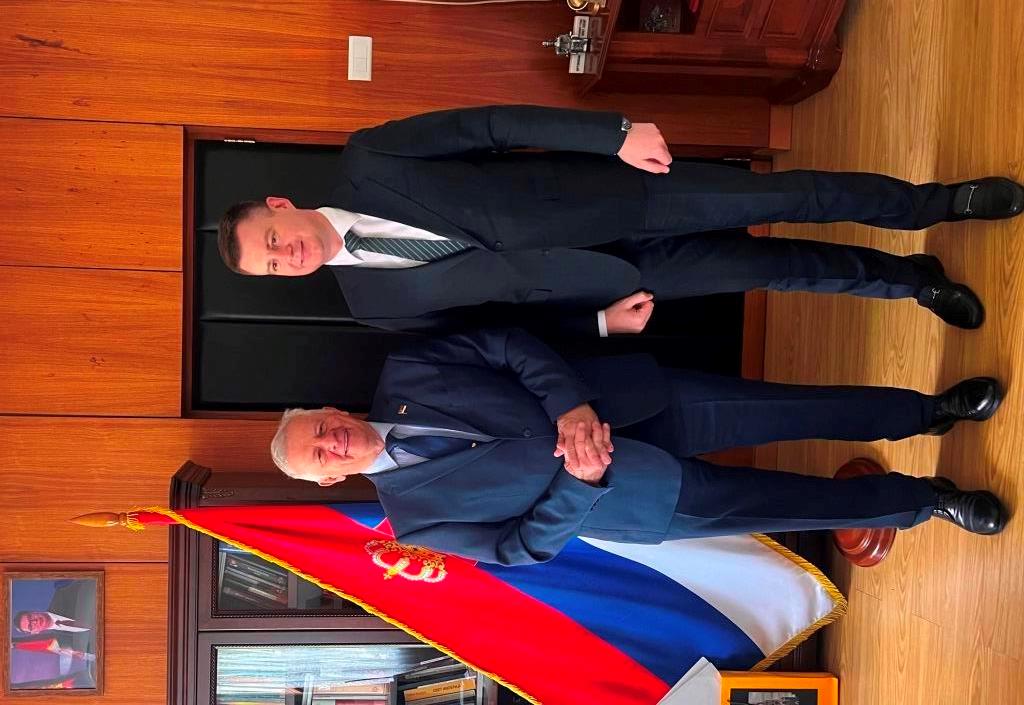 |
|
|
| Former Moscow Mayor and Active Deputy of the State Duma of the Russian Federation Vladimir Josifovich Resin visited the Embassy of Serbia in Moscow |
|
One of the greatest builders and the most deserving that Moscow is among the most beautiful cities in the world. Vladimir Resin in a long cordial conversation with Ambassador Momcilo Babic, evoked memories of building Moscow in the last few decades and building the current Serbian Embassy. The Ambassador congratulated Mr. Resin and all those who have great merits that Moscow is today one of the most beautiful cities in the world, led by the current mayor Sobyanin and, above all, President Putin.
"I was here as a postgraduate student a few decades ago, but Moscow then and today are two worlds." Moscow exudes clean streets, huge areas under forests and parks, tidy facades of buildings, large cultural institutions and museums, the best metro in the world." The interlocutors recalled the visit of V. Resin to Belgrade and the cooperation that was achieved. V. Resin is a great friend of the Serbian people and a rare urban planner and builder for many decades on a global scale. With his initiative, several hundred Orthodox churches are being built in Moscow, and he is a great collaborator and advisor to Patriarch Kirill.
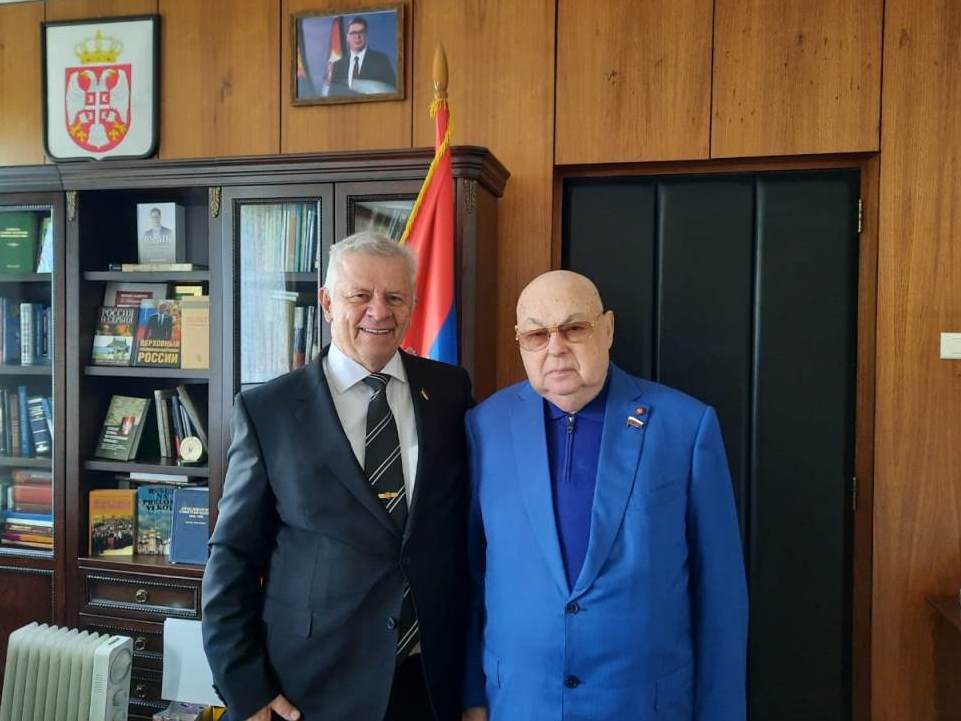 |
|
|
| Serbian Ambassador Momcilo Babic visited the Great Exhibition of Economic Achievements of the VDNH in Moscow, one of the largest and best in the world |
|
Ambassador Babic and his associates paid an official visit to the VDNH, one of the largest and best permanent exhibitions in the world, located on the territory of about 700 hectares in a number of facilities, among which the exhibition of Russia's space achievements stands out. The exhibition is visited by over 30 million visitors every year. The conversation with the hosts highlighted the facts that are forgotten that the Russians were the first to fly into space, that after the world-famous Laika, Yuri Gagarin flew in 1961, that in 1965 Alexei Leonov came out of a spaceship and floated freely in space. Even today, Russian scientists and engineers have the main role in space research. The Ambassador congratulated the researchers and the leadership of the City of Moscow, especially the Mayor, who are now taking care of this impressive exhibition that has preserved and improved the VDNH.
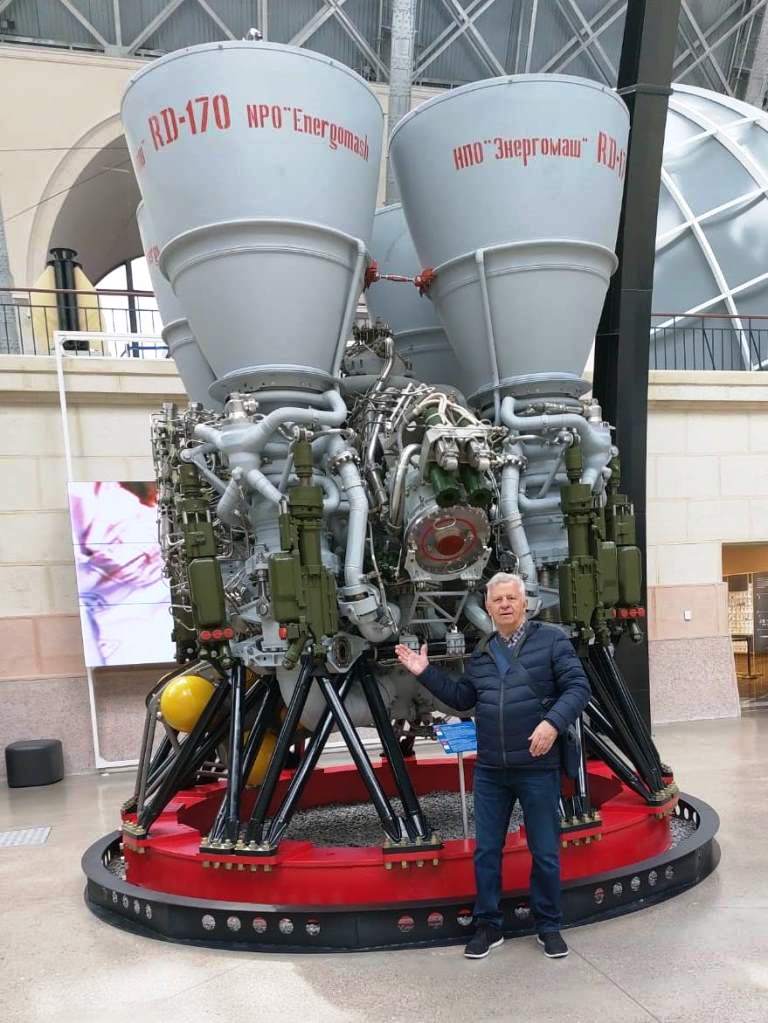
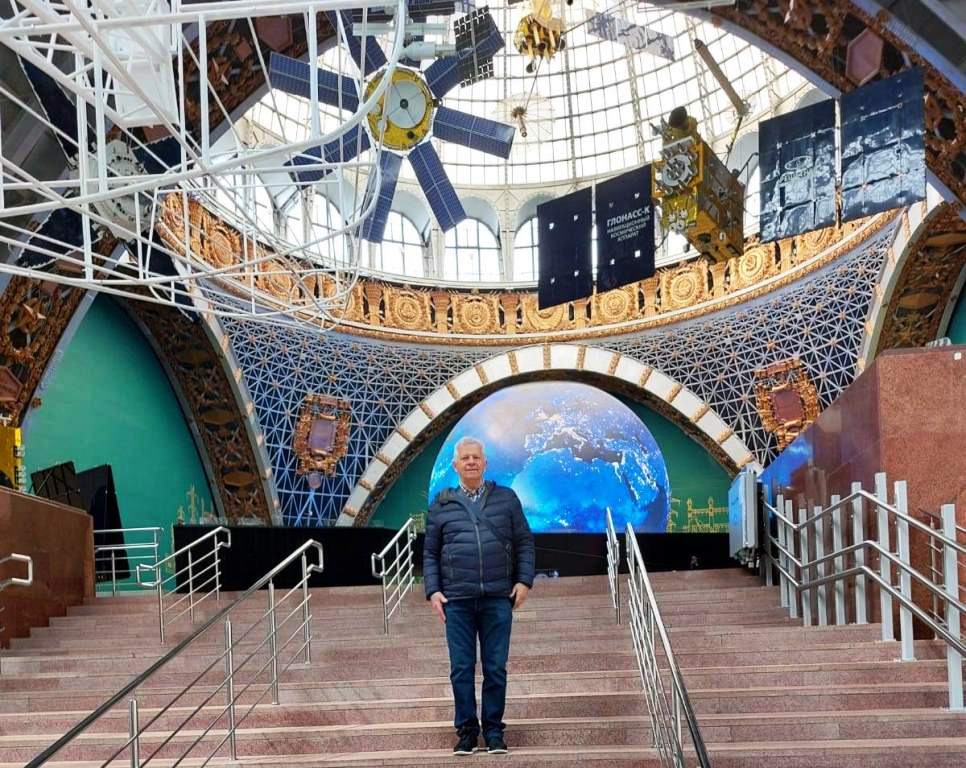 |
|
|
| Meeting with representatives of the Serbian diaspora at the Embassy of the Republic of Serbia |
|
A meeting with representatives of the Serbian diaspora in Moscow was organized at the Embassy on Thursday, March 24. More than twenty Serbian citizens were present, mostly business people who have been working and living in Russia for decades.
The main purpose of the gathering was to commemorate the victims of the felonious NATO bombing, which began on this day 23 years ago. A one-minute silence had been held to remember the victims and it was pointed out that such a crime will never be forgotten.
In his welcome speech, Ambassador Momcilo Babic used the opportunity to introduce himself as the new head of the diplomatic mission in Moscow, to thank everyone for their previous cooperation and participation in the renovation of the embassy building. He pointed out that Serbian citizens can always contact the Embassy and him personally, if they need any help or protection.
Ambassador Babic had reminded guests that parliamentary and presidential elections would be held soon and invited everyone to participate in them at the Embassy of Republic of Serbia in Moscow. This was an opportunity for Gordana Božić, the new Minister Counselor at the Embassy, to introduce herself to the diaspora.Representatives of the diaspora were also greeted by Bogdan Igić, State Secretary at the Ministry of Agriculture of the Republic of Serbia .
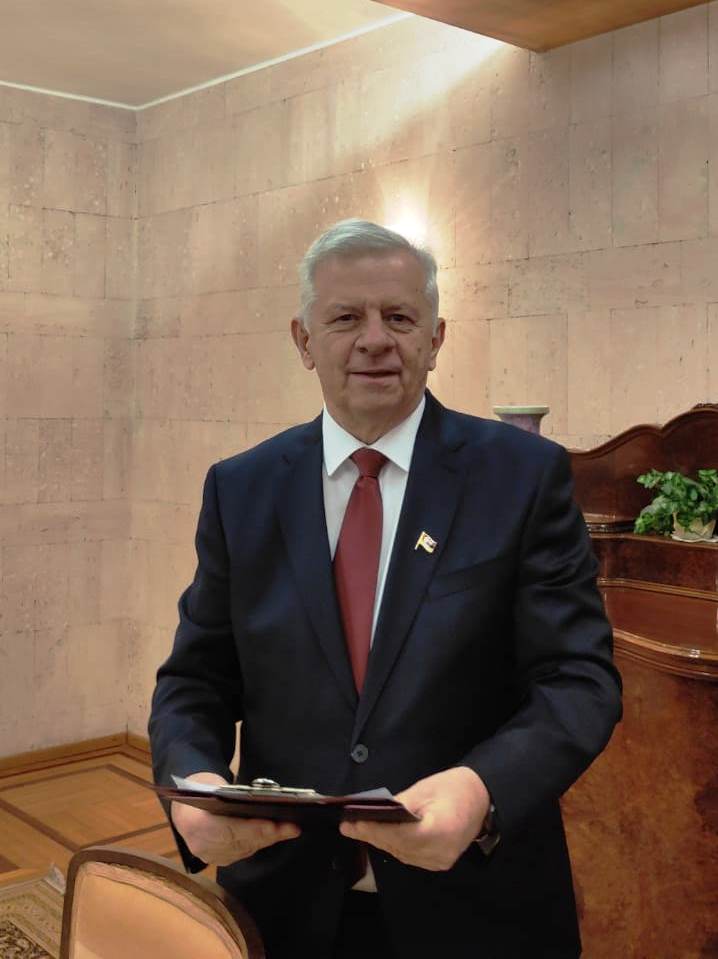
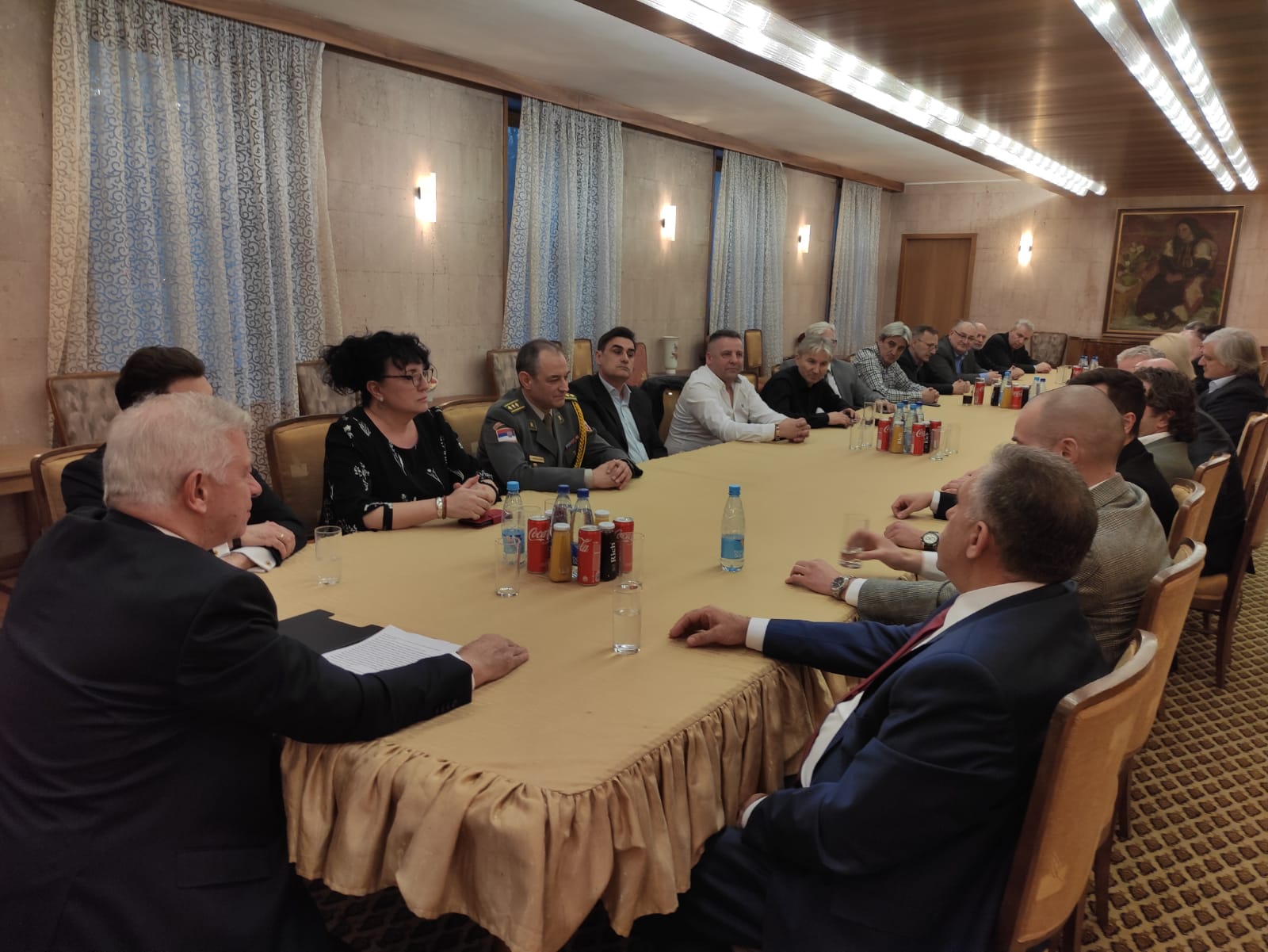
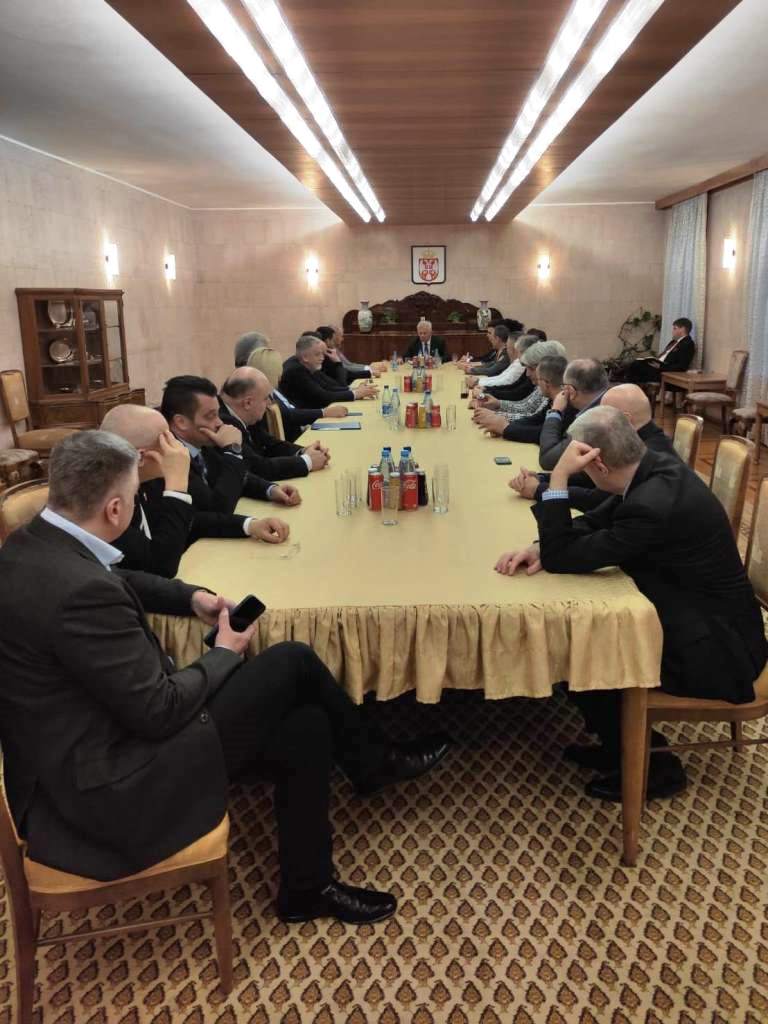
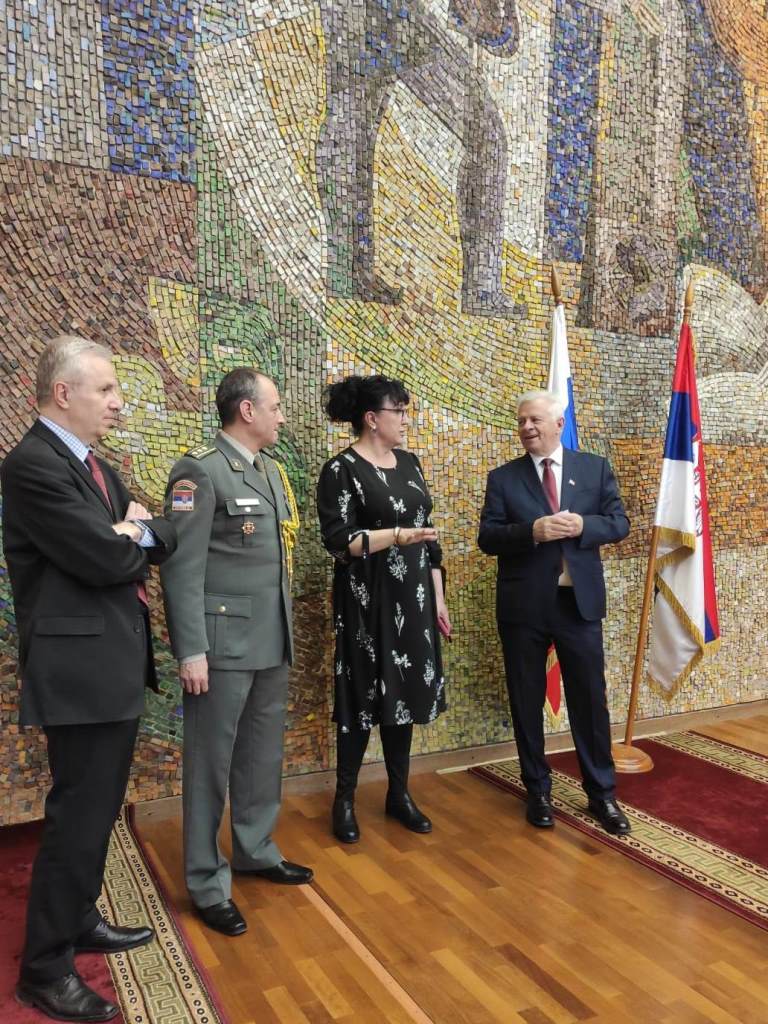 |
|
|
| The welcoming ceremony for newly appointed Honorary Counsul of the Republic of Serbia in Krasnogorsk, Mr. Alexandar Dybal |
|
Today, at the Embassy of the Republic of Serbia in the Russian Federation, we had the honour to welcome a newly appointed Honorary Counsul of the Republic of Serbia in Krasnogorsk, Mr. Alexandar Dybal, member of the Board of Directors and Deputy General Director of Gazprom Neft.
Ambassador of the Republic of Serbia to the Russian Federation, H. E. Momcilo Babic congratulated Mr. Alexander Dybal on his new role as Honorary Consul of Serbia, reminded him of good diplomatic relations between Serbia and Russia throughout history. The ambassador used this opportunity to hand Mr. Dybal the title board of the Honorary Consulate in Krasnogors as well as the flag of the Republic of Serbia.
The ambassador wished the new Consul much success in his work, and expressed hope that his appointment will contribute to the development of Serbian-Russian relations, strengthening friendship and cooperation between the two countries.
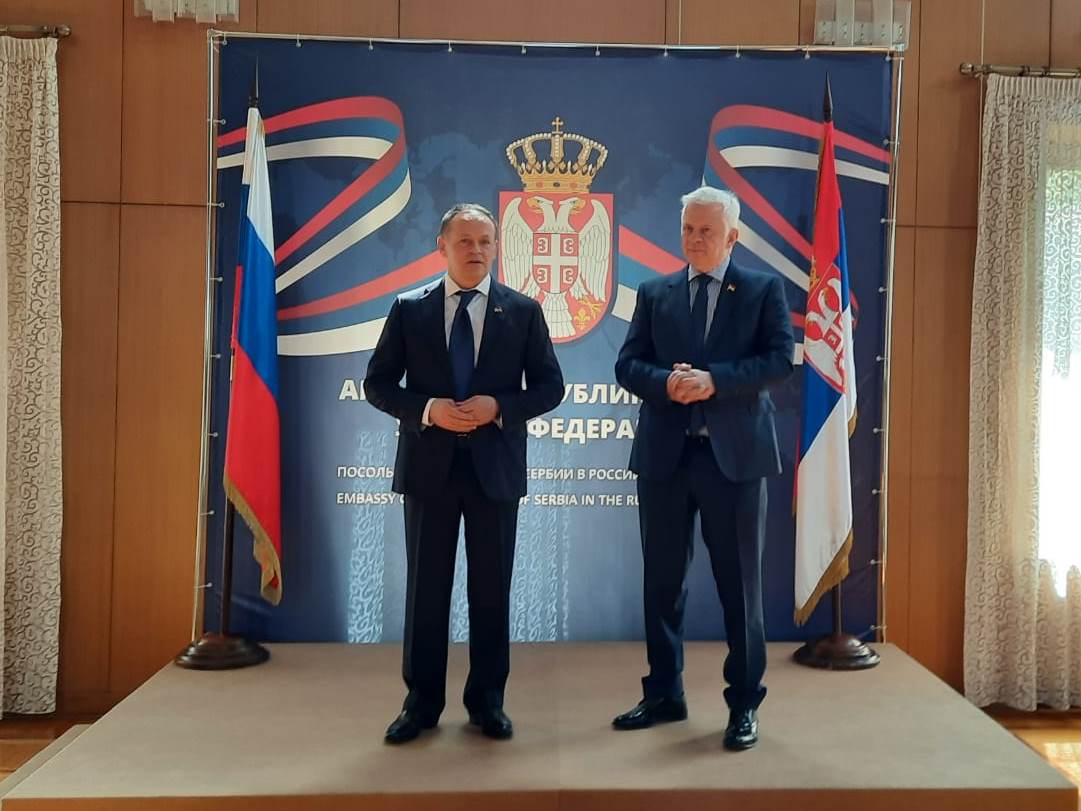
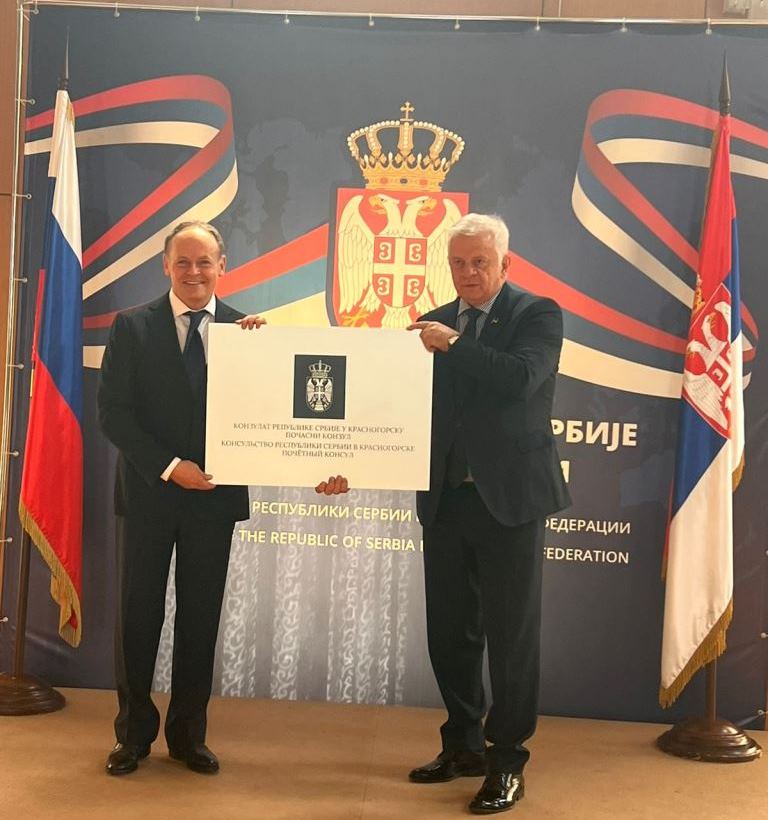
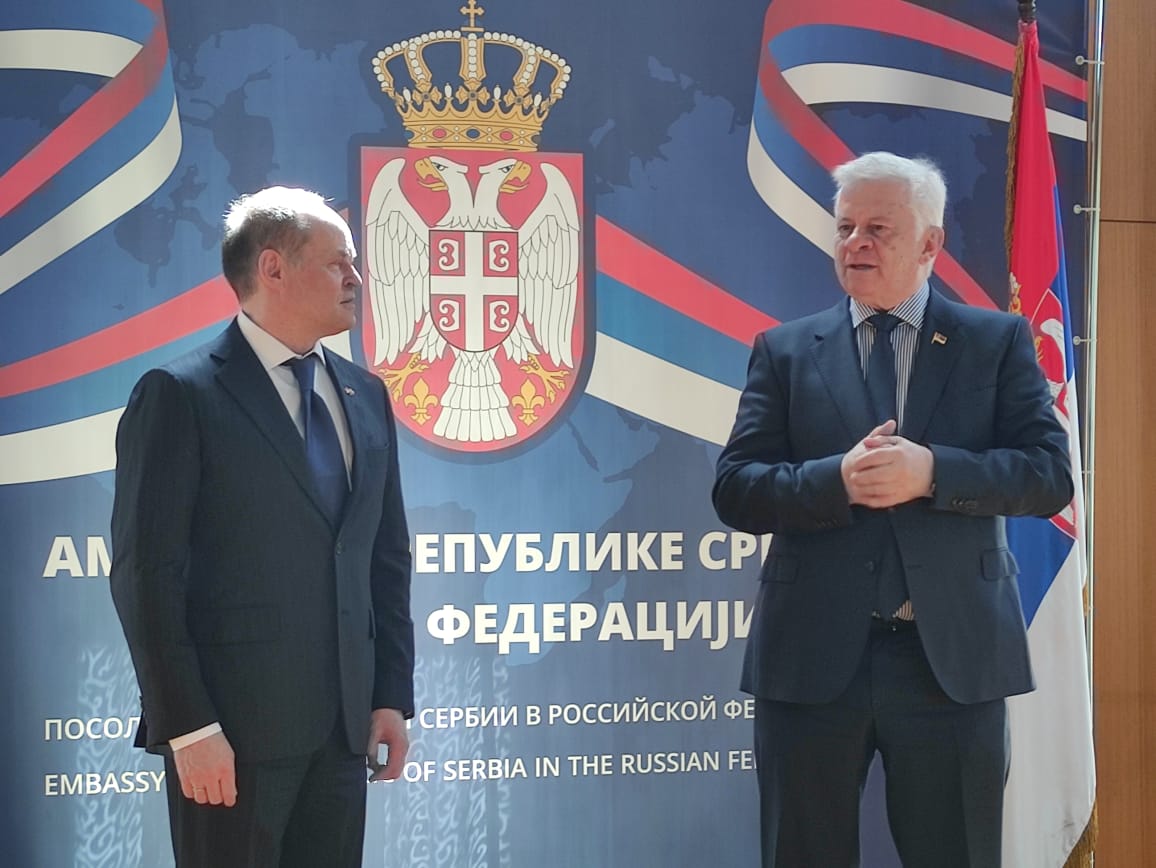 |
|
|
| In our Embassy, on May 21, with a suitable event was celebrated the day when in 1349 Dušan's Code, the most important source of medieval law in Serbia, was adopted. |
|
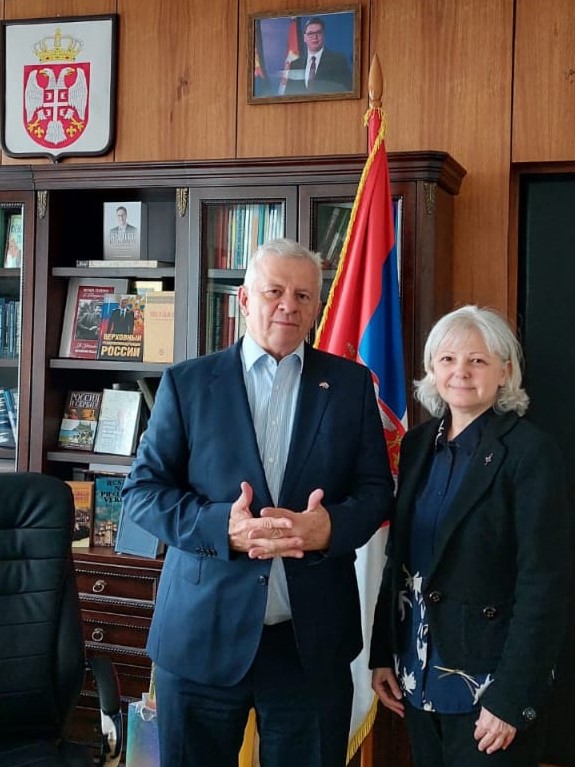
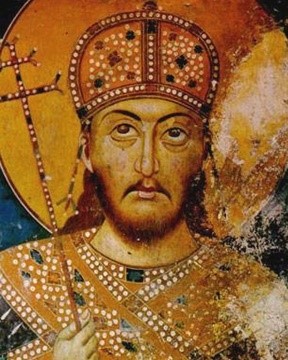
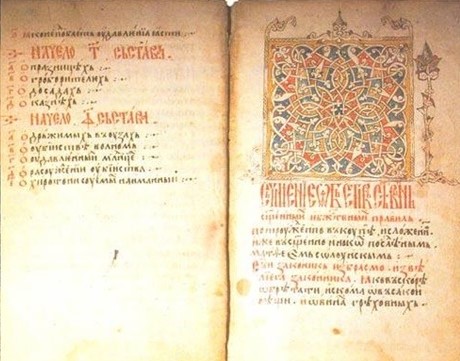 |
|
|
| Measures for the entry of Serbian citizens and foreigners into Serbia to be abolished |
As of Tuesday 3 May, all control measures and restrictions related to the COVID-19 infectious disease for the entry of passengers into the Republic of Serbia will be abolished for Serbian citizens and foreigners.
Starting from midnight, Serbian citizens and foreigners will not be required to show proof of a negative PCR test, rapid antigen test, proof of recovery from COVID-19, nor a proof of vaccination upon entering Serbia, regardless of from which country of the world they enter the Republic of Serbia.
The decision on the free entry of Serbian citizens and foreigners into Serbia has been made based on the current epidemiological situation in Serbia and is in line with decisions of majority of countries of Europe and the region.
The relevant institutions continue to monitor the development of the epidemiological situation in Serbia from hour to hour and will inform the public in a timely manner.
The recommendation to wear masks indoors remains in force, while wearing masks in health institutions is mandatory.
Covid centres, COVID-19 testing sites and vaccination sites will continue to operate as usual.
|
|
|
| Belgrade to get Centre for Fourth Industrial Revolution |
|
Prime Minister Ana Brnabic attended today in Geneva the signing of the Agreement on the Establishment of the World Economic Forum Centre for the Fourth Industrial Revolution in Serbia, the first of its kind in the Western Balkans.
The agreement was signed at the headquarters of that forum by Director of the Office for Information Technologies and eGovernment Mihailo Jovanovic and Managing Director and Head of the Forum's Centre for the Fourth Industrial Revolution Jeremy Jurgens.
The centre in Serbia will be the 16th in the network of centres of the World Economic Forum in the world and the first in the region of the Western Balkans.
The new centre will start operating on 1 March and will function as a non-profit organisation and a platform for public-private partnership and cooperation for the Fourth Industrial Revolution, while the focus of work will be on artificial intelligence and bioengineering.
This centre will work within the Serbian government’s Office for Information Technologies and eGovernment and will cooperate with scientific institutes, state institutions and the private sector.
The signing of this document was also attended by founder and Executive Director of the World Economic Forum Klaus Schwab and President of the World Economic Forum Borge Brende, with whom Brnabic had previously met.
Addressing the press, Brnabic pointed out that this agreement is the result of many years of joint work between Serbia and the World Economic Forum.
We started talking in 2018, signed a Memorandum of Understanding, then 2020 hampered us a bit, but we continued to plan in 2021 and here we are today, she said.
According to her, the centre will be focused on the development of artificial intelligence, biomedicine and biotechnology, and on the ways in which digitalisation can raise the productivity of companies and the entire economy.
This is what further leads to higher salaries, a better standard of living, as well as to an economy that is mainly based on knowledge, creativity and innovation, Brnabic emphasised.
Today, we have received great recognition for everything that Serbia has done in the field of digitalisation, development of high technologies and paradigm shift – from an economy that was based on labour-intensive investments to digital development.
That is why this agreement shows that Serbia has been recognised as one of the leaders in the economy and IT industry in the last six years, the Prime Minister pointed out and assessed that this is the announcement of the beginning of an even closer cooperation between Serbia and WEF.
She added that they will have a joint meeting with the 16 WEF centres for the fourth industrial revolution in the world every month, at which they will talk about what each of them is doing, since each has a different focus.
That is how we will hear what everyone is doing every month, learn from each other and I am sure that the centre in Belgrade will be one of the best, the Prime Minister said.
According to her, this gives us visibility, the opportunity to further establish Serbia as an investment destination, a country good for living and investing in new technologies and knowledge.
Jovanovic said that the ecosystem formed around the centre will use the infrastructure of the National Platform for the Development of Artificial Intelligence, the Centre for Genome Sequencing and the future bioeconomic centre – BIO4 Campus.
Izvor/Foto: Tanjug
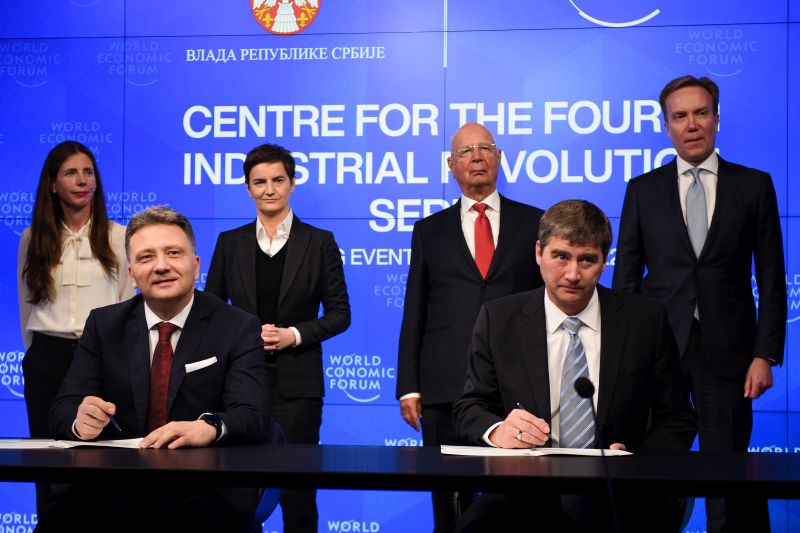 |
|
|
| Cooperation with Russia on projects in several areas |
|
Prime Minister Ana Brnabic talked today with Ambassador of the Russian Federation Aleksandr Botsan-Kharchenko about the relations between the two countries, cooperation on joint projects, but also current topics.
Brnabic expressed gratitude for the opportunity for Serbia to participate in the International Export Forum at the end of last year, as well as for the opportunity to meet with Prime Minister of the Russian Federation Mikhail Mishustin.
The Ambassador of Russia praised the very successful visit of Prime Minister Brnabic to Moscow and Serbia's participation in the International Export Forum, as a way of encouraging cooperation between businessmen of the two countries.
The two officials also discussed the implementation of digital connection projects, exchange of ideas, experiences and strategies within high-tech components, traffic infrastructure and medicine.
Brnabic pointed out that she expects further intensification of economic cooperation, but also the visit of officials from the two countries, while she expressed confidence that the Prime Minister of the Russian Federation, Mustustin, will visit Serbia soon.
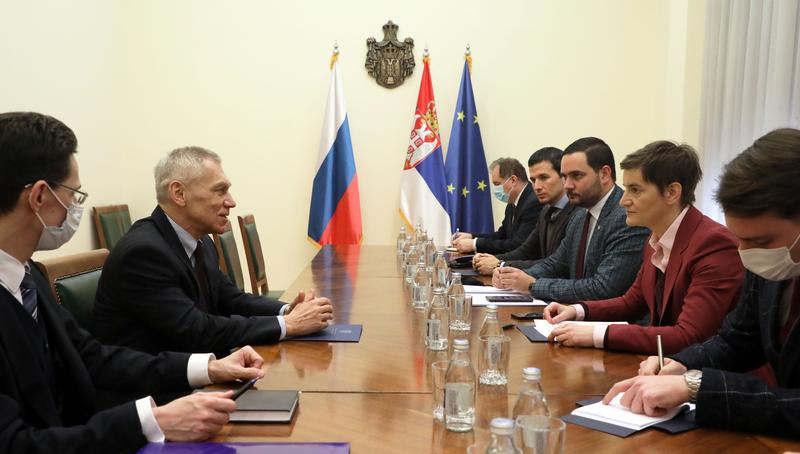 |
|
|
| New agreement on strategic cooperation with Russia to be signed soon |
|
Prime Minister Ana Brnabic stated in Moscow today that Serbia will continue to develop and improve economic, political and every other cooperation with Russia.
After a meeting with Prime Minister of the Russian Federation Mikhail Mishustin, held on the sidelines of the International Export Forum, Brnabic underlined that the relations between the two countries are exceptionally good and that they are not harmed by Serbia’s European path.
She said that economic and political relations of Serbia and Russia are very good and announced that an agreement on strategic cooperation between the two countries to 2026 will be signed by the end of this year.
The Prime Minister said that she spoke with her Russian counterpart about projects in the field of energy and gas infrastructure, recalling that on 1 January of this year Serbia became a country of transit, which brings additional stability and security, but also additional revenues into the state budget.
Brnabic underlined that gasification of Serbia will be continued and that the signing of an agreement with Russian company Gazprom Neft on the takeover of the chemical plant Petrohemija from Pancevo is expected soon, which will bring additional stability and business activity to this company.
Infrastructural projects were also discussed, the Prime Minister said and expressed gratitude for the professionalism of Russian company RZD International during the construction of the fast Belgrade-Budapest railway.
The Prime Minister pointed out that the "Belgrade Diameter" project will be implemented in cooperation with Russian partners, adding that during the talks she drew attention to the importance of keeping the Russian market open for our agricultural products, fruits, vegetables and meat.
Brnabic said that she also talked with the Russian Prime Minister about future cooperation in the field of advanced technologies, biomedicine, and artificial intelligence, which is Serbia's strategic focus of development until 2030, and in which Russia is extremely successful.
If we manage to establish cooperation in that domain, it will mean that Serbia is progressing much faster and better, and for us every day is important to make up for what we missed during the 1990s and in the first decade of the 21st century, said Brnabic.
She said that Mishustin expressed gratitude for Serbia's principled position not to impose sanctions on Russia and added that she confirmed that Serbia will continue to pursue that policy.
Source: www.srbija.gov.rs
Photo: Tanjug
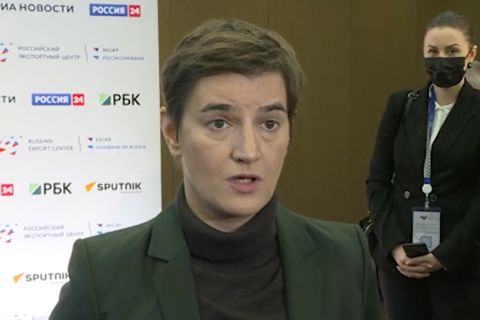 |
|
|
| Meeting with the mayor of St. Petersburg |
|
The President of the Republic of Serbia, Aleksandar Vučić, met today with the Mayor of St. Petersburg, Alexander Beglov.
On that occasion, President Vučić pointed out that the improvement of bilateral cooperation between the two cities is of exceptional importance for the establishment of more intensive relations between Belgrade and St. Petersburg. In this regard, President Vučić emphasized the importance of the Agreement on Trade, Economic, Social, Humanitarian and Cultural Cooperation, signed in September this year, which implies the expansion and strengthening of cooperation in the mentioned areas. The agreement includes, among other things, a plan of joint activities in the fields of industry, urbanism, health care, science, technology, education and tourism.
With the aim of deepening economic cooperation, President Vučić supported the initiative of the two cities to organize an investment conference, at which businessmen, in cooperation with chambers of commerce, would present the investment potentials of Belgrade and St. Petersburg and investment opportunities in these two cities.
Source/Photo: www.predsednik.rs
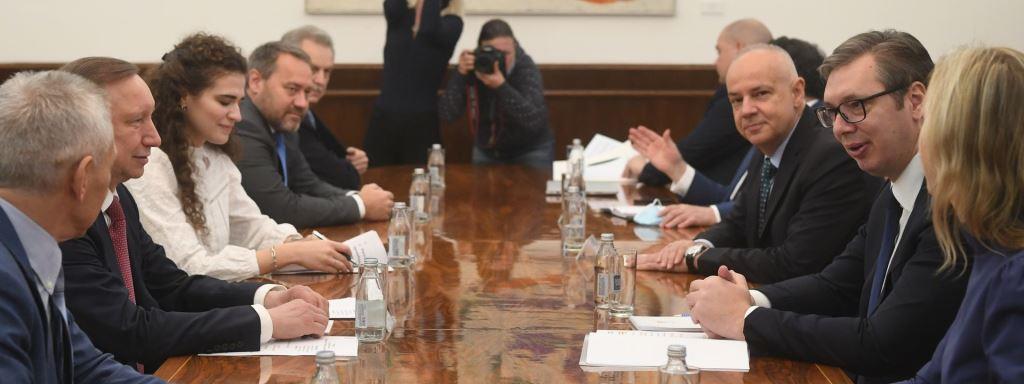 |
|
|
| Selaković spoke with the governor of St. Petersburg |
|
The Minister of Foreign Affairs of Serbia, Nikola Selaković, met today with the Governor of St. Petersburg, Alexander Beglov, and the delegation of that city.
Selaković thanked Governor Beglov, the authorities of the City of St. Petersburg and the entire Russian Federation for donating to the City of Belgrade, on the occasion of the 800th anniversary of the birth of Alexander Nevsky, a bust of the great Russian prince and saint, which was solemnly unveiled yesterday in the gate of the church of the same name.
The head of Serbian diplomacy expressed satisfaction that Governor Beglov comes from the city of President Putin, emphasizing that the personal and friendly relations between presidents Vučić and Putin have had a direct impact on the historical level of relations between Serbia and Russia.
On this occasion, the minister underlined that Serbia is firmly committed to the further development of political relations with the Russian Federation, which are based on traditional friendship and closeness of the two peoples, mutual trust and mutual readiness to deepen cooperation in all areas.
Stressing the importance of high intensity meetings at all levels, Selaković emphasized that Governor Beglov and the Government of St. Petersburg have a very important role in achieving successful cooperation with the City of Belgrade, noting that this visit will greatly benefit the recently signed agreement between the two cities, which includes a plan of joint activities until 2024. Also, the minister expressed satisfaction with the cooperation that St. Petersburg has with Novi Sad and Nis, as well as the recently introduced direct flight between Belgrade and St. Petersburg, which will additionally bring the two friendly nations closer.
Selaković pointed out that the importance that Serbia attaches to St. Petersburg is shown by the fact that in 2016, the Consulate General of our country was opened in that city, headed by the Honorary Consul General.
The minister also thanked his Russian friends for their help in financing and implementing the interior painting of the Temple of Saint Sava, which was successfully completed by joint efforts and represents a new symbol of the city of Belgrade, but also a symbol of successful cooperation between the two countries and the fraternal harmony of the two peoples.
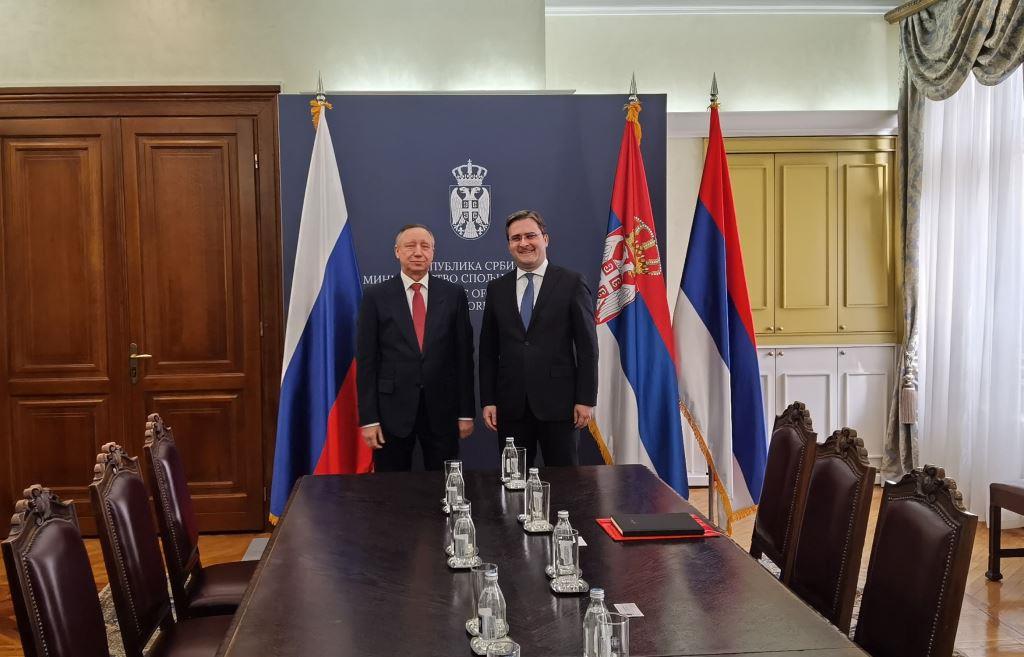
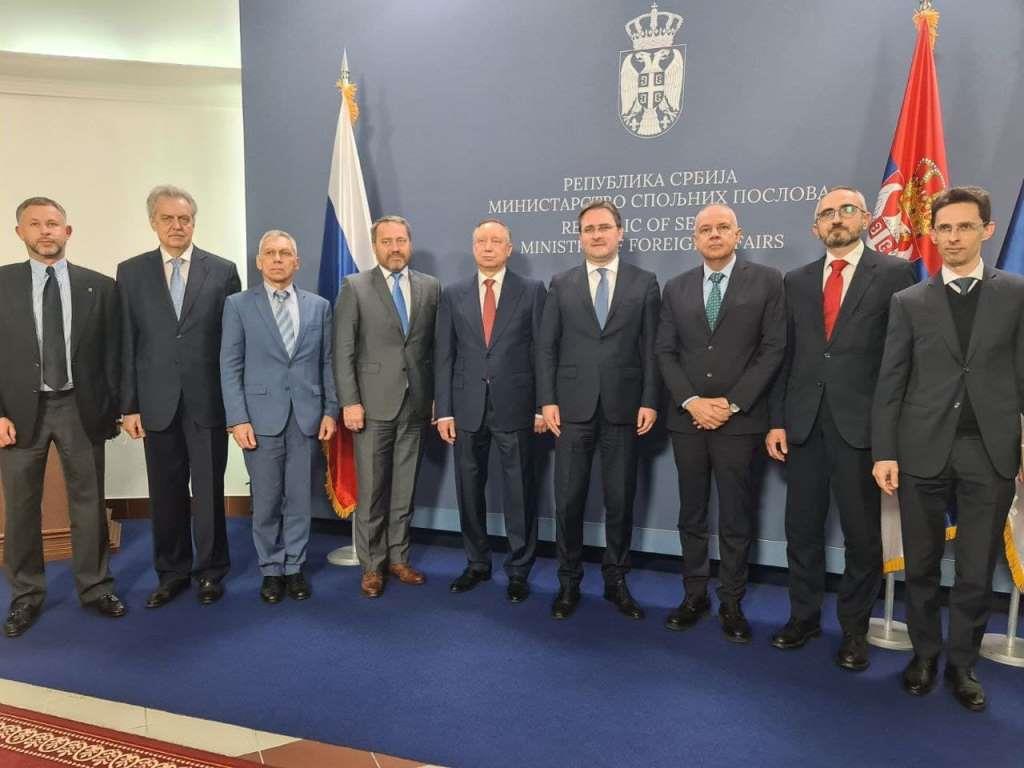 |
|
|
| Meeting with the general director of the Russian state corporation "Rosatom" |
|
The President of the Republic of Serbia, Aleksandar Vučić, met today with the General Director of the Russian state corporation Rosatom, Alexey Likhachev.
The two interlocutors discussed the implementation of the Agreement between the Government of the Republic of Serbia and the Government of the Russian Federation on cooperation in the construction of the Center for High Technology and Innovation in the Republic of Serbia for medical, scientific, agricultural, industrial and social development.
During the meeting, President Vučić emphasized the importance of building this research center in order to raise the capacity of the Republic of Serbia, primarily in the field of medicine, medical diagnostics and health care of the population. "The center will be intended for the development of new methods to help in therapies in oncology, pulmonology, cardiology, hematology, neurology, endocrinology and other fields of medicine", President Vučić pointed out.
The implementation of this project will be carried out after the signing of two agreements during the stay of President Vučić in the Russian Federation next week.
Source/Photo: www. predsednik.rs
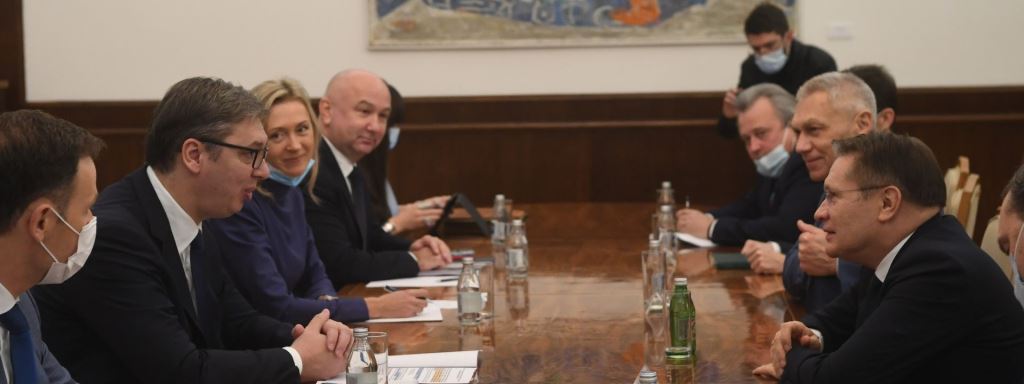 |
|
|
| Serbia attaches great importance to improving relations with Russia |
|
The Prime Minister of the Republic of Serbia, Ana Brnabić, talked today with the Ambassador of the Russian Federation to Serbia, Alexander Botsan-Kharchenko, about the relations between the two countries, partnership and cooperation on joint projects.
Botsan-Kharchenko handed the prime minister an invitation from Russian Prime Minister Mikhail Mishustin to participate in the International Export Forum, which is being held in Moscow on 10 December.
He pointed out that this year's forum, in which Serbia will participate as a partner country, will be dedicated to exporters, experts, officials and development institutions, as well as current issues on the possibilities of increasing exports.
The prime minister expressed gratitude for the invitation to participate in this important international platform and pointed out that Serbia attaches great importance to improving both economic and overall relations with Russia, as an important strategic and one of the most important economic partners of Serbia.
In light of the forthcoming visit to Moscow, the interlocutors stated that the traditional partnership and sincere ties between the two peoples represent a mutual obligation of our states to remain committed to the improvement and expansion of bilateral relations, through meetings of officials at the highest level and building partnerships.
When it comes to the current epidemiological situation, the ambassador of Russia informed Brnabić that the country has started using the new vaccine against COVID-19 "Sputnik Light" in order to fight the virus as effectively as possible.
Source/Photo: www.srbija.gov.rs/Tanjug
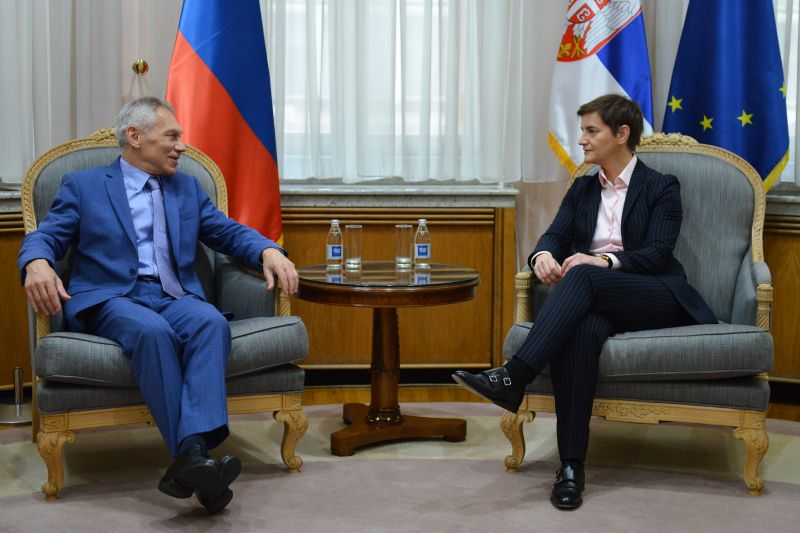 |
|
|
| UNESCO’s role extremely important for preservation of Serbian heritage in Kosovo and Metohija |
|
Prime Minister Ana Brnabic stated today that severe examples of endangering the Serbian cultural, historical and spiritual heritage in Kosovo and Metohija are proof of the important role of UNESCO in protecting and preserving heritage.
At the 41st session of the General Conference of UNESCO in Paris, Brnabic emphasized that four jewels of the Serbian medieval cultural heritage in Kosovo – Visoki Decani, Pec Patriarchate, Gracanica and Bogorodica Ljeviska, have been preserved thanks to the fact that they are inscribed on the endangered world heritage list. Hundreds of other sites and monuments are endangered.
The Serbian heritage in Kosovo and Metohija is of immeasurable importance, not only for the national identity of Serbia, but also as a part of the esteemed European and world heritage, she underlined.
Source/Photo: www.srbija.gov.rs
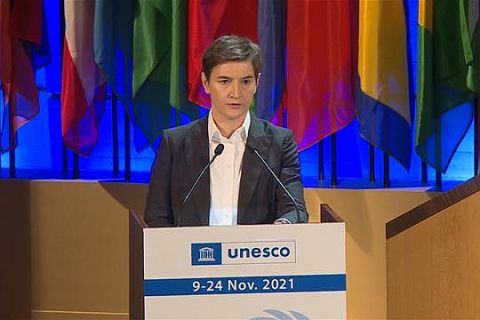 |
|
|
| Meeting of the President of Serbia with the Ambassador of the Russian Federation |
|
The President of the Republic of Serbia, Aleksandar Vučić, received the Ambassador of the Russian Federation, Alexander Botsan-Kharchenko today, with whom he discussed preparations for the upcoming visit to the Russian Federation and the meeting with President Vladimir Putin, as well as joint Serbian-Russian projects and current regional and global issues.
President Vučić emphasized the importance of his upcoming visit to Moscow, having in mind the reputation and influence of the Russian Federation and President Putin on the world political scene, as well as in world economic trends. Ambassador Botsan-Kharchenko said that he was convinced that this visit would also be successful, as well as all previous ones, given the friendly relations and good cooperation between the two countries.
The interlocutors assessed that the forthcoming visit of President Vučić will be the continuation of exceptional political dialogue between Serbia and Russia, which is intensifying from year to year, and that it represents an expression of mutual desire for all-round progress in cooperation between the two countries.
On this occasion, President Vučić said that President Putin understood the position of Serbia and reiterated his gratitude for the support on the issue of Kosovo and Metohija, i.e., the territorial integrity and sovereignty of Serbia.
President Vučić and Ambassador Botsan-Kharchenko discussed activities after the session of the Intergovernmental Committee for Trade, Economic and Scientific-Technical Cooperation and the visit of the Deputy Prime Minister of the Russian Government Yury Borisov.
President Vučić emphasized that the realization of joint infrastructure and energy projects is being realized in accordance with the deadlines, and that in parallel we are working on other concrete proposals for closer cooperation in numerous areas of mutual interest.
In addition to bilateral relations, President Vučić and Ambassador Botsan-Kharchenko also discussed current issues in the region and the world.
Source/Photo: www.predsednik.rs
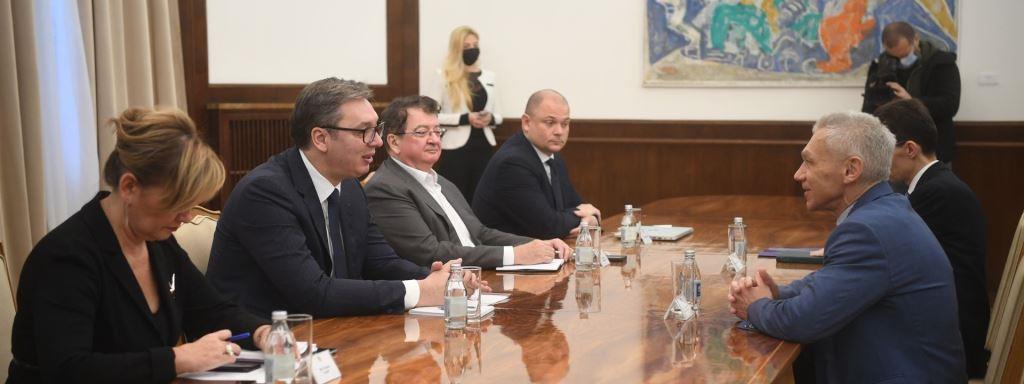
|
|
|
| Address of the President of the Republic of Serbia at the United Nations climate change conference COP26 held in Glasgow |
|
"Your Excellences,
distinguished delegates,
dear Sarah,
At the very beginning, I feel obliged to thank Prime Minister Boris Johnson and Her Majesty’s Government for exceptional hospitality.
I feel privileged to represent the Republic of Serbia at this important place and at the highest-level world forum, in working on the most important topic of today – promoting climate awareness.
We all agree that we must make investment into climate and environment.
We all, likewise agree, that future generations must be educated in order not to repeat the mistakes we made, by hurting the only Planet that makes life possible.
I am very honoured that the Republic of Serbia is co-chairing this year’s Conference as a Non-EU representative of the Eastern Europe Group.
In concrete terms, we see the special contribution of our expert team in finalising negotiations on the implementation of Article 6 of the Paris Agreement, which refers to the establishment of the global market and non-market mechanisms for reducing greenhouse gas emissions, as well as to remaining provisions referring to advanced transparency framework and common timeframes for Nationally Determined Contributions, which are the key provisions of the Agreement that have not yet been covered by the decision that is to be adopted by the Conference, i.e. all member states.
We, therefore, believe that this is an exceptional opportunity for Serbia to give its full contribution to the finalization of negotiations, which, we hope, will secure full implementation of the Paris Agreement.
As a result of strong economic development, modelled for Serbia by 2050, the impact of the implementation of climate measures to employment will be optimal, through new jobs creation and creation of new industries which have not existed so far.
One billion euros was raised at the first green bonds auction in Serbia, which clearly confirms the trust of international investors in our green agenda, but also to the economic and political stability of our country.
Incomes from green bonds issuance will be used for financing renewables, energy efficiency, sustainable water management, prevention of pollution and circular economy development and biodiversity preservation.
And as you can see, dear friends, my people made a terrific speech for me, but I am going to add a few more words and a few more questions for those that are coming from big powers and that haven’t answered yet several questions:
Number one is: how are we going to finance all these activities?
We’ve heard the story of trillions of dollars that are at our disposal. My question would be: what would be the interest rate, what would be the terms for taking these amounts of money, and actually how are we going to tackle that issue?
Number two: how are we going to treat the nuclear power plants? Are we going to shut them all or are we going to build them more?
Then, how are we going to build more renewables if we already started endorsing populist movements against wind parks, new hydropower plants, and are we going to put in jeopardy the level of our public debt to GDP ratio if we raise huge amounts of money?
How are we going to treat natural gas, and how are we going to secure decent prices of natural gas and electricity power as well?
And, I came here using an electric car from Edinburgh to Glasgow. But, how are we going to do mining and refining of lithium, nickel, cobalt and many other very important minerals?
In the end, we all know what is our final aim, what is our final target. But, it’s not a fairytale – we’ll have to work a lot, we’ll have to be 100 per cent dedicated, and we’ll have to be more honest with each other.
The health of people living in Serbia depends directly on the implementation of this Agenda, just like the health and life of each living being on Earth depends on arrangements that will be reached here and on national implementation of the respective arrangements.
Perhaps it is the right time to listen and hear the cry of Mother Earth because if we lose this race against time, our children will inherit an irreparably polluted Planet.
Thank you very much for listening to me."
Source: www.predsednik.rs
Photo: Dimitrije Goll
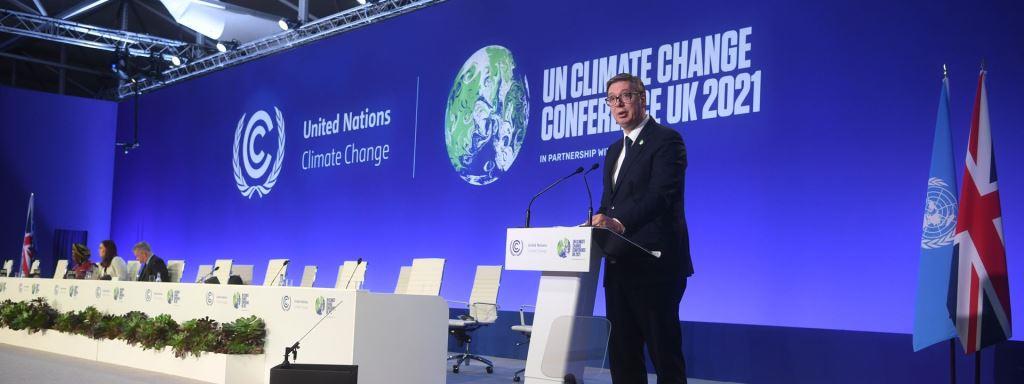
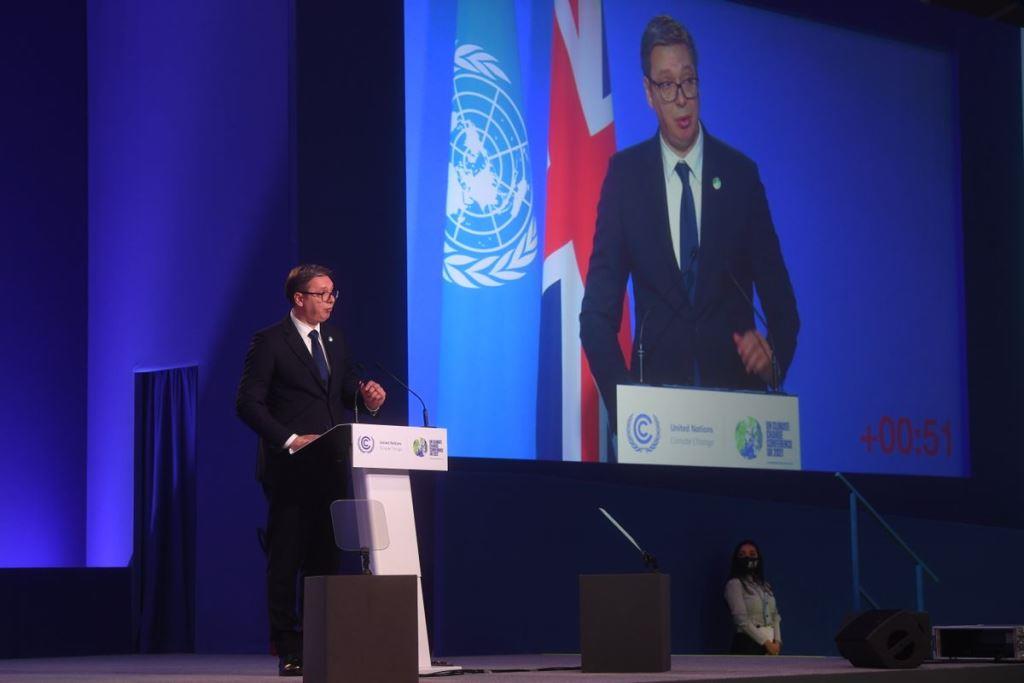 |
|
|
| On October 18, 2021, Chargé d'Affaires Slavoljub Carić talked with the Israeli Ambassador to the Russian Federation, Alexander Ben Zvi |
|
On October 18, 2021, Chargé d'Affaires Slavoljub Carić talked with the Israeli Ambassador to the Russian Federation, Alexander Ben Zvi, at a reception on the occasion of the 30th anniversary of the establishment of diplomatic relations between Israel and the Russian Federation, organized at the Тsariтsyno Palace Museum.
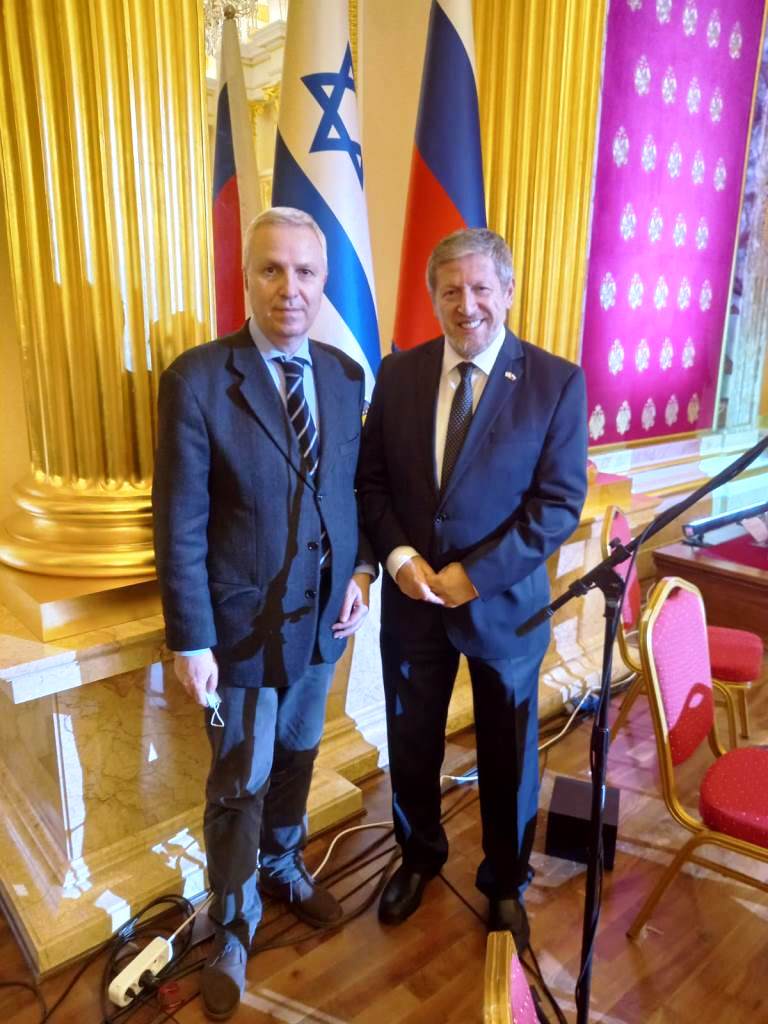 |
|
|
| Meeting of the President of the Republic of Serbia with the Deputy Prime Minister of the Russian Federation |
|
The President of the Republic of Serbia, Aleksandar Vučić, met today with the Deputy Prime Minister of the Russian Federation and the Co-Chair of the Intergovernmental Committee for Trade, Economic and Scientific-Technical Cooperation between the Republic of Serbia and the Russian Federation, Yuri Borisov, with whom he discussed cooperation in the field of energy, industry and infrastructure. The interlocutors also discussed other areas with great potential for cooperation.
President Vučić thanked the Deputy Prime Minister of the Russian Government, Yuri Borisov, for his great personal and professional commitment in the development of relations between the Russian Federation and Serbia. On this occasion, the President personally handed over a birthday card for President Vladimir Putin, asking Yuri Borisov to convey his best wishes and cordial greetings, with an invitation to visit Serbia again as soon as possible.
President Vučić assessed that the strategic relations between the two countries are at an extremely high level, and that these relations are still progressing. President Vučić and Russian Deputy Prime Minister Borisov stated that the implementation of joint infrastructure and energy projects is progressing well, as well as that all projects follow the planned dynamics.
Talking about the current global energy crisis, President Vučić assessed that in that context, the gas pipeline connecting Bulgaria and Hungary through the territory of the Republic of Serbia is of the greatest importance for Serbia, not only in terms of attracting investments and the progress of industrial production, but also in terms of the energy security of the country. The interlocutors expressed confidence that the cooperation with the Russian Federation in this area will contribute to the secure supply of gas to our country, but also to greater efficiency in gas transport while respecting the highest environmental standards.
Vice President Borisov conveyed President Putin's greetings to President Vučić, saying that political and economic relations between the two countries are at the highest level in recent history. Borisov especially emphasized the high degree of trade relations, as well as the interest of the Russian side in higher exports of Serbian goods and services to the market of the Russian Federation.
The President of the Republic of Serbia, Aleksandar Vučić, emphasized that the strong potential for placing our products on the Russian market is still not sufficiently used, and reiterated Serbia's readiness to form joint Serbian-Russian production companies, which would place goods on third markets.
At the meeting, President Vučić and Deputy Prime Minister Borisov also discussed concrete proposals for future cooperation in the field of infrastructure and energy, as well as in other areas of mutual interest.
Source/Photo: www.predsednik.rs
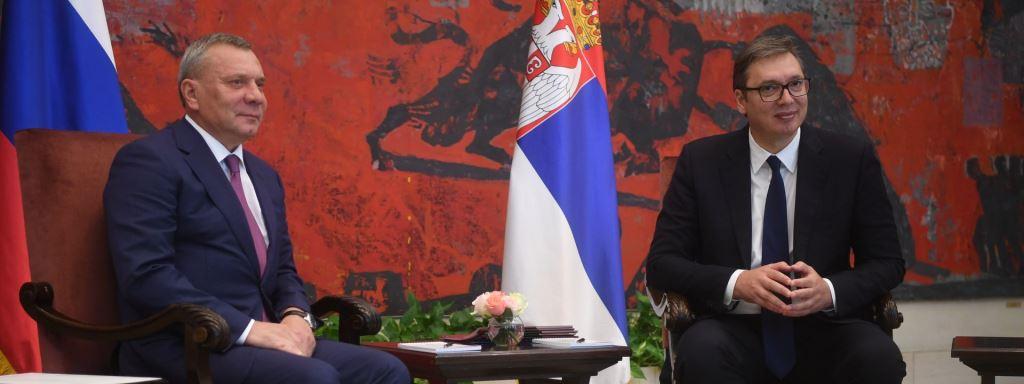 |
|
|
| Congratulations to the President of the Russian Federation |
|
The President of the Republic of Serbia, Aleksandar Vučić, sent a birthday greeting today to the President of the Russian Federation, Vladimir Vladimirovič Putin, in which he wished him good health and "plenty of new opportunities for personal and professional progress".
President Vučić also expressed hope that he would have the opportunity to host President Putin in Serbia soon, so that the two statesmen could "continue the constructive and always meaningful talks".
Source/Photo: www.predsednik.rs
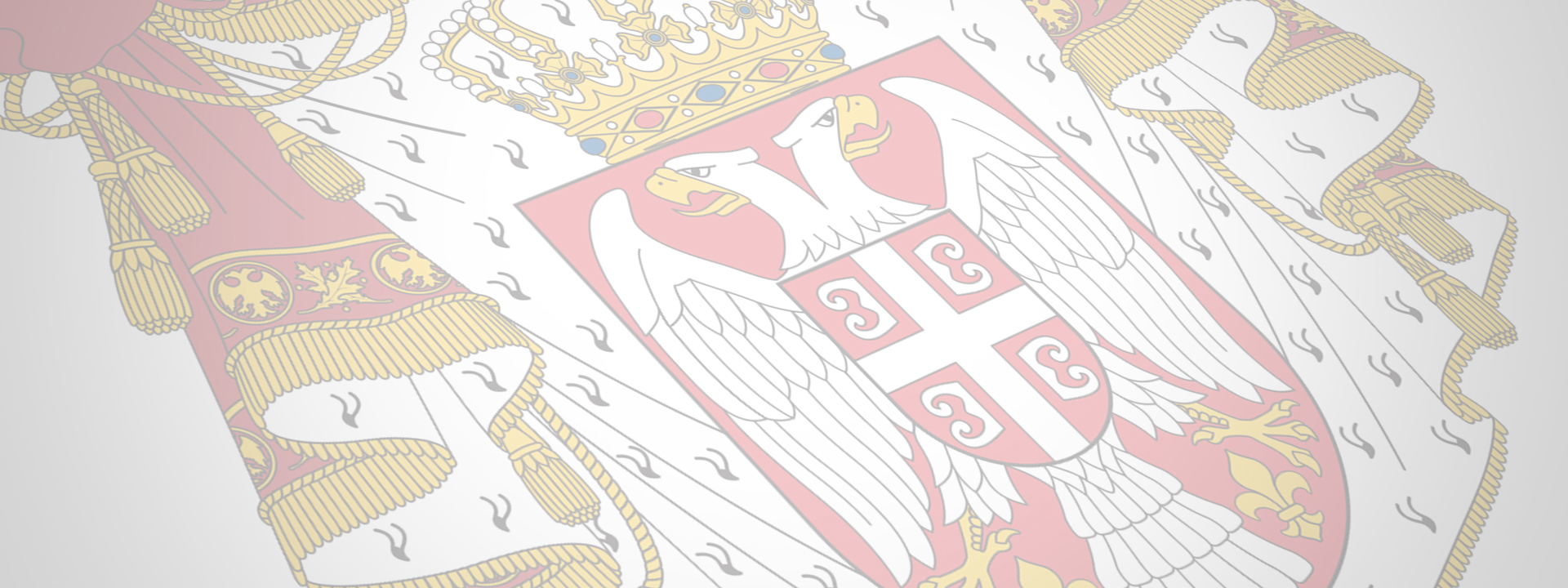 |
|
|
| President Vučić met Ambassador of Russian Federation |
|
The President of the Republic of Serbia, Aleksandar Vučić, has received today the Ambassador of the Russian Federation, Alexander Botsan-Kharchenko and thanked for the support of the official Moscow with regards to Kosovo and Metohija.
Ambassador Botsan-Kharchenko said on this occasion, too that Moscow monitored with great concern the situation in the north of Kosovo and Metohija. He also indicated that the responsibility for the emerged crisis was on temporary institutions in Priština, which violated and failed to fulfill the agreements signed earlier. Ambassador Botsan-Kharchenko also emphasized that the Serbian party acted with the greatest responsibility, whereas Priština did not show a single sign that it was for finding a compromised solution.
President Vučić thanked for the active support of the Russian Federation to the territorial integrity and sovereignty of the Republic of Serbia.
President Vučić and Ambassador Botsan-Kharchenko discussed joint Serbian and Russian projects within the preparations for new session of the Intergovernmental Committee for Trade, Economic, and Scientific and Technical Cooperation and visit of the Deputy Prime Minister, Yury Borisov.
President Vučić said on this occasion that he hoped he would have the honor in the following months to discuss with the President of the Russian Federation, Vladimir Putin.
Source/Photo: www.predsednik.rs
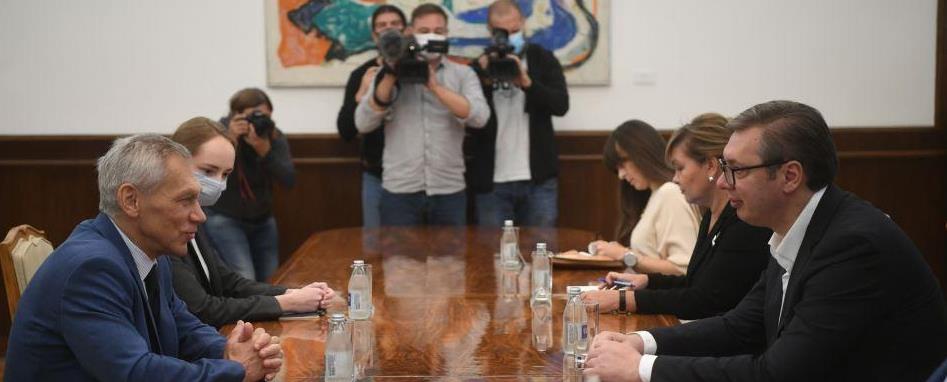 |
|
|
| Selaković: Great importance of selfless and principled Russian support to Serbia |
|
The Minister of Foreign Affairs of Serbia, Nikola Selaković, has discussed in New York today with the Minister of Foreign Affairs of the Russian Federation, Sergey Lavrov.
Selaković emphasized that the relations of Serbia and Russia were honest, open and traditionally friendly which was evidenced by exceptionally good cooperation in all fields.
He highlighted the constant strengthening of the political cooperation, to which, according to Minister’s words, great contribution were regular meetings at the top and high level. Selaković especially put focus on excellent relations of presidents Aleksandar Vučić and Vladimir Putin as the ones of special importance for the comprehensive cooperation.
The Serbian Foreign Minister indicated also to very good communication realized by the two ministries of foreign affairs reminding about the visit of Minister Lavrov to Serbia and his visit to Russia and invited the Russian Foreign Minister to the official visit to Serbia.
The interlocutors discussed the situation in the Western Balkans region as well as the forthcoming session of the Security Council dedicated to the regular report of the UN General Secretary on the operation of the UNMIK Mission in K&M.
On this occasion as well, Selaković thanked for the selfless and principled support of Russia to the territorial integrity and sovereignty of Serbia. He emphasized also the importance of strong support of Russia to our country’s and national interests in international fora, especially in the UN and Security Council.
Furthermore, Selaković informed his Russian colleague on the situation in K&M and the most recent unilateral activities and provocations of Priština, thanking for the manner in which the Russian Ministry of Foreign Affairs responded to the latest entrance of special forces of Priština’s police to the north of the province.
The interlocutors discussed also the situation with the pandemic in both countries as well as about further cooperation in the fight against coronavirus and initiated production of “Sputnik B” vaccine in Serbia.
Selaković mentioned that he hoped that Minister Lavrov and Russian delegation would take part at the summit in Belgrade on the occasion of the celebration of the 60th anniversary of the First conference of the Non-Allied Movement adding that it would be a great opportunity for their new bilateral meeting.
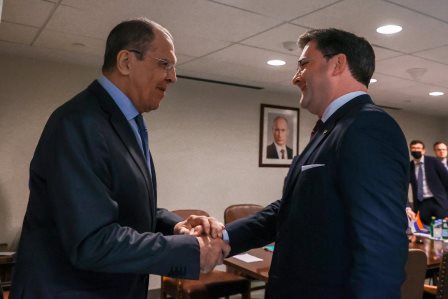
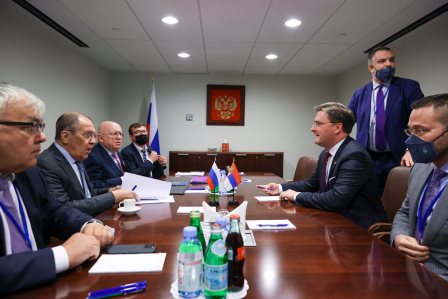 |
|
|
| Selaković in New York with 28 foreign ministers on economic successes of Serbia and K&M situation |
|
The Minister of Foreign Affairs of Serbia, Nikola Selaković, has stated that in New York he introduced foreign ministers of 28 countries to economic success of Serbia but also to the situation in Kosovo and Metohija, which he also discussed with the Russian Minister of Foreign Affairs, Sergey Lavrov, who told him that we could count on the support of the Russian Federation, with regards to Serbian interests in K&M.
Summarizing results of his visit to New York within the session of the UN General Assembly, Minister Selaković says that one of the last meetings was with Minister Lavrov, which was their third meeting in the previous nine months.
The Serbian Foreign Minister says that he surely used this opportunity, too, to introduce Minister Lavrov to the latest events in northern Kosovo and Metohija, the situation of the dialog between Belgrade and Priština and very clear and unambiguous attitude of President Aleksandar Vučić regarding the continuation of the dialog and subsequent events in K&M.
“We discussed the principled support of the Russian Federation, which is constantly present not just in Moscow, Belgrade, in the field, but also here in the East River, by the delegation of the Russian Federation as the permanent member of the UN Security Council. Of course, we will continue to maintain this type of dialog. What Minister Lavrov said was that we could count on the support of the Russian Federation in future with regards to our interests in K&M”, highlighted Minister Selaković.
He said that he had had the opportunity in New York to hold 33 meetings, of which 28 with ministers of foreign affairs, whom he had introduced also to topicalities related to the latest events in Kosovo and Metohija, but also to our principled position regarding the observance of the international public law, territorial integrity and sovereignty.
Minister Selaković said that his colleagues at the meetings had praised the substantial and fantastic success of Serbia in the consolidation of the economic sphere and transformation of what had been on the edge of collapse and economic disaster seven years before to the fastest growing economy in Europe, which Serbia was in the past two years.
He said that most of his interlocutors had supported our reforms and expressed great respect toward what President Aleksandar Vučić and Serbia had done in the previous period.
Many of them, says the Serbian Foreign Minister, showed great interest in the manner in which Serbia organized the figth against Covid 19.
“It was a great pleasure and pride to represent the Republic of Serbia in all these meetings. Many of my colleagues confirmed their arrival to Belgrade to the Conference on 11th and 12th October, which is dedicated to the 60th anniversary of the foundation of the Non-Allied Movement”, said Minister Selaković.
He emphasized that it was not just the evidence of how much they had cared to come to Belgrade to the conference, but also to see and witness the Serbia which after several decades of attempts to fight different challenges rose to its feed, was economically consolidated and turned towards its traditional friends.
“That is a great deal and our country will surely during October be one of the spots on Earth of greatest importance for multilateralism, for cooperation among the countries which share the same values, the values entered into the UN Charter and which are based on the promotion and fight for peace, equality, observance of the international public law and rights of every country to pursue its path to happiness and better and more ordered society in compliance with the wishes of its population”, said Minister Selaković.
He said that the Minister of Foreign Affairs of Azerbaijan, Jeyhun Bayramov, would come to Belgrade to the conference on the occasion of the Non-Allied Movement adding that we had strategic cooperation with Azerbaijan and frequent contacts.
“We agreed to realize as soon as possible after the Belgrade conference his bilateral visit to Serbia”, added Minister Selaković.
He said that it had been agreed to intensify the cooperation and finalize the agreements which should be signed and after that realized when the meeting of Serbian President Aleksandar Vučić and Azerbaijan President Ilham Aliyev took place.
Minister Selaković says that the Ministry of Foreign Affairs had recently received its sector for economic diplomacy and there were great expectations from it and one of the tasks was to deepen the cooperation with Azerbaijan.
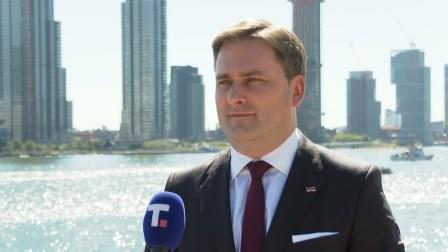 |
|
|
| Telephone conversation of President Vučić and General Secretary of NATO |
|
The President of the Republic of Serbia, Aleksandar Vučić, has discussed today by phone with the General Secretary of NATO, Jens Stoltenberg about, as the General Secretary said, worrisome situation in northern Kosovo and Metohija.
President Vučić said that Serbia had not violated either Brussels Agreement or Resolution 1244 by anything, by any single move or in any manner jeopardized peace preservation.
“The complete occupation by armored vehicles of northern Kosovo and Metohija has lasted for seven days and it is conducted by Priština and everyone in the international community “are thunderously silent”, said Serbian President. “However, everyone is worried all of a sudden when they spot Serbian helicopters and airplanes at the territory of central Serbia, because apparently they should not exist, or should not take off until they receive the approval from Kurti or someone from the international community”, says President Vučić.
Serbia observes all international agreements it signed, Serbia will always conduct responsibly and seriously, but Serbia is still asking when the formation of SMC will start and when Kurti’s armored units will be withdrawn from northern Kosovo and Metohija.
Finally, with the gratitude to General Secretary Stoltenberg for the fair relation and wish to listen to the Serbian side, President Vučić asked about the norm and international regulation violated by Serbia? Today, yesterday or any time?
The two interlocutors agreed to stay in constant touch due to necessity of the preservation of peace and stability in the entire region.
Source/Photo: www.predsednik.rs
 |
|
|
| Pristina seriously jeopardised regional stability |
|
Prime Minister Ana Brnabic warned today that Pristina has seriously jeopardised local and regional stability after sending heavily armed special units to the north of Kosovo who are exerting ` against the peaceful Serbian population.
Brnabic spoke at the general debate of world leaders, as part of the 76th session of the UN General Assembly in New York.
We bring the Prime Minister's speech in its entirety:
Mr. President,
Mr. Secretary General,
Excellencies,
Ladies and gentlemen,
I have the great honor to address you today on behalf of the citizens of the Republic of Serbia.
Esteemed Excellencies Mr. Abdulla Shahid, Mr. Volkan Bozkir and Mr. António Guterres, I would like thank you for the active engagement, dedication, and leadership you have shown during these difficult times for the United Nations and all of humanity.
Serbia shares your conviction and we remain fully committed to supporting your efforts.
This year, we come together at a decisive moment in our history.
Covid-19 has shaken our foundations to the core.
At the same time, we are increasingly witnessing and experiencing effects of climate change.
And, finally, we are seeing significant shifts in global partnerships and alliances, trade wars between traditional partners and allies, protectionism instead of openness and free market, and overall uncertainty at an unprecedented scale.
Some of the pressing and extremely emotional issues that we have locally, in the Balkans, are still unresolved and while we are trying – and Serbia is especially dedicated to this – to change the future by working together and creating alliances, through initiatives such as the Berlin process or Open Balkan, others are trying to disrupt these processes, and instead of focusing on the future, they want to recreate the past – whatever the cost of that may be.
But, let me start with COVID:
COVID-19 pandemic has exposed critical weaknesses in the architecture of global governance. It has threatened to erase the progress many nations have achieved in recent years.
It has placed nations at a junction between isolation and collaboration, between panic and hope, between chaos and order.
The pandemic questioned some of the basic tenets of the open and cooperative international order.
Global exchanges, international communication, cross-border trade have all seen a vast decrease.
Curfews, restrictions on freedom and lockdowns of entire societies have created uncertainty in many segments of the individual lives of our citizens or – for that matter – our own individual perception of what freedom in today’s world even means.
For Serbia, this pandemic threatened to undermine everything we have been doing for the past 7 years, to crush all of the results and accomplishments of difficult reforms we initiated in 2014, and to propel us back to the times of high unemployment, rising public debt, uncontrollable deficit, and overall desperation.
Much as in any other country, COVID-19 has tested our nations’ resiliency and, this time, unlike during the global financial crisis – which was of much more limited scope and incomparable in consequences to COVID-19 pandemic – Serbia stood strong.
The reforms we undertook in the pre-COVID times made us more resilient than ever.
The fiscal consolidation, the budget surplus we had, efficient and predictable investment environment, became a lifeline that saved us from a recession during the pandemic and one that ensured we could support our citizens and our economy during these, most difficult of times.
Despite the effects of the crisis, Serbia has managed to preserve financial and economic stability. In 2020, we recorded a decline in GDP of only 0.9% – one of the best results in Europe. Our public debt remained below 60% of our GDP, average salary continued to grow by almost 10%, while despite the pandemic the number of people employed increased by over 3%.
The recovery in this year has been stronger than expected – our GDP will grow approximately 7%, and perhaps even stronger.
Prior to the pandemic, we have opened our borders to investment, technology, and ideas, and we managed to create peaceful and stable environment that allowed us to pursue rapid domestic transformation, with innovation and knowledge-based economy as the foundation.
The innovative advances we had made allowed us to diversify our capabilities when the virus hit – through e-Government, online education and digital textbooks, or central software system for a successful vaccination rollout.
We invested heavily in health infrastructure and strengthened the health system in order to respond to the current crisis, eternally grateful to the health care workers for their dedicated struggle.
Our decision to put geopolitics aside, and people at the center of our policies, is the reason we were able to acquire vaccines quicker than most other nations.
We did not discriminate between manufacturers, did not care whether vaccines are from the East or from the West, but chose to negotiate with all vaccine manufacturers deemed safe by regulators. This openness gave us the ability to purchase vaccines from around the world, giving our citizens the unique freedom to choose which vaccine they prefer.
Excellencies,
Serbia believes in solidarity between nations, multilateralism and helping others when in need.
Since the beginning of this year, we have made it our mission to support our neighbors, and all those in need, with COVID-19 vaccines and we have also allowed foreign nationals to come to Serbia to receive the vaccine which will protect their lives.
In total, Serbia has donated or allocated over a million doses of vaccines – of which 230.000 doses to the region; 300.000 doses for foreign nationals which came to Serbia to get vaccinated; and additional 570.000 doses to countries of Africa and Asia.
We will keep doing so, to the greatest extent possible, and until COVID-19 is behind all of us.
That is why we have also taken steps to acquire the technology to produce at least two types of COVID-19 vaccines to help improve global access so we can all be safe and victorious.
However, as stated by dignitaries of some of the largest nations during this General Assembly, there are other pressing issues that all of us need to keep addressing without any delay and in a bold manner – and that is climate change.
Serbia has redoubled its efforts to make our country safer and cleaner for its citizens, and by doing so, contribute to the fight against climate change and for environmental protection.
We are strongly committed to the implementation of the sustainable development goals and the Paris Agreement on Climate Change. We are committed to global efforts and will continue to work actively to meet our obligations under the UN Framework Convention on Climate Change.
We are about to submit our revised Nationally Determined Contributions to contribute to this critical global effort. We have already announced our intention to reduce greenhouse gasses for at least 33.3% compared to 1990, and 13.2% compared to 2010, which we are currently incorporating into our energy and climate strategic documents.
We work strategically on planning and investments in this sector. These investments are extremely expensive, requiring years and decades of commitment and a systemic approach - but we are clearly set on the path of this transformation.
Ladies and gentlemen,
Of all the challenges we face, the most worrisome for Serbia is the maintenance of peace and stability in the southern Serbian province of Kosovo and Metohija.
For more than two decades, we have been constantly drawing international attention to the problems that non-Albanian population is facing in Kosovo and Metohija. Physical safety, respect for and protection of human rights, especially of minority communities, are far from satisfactory.
We are now witnessing a constant increase in the number of attacks targeting Serbs, their property and religious heritage in Kosovo and Metohija.
To illustrate, there were 55 such incidents in 2014, 62 in 2016, 71 in 2020, and 100 since the beginning of this year. The total number of attacks in 2020 has already been surpassed by June of this year.
According to the UN, Kosovo and Metohija is still the territory with the least number of returnees (internally displaced Serbs) of all post-conflict areas in the entire world!
I will give you just a few examples to depict how life of Serbs in Kosovo and Metohija looks like.
On the 11th of May the house of Radoje Pumpalović, 81-years old returnee to Kosovo in the village of Dubrava, in Istok municipality, was attacked. This was the 5th attack on him in the same year. Again… he is 81 years old.
Since June 2021, multiple attacks were carried out against Dragica Gašić, 59-years old woman, the first Serb returnee in Đakovica after 22 years since the end of the conflict. Attacks include stoning of her apartment, banning her from shopping for food in the local store and petitions by civil society organization demanding her eviction from the city.
On 2nd of July, in the village of Gobulji near Vučitrn, a group of Albanians attacked 13-year old Nikola Perić. The attack occurred when he was returning home from the school playground with three friends.
Attacks on Serbian medieval churches, monasteries and monuments in Kosovo and Metohija, make them some of the most endangered cultural heritage sites in Europe.
Monastery Visoki Dečani was recently listed, by Europa Nostra, as one of the 7 Most Endangered Heritage Sites in Europe in 2021. The Advisory Panel of Europa Nostra noted that Dečani is the only monument in Europe under robust military protection for a continuous period of 20 years, although it constitutes a monument of ultimate historical and cultural importance for Europe and the world.
This spiral of violence occurring in Kosovo and Metohija culminated at the beginning of this week. On the pretext of enforcing new license plate rules, Priština dispatched heavily armed special units to the north of the province. This is yet another brutal violation of the Brussels Agreement, and this irrational show of force has ignited a major crisis. It disrupted the supply of food and medication to Serb communities in the north of the province. Local Serbs who peacefully gathered to protest this measure were met with tear gas and police brutality, thus seriously threatening local and regional stability.
Despite of all the challenges and daily provocations, Serbia remains strongly committed to finding a compromise-based solution that will ensure lasting peace and stability.
Dialogue and the implementation of the agreements reached – are the only proper way to resolve all open issues.
However, almost 9 years after reaching the Brussels Agreement, as the 1st agreement on normalization between Belgrade and Priština, the establishment of the Community of Serb Municipalities – the backbone of this agreement – has not yet even begun.
I would like to appeal, once again, to the international community, and especially the European Union, as the guarantor of the Brussels Agreement, to firmly insist that the Provisional Institutions of Self-Government in Priština start implementing all of the agreements reached.
The Republic of Serbia, by defending its sovereignty and territorial integrity, at the same time defends international law, the UN Charter, legally binding UN Security Council Resolution 1244, and the supreme authority of the Security Council when it comes to the preservation of international peace and security.
We attach special importance to the activity of the UN mission in Kosovo and Metohija and expect it to continue to implement its mandate in the Province in accordance with this resolution.
Dear friends,
Our generation shares the common destiny of the modern world, which is becoming increasingly complex in terms of geopolitics, technology, health, climate. In the face of these challenges, Serbia will continue nurturing international partnerships, on a predictable and transparent basis.
We will continue pursuing the rule of law reforms on our EU path, which is our strategic foreign policy goal. We see this as inseparable from achieving sustainable peace, stability and prosperity.
We will host, together with the Republic of Azerbaijan as the current chair of the Non-Aligned Movement, a commemorative high-level event marking the 60th anniversary of the First Non-Aligned Movement Conference, which was held in Belgrade in 1961. We are very much looking forward to hosting our friends from all parts of the world in Belgrade in October this year.
We will further enhance cooperation across the Balkans, through the Open Balkan initiative and Berlin process, by opening borders, harmonizing differences, and further integrating our region.
In conclusion,
Over the past 7 years, Serbia has been transformed: we sparked an economic revival, created opportunities for young people, cultivated a tech boom, and improved Serbia’s position abroad. The progress we have made has allowed Serbia to better face and survive the pandemic.
The world now faces a turning point. The recovery from COVID-19 and sustainable reconstruction will not proceed if issues, new and old, are not handled by joint forces and collaborative international actions.
This pandemic taught us one important lesson: unless all of us are safe, no one is safe – so we can either win together, all of us – regardless of how rich or poor, large or small, from Europe, Asia, Africa, America or Australia, or fail together.
But, if anything, the COVID-19 pandemic, as well as the issue of climate change, should have taught us to stand together.
Thank you.
Source: www.srbija.gov.rs
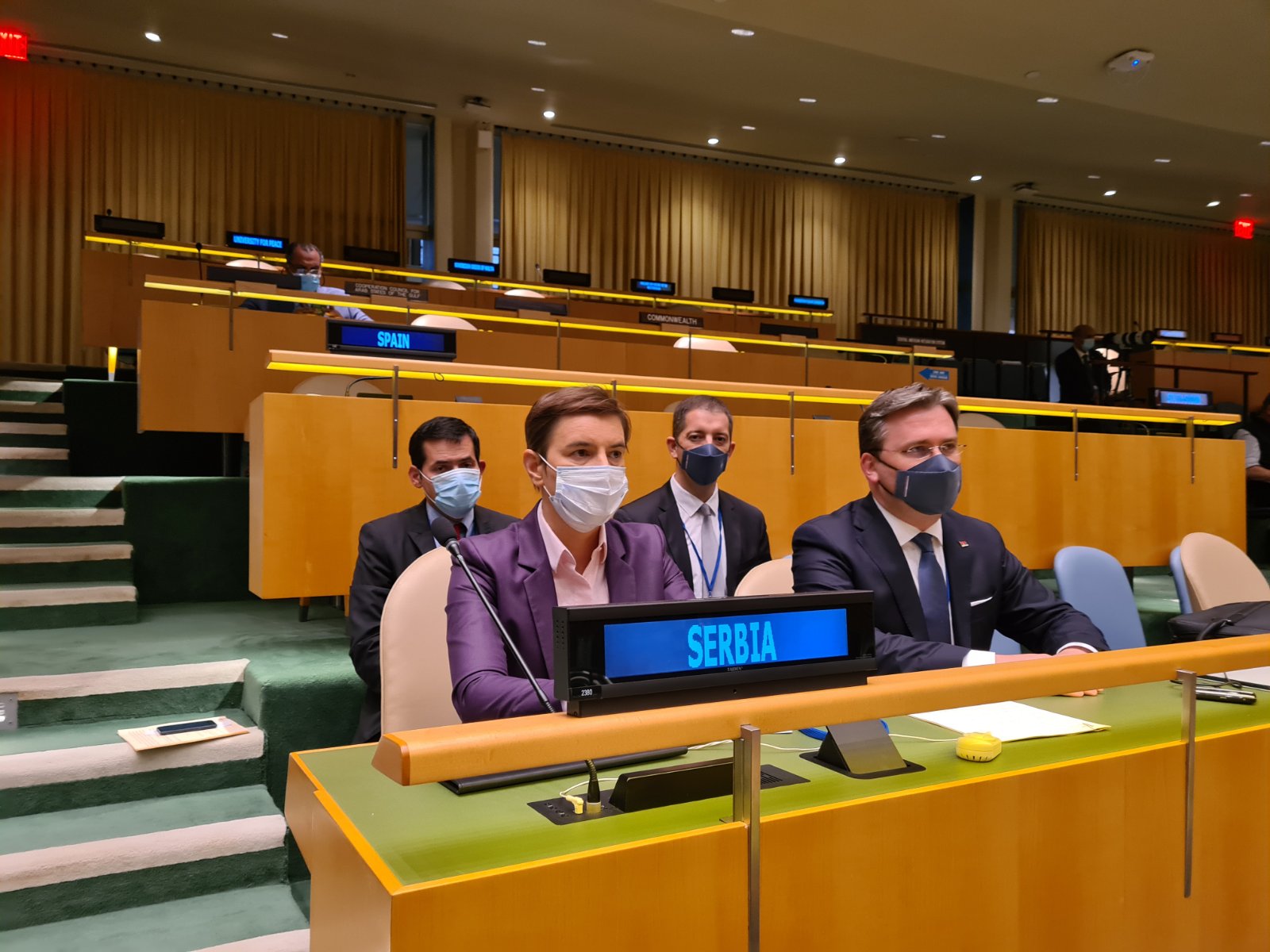
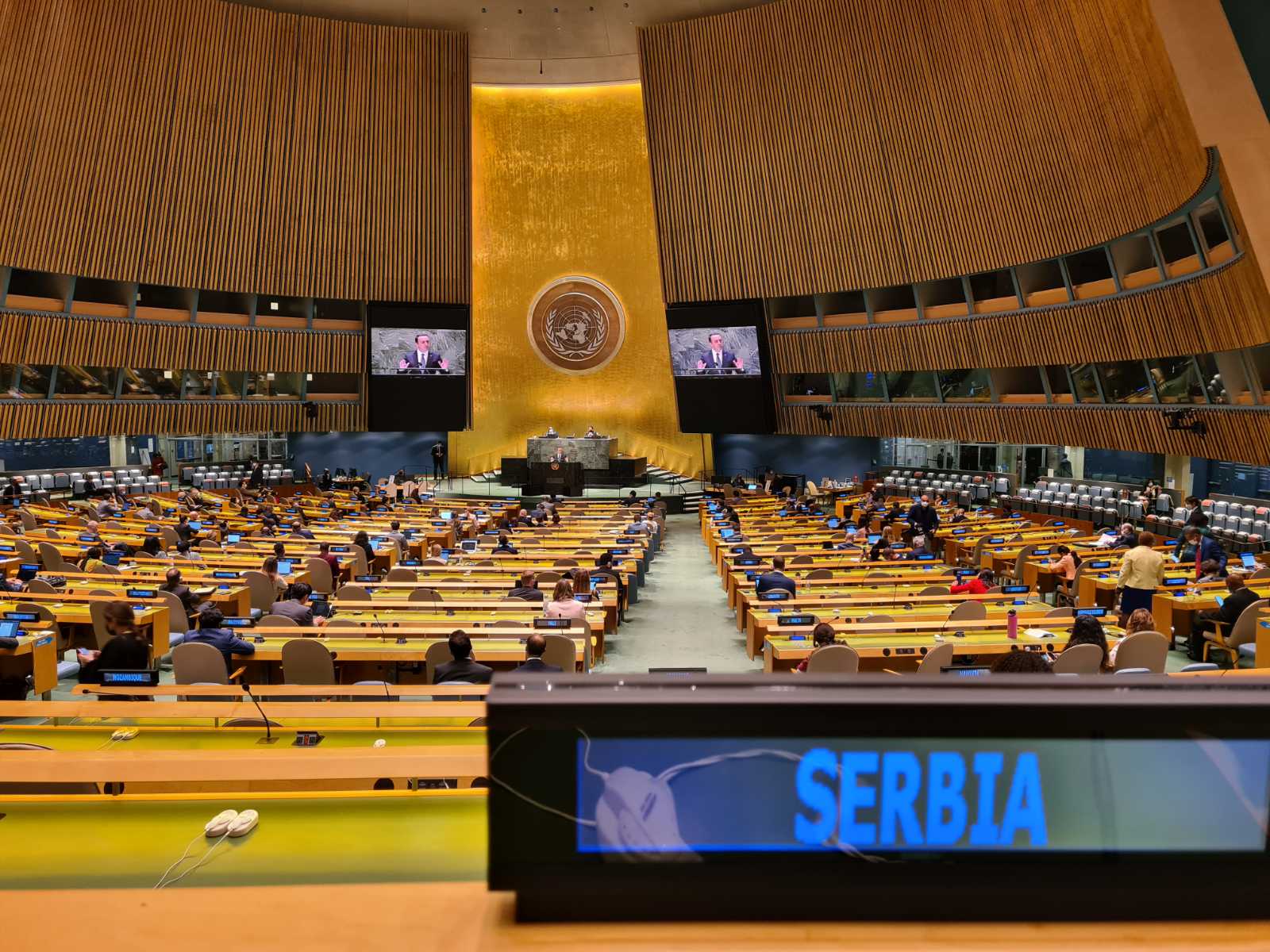 |
|
|
| Prime Minister Brnabic at Global COVID-19 summit organised by White House |
|
Prime Minister Ana Brnabic participated today at the Global COVID-19 summit, organised by the White House, which was opened by US President Joseph Biden.
The video messages are attended by a large number of world leaders and officials of international organizations, including UN Secretary General Antonio Guterres, European Commission President Ursula von der Leyen, British and Canadian Prime Ministers, Boris Johnson and Justin Trudeau, German Chancellor Angela Merkel and many others.
In the message, the Prime Minister pointed out that Serbia was among the first European countries to procure a covid vaccine, and that she was the first European Prime Minister to receive the vaccine.
Thanks to years of investment in digitalisation and development of eGovernment, we have managed to organise a complicated and complex vaccination process very efficiently and in a way that it is focused on citizens, she explained.
However, as she added, from the very beginning we were aware that this is not just a matter of our citizens and only our struggle. In the fight against the COVID-19 pandemic, we are all safe or no one is safe.
That is why, in addition to procuring vaccines for our citizens, we donated vaccines to the citizens of the Western Balkans, but also to other countries, she reminded and specified that Serbia donated 230,000 doses of vaccines to the region, we vaccinated foreign citizens in Serbia with approximately 300,000 doses and set aside we have 570,000 doses of vaccines for countries in Africa and Asia.
Brnabic mentioned that Serbia has already started the production of covid vaccine from one manufacturer, and that it will start production from another by the end of the year, because in that way we want to help and support all people and countries that need vaccines.
This is a pandemic in which we will either win together or lose together, but we must fight together, the Prime Minister repeated.
That is why Serbia supports the goals of this global summit, she emphasised, and expressed her gratitude to the United States of America and President Biden for organising the summit and supporting joint efforts in the fight against the COVID-19 pandemic.
Vaccines are the only way out in the fight against the pandemic, concluded Brnabic
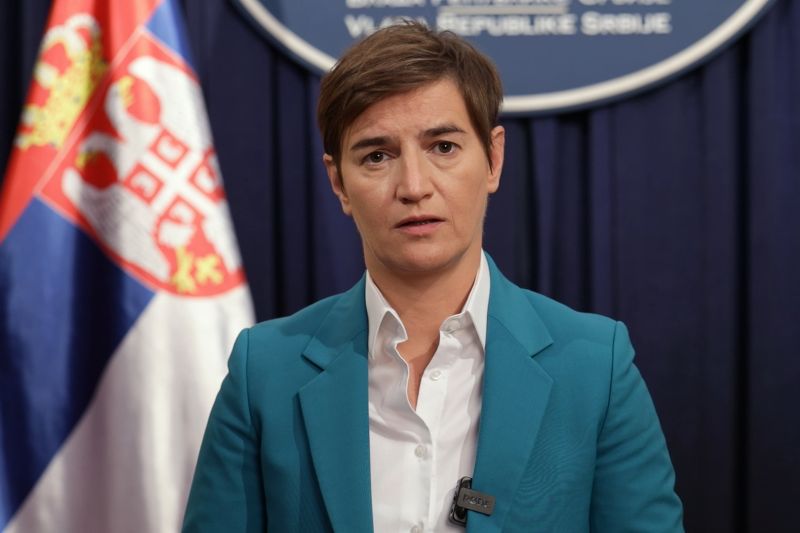 |
|
|
| The telegram of condolences to the President of the Russian Federation |
|
The President of the Republic of Serbia, Aleksandar Vučić, has expressed today the condolences to the President of the Russian Federation, Vladimir Putin, families of the killed persons and the people of the Russian Federation on the occasion of the tragedy at Perm State University. The condolences state:
“I have extremely been shaken by the news of the tragedy at Perm State University where many lives were taken in a cruel and outrageous manner.
There are no explanations for such act of insanity, just like there are no words of consolation for the families of victims, especially because the crime took place in the location where generations of young educated people who are the future of every country are formed.
Citizens of Serbia share the pain with the people of the Russian Federation and families of victims, while we pray for fast and successful recovery of the injured”, states the telegram of condolences of the President of the Republic of Serbia, Aleksandar Vučić.
Source/Photo: www.predsednik.rs
 |
|
|
| News about participation in World Food Moscow 2021. |
|
On September 21, 2021, Slavoljub Carić, charge d'affaires a.i. оf the Republic of Serbia at the Embassy of the Republic of Serbia in Moscow participated in the WorldFood Moscow exhibition.
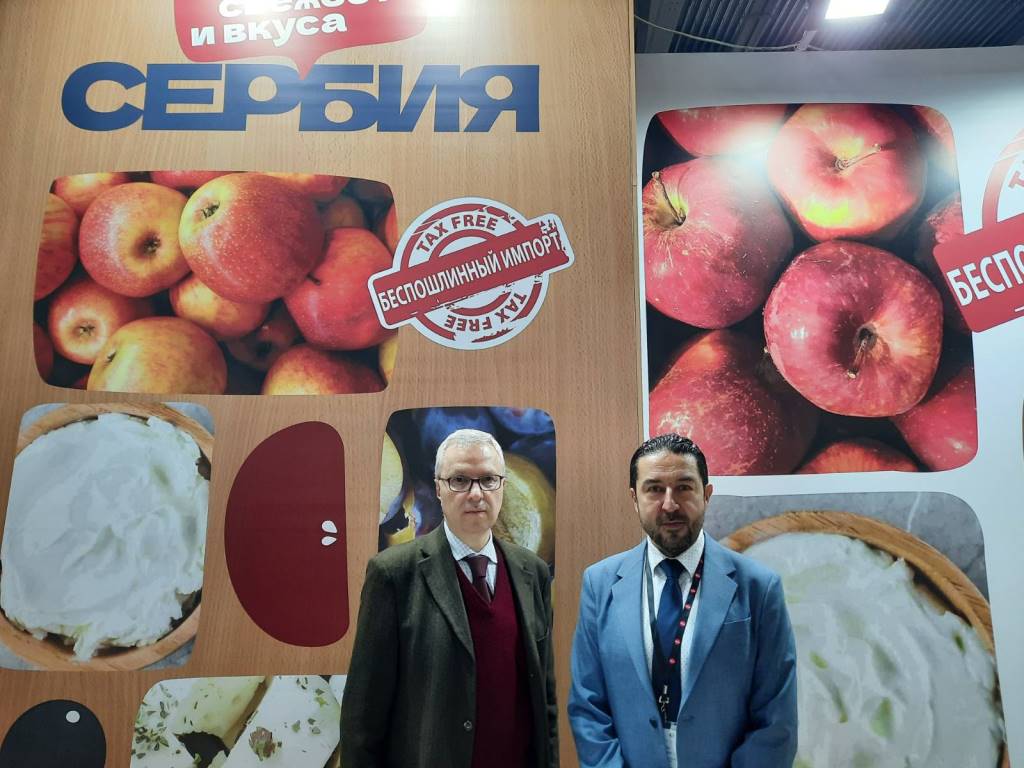
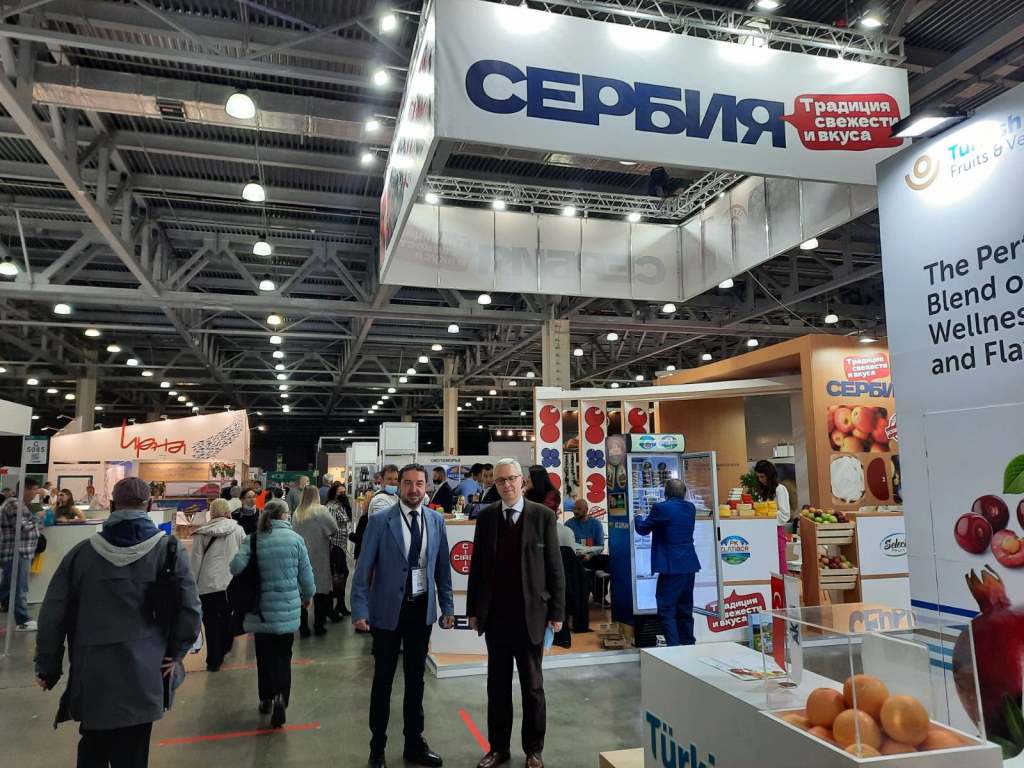 |
|
|
| Slavoljub Carić, charge d'affaires a.i. оf the Republic of Serbia in Moscow at the Embassy of the Republic of Serbia in Moscow talked with the Ambassador of Rwanda in Moscow, Colonel General Frank Kamanzi |
|
On September 16, 2021, Slavoljub Carić, charge d'affaires a.i. оf the Republic of Serbia in Moscow at the Embassy of the Republic of Serbia in Moscow talked with the Ambassador of Rwanda in Moscow, Colonel General Frank Kamanzi, about Rwanda's relations with Russia and the prospects of relations between Serbia and Rwanda.
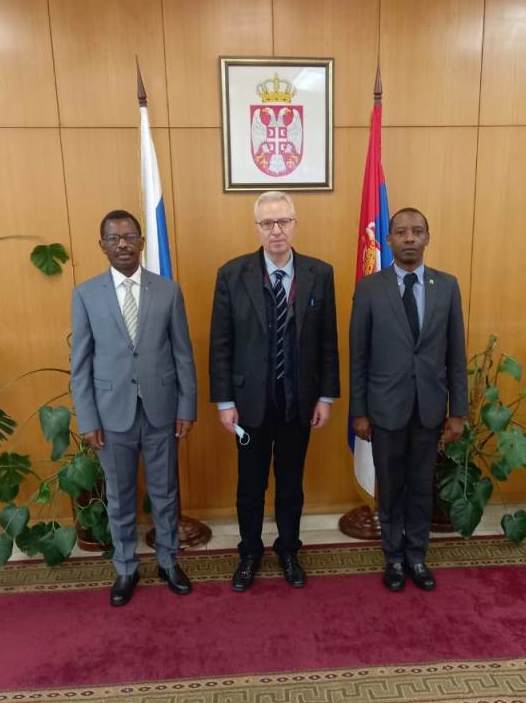 |
|
|
| President Vučić: We have decided – our goal is the EU, but China is an important partner |
|
We have decided – our goal was and remains the EU, Serbian President Aleksandar Vučić said in an interview with the German daily "Handelsblatt", adding that there is no alternative for Serbia, but also stressing that China is an important partner for Serbia, and that the task of the state is to take care about the interests of its citizens.
He thus answered the question of what Serbia will choose once it has to choose between close relations with Beijing or the EU. Vučić emphasized that Serbia wants to become a full member of the EU.
"We are connected by history, common culture, EU members are already undoubtedly our most important partners", he explained and added that the trade exchange between Germany and China is 3,000 times higher than between Serbia and China, and, as he noted, even despite that, Serbia's business operations with China are portrayed as a problem.
To the statement that the German Chancellor Angela Merkel did not congratulate the 100th anniversary of the Communist Party of China, and that he did so, he replied that Serbia is not Germany, but a small country. On additional insistence on what Serbia will do if it has to choose between the EU and China, he underlined that Serbia has already decided, that its goal was and remains the EU membership.
"Our biggest investors are from the EU. The EU accounts for 67% of our trade while 17 percent of the trade is with countries of the region that are all on the way to the EU. We cannot survive without the EU", he added.
"But can we do a lot of good things with China – of course. And we do that, just like Germany does", Vučić pointed out, and to the remark that the quality of the Silk Road projects was being criticized, primarily because of Chinese workers, he answered that the quality of roads or bridges, which Serbia is building with China, is excellent. "We give jobs to those who submit the best offer to us.
That is why I tell Europeans who criticize Chinese projects in our country – offer us a project for one euro more and you will get it", he emphasized. In that regard, he pointed out that Serbia is building a railway to Northern Macedonia with 600 million euros of EU aid, stating that that offer was better than China's.
"There is often talk of a 180-kilometer railway to Budapest through the territory of Serbia, which is financed by China. But the railway that is being built with the help of the EU from Belgrade to the northern Macedonian border is twice as long and no one is talking about it. It is all too political", he stated. A
sked whether he welcomes the plans of the EU and the USA regarding an alternative initiative to the Silk Road, Vučić said that he supports everything that brings advantages to our region.
"The Chinese want to expand their presence everywhere, but many processes in the West are, frankly, more efficient and without problems. We still have a lot to learn from the West, but we are getting there", Vučić said. He pointed out that China was an important partner for Serbia and added that when the consolidation of state finances began in 2014, our country received good conditions from China for development projects.
He also stated that a competition for a copper mine was announced in eastern Serbia, at the request of the EU, that no European company had made an offer for six months, and that it had then been taken over by the Chinese. "Our job is to take care of our people", he said.
He reminded that the Serbian economy grew by 52% in eight and a half years, which for the EU means that Serbia could be a strong member and engine for the entire region.
Explaining how Serbia is developing so well economically, he pointed out that Serbia has an excellent workforce, which speaks English, that society and administration are digitalized, and that it has the most flexible labor law in Europe, as well as consolidated public finances. He reminded that previously the public debt was at 78% of GDP, and that today it has been reduced, thanks to the strong growth of the economy, to 52%.
"We can afford to give investors an incentive to come", he added, emphasizing that Serbia offers investment assistance, but that, for example, subsidies were not the motive for the arrival of the development center of the company Continental.
He pointed out that, five or six years ago, only Serbia started using the dual education system in this region, which Germany, Switzerland and Austria also use, that tens of thousands of people are in dual education, and that this is appreciated by foreign investors, who, in addition, can work closely with universities as well. Germany, he stated, is the most important trade partner and the largest investor.
We started with the arrival of small textile companies from Turkey, and now primarily large German companies are coming. Today, 71,000 people work in German companies in Serbia", he explained. Vučić said that the European perspective is very important for investors, stating that Nidek, Toyo Tires or Mitsubishi are coming from Japan to Serbia because our country is on a stable European path.
Asked if he believes that Serbia will become an EU member in the foreseeable future, he said that he does not complain. "It is certain that if we had received 45 billion euros of EU aid, we would have been much further economically. Instead, we received 1.6 billion euros from the EU.
We are used to achieving our successes on our own", said Vučić. The President of Serbia reminded that in Croatia, salaries used to be 2.2 times higher than in Serbia, and today they are only 1.7 times higher.
"We are closing the gap with our own efforts. If we were to become a member of the EU, then we would certainly not ask for the biggest subsidies", he assures.
He said that the Serbian path follows the German path to Europe, and that Serbia wants a fair chance.
"I believe Merkel's words. She is at the end of her term and I would not have to praise her anymore. But she gave us stability, freedom of travel to the EU, helped us with the migrant crisis in 2015, and asked the Minister of Economy Altmeier and others to work closely with us", he reminded.Asked if there were any indications that the new German government would support Serbia in the same way, Vučić expressed confidence that it would be the same.
"I know Armin Laschet, I talked to him while he was the Minister-President of North Rhine-Westphalia. He is very smart and understands the situation in the Balkans, and he will certainly continue Merkel's policy towards our region as the new chancellor", he added. Vučić also expressed his belief that Russia, if Serbia's accession to the EU were concretized, would not react similarly as in the case of Ukraine, as this is a sovereign decision of Serbia.
To an additional question in this regard, Vučić pointed out that whenever he met with Vladimir Putin, and there were 18 or 19 meetings, he told him that he was grateful for the traditionally close friendship with Russia, but also that Serbia is on a clear course towards the EU.
"He asked if it was our choice and I answered that EU membership is indeed our goal", he added. When it comes to "Kosovo", Vučić emphasized that a compromise is needed regarding this issue. "Only in this way can there be sustainable peace. Serbia wants peace, me as well. Let's stop with the madness of the past. Only then can the whole region become the engine of new growth for Europe", said Vučić.
Source: Tanjug
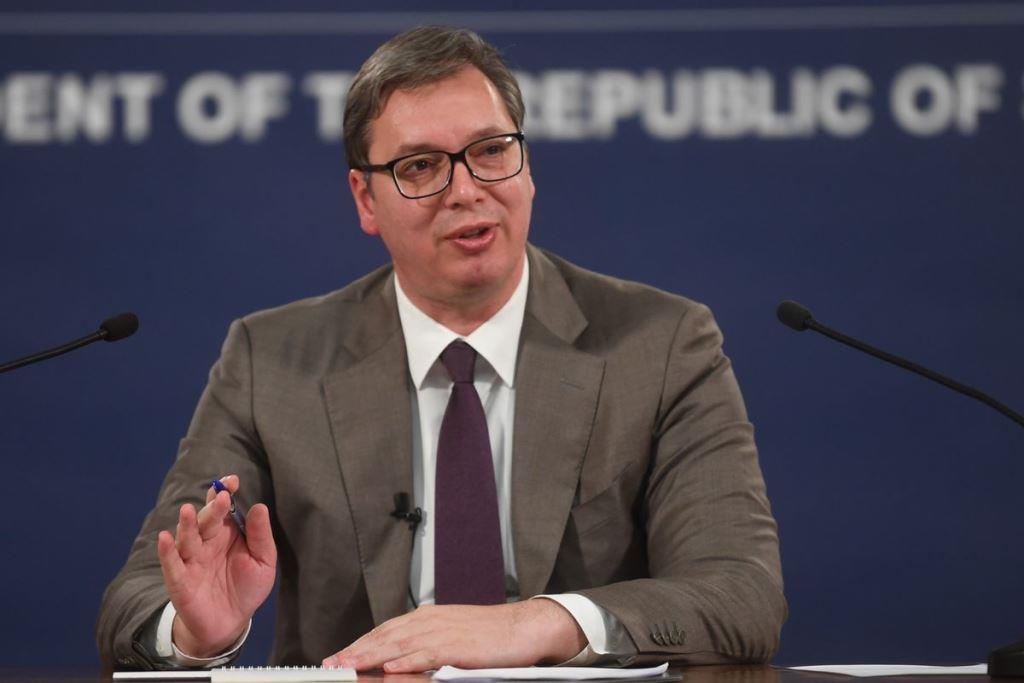 |
|
|
| Telegram of condolences to the President of the Russian Federation |
|
The President of the Republic of Serbia, Aleksandar Vučić, sent a telegram of condolences to the President of the Russian Federation, Vladimir Putin, on the occasion of the plane crash over Kamchatka, in which it is said:
"Receive my sincere condolences over the accident of the Antonov An-26 plane. Please convey the condolences to the families of the deceased passengers and crew members. In these tragic moments for your country, our thoughts are with the Russian people.
Although I am convinced that the leadership of the Russian Federation will provide support to those who lost their loved ones in the accident, we urge them to find the strength to face this irreparable loss. Please accept, Excellency, the assurances of my highest consideration", the telegram of condolences from President Vučić reads.
Source/Photo: www.predsednik.rs
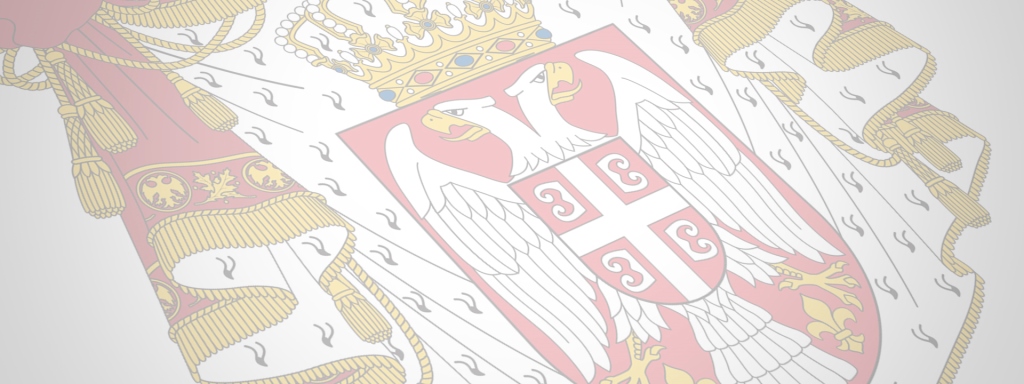 |
|
|
| Meeting of President Vučić with the Ambassador of the Russian Federation |
|
The President of the Republic of Serbia, Aleksandar Vučić, received the Ambassador of the Russian Federation today, Alexander Botsan-Kharchenko, with whom he discussed topics of mutual interest, especially bilateral cooperation.
President Vučić and Ambassador Botsan-Kharchenko reviewed the progress of works on the construction of the railway from Stara Pazova to Novi Sad and expressed satisfaction that the last parts of the railway will be laid soon, and that the works are progressing according to the planned dynamics.
President Vučić and Ambassador Botsan-Kharchenko exchanged views on a number of regional and global issues. President Vučić informed Ambassador Botsan-Kharchenko about the situation in the dialogue between Belgrade and Pristina and Serbia's positions before the resumption of talks in Brussels on Monday, and on this occasion, he reiterated his gratitude for Russia's active support to our country's territorial integrity and sovereignty.
The two interlocutors also discussed the health situation in Serbia and Russia, in connection with the COVID-19 pandemic, and expressed concern over the increase in the number of cases, hoping that with the increase in the number of vaccinated, that growth will stop.
Source/Photo: www.predsednik.rs
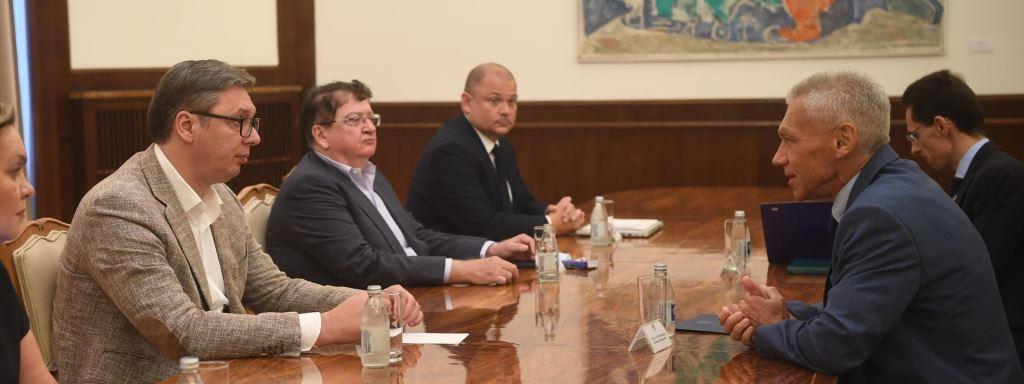 |
|
|
| Serbia has achieved great success in the field of digitalization |
|
The Prime Minister of the Republic of Serbia, Ana Brnabić, stated at a gathering dedicated to digitalization and the IT sector, which was held in New York, that since she became Prime Minister, she is most proud of Serbia's success in the field of digitalization.
Brnabić, who is on a two-day visit to the United States, said that when she was elected Minister of Public Administration and Local Self-Government in August 2016, she wanted to do everything to change the public administration and what bothered her as a citizen.
She stated that, when she took office as Prime Minister, she knew what her priorities were and that first of all, digitalization needed to be raised to a higher level, that the education reform was supposed to begin, as well as work on strengthening the economy. I believed in a country that believes in its people, because the Serbian people are creative.
From 1 June 2017, we started working as an e-Government, i.e. we started exchanging data electronically, said the Prime Minister. According to her, our citizens no longer had to go to, say, the Tax Administration, and since then, the public administration has exchanged 50 million documents, which means that citizens did not have to go from office to office for 50 million papers.
Brnabić pointed out that she is proud of what has been done in the field of education since she became the head of the Government, specifying that in September 2017, programming was introduced as a compulsory subject in primary schools.
Nobody believed that we could do that, but we cooperated with the private sector and some social organizations and we succeeded. At the moment, we are far ahead of numerous countries in Europe and the world, said the Prime Minister.
The Prime Minister pointed out that she was most proud when the cornerstone was laid for the science and technology park in southern Serbia, noting that so far, our country has four science and technology parks.
She pointed out that Serbia has since become one of the most successful countries in the world in the field of technology, and that according to some parameters, it is among the ten countries in the world, or among the five, assessing that this is proof that the country can change quickly.
Answering the question about vaccination, the Prime Minister emphasized that our country has never seen it as a geopolitical issue, but as a health issue.
According to her, Serbia talked with producers from both the East and the West and was among the first European countries to sign agreements with the company Pfizer-BioNTech and Sinopharm.
Unfortunately, many countries have viewed this issue as geopolitical. It did not matter to us, as long as the vaccines were safe, the Prime Minister emphasized and added that this was not the end of Serbia's success, because good organization was also needed.
Brnabić explained that the organization is another important thing in vaccination, because it is a logistically very difficult process, adding that, with the help of digitalization, success has been achieved and that everything we did in the previous years has paid off.
She stated that Serbia quickly established a system through which citizens could express interest in vaccination against the coronavirus and choose which vaccine they wanted to receive, as well as to be informed by a message when to go and get vaccinated.
Now I can log in on my phone, to see how many people have received the vaccine, how many more have registered, so that the effects of digitalization are obvious. We have made everything very efficient and easy for our citizens, the Prime Minister explained.
Answering the question of what she can tell other countries of the world about how to progress faster, Brnabić said that it is important to invest as much as possible in digitalization and education. You need to teach children how to think, not what to think.
Not all children will become IT experts, but what they can learn is an algorithmic way of thinking and how to make decisions, she said.
The Prime Minister mentioned investing in high-speed internet and providing infrastructure for start-ups as an important thing for progress, because more and more economies will be based on start-ups and innovations, emphasizing that people should be helped to start companies and implement their ideas.
Speaking about social networks, she pointed out that fake news has become the biggest problem on these networks and that it will remain so for some time.
This is the biggest challenge I face as Prime Minister, especially during the corona virus pandemic, she said, adding that social networks are also a great opportunity for politicians to communicate with citizens.
Source/Photo: http://www.srbija.gov.rs
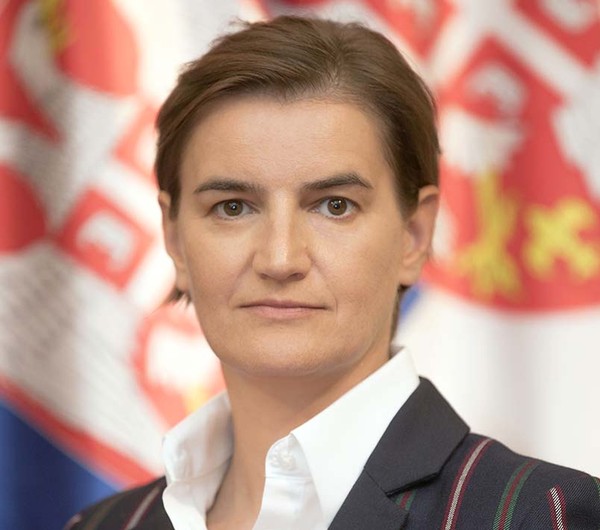 |
|
|
| Selaković invited representatives of members of the NAM to gather in Belgrade in October |
|
The Minister of Foreign Affairs of the Republic of Serbia, Nikola Selaković, spoke at the Ministerial Conference of the Non-Aligned Movement (NAM) today and on that occasion sent an invitation to the representatives of the members to gather in Belgrade on 11 and 12 October, when the 60th anniversary of the first Conference of the Non-Aligned Movement held in Belgrade in 1961 will be marked.
Selaković informed the participants of the conference that Serbia would organize this important jubilee of non-aligned countries together with Azerbaijan – which is currently chairing the NAM.
In his address, Selaković reminded that the former Yugoslavia and President Tito, as co-founders of the Movement, gave their contribution to creating a vision of a different world, and that Serbia, as one of the successors of Yugoslavia, is proud of that part of its history.
"The spirit of non-alignment is based on equality, freedom, lasting peace, sovereign equality of states and peaceful cooperation of all peoples, and these values are also woven into the state-building foundations of Serbia", the minister said.
Selaković said that the Non-Aligned Movement throughout its history has been a beacon of freedom to all those who sought the right to existence and prosperity in a world that was often ruled, not by the force of law, but by the law of force. He assessed that even today we find ourselves in times of serious global challenges in which the Movement has the opportunity to reaffirm its libertarian traditions and commitment to a world of equals.
"Serbia, as a militarily neutral and politically independent state, will give its most sincere contribution to such goals of the Movement. We hope that by strengthening mutual ties and cooperation, as a group of states and peoples that share the same values and interests, we will strengthen our common capacity to face the challenges of tomorrow. And the challenges are already before us", Selaković pointed out.
The Minister emphasized that international law should be a pillar of political and security architecture of the world, and added that Serbia respects the commitment of the members of the Movement towards the goals and principles of the UN Charter.
"Many members of this movement are aware that by insisting on international law, they are working in their own favor and in favor of preserving regional and global stability," the minister pointed out.
Selaković also said that the COVID-19 pandemic clearly showed that inequality, lack of solidarity and empathy in the world have become very obvious in the roughest way.
"Serbia is eternally grateful to all the countries which, such as Azerbaijan, helped us in difficult times. We later extended that chain of solidarity by making vaccines available, not only to our citizens, but also to others in the region. We supported our neighbors with the belief that solidarity is the best investment in a common future", the minister concluded.
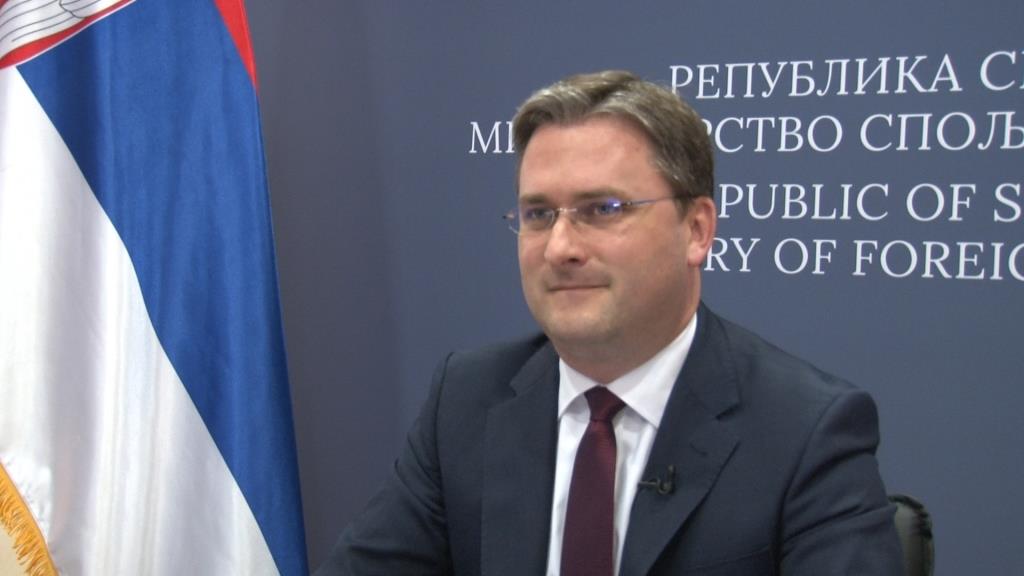 |
|
|
| President Vučić meets with the Minister of Agriculture of the Russian Federation |
|
President of the Republic of Serbia Aleksandar Vučić met today with the Minister of Agriculture of the Russian Federation, Dmitry Patrushev to discuss additional potentials for the development of trade in agricultural and food products, as well as cooperation in veterinary and phytosanitary control, and technological innovations that would significantly improve the standards of agricultural production in both countries.
President Vučić pointed out that the Russian Federation is one of the most important foreign trade partners of Serbia and that the volume of exchange of agricultural and food products is on the permanent rise.
The interlocutors assessed that the cooperation is at an extremely high level.
"The total value of trade in agricultural and food products between the Republic of Serbia and the Russian Federation during 2020 amounted to 480.7 million USD, which is an increase of 10% compared to the value of trade in 2019 and a record level of trade in the last eleven years", the President pointed out and added that Serbia strives towards further growth of trade, but also that the total export from Serbia in the next three years will increase to at least 1.5 billion dollars.
President Vučić and Minister Patrushev stated that the establishment of joint companies to participate in third markets would bring remarkably great benefits for both sides since Serbia and the Russian Federation have top products that could cover a good part of the demand on the global market.
The President also emphasised the importance of cooperation in the field of science and technological innovations between the two countries, as well as the need to apply the highest world standards in this area as well.
Source/Photo: www.predsednik.rs
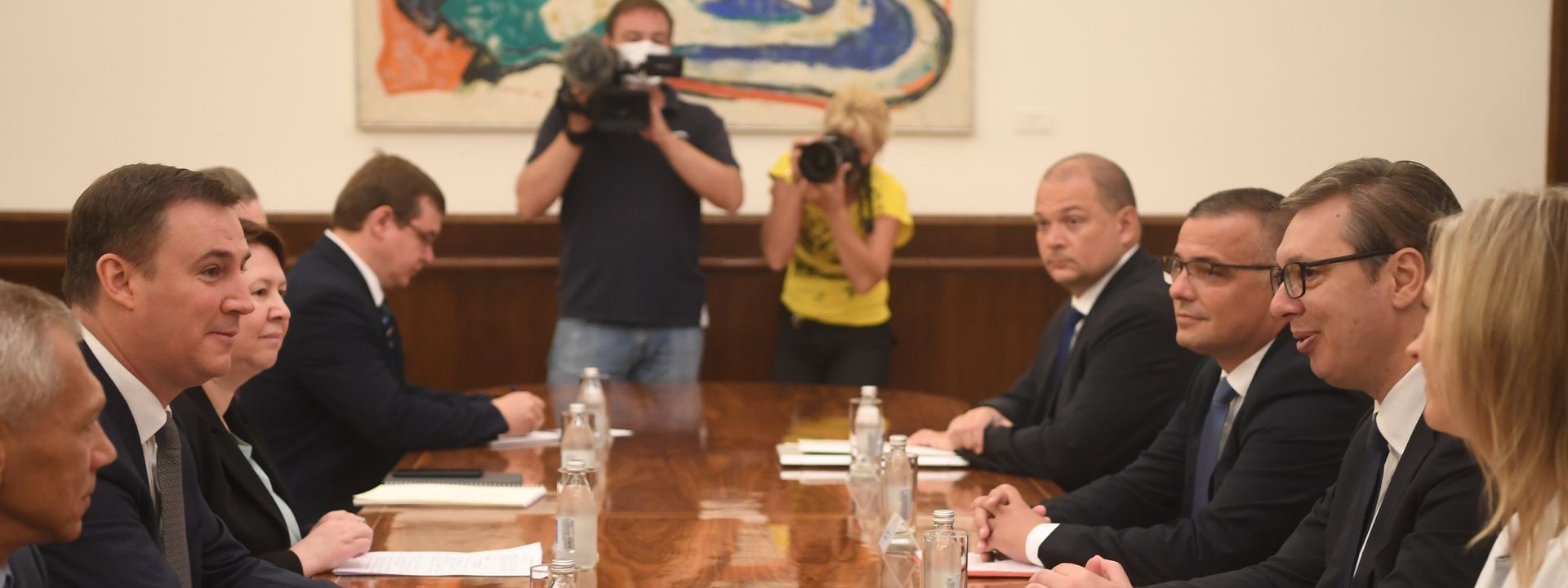 |
|
|
| President Vučić met with the Director of the Foreign Intelligence Service (SVR) of the Russian Federation |
|
President of the Republic of Serbia Aleksandar Vučić met today with the Director of the Foreign Intelligence Service (SVR) of the Russian Federation, Sergey Naryshkin, to discuss the regional and global security situation, as well as Serbian-Russian relations and cooperation in various fields.
The two interlocutors emphasised the importance of cooperation between the BIA and the SVR in the fight against international terrorism, as well as their activities in the intelligence and security sector to successfully respond to various challenges.
The meeting was also attended by the director of the Security Information Agency, Bratislav Gašić.
Source/Photo: www.predsednik.rs
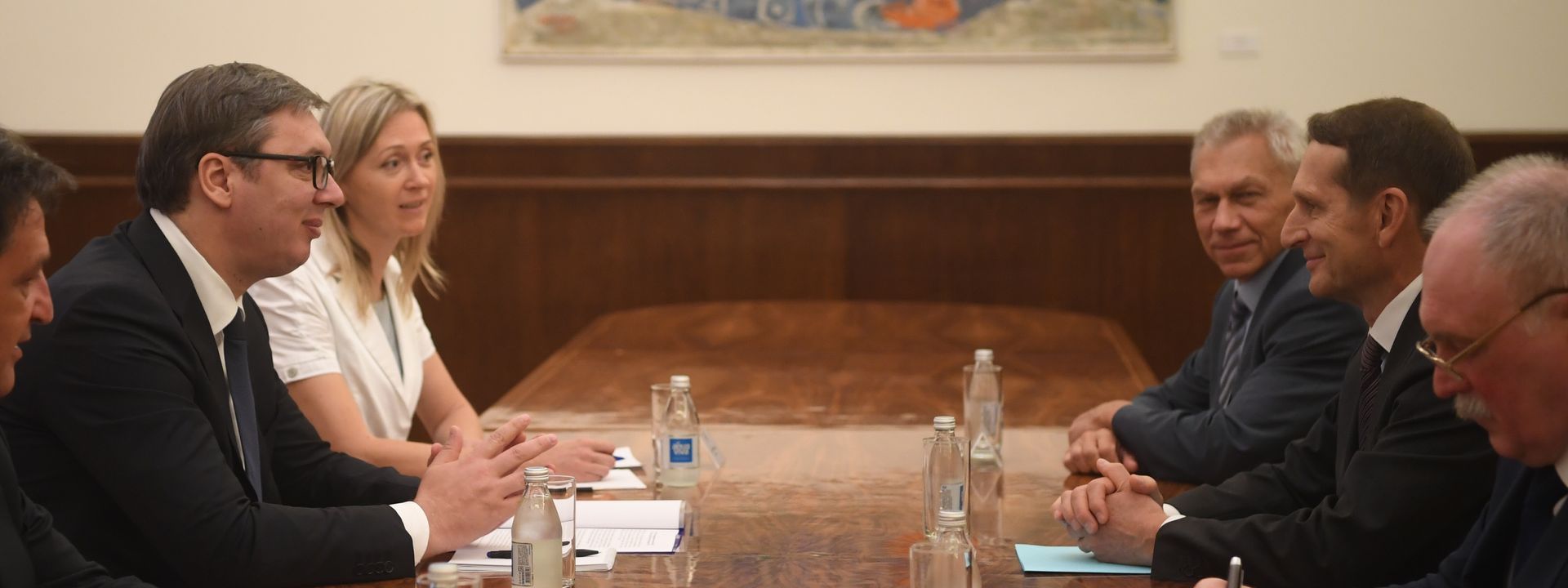 |
|
|
| Great potential for cooperation with Russia in field of agriculture |
|
The Prime Minister of the Republic of Serbia Ana Brnabic assessed today, in a conversation with Minister of Agriculture of the Russian Federation Dmitry Nikolayevich Patrushev, that there is great potential for further development of trade relations and partnerships in agriculture, primarily thanks to good interstate relations, mutual support and continuity in political dialogue.
Brnabic pointed out that an additional incentive is the entry into force of the Free Trade Agreement with the Eurasian Economic Union in July this year, which, as she explained, will enable greater placement of Serbian products, not only on the Russian market, but also beyond.
Patrushev positively assessed the cooperation between the two countries in the field of agriculture, and pointed out that the holding of agricultural fairs is an opportunity to connect Serbian and Russian companies and producers and increase trade in the field of agriculture.
He stated that the Russian side is also interested in joint investments in agricultural products in order to facilitate exports to markets with which the two countries have signed free trade agreements.
It was pointed out at the meeting that Serbia is a market with great potential for investors who want to invest in agriculture.
Also, the Prime Minister expressed gratitude for Russia's firm and consistent support for the territorial integrity and sovereignty of Serbia and the dialogue between Belgrade and Pristina in finding a compromise solution, as well as continuous support in international institutions.
Source/Photo: www.srbija.gov.rs
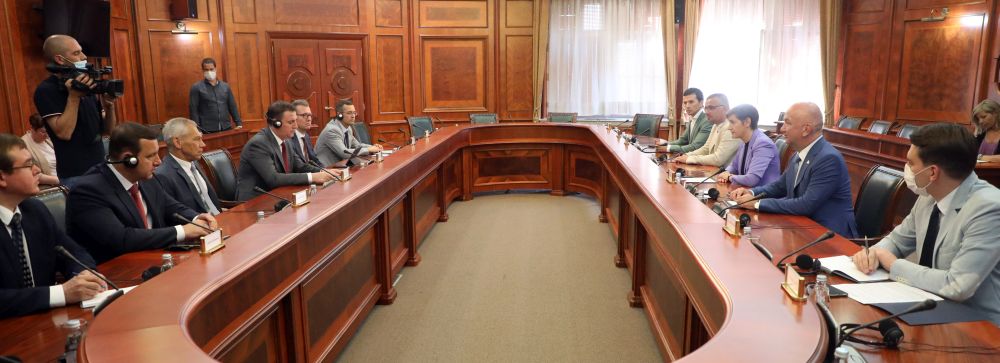 |
|
|
| President Vučić meets Yevgeny Primakov |
|
President of the Republic of Serbia Aleksandar Vučić received the Head of Rossotrudnichestvo, Federal Agency for the Commonwealth of Independent States Affairs, Compatriots Living Abroad, and International Humanitarian Cooperation, Yevgeny Primakov, to discuss cultural, scientific and educational cooperation between the two countries and about overall bilateral relations between Serbia and Serbia and Russia.
President Vučić and Primakov agreed that the spiritual ties between the two nations represent a solid basis for the development of relations at all levels and that each visit of one of the Russian officials strengthens our cooperation further. Therefore, on this occasion, they considered proposals for expanding cultural cooperation, such as regular exchange of exhibitions and guest performances of theatre and opera, as well as for cooperation in the field of education including the regular exchange of student scholarships, increasing in number.
President Vučić expressed his gratitude to the Russian state and President Putin, as well as to Russian artists for their help in the interior painting of Saint Sava Temple in Belgrade. The importance of the support expressed by the Russian side for the preservation and protection of the Serbian cultural and religious heritage in Kosovo and Metohija in UNESCO and other international forums was also highlighted.
The two interlocutors also discussed the situation in the Western Balkans region.
www.predsednik.rs
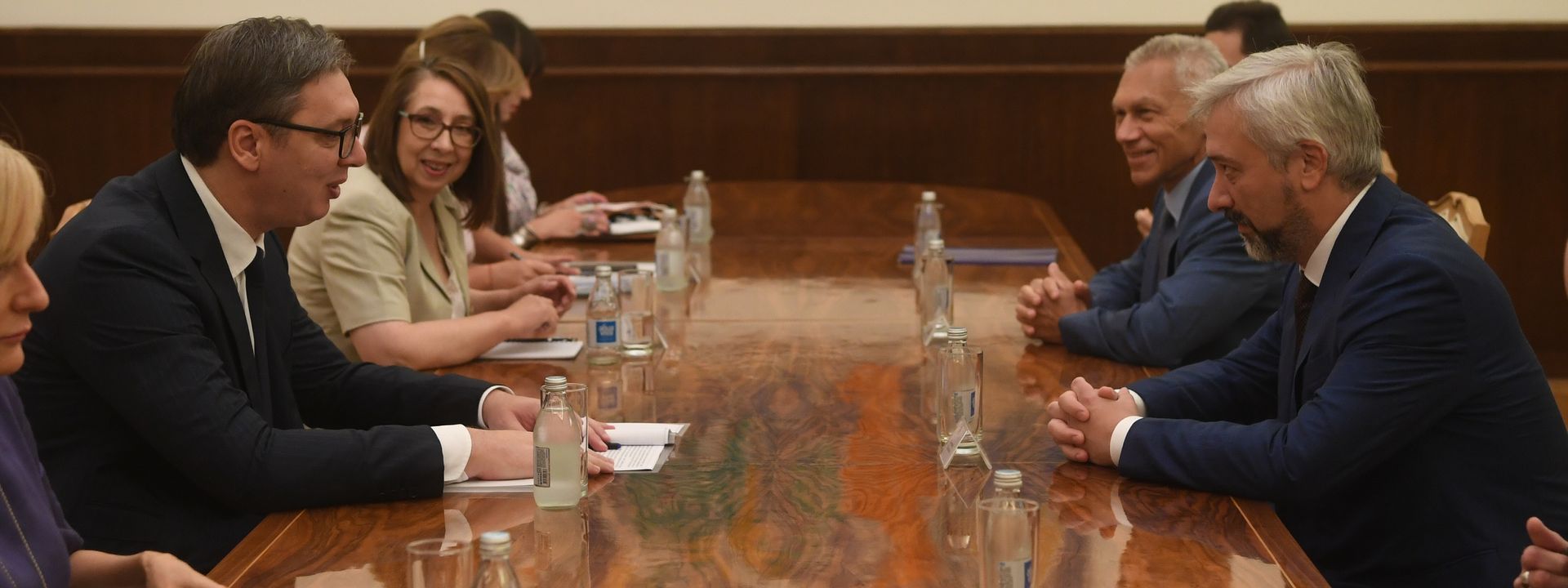 |
|
|
| Congratulations to the President of the Russian Federation |
|
President of the Republic of Serbia Aleksandar Vučić attended today a reception at the Embassy of the Russian Federation on the occasion of Russia Day, where he handed over a congratulatory message to the President of the Russian Federation, Vladimir Putin, which, with wishes that he continues leading the country on the path of prosperity, reads as follows:
"The centuries-old tradition of fraternal relations between our countries, the intertwined destinies of our peoples and the values we share, represent a solid basis for further strengthening of the strategic partnership, based on mutual respect and trust. I remain personally committed to developing strong friendship and comprehensive cooperation between Serbia and Russia."
The friendship between the Serbian and Russian people is also characterised by mutual solidarity, which was confirmed during the ЦOVID-19 pandemic. Serbia will not forget Russia's generosity and selfless help in the fight against that modern challenge.
I will avail myself of this opportunity to once again express my gratitude to Russia and you personally for your active support of the state and national interests of Serbia and its peace policy, in favour of the stability of the region," reads the congratulatory message from President Vučić.
www.predsednik.rs
 |
|
|
| Meeting with the Deputy Minister of Foreign Affairs of the Russian Federation |
|
President of the Republic of Serbia Aleksandar Vučić met today with the Deputy Minister of Foreign Affairs of the Russian Federation, Alexander Grushko, with whom he agreed that each visit of Russian officials represents a confirmation of a high degree of mutual understanding and testimony of good Serbian-Russian cooperation. President Vučić expressed hope that we could arrange visits of high-ranking Russian officials, including the visit of President Putin. Russian Deputy Foreign Minister Grushko, as the closest associate of Minister Lavrov, expressed assurances regarding further improvement of the already close cooperation between the two countries.
In addition to bilateral relations and future joint projects, President Vučić and Russian Deputy Foreign Minister Grushko also discussed the situation in the region and, in this regard, the course of the dialogue between Belgrade and Priština. President Vučić pointed out that the Serbian delegation had a difficult day in Brussels, but it firmly represented state and national interests, fighting for a political compromise. On this occasion, he thanked Russia for its active support in defending the integrity and independence of Serbia in international forums.
President Vučić also thanked Russia for its help during the COVID-19 pandemic and for the deliveries of the Sputnik V vaccine, and especially for the joint production of those vaccines at the Torlak Institute, whose trial commissioning he officially launched with President Putin.
www.predsednik.rs
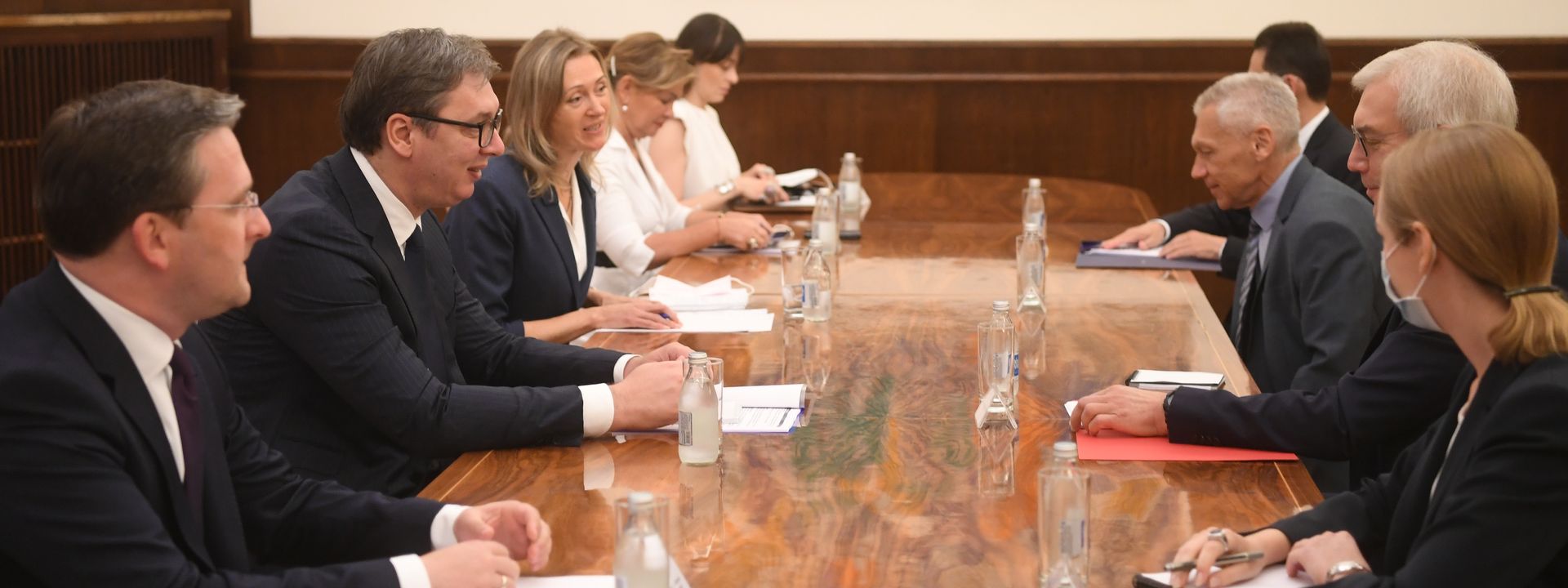 |
|
|
| Address by the President of the Republic of Serbia at the session of the United Nations Security Council |
|
Dear Mr. President, ladies and gentlemen, members of the delegations
I would point to a few ongoing issues in my speech that refer to the competences of the Mechanism, namely, the possibility of serving the sentences passed by the ICTY and Mechanism in the Republic of Serbia, with the current practice of disabling early release of the sentenced persons as well as obligation of the Mechanism regarding protection of sentenced persons.
The second part of the speech will be dedicated to issues that are opened by the six –month Report on the work of the Mechanism by Mechanism President Mr. Agius and Report by the Chief Prosecutor Mr. Serge Brammertz, especially regarding current cooperation of the Republic of Serbia and the Mechanism.
The third part of my speech, and I noticed that in many of your statements even today, is going to be the view of Serbia on everything that took place in The Hague Tribunal and what the Tribunal verdicts brought to people in the region of former Yugoslavia.
The Republic of Serbia has initiated before the Security Council, on several occasions, the issue of possibility of serving sentences passed by the ICTY and Mechanism in the Republic of Serbia. Beside the efforts to move this issue from “square one”, not a single response was obtained from the Security Council. The majority of persons that are serving their prison sentences are citizens of the Republic of Serbia, and it comes naturally that the Republic of Serbia is interested in enabling them to serve their prison sentences in the Republic of Serbia.
ICTY and the Mechanism are making references to the Security Council as an institution in charge of dealing with this issue.
I am ready to reiterate here the readiness of the Republic of Serbia to take over obligations and liability for executing prison sentences that the Tribunal or Mechanism passed on the citizens of the Republic of Serbia, under the monitoring of the Mechanism and full respect for the authority of the Mechanism regarding early release.
Mr. President,
A particular problem that we are facing with is disturbance by the judicial institutions established in the territory of Kosovo and Metohija, which is within Serbia and which is under Interim Administration of the UN. We are witnesses of attempts of retrial for two citizens that are serving their prison sentences for which they had already been trialed before the ICTY. More concretely, in previous period there was an attempt for hearing of Nebojša Pavković and for obtaining extradition of Vlastimir Đorđević.
I urge on the Mechanism and Security Council to prevent attempts of violation of the principle ne bis in idem, a civilization principle that was confirmed in Article 7 (1) of the Statute of the Mechanism and to disable retrials for persons already convicted by the ICTY, particularly to make sure that it is not done in the territory which is under interim UN administration.
Mr. President,
President of the Mechanism (Mr. Carmel Agius), apart from the regular Report, delivered also on 11 May 2021 a letter to the President of the Security Council, whose subject is the alleged omission of the Republic of Serbia to apprehend and turn over to the Mechanism Petar Jojić and Vjerica Radeta, indicted of contempt of court, claiming that in this way the Republic of Serbia was acting contrary to its obligations towards the UNSC Resolution 1966 (2010) and asking the Security Council to take measures in order to ensure that Serbia meets the alleged obligations in accordance with the Mechanism Statue and Resolution 1966.
The point of the argumentation of the President of the Mechanism comes to that that the Republic of Serbia has the obligation to deprive of liberty and extradite to the Mechanism its citizens accused of contempt of court, regardless of the nature of accusation, circumstances under which such an order was made and consequences that might result from its implementation.
It is about accusations that do not refer to sever violations of international humanitarian law and that are related to a case before the ICTY, which ended in 2018 (Vojislav Šešelj case), by acquitting the defendant in the first instance, and upon the Prosecutor’s complaint the defendant was declared guilty and sentenced to a 10-year imprisonment, which was covered by the time he spent at the UN Detention Unit.
Judge Agius states that Serbia ignores its obligations in accordance with the Resolution 1966 (2010). Quite the opposite- the Republic of Serbia takes seriously its obligations regarding cooperation with the Mechanism. After the warrant for apprehension and extradition of the two persons accused of contempt of court to the Mechanism had been introduced, the Higher Court in Belgrade established that assumptions for their apprehension and extradition to the Mechanism had not been met. The decision is founded on the rules of international law and domestic law of the Republic of Serbia and it is mandatory for holders of the executive power in the Republic of Serbia.
I would remind here that the first decision of a sole judge (Aydin Sefa Akay, 12 June 2018), that was acting in this case was that the criminal prosecution of V. Radeta and P. Jojić for alleged contempt of court was to be forwarded to the judicial authorities of the Republic of Serbia. In procedures that followed, the argument of the alleged unwillingness of the witnesses to cooperate with the judicial authorities of the Republic of Serbia was stated for the first time, and the decision on deprivation of transferring the case to the jurisdiction of the judicial authorities of the Republic of Serbia was based on the respective argument.
The Republic of Serbia expressed its readiness to take over the court procedure against Petar Jojić and Vjerica Radeta on several occasions and it provided appropriate guarantees. Additionally, the Republic of Serbia fully recognizes and accepts the obligation of the Mechanism to monitor trials that were transferred to national courts with the help of international and regional organizations, as well as to take measures envisaged by Article 6 of the Statute of the Mechanism.
I would remind here that the Republic of Serbia extradited to the tribunal all the persons indicted by the Prosecutor’s Office, and among the respective mostly highest political, military and police officials; it enabled presence of vast number of witnesses, delivered extensive documentation. Obligation of the Mechanism, in accordance with the Resolution of this Security Council, is to take measures that enable transfer of cases to national justice system. In previous practice, 13 cases were transferred to Bosnia and Herzegovina, 2 to Croatia and only one to Serbia.
The last but not the least, I want to remind all of you here of the fact that France- of course as a sovereign and independent country- upon request for apprehension and extradition of Florence Altman for publishing documents and contempt of court, refused the request for extradition, with an explanation that it does not extradite its citizens. For far smaller offence you ask as to extradite our citizens Jojic and Radeta, showing both the distrust to Serbian justice and judiciary and Serbian State, as well as a fact that the rule from ancient Rome is still valid – quod licet lovi non licet bovi.
It does not harm to underline that high-level officers and politicians were not trialed for crimes against Serbs, and that crimes against Serbs remained unsanctioned before ICTY and Mechanism. Let me remind you, just as an example that Ademi and Norac case for ferocious crimes against Serb civilians in Medački Džep was left to Croatian justice institutions. Proven crimes against Serbs, like those of Ramuš Haradinaj, Naser Orić, then Ante Gotovina and other indicted for military operation “Storm” that led to a complete ethnic cleansing of Serb population in the big part of today’s Croatia, resulted before the ICTY in acquittals. Many horrible crimes against Serb civilians that were committed in the territory of Bosnia and Herzegovina, Croatia and the Autonomous Province of Kosovo and Metohija, and that resulted in ethnic cleansing, simply were not the subject of interest of the ICTY.
What’s very important and not to leave anything unclear, Serbia is a country that condemns all crimes and all criminals who perpetrated them in the region of former Yugoslavia. However, it is interesting that despite often criticism Serbia is the only one that speaks openly and condemns crimes perpetrated by Serb nationals, while in other regional countries they do not speak at all about crimes that representatives of those nations committed against members of Serbian people.
And I want to emphasize once again here in front of you that Serbia condemns terrible crime in Srebrenica and extends its deepest condolences to the families of all killed in that massacre. And there are no “buts” about the respective.
Nevertheless, we are here to analyze results and penal policy of ICTY and the Mechanism and it was such that it has never gained trust among Serbian people, no matter where they live. And not because we Serbs do not acknowledge crime committed by some of our compatriots, but because The Hague Tribunal, with exceptions, was judging only to Serbs and in all three territories of former Yugoslavia- Croatia, Bosnia and Herzegovina and Kosovo and Metohija, which some of the SC Member States see and name of course, contrary to law and legal norms and UN Resolutions, as an independent state. I would try to plastically prove to you how The Hague justice was tailored even though I know that it will not come to understanding of many of you, but to me it is important because of the history, facts, and school books that will be made in accordance with the facts.
Namely, Serbs were sentenced to totally 1138 years of imprisonment, and to 8 life imprisonments. At the same time, The Hague Tribunal did not sentence a single Croat for crimes against Serbs, neither in actions Medački Džep, nor Flash and Storm. How politically cunning it was done in the Tribunal, and all wrapped in the form of law and justice. Prosecutors of The Hague Tribunal chose on purpose three military and political leaders of Croats, Bosniac Muslims and Albanians, on all three mentioned territories, committed against Serbs. – Ante Gotovina, Naser Orić and Ramuš Haradinaj. It is interesting that following the same pattern, the same pattern, this injustice was shared. Namely, all of them were sentenced in the first instance procedure, with the exception of Ramuš Haradinaj, because not a single witness survived. Gotovina was sentenced to 24 years’ imprisonment in first-instance procedure, while by a mysterious decision of the second instance council and 3:2 judge ratio, the verdict was changed to acquittal. Naser Orić, for crimes against Serbs, was also sentenced in first instance verdict, but by a mysterious decision of the second instance court, and again 3:2 ratio decision was an acquittal and he was set free of any liability. Let me reiterate, all witnesses in process against Ramus Haradinaj, either committed suicide or were killed under very, very strange circumstances.
Let me conclude, I do not want to believe that someone wants to say that there had been no crimes against Serbs, but judging by the verdicts of The Hague Tribunal, no one- absolutely no one- is responsible for those crimes.
Nevertheless, we in Serbia will show responsibility and we will fight for peace, stability and reconciliation in the region.
We ask UN Security Council Member States to help us with rational and pragmatic approach and respect for international law and not by attempts of further humiliation of Serbia. Serbia is a small country, with proud and courageous people, the one that gave the biggest sacrifice during the WWI and WWII; people who wants to leave in peace with their neighbors. And when I am asking you for this, I do not think I am asking for too much.
At the very end, Serbia is the fastest growing country of the Western Balkans region and we cannot progress unless our relations with neighbors, friends and other countries are good, solid and better. That is why- despite the selective justice that was applied in The Hague Tribunal- we will be open for any dialogue, any kind of cooperation and we will look towards the future and not towards the past. And I have only one message for the citizens of Serbia and citizens of Serbian nationality in the entire region- keep your heads up, neither Serbia nor Serbian people are convicted of anything and it is up to us to work even more diligently, to open factories and to fight for our children and our future.
Long Live Serbia!
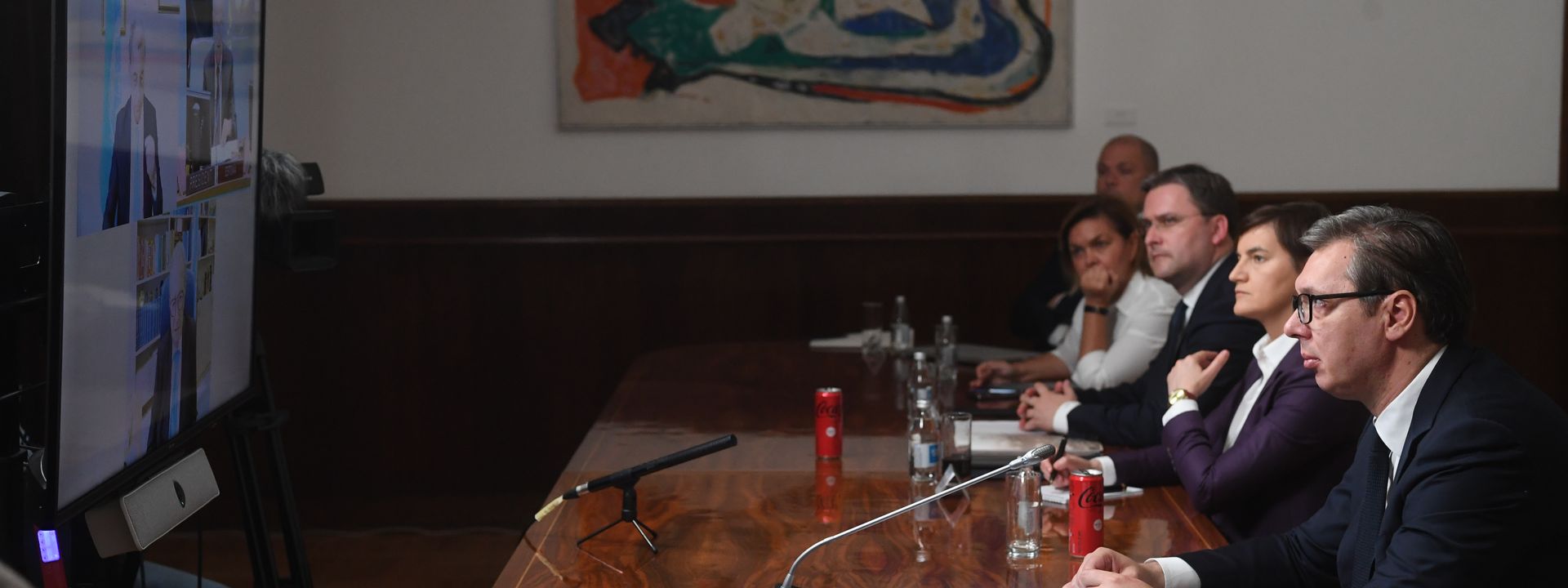 |
|
|
| Vučić and Botsan-Kharchenko: The policy of peace and cooperation is of the utmost importance for the further development of the Western Balkans |
|
President of the Republic of Serbia Aleksandar Vučić met today with the Ambassador of the Russian Federation, Alexander Botsan-Kharchenko and expressed gratitude for the delivered new quantities of Sputnik V vaccines, which were immediately included in the vaccination process in our country.
President Vučić and Ambassador Botsan-Kharchenko discussed the situation in the region. Speaking about the planned continuation of the dialogue between Belgrade and Priština, President Vučić said that the days ahead were difficult for our country, but that he would invest a lot of energy in Brussels to protect the state and national interests of Serbia, fighting for compromise.
Ambassador Botsan-Kharchenko confirmed Russia's active support for the defence of the international law norms and, thus, the territorial integrity of Serbia. The two interlocutors agreed that the policy of peace and cooperation is of the utmost importance for the further development of the Western Balkans.
President Vučić and Ambassador Botsan-Kharchenko reviewed the progress of economic cooperation between Serbia and Russia and pointed out that joint infrastructure projects, as well as projects in the field of energy, follow the planned dynamics and will greatly contribute to our country's economic progress and quality of life.
President Vučić and Ambassador Botsan-Kharchenko also discussed the next bilateral contacts between the officials of the two countries.
Source/Photo: www.predsednik.rs
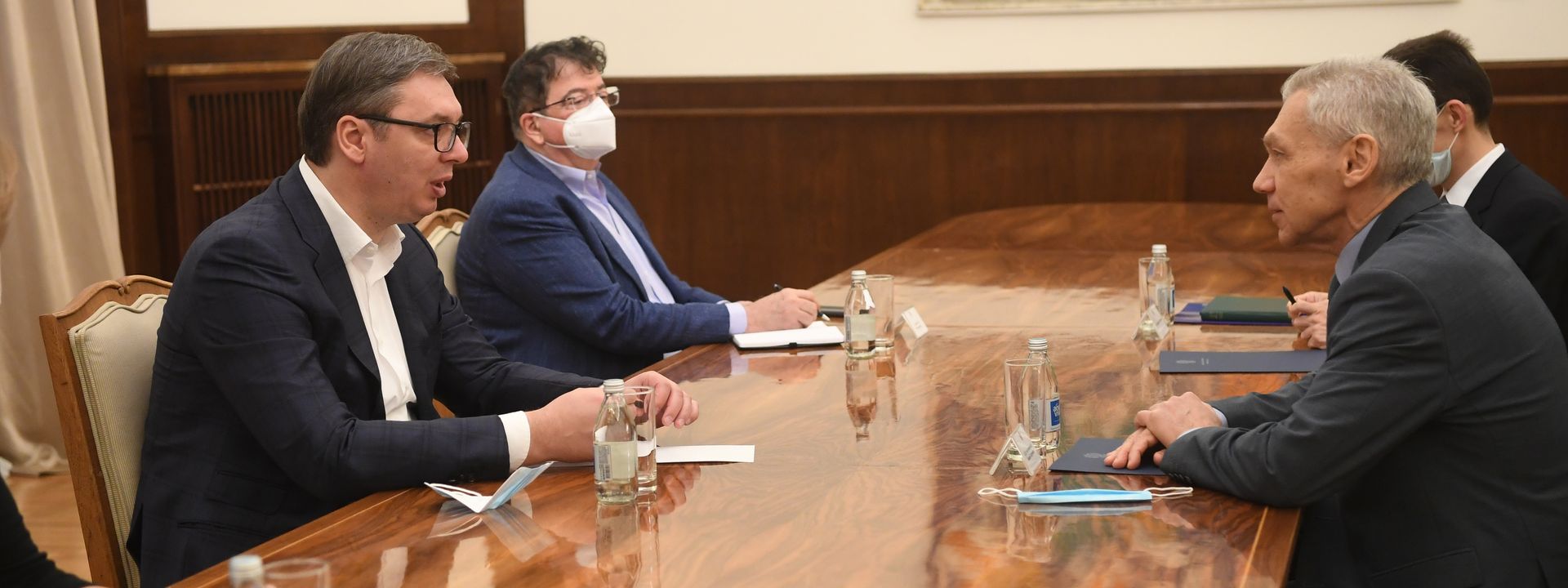 |
|
|
| Mnister Selakovic extends a condolence message to Russian Foreign Minister Lavrov |
|
Minister of Foreign Affairs of Serbia Nikola Selakovic extended today, in the wake of the attack on the school in Kazan, the expressions of condolences to Minister of Foreign Affairs of the Russian Federation Sergey Lavrov.
“Serbia, its citizens and I personally feel deeply shaken by the tragic events in Kazan, where a large number of children lost their lives in a monstrous school attack. There is no greater sin and crime than attacking children and no words of my mine can describe the pain I am feeling, as a human being and a parent”, Minister Selakovic stated in the telegram. According to the Minister, Serbia and its citizens are in their hearts and minds with the people of the Russian Federation, at this difficult hour.
"In addition to our deepest sympathy, we extend to you messages of encouragement and wish that you persevere in the fight against the evil that took the lives of innocent children", Selakovic said.
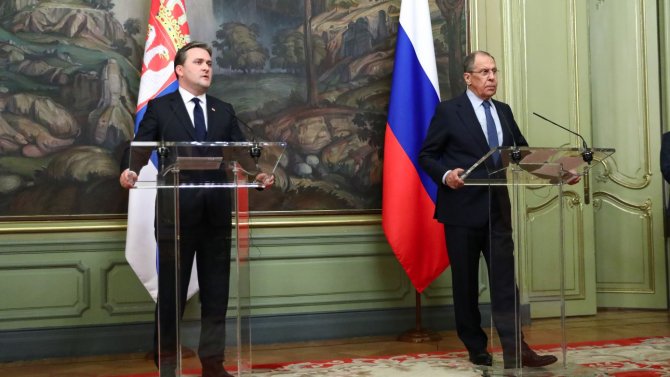 |
|
|
| Selakovic congratulates Minister Lavrov on Victory Day |
|
Minister of Foreign Affairs of the Republic of Serbia Nikola Selakovic sent a congratulatory message on the occasion of the Victory Day over fascism to the Minister of Foreign Affairs of the Russian Federation Sergey Lavrov.
"The Russian people and other peoples of the Soviet Union defeated not only the aggressors, but also the enemies of all free humanity by heroically defending their homeland in the Second World War, and today no-one may have any doubt that the Russian people is the one who had on this day dealt a death blow to the most dangerous ideology and killing machine the world has ever seen", reads the congratulatory message from the Head of Serbian diplomacy, adding that the Serbian people was proud of its anti-fascist tradition and the fact that during Second World War it had organized the first and most massive armed guerrilla resistance in the occupied territories, and that it saw every victory of the great Red Army as its own victory.
Selakovic pointed out that Serbia would remain firmly on the position of fostering the truth about the Second World War and against attempts to diminish the crucial and key role of the Soviet Union and the heroic Russian people in the victory over Nazism through historical revisionism, and underlined in particular that much like the Serbian and Russian peoples were allies then in the fight against world-scale evil, they will today as well be united in fostering the memory of the suffering and unwavering resistance of our ancestors.
"The fire at the Memorial Cemetery of the Belgrade Liberators, where Yugoslav and Soviet heroes rest side by side, will burn forever, and our memory of the glorious moments of our common history and our determination to fight together for peace and multilateralism in the world and against every ideology of evil will be eternal as well", Minister Selakovic concluded in his congratulatory message.
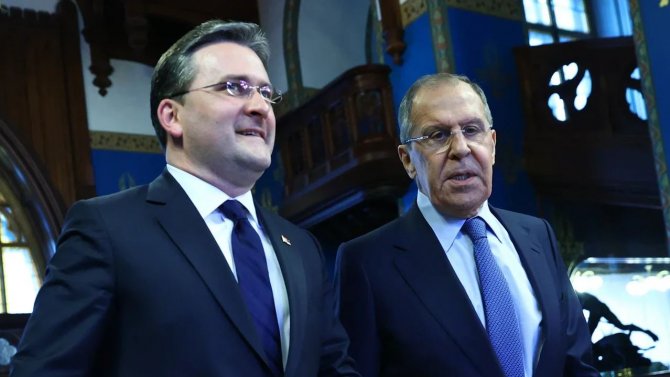 |
|
|
| Meeting with the Ambassador of the Russian Federation, 3rd May 2021 |
|
President of the Republic of Serbia Aleksandar Vučić met today with the Ambassador of the Russian Federation, Alexander Botsan-Kharchenko, to whom he presented Easter greetings for President Vladimir Vladimirovich Putin and Patriarch of Moscow and All Russia Kirill.
Congratulating Easter, President Vučić asked Ambassador Botsan-Kharchenko to convey to President Putin, Patriarch Kirill and all Orthodox believers in the Russian Federation, sincere wishes for peace, good health and all progress.
On this occasion, President Vučić also thanked for the support that Russia provides to Serbia during the pandemic, stating that the production of the Russian vaccine "Sputnik V" will contribute to ensuring the continuation of immunisation of citizens in the following period.
The interlocutors expressed satisfaction with the progress of economic cooperation between Serbia and Russia and pointed out that joint infrastructure projects, as well as projects in the field of energy, follow the planned dynamics and will greatly contribute to the economic progress of our country and the citizens' quality of life.
One of the topics of conversation was the celebration of the Day of Victory over fascism in the Second World War. The interlocutors agreed that one of the most important dates in modern history should be marked in accordance with the circumstances caused by the pandemic, but that the struggle for truth continues despite attempts to revise history, which is completely unacceptable for all nations who, like Serbian and Russian, maintain the libertarian tradition and who made huge sacrifices in the fight against fascism.
President Vučić and Ambassador Botsan-Kharchenko also discussed the situation in Kosovo and Metohija and regional issues. They agreed that the policy of peace, cooperation and preservation of stability are of the utmost importance for the further development of the Western Balkans.
Source/Photo: www.predsednik.rs
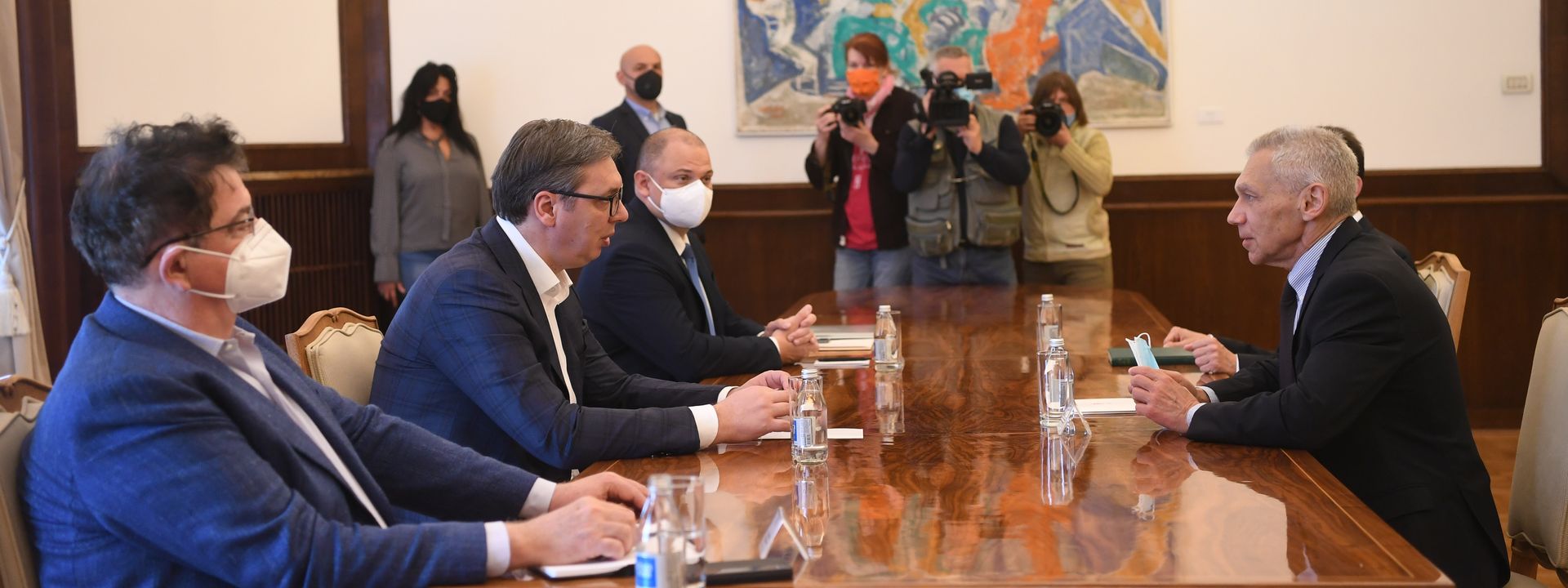 |
|
|
| Meeting with the World Health Organization Regional Director for Europe |
|
President of the Republic of Serbia Aleksandar Vučić met today with the Regional Director of the World Health Organisation for Europe Hans Kluge, to discuss cooperation in the fight against the COVID-19 pandemic, as well as cooperation in improving health care in our country and other joint activities.
President Vučić thanked Dr Kluge for his personal engagement and support during the current pandemic, especially for technical assistance and expertise. On this occasion, he informed the WHO official about the results of immunisation in Serbia and plans on how to provide the vaccine to all citizens who want to get it.
Dr Kluge congratulated President Vučić on his leadership and personal commitment to provide vaccines. He emphasised that Serbia, with its good immunisation strategy, ranked among the global leaders, thus becoming an example of humanity and solidarity by enabling vaccination of elderly people in rural areas, foreign citizens and donating vaccines to other countries.
"Serbia has accepted the vaccine as a life-saving product and has not looked at it geopolitically", said Dr Kluge.
The two interlocutors agreed that the world should increase production capacities for vaccines, as well as develop new adequate therapies for the fight against COVID-19, and, in this regard, work on increasing the level of citizens' trust in science.
President Vučić informed Dr Kluge about the plans for improving the work of the Institute for Virology, Vaccines and Sera "Torlak".
"We want to make 'Torlak' one of the best vaccine factories in Europe", said President Vučić.
Source/Photo: www.predsednik.rs
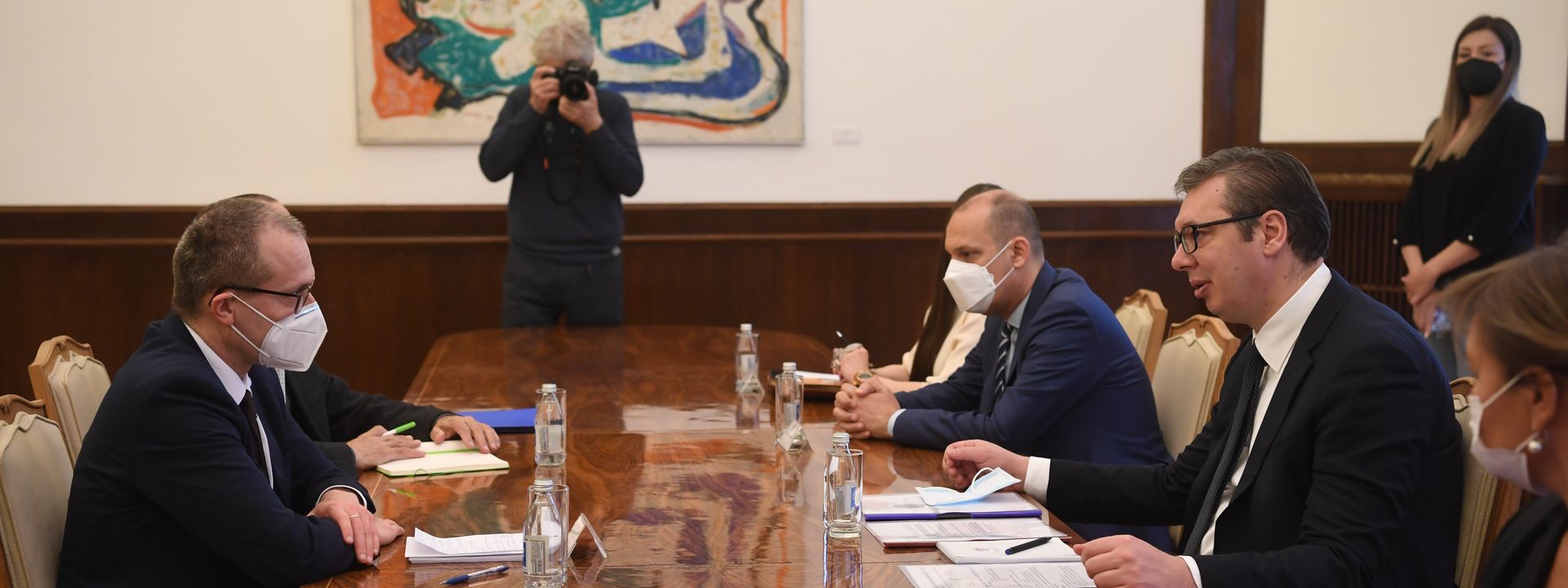 |
|
|
| WHO describes immunisation process in Serbia as impressive |
|
Prime Minister Ana Brnabic talked today with World Health Organisation (WHO) Regional Director for Europe Hans Kluge about the epidemiological situation and the course of immunisation of citizens in Serbia.
Brnabic expressed gratitude for the cooperation in the fight against the pandemic, technical assistance and expertise, emphasising that the support of this organisation is very important for our country.
She informed the WHO Regional Director for Europe about the course of immunisation of citizens in Serbia, expressing her belief that, thanks to the large number of vaccinated people, we will be able to create collective immunity and return to normal life.
Kluge assessed the immunisation process in Serbia as impressive, and added that Serbia has made a good decision to offer citizens all available vaccines used in the fight against coronavirus.
Expressing concern over the emergence of new strains of the virus, he stressed the need to speed up the immunisation process and show mutual solidarity.
The WHO Regional Director for Europe praised Serbia for the humanity it has shown by donating vaccines to the countries of the region and enabling vaccination for those who do not have a sufficient number of vaccines for their citizens.
The Prime Minister said that Serbia will continue to cooperate with the countries of the region and help in accordance with its capabilities.
When it comes to the project "Roadmap for Health in the Western Balkans 2021-2025", it was stated that, if epidemiological conditions allow, a regional meeting will be held in Belgrade at the end of the year, important for future improvement of cooperation between countries in the field of health challenges.
Source/Photo: www.srbija.gov.rs
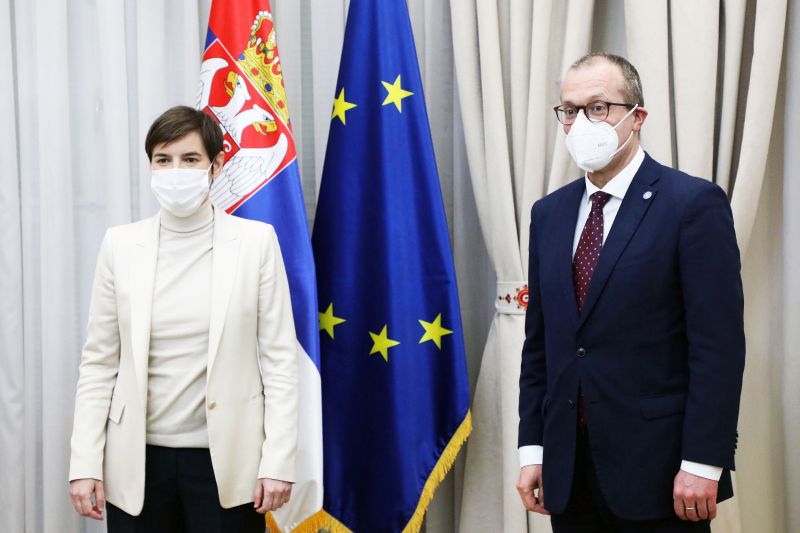 |
|
|
| Selakovic: Selfless and principled support of Russia to Serbia |
|
Minister of Foreign Affairs of the Republic of Serbia Nikola Selakovic met today in Moscow with Minister of Foreign Affairs of the Russian Federation Sergey Lavrov and on that occasion thanked Russia for its support to the territorial integrity and sovereignty of Serbia.
"I took the opportunity to thank the Ministry of Foreign Affairs of Russia and Minister Lavrov personally for their selfless, continuous, principled support to the territorial integrity and sovereignty of the Republic of Serbia, as well as for providing support in resolving the issue of Kosovo and Metohija by peaceful and diplomatic means, for which Belgrade is ready and on the basis of which it has built and strengthened its credibility so far", the Minister said.
The Serbian Foreign Minister pointed out that the high-level meeting with Minister Lavrov as well as other meetings between officials of the Republic of Serbia and the Russian Federation at the high and top levels were a good indicator and testimony of sincere, open and friendly relations between the two countries that fostered a long tradition of such relations.
The Minister pointed out that the meeting with his Russian counterpart was not only an opportunity to exchange opinions and views on important issues but also a meeting that would contribute to the preparation of a potential visit by President of the Russian Federation Vladimir Vladimirovich Putin to Serbia this year.
Selakovic emphasized that Serbia did not impose sanctions on the Russian Federation and that it remained on that very clear position.
"Serbia's position does not change. Although we are a country committed to its European path and EU membership, our friendship and centuries-long brotherhood with the Russian people and the Russian Federation do not change. You had the opportunity to see that we talk openly and honestly with each other, trying to see how we can help each other and I will quote our President Aleksandar Vucic who has repeatedly said - that Serbia will not impose sanctions on brotherly and friendly Russia", the Serbian Foreign Minister stressed and added that the issue of relations with Russia was always on the agenda with western partners, but that Serbia had a very clear position that would not change.
The Minister added that Serbia was the only country in that part of Europe that remained firm and consistent in that commitment and that position, despite the pressures that existed.
Selakovic also said that he informed Minister Lavrov that today marked exactly 2,921 days since the Brussels Agreement was concluded, which defined three obligations for Belgrade and one for Pristina, that Belgrade had fulfilled its obligations, while Pristina neither started implementing nor was implementing its only obligation - the formation of the Community of Serb Municipalities.
The Minister also thanked Russia for its support in international forums and organizations, when it comes to cooperation so far to thwart Pristina's attempts to join certain international organizations, and once again expressed deep gratitude for Russia's assistance to Serbia amid the Covid-19 situation, when as early as a year ago, Russian CBRN defence units came to Serbia and helped disinfect our health centers in Serbia.
"After that, we also had the opportunity to experience that help and support through the delivery of Russian Sputnik V vaccines, and now through the beginning of the experimental phase of production of that vaccine at the Torlak Institute in Belgrade. This significantly contributes to the further successful conduct of Serbia and the management of the crisis caused by the pandemic, where Serbia has recorded a significant number of vaccinated persons", the Minister said.
Speaking about economic cooperation and exchange between the two countries, Selakovic pointed out that they were considerably reduced due to the pandemic in the previous year, and emphasized that he talked to Lavrov about encouraging the continuation of that cooperation on a larger scale and returning to the pre-pandemic level.
To that end, the ratification of the agreement with the Eurasian Economic Union is of interest to the Serbian economy, Minister Selakovic said and underlined that all that remained was for Armenia to ratify that agreement, so that it could begin to be implemented.
The Head of Serbian diplomacy also welcomed the initiative for signing the strategic Russian-Serbian program of economic cooperation for the period 2020-2026, convinced that the International Economic Forum in St. Petersburg will be held in June, which will be another good opportunity for business representatives and the leaderships of the two countries to discuss these issues.
The energy field certainly deserved full attention when it comes to relations between Russia and Serbia, Selakovic pointed out, adding that successful cooperation was reflected in the construction of the Balkan Stream gas pipeline, which began operating on 1 January this year from Serbia's border with Bulgaria to Serbia's border with Hungary.
"We expect further that Hungary connects to that gas pipeline, and what marked and marks our successful cooperation in the field of energy is the business done by the Oil Industry of Serbia (NIS), as a subsidiary of Gazprom Neft. I would like to mention a very valuable investment of USD 330 million in the construction and completion of a plant for deep oil refining, which also certainly contributes to such a successful business of NIS. Let me also point out the exceptional experience with the Russian Railways, which are working on the section from Stara Pazova to Novi Sad, on the most complicated part of the construction of the high-speed railway - the Chortanovci tunnel and the viaduct, which we can see is going faster than planned", the Minister said.
Minister of Foreign Affairs of the Russian Federation Sergey Lavrov said that Russia was ready to and would continue to help the preservation of Serbia's territorial integrity, emphasizing that the basis of foreign policy cooperation between the two countries was adherence to the principles of international law and UN principles, including non-interference in the internal affairs of sovereign states and peaceful resolution of disputes.
He added that they agreed to continue the coordination in international organizations.
Lavrov said that he discussed with his Serbian counterpart all directions of joint cooperation and partnership, bilateral relations, but also regional and international issues.
"Regardless of the limitations due to the Covid-19 epidemic, our strategic cooperation continues to develop dynamically in all areas", Lavrov said, adding that Russia would continue to provide assistance to Serbia in neutralizing illegal attempts of Pristina to join international organizations.
Lavrov pointed out that he confirmed readiness for Russia to continue helping Serbian friends, to defend Belgrade's legitimate right to Kosovo and Metohija.
"We will continue to keep the focus in the UNSC on this issue and full respect for Resolution 1244 which envisages reaching an agreement on the status of Kosovo and Metohija between Belgrade and Pristina, and that agreement should be approved by the Security Council", Lavrov said.
As he emphasized, he was convinced that the balanced line of Belgrade contributed to peace and stability in a very complicated part of the European continent, and pointed out that he discussed with Selakovic the situation in Southeast Europe and support for activities and steps taken by the Serbian leadership in building good and constructive relations with all countries in the region.
He added that they paid attention to the joint fight against Covid-19 and vaccination of the population, stating that Serbia occupied one of the top spots in Europe owing also to the use of the Russian vaccin, and noted that they attached great attention to economic cooperation and increasing trade in goods while adding that cooperation in the implementation of major energy projects was crucial.
Selakovic and Lavrov stated that it was necessary to continue the cooperation in order to preserve people's lives and health, to which launching the production of the Russian vaccine in Belgrade would also contribute.
PHOTO: MFA Serbia / MFA Russia
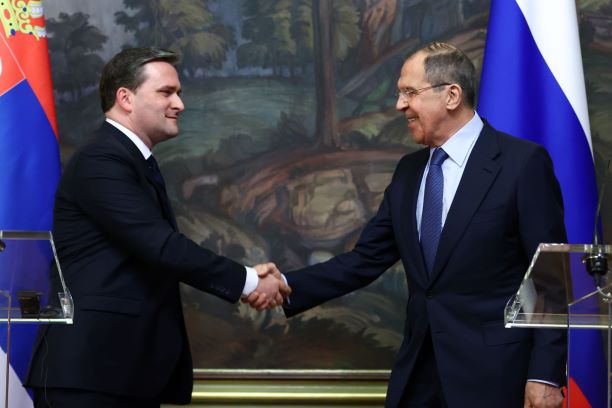
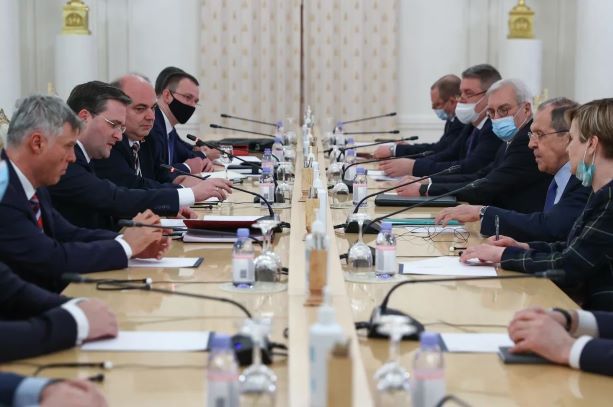
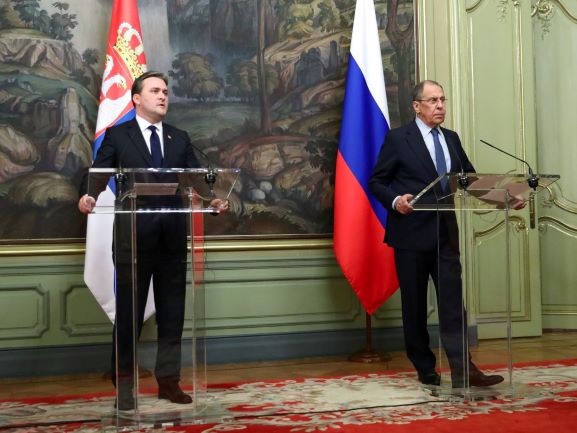 |
|
|
| Minister Selakovic at Prodexpo food exhibition in Moscow |
|
Minister of Foreign Affairs of the Republic of Serbia, Nikola Selakovic visited today in Moscow the International Exhibition for Food, Beverages, Food Raw Materials "Prodexpo" and the booths of Serbian companies presenting at the fair.
Visiting the representatives of 11 Serbian companies that exhibited their products at the fair, the Head of Serbian diplomacy emphasized that USD 57 million of exports by companies employing 3,500 people deserved every praise, and that work should be done to further increase those exports.
"It is a true pleasure to be at Prodexpo today, the largest exhibition of food industry and agricultural products held in Russia, and to be at the booth of Serbia, which looks brilliant, thanks to people from 11 serious Serbian companies oriented to the Russian market in terms of exports", Selakovic said.
The Minister emphasized that for the first time in a long time he heard about the planned investments of Serbian companies in the food and processing industry in the Russian market, and that our companies would start opening factories and plants in Russia, which he would support in every way.
"The Ministry of Foreign Affairs, under the auspices of which is also the economic diplomacy, will try to make additional efforts to remove all obstacles and barriers and to help companies conclude as many deals with Russian partners as possible", the Minister said.
Selakovic pointed out that, out of the 10 largest exporters to Russia from Serbia, nine of them were foreign investors, who had recognized the trade preferences that our country had to offer.
"This is one of the excellent things I have heard. We should spread that positive example and the good news that makes Serbia competitive, especially today in politically turbulent times. Serbia's policy enables us to record the smallest economic decline, i.e. the largest growth in Europe, even in the most difficult moments for the world economy during the pandemic", Serbian Foreign Minster explained.
He added that he talked with the management of the Exhibition about their wish to renew cooperation with Belgrade and other fairs in our country, but also with representatives of almost all companies, as well as to exchange information on how business deals were going in Russia, what were the advantages and what the aggravating circumstances.
Furthermore, Minister noted that the Chamber of Commerce and Industry of Serbia (PKS) was helping companies in their efforts to find serious partners in difficult times of the pandemic, close deals, make a profit and increase Serbian exports to Russia.
The PKS Head of Marketing Department Marko Obradovic underlined that Prodexpo was an exhibition where Serbian companies traditionally made excellent contracts and good deals, and pointed out that the interest was large.
With gratitude to Minister Selakovic for the visit, but also for the overall help and support that, as he said, the state provided in the internationalization of the business of domestic companies, Obradovic presented the Minister, on behalf of the PKS, with a plaque in recognition of his commitment to promoting the economy.
The PKS Head of Office in Russia Dejan Delic specified that among the 11 companies were those in the business of the production and processing of fruits and vegetables, both frozen and dried, and producers from the dairy industry, of cottage cheese, spreads, and meat industry and products.
As he added, they all had the opportunity to improve on the previous agreements and to meet new business partners.
Representatives of companies, including the ITN group, which, according to sales director Mirjana Nikolic, exported about 11,000 tons of frozen fruit, also confirmed that the Russian market had an interest for Serbian food products.
Nikolic expects new business arrangements after each fair, and according to her, they also used the fair as an opportunity to meet with the existing customers in Russia, with whom they had been cooperating for years.
She added that, in addition to the frozen program, with which they were already present there, they were now also presenting Budimka's products, because they had a plan to offer jams, marmalades, juices, purees and soured winter products to the Russian market.
Among the companies being presented is Carnex, which has been exhibiting at the Moscow exhibition for more than five years, and the marketing director of that company Olivera Papistijevic said that they were even awarded, which, in her opinion, proved that the company was meeting the needs of such a large and demanding market.
Prodexpo is held in Moscow on 12-16 April, and organized by the Chamber of Commerce of Industry of Serbia and the Development Agency of Serbia, where 11 Serbian companies are promoting their offer and export potential, that employ more than 3,500 people and export food products to the demanding Russian market amounting to more than USD 50 million.
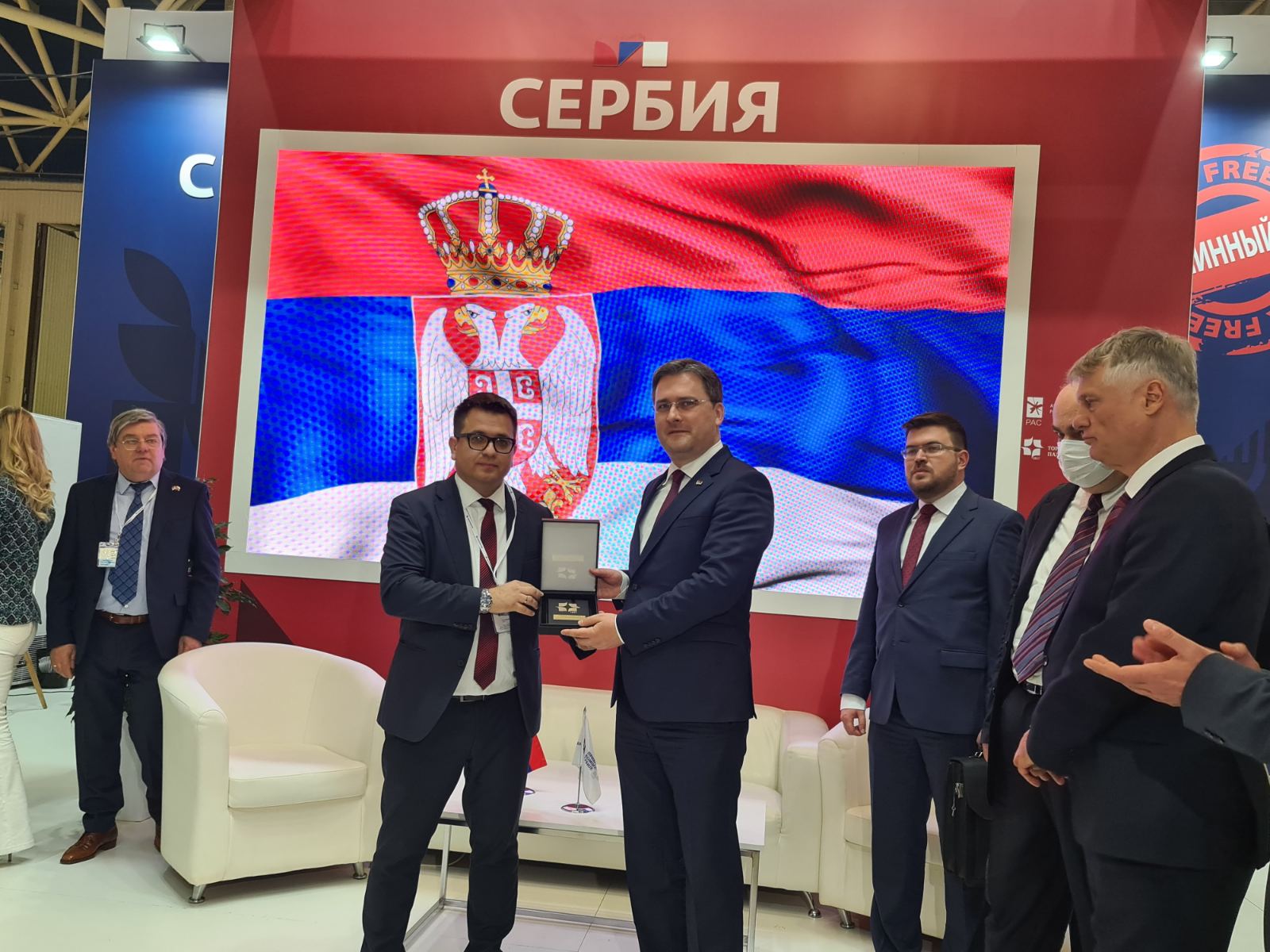
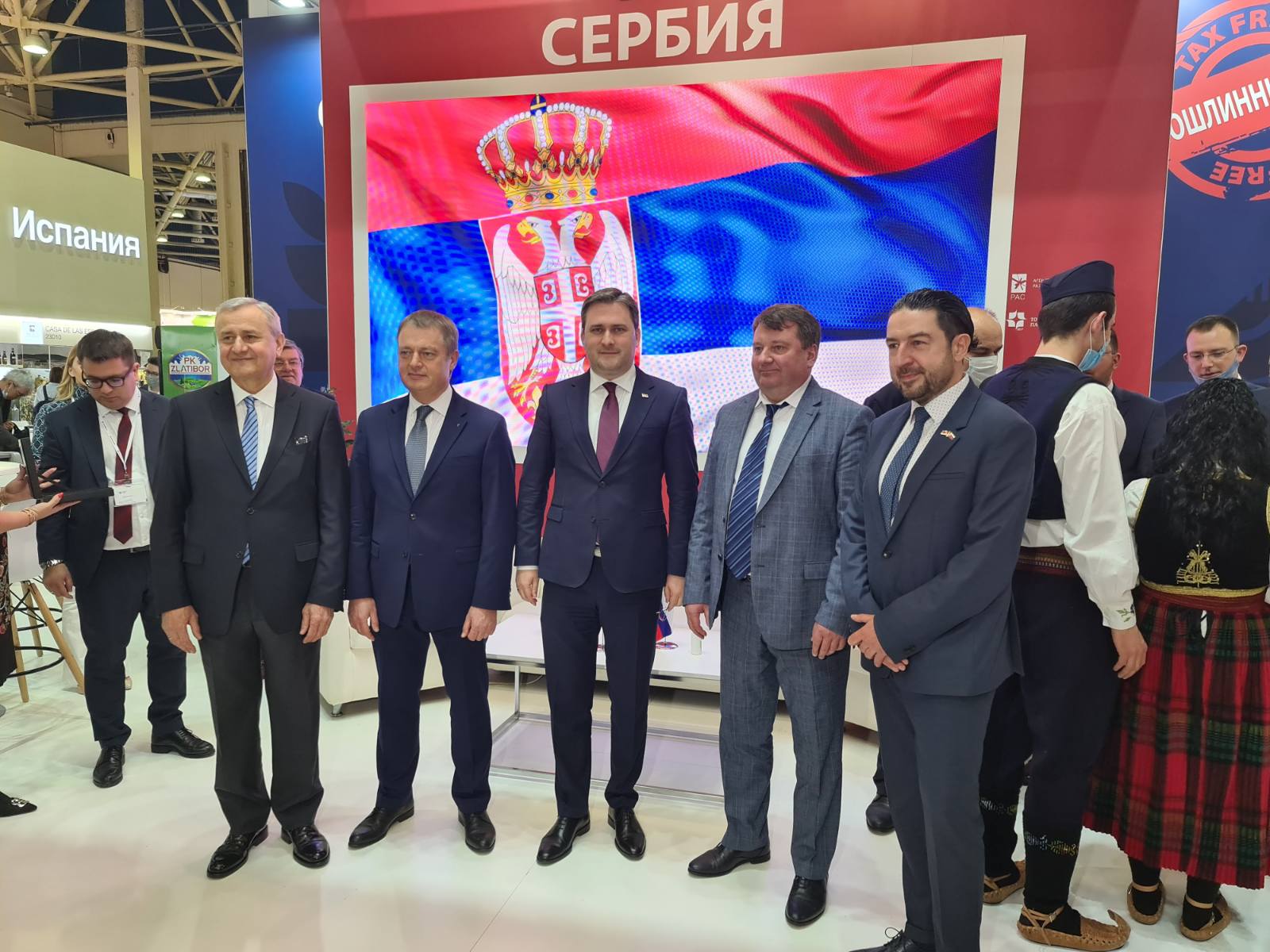
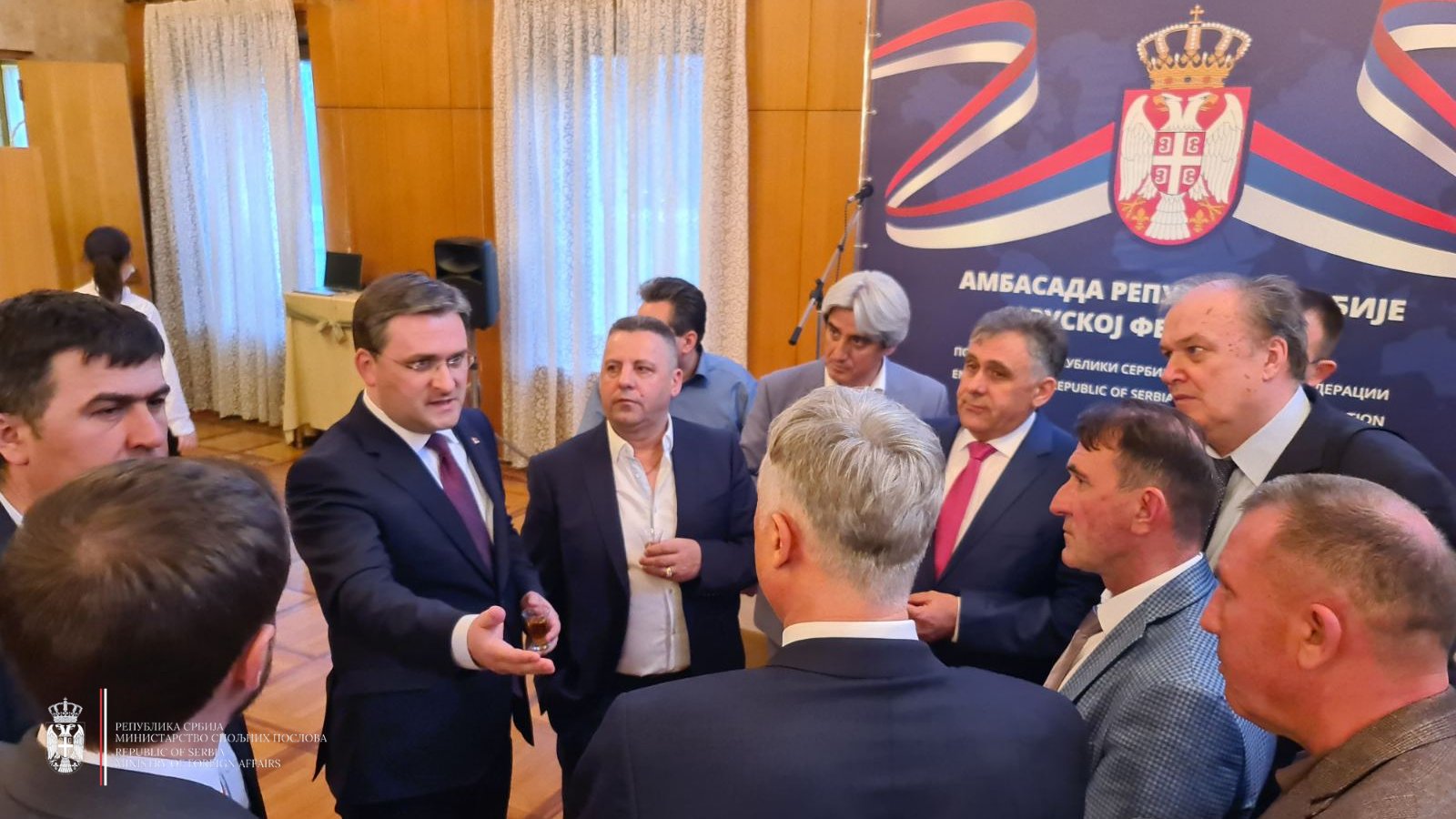 |
|
|
| President Vučić met via video link with representatives of the IMF delegation |
|
President of the Republic of Serbia Aleksandar Vučić talked today via a video link with the representatives of the delegation of the International Monetary Fund led by the Head of the Mission, Jan Kees Martijn. The interlocutors concluded that Serbia's main goal remains to preserve the hard-earned reputation of a fiscally secure country, as well as to continue with a responsible fiscal policy so that public debt does not exceed 60 per cent of GDP, whereby Serbia continues to work on further economic growth.
During the conversation, President Vučić and Jan Kees Martijn especially referred to the incentive measures and adopted three packages of measures to help the economy and citizens, which preserved macroeconomic stability and even achieved a higher employment rate. Martijn commended the responsible economic policy of Serbia and the successful crisis management during the pandemic.
"Serbia achieved one of the best results last year despite the challenges of the pandemic", Martijn said, noting that Serbia was one of the few countries to which the IMF did not adjust the initial projection of the 5% growth rate it gave last year.
President Vučić added that following the first quarter of 2021, Serbia is well on its way to achieving the planned growth of 6% as planned, since one of the main focuses of the Government is investing in large infrastructure projects and intensifying work on attracting foreign direct investments.
"In 2020, Serbia was at the very top in terms of economic growth in Europe, and I am convinced that this year we can enter the first three or four countries in terms of growth", said President Vučić, adding that he was satisfied that Serbia still, despite the pandemic situation, has an extremely strong inflow of investment.
President Vučić and Jan Kees Martijn also discussed a new advisory arrangement, which is of special importance in light of the improvement of the general investment climate in Serbia, as well as in the context of even greater investor assurance.
"Given Serbia's tremendous progress over the past eight years, the priority goal of this arrangement will be to preserve the results achieved, but also to provide support for further implementation of structural reforms aimed at even faster, stronger and more sustainable growth", said President Vučić and thanked the IMF and the personal engagement of Jan Kees Martijn in the professional and expert support that Serbia is counting on.
President Vučić pointed out that Serbia will pay special attention to reforms in public companies, and that priorities will continue to be investments in infrastructure, creating an even better climate for investments, greater investments in the environment, science and capital projects, which will further contribute to the long term stable financial growth in the coming years.
Source/Photo: www.predsednik.rs
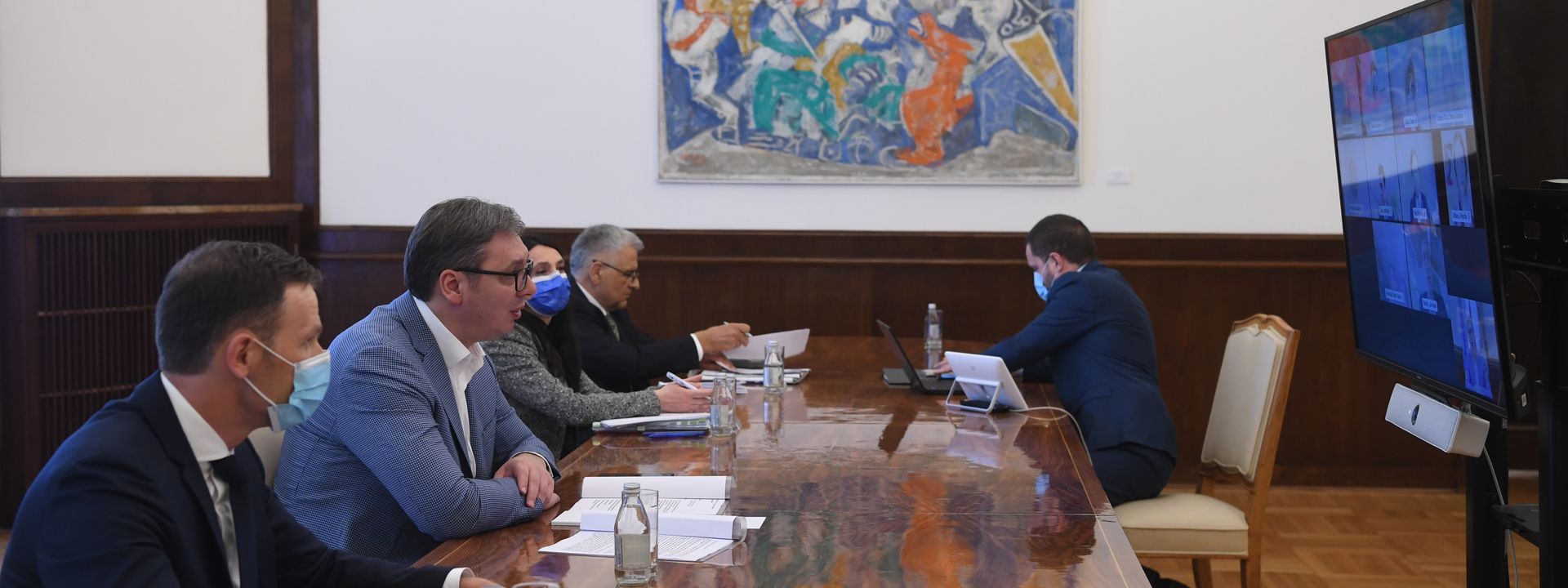 |
|
|
| Gouillon: Serbian schools to open in Russia in September |
|
Supplementary schools of the Serbian language, to be attended by Serb children living in Russia, should start their work in September in three Russian cities - Moscow, Saint Petersburg and Sochi, the Director of the Office for Cooperation with the Diaspora and Serbs in the Region Arnaud Gouillon said today. Gouillon, who is on a six-day visit to Russia with a delegation from the Ministry of Foreign Affairs, told Sputnik that such schools existed in Russia until two decades ago, and that now the need for them appeared again.
"There is no identity without language, and identity is lost due to one's lack of language skills. These ties are very important, not only in the context of family. We have witnessed that in some countries children do not speak Serbian and are not able to communicate with their grandparents. This is really sad. Looking at this matter in the long term, this also implies losing that connection and thread with Serbia. When the language is there - the identity is present as well, there is a desire to visit Serbia, and sometimes even to return to Serbia", Gouillon said.
Serbian President Aleksandar Vucic announced the opening of a Serbian school in Moscow in October 2018, so that the children of Serbian citizens living in the Russian capital could use their mother tongue.
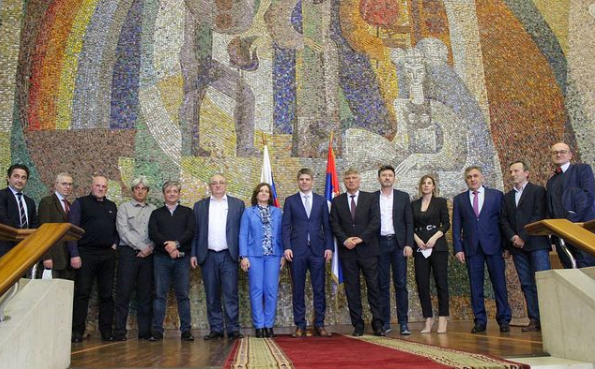
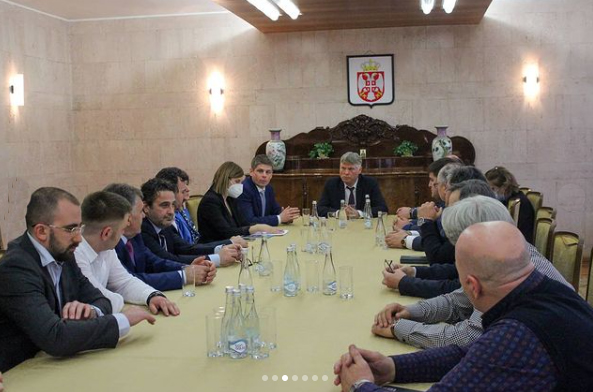 |
|
|
| Marking the Day of Remembrance of the victims of the NATO aggression |
|
President of the Republic of Serbia Aleksandar Vucic made a statement on the occasion of marking the Day of Remembrance of the victims of the NATO aggression.
"Your Holiness, distinguished Chairman of the Presidency of Bosnia and Herzegovina, distinguished Speakers of the National Assemblies of the Republic of Serbia and the Republic of Srpska, distinguished Prime Ministers of the Republic of Serbia and the Republic of Srpska, distinguished Ministers of both Governments, dear guests and friends, representatives of the Serbian People from Montenegro, North Macedonia, Croatia, thank you for the fact that we are all together tonight and that the Serbian spirit is unbreakable and invincible.
One child a day and a little more than that. That is the most difficult, sickening and painful number of the NATO aggression from 1999. Killed, stopped, guilty of nothing, having committed no sin, without the right to defence, without the right to justice and without the right to life.
No one has ever been held accountable for this crime, a crime greater than a crime. No one, for the 2,500 killed civilians, but also soldiers and policemen who were only guilty of guarding, protecting themselves and their homes. No one has ever been held accountable for more than 6,000 persons injured.
Even today, 22 years after the aggression, it is not possible to explain that, there is no universal justification, despite all the work done to that end, there is no reason, it makes no sense, and only names remain, as eternal as sin.
Miljana Milic, fifteen years old,
Vladimir Milic, twelve years old,
Miomir Mladenovic, fourteen years old,
Dragan Dimic, three years old,
Julijana Brudar, ten years,
Olivera Maksimovic, twelve years old,
Miroslav Knezevic, thirteen years old,
Dajana Pavlovic, five years old,
Stevan Pavlovic, eight years old,
Marko Simic, two years old,
Milica Rakic, three years old,
Ivan Ivancic, seven years old,
Marko Ivanovic, three years old...
And the list goes on, eighty nine names, not only Serbian ones...
The senselessness of sheer killing did not choose. Sixteen children, aged two to seventeen, from the Ahmetaj and Hasani families, were killed in a convoy returning home to Prizren.
In one headline in the West, this was simply explained as a "tragic mistake". The deaths of Marko Roglic, Milan Ignjatovic, Gordana Nikolic, Irena Mitic, Milica Stojanovic, Bojana Tosovic, Branimir Stanijanovic, our Sanja Milenkovic... could not expect or get even such an explanation.
Those deaths were not tragic, for those who caused them, much less a mistake. It was just an excuse, a miserable excuse.
They were a result of intent and a clear decision, as a severe judgment against one country, its people, its children.
And that is why today we will refrain from speculation in giving a name to everything that happened during the spring of 1999. Because a crime happened, a heinous and terrible one. And it was an aggression, not a bombing, not an intervention, not a campaign, not an operation. An aggression is what happened. An attack on a sovereign country, without a decision of the United Nations, without a sufficient reason that would justify attacking the then Yugoslavia or a neighbouring or NATO country.
No one was attacked by Serbia or the Federal Republic of Yugoslavia at that time. They attacked us, with one goal. To defeat us, to keep killing us, and in the end to take away a part of our territory.
And no matter how much we analyze things today, no matter how harsh and critical we are towards ourselves, our policy and leadership at the time, it is clear that the Federal Republic of Yugoslavia and Serbia were left with almost no choice then. The choice was horrible, either the loss of territory and people on the one hand, or the complete disappearance of the Serbian state, morals, honour, Serbian spirit, names and surnames. And we could not help but lose. Nineteen big ones attacked one small country, the Federal Republic of Yugoslavia. They attacked both Serbia and Montenegro. And even when they don't talk about it today, in one of the two independent countries, those are the facts. And that small country, and that small nation, to all nineteen of them so great and powerful, held a lesson in what matters most - honour, morals and love for freedom that a nation can have.
Yes, justice, lest we forget justice. All those nineteen great ones today still silently talk about their military success, avoid answering questions, while - can you imagine, one small, only numerically small Serbian people, that small but magnificent nation, with sadness, tears in their eyes, proudly remembers their resistance and struggle against the nineteen cruel and arrogant ones.
We lost a lot, we lost our fathers, brothers, spouses, children, but the honour and Serbian heart are still there, to protect Serbia, which is eternal and indestructible.
We lost children, we lost people, we lost control over a large part of the territory, we lost billions because of the destroyed infrastructure and economy.
And all that was left for us was the body of a tortured, destroyed country, a country in disintegration, mutilated, looted, wounded, deserted, and guilty, condemned for everything that happened not only in the 1990s, but throughout history.
A country that, even ten years after the aggression, did not have the strength to stand up, rise to its feet, and do anything but be silent, or bow its head and obediently apologize, for everything, even for its dead, even for its murdered children.
Today, it is no longer that failed, tortured, devastated, mutilated Serbia.
Today, it is Serbia, which has found its strength and its pride again.
Serbia, which calls things by their real names.
Serbia, which turned its back on war and defeats, and started working.
Serbia, which rose to stand on its own feet and has a voice of its own.
Serbia, which, even when they don't believe it, they listen to. Which is capable, which is growing, and is no longer part of the problem. Serbia, which is and will be, at least we will do our best to this end, the very solution that enables the entire region to live in peace and understanding.
And that Serbia, today, when there are still many more bombs in the world than vaccines, sends not bombs, but precisely those vaccines to the region.
Today, it is ready to produce them as well, and in just a few months we will do just that, but not only for ourselves, but also for others, for the entire Balkans.
We are ready, and we are willing to help.
We are not ready to be and we will not be silent, nor be humiliated again.
We draw the right to that not only from the victims we had, but also from the fact that we stopped looking at others only a long time ago, and looking for fault and guilt only in them, and not sometimes in ourselves as well.
We looked at each other and admitted. Every loss, every defeat and every crime that someone committed in our name, every failure and every wrong policy.
And we are no longer doing anything that could endanger anyone.
We continue to work and work, and grow more and more, gaining strength with only one goal - to be the best in economy and education, health, in culture, science, sports...
And we want to be safe, on our own. We want our army to be much stronger than it was in 1999. So that we never again face a situation that someone is killing our children, destroying the country, or expelling our people.
We want to remain free, to decide our own destiny, and for no one to take everything away from us ever again, and give us nothing.
And that nothing today, and I will repeat it as much as necessary, is the idea of some great, powerful ones, but also those who serve them, the idea that "Kosovo" should recognize us, so that we could recognize "Kosovo".
We do not need that recognition. And Serbia will not allow you to walk over our victims, our history, our past, but also to walk over our future. You will get the answer of reasonable, kind and responsible people. We need a compromise. We need all the obligations that we and Pristina have assumed to be fulfilled, but only we have fulfilled them so far.
And this is not our whim. It is not a phantasmagoria about a Serbian world that we want to create.
Even today, when they threaten us with the formation of a Greater Albania, when they say that the Community of Serb Municipalities is not going to happen, it is ours to be calm, to take care of our people in Kosovo and Metohija, but to send a clear message to all those great, powerful ones that we are not as weak as we were, that we will be able to preserve what is our own, not touching anything that belongs to anyone else. After all, Serbia is not and will not be but a handful of oats that every crow from the whole wide world can eat. As for those who used the strength and power of the nineteen arrogant and cruel ones, I only ask them not to threaten us. Please, please, don't threaten us. They should not think that Serbia is broken and that it will not have the strength to respond. Please, please, our Albanian neighbours, do not threaten us. And we ask all others, who have demonstrated their cruelty towards Serbia, not to help you in that. That is all we are asking and nothing more.
And we will respond to calls for peace, calls for compromise, and always with good will, because we do not want to have children killed again. And we do not want the children of others to suffer again. But do not underestimate Serbia, and do not look at Serbia with the same eyes as you did in 1999.
Today, Serbia is much stronger, much more powerful. Today, Serbia is a united country of togetherness, not a divided one.
Today, Serbia is incomparably stronger and better in every aspect than it was in 1999, from the economy to our army. And we will never threaten anyone, we just ask you and request from you to respect us and nothing more.
Today, we are building roads that will connect us, among ourselves, with the region and with the world. Until the end of the year, we will work on eight motorways, on eight routes in the entire Balkans, not only Serbia, eight roads of peace and cooperation.
Only a crazy person would trade this for war, for dead children, for demolition and new loss. And yes, we want to have the closest relations with everyone who took part in the aggression against our beautiful Serbia, we have forgiven a long time ago, but no, we will never forget. And don't ask us to. That one day, every year, we will remind both ourselves and you. The nineteen of you, the most powerful, strongest, greatest in terms of might and force, but not so much when it comes to honour and morality. We will keep remind you and ourselves, just so it would never happen again. Not to us only, but to none other freedom-loving people in the world.
And if we have an offer, today it reads as follows: we are ready to make the whole Balkans a winner, for everyone to win, as long as no one tries to make Serbs the only losers.
And the path to this goal is not difficult at all.
We just need to respect and understand each other and not try to humiliate each other.
And not to touch into what everyone paid the highest and bloodies price for. Freedom. And we, Serbs, know the price of freedom.
Into our right to have it, to keep it and to remember all the victims who are part of it.
And our defeats, our lives and our children are built into ours. And the lives of our heroic pilots, and our giants from Kosare and Pastrik, and our children, innocent, completely innocent, and only guilty of living in Serbia.
This is too high a price to be quiet about it.
Because that would mean that we are ready for another defeat, for another humiliation.
And we are not.
And when all go quiet, we will keep repeating.
A child a day, and a little more. This was how much you killed us. In an aggression that even you did not understand why you carried it out.
And we will keep repeating this, just so it does not happen to us again.
With special reverence, we are fulfilling our obligation to pay tribute to all innocent Serbian victims who laid their lives on the altar of the homeland, both civilians and our heroic soldiers and policemen, the heroes of Kosare, Prizren, Mitrovica.
Today, for us Serbs, life in Kosovo and Metohija is like Via Dolorosa, using their last strength on the road to Golgotha, but we would not be Serbs if we were not capable to "exist in a terrible place".
And today, tonight, I can conclude with one important sentence. On the soil of Europe, there was, and today is stronger than ever, an indomitable, unwavering, unconquerable and never conquered Serbia.
May eternal glory be to all the victims of the NATO aggression and let us all exclaim together - long live free and proud Serbia", President Vucic said.
Source:www.predsednik.rs
Photo: www.predsednik.rs
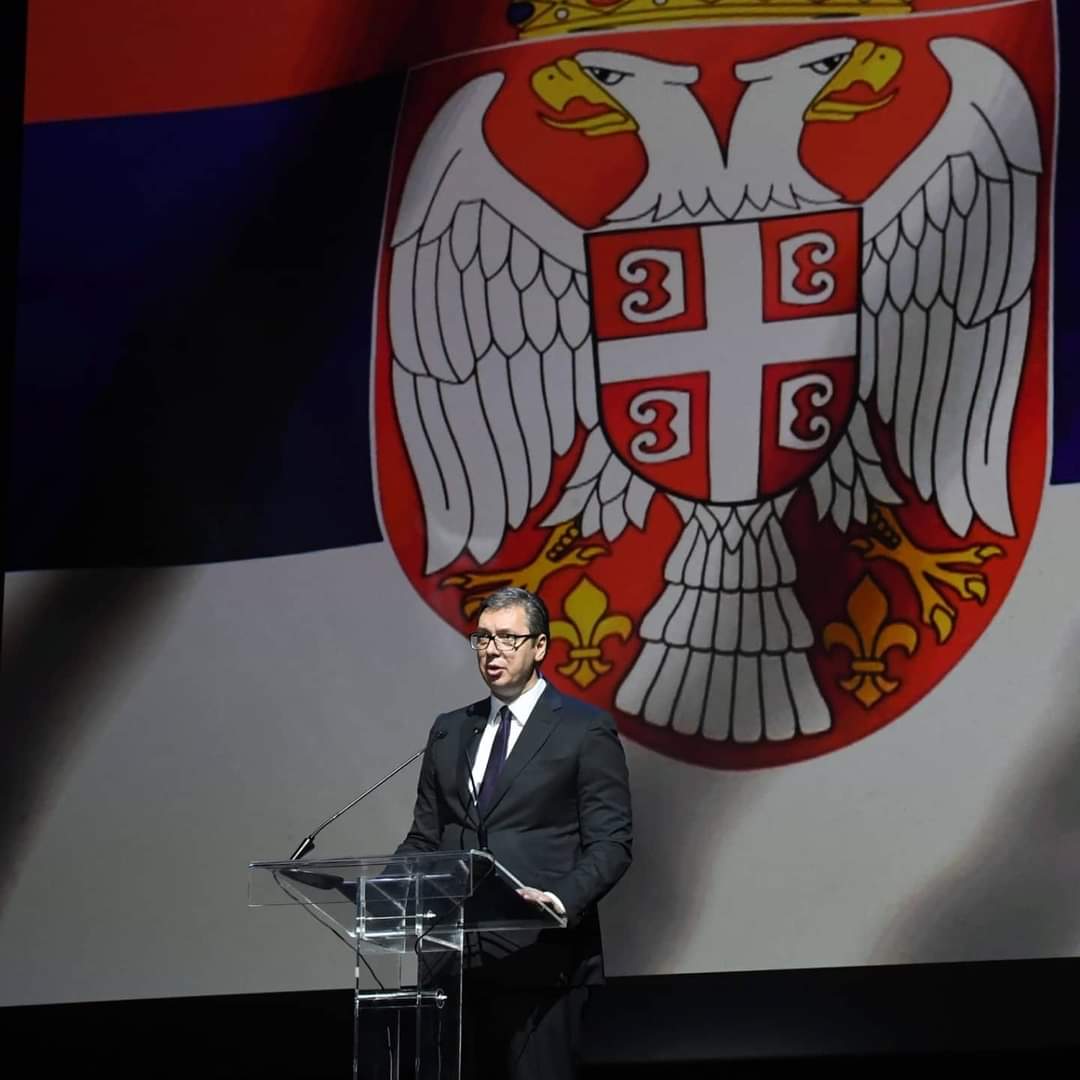 |
|
|
| Meeting with the Ambassador of the Russian Federation |
|
President of the Republic of Serbia Aleksandar Vučić met today with the Ambassador of the Russian Federation Alexander Botsan-Kharchenko and thanked for the new 100,000 'Sputnik V' vaccines delivered yesterday and which contribute that the vaccination process in our country continues unhindered.
President Vučić and Ambassador Botsan-Kharchenko discussed plans to hold the St. Petersburg International Economic Forum, which would present an opportunity for new talks on economic cooperation between Serbia and Russia and, in particular, on trade exchange, which is set to exceed four billion dollars.
The two interlocutors expressed satisfaction with the progress of economic cooperation between Serbia and Russia and pointed out that joint infrastructure projects, such as the Stara Pazova-Novi Sad railway and the railway dispatch centre, as well as energy projects, such as the gas pipeline from Bulgarian to the Hungarian border, contribute to our country's economic progress. It was also stated that these projects follow the planned dynamics.
President Vučić and Ambassador Botsan-Kharchenko also discussed the regional situation, especially Bosnia and Herzegovina and Kosovo and Metohija, agreeing that a policy of peace and cooperation is necessary for the stability of the Western Balkans.
Source/Photo: www.predsednik.rs
 |
|
|
| NIS continues realisation of key projects |
|
Prime Minister Ana Brnabic talked today with General Director of Petroleum Refining Industry of Serbia (NIS) Kirill Tyurdenev about the results achieved by the company in the past year and the planned investments and projects for the coming period.
Brnabic expressed satisfaction with the achieved results and activities of NIS management despite the crisis caused by the pandemic, which is reflected in the fact that they managed to ensure continuity of production, continue the implementation of strategic projects and save salaries and jobs for employees.
Tyurdenev especially highlighted the importance of the completion of one of the key projects of the second phase of modernisation of the Pancevo Refinery, in which €300 million were invested.
He underlined that NIS will continue to invest in all key projects planned for 2021, and will also work on improving the retail network in Serbia and the region.
The importance of digital transformation was also discussed at the meeting, as one of the important segments in the business of NIS, which will contribute to better and faster realisation of business goals.
Source/Photo: www.srbija.gov.rs
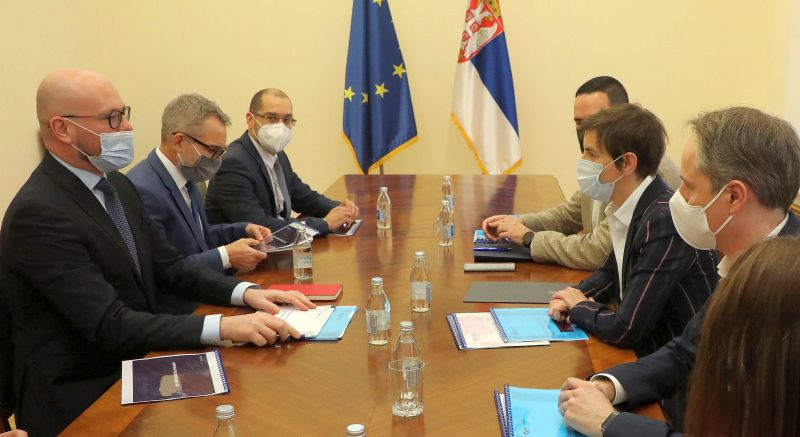 |
|
|
| Commemorating Remembrance Day of 17 March 2004 - Pogrom in Kosovo and Metohija |
|
President of the Republic of Serbia Aleksandar Vucic participated today in the commemoration of the Remembrance Day of 17 March 2004 - Pogrom in Kosovo and Metohija. He said that exactly 17 years ago, a pogrom took place in Kosovo and Metohija, and that pogrom surpassed all other crimes.
"There may be times when we are powerless to prevent injustice, but there must never be a time when we fail to protest, these words of Elie Wiesel, a camp survivor and Nobel laureate, make it forever incumbent upon us not to remain silent against crime, regardless of who and for what reason committed it", President Vucic stated and added that we remembered and learned every lesson in which we were losers, each one in which we were silent to our own victims, and each one when we were ready to forget.
"Serbia is no longer weak today, nor is it a country of losers, it does not threaten, but it does not forget either, it is ready for talks, but not for humiliation. Serbia, just like everyone else, has the right to take care of its people, their safety and well-being. The right to life is a fundamental human right and we will always defend it", President Vucic said.
President Vucic said that pogrom surpasses all other crimes, because it is not only an act, but an intention, a policy, a premediated attempt to forcibly cleanse persons belonging to other peoples and faiths from a region or a country.
"We have no right to remain silent to that", said the President of Serbia, emphasizing that we have an obligation to be winners without blood spilled and war, to be the best in the economy, healthcare, sports, education and everything else that implies development and progress.
"We also wish others to work on themselves and be successful, because we are aware that crime is a tool for losers that winners do not need, as they remember, but forgive and move on, while the losers keep spinning in the same vicious circle. We Serbs do not want to be that anymore, we want a future in which we will remember, but from which we will not return. We know what happened and we call it by its real name", President Vucic concluded.
Photo: Dimitrije Goll
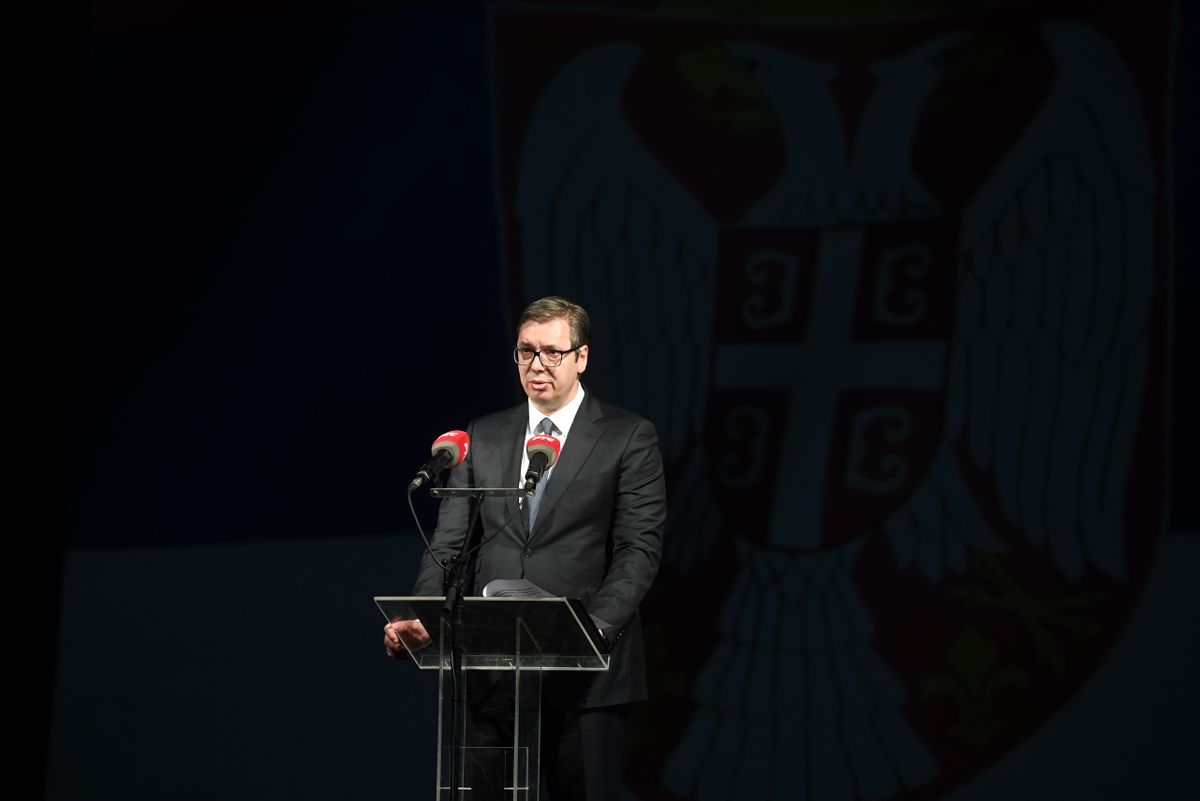
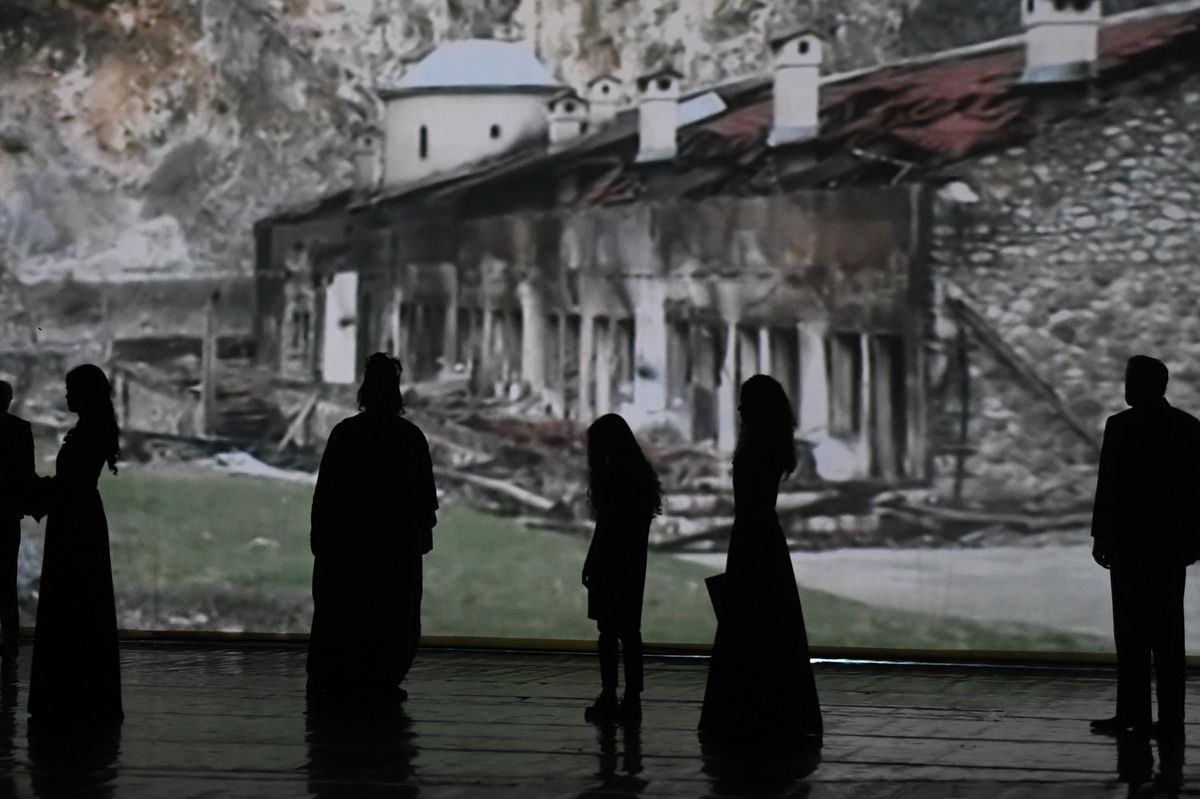 |
|
|
| Tourist offer of Serbia presented to Russian tourists |
|
The tourist offer of Serbia was presented today to the readers of the Russian daily newspaper Rossiyskaya Gazeta (Russian Gazette), in a special titled "Discover Serbia".
The daily circulation of Rossiyskaya Gazeta is over 800,000, most of which is sold in Moscow and Saint Petersburg, the Tourist Organization of Serbia (TOS) said in a statement.
This is a daily newspaper that is delivered to the office of the President of the Russian Federation, the Prime Minister and the Duma.
The readership of this newspaper also includes international multinational companies, Russian airlines, airports, leading restaurants and hotels in Russia.
The Rossiyskaya Gazeta and "Discover Serbia" special will also be available to Russian ministries, Russian embassies around the world, but also to the Association of Tour Operators of Russia.
The special on Serbia is issued at a time when the tourism industry is one of the main topics in Russia, because it will be the focus of the public's attention during the international online tourism trade show MITT 2021, which is being held from March 16 to 18.
In addition to presenting the tourist offer of our country, the "Discover Serbia" special also includes interviews with Minister of Trade, Tourism and Telecommunications Ms. Tatjana Matic and Director of TOS Ms. Marija Labovic.
In addition to TOS, the tourist organizations of Belgrade, Nis and Novi Sad also participated in the project of issuing this special, reads the statement issued by TOS.
The special on the tourist offer of Serbia is available at: LINK
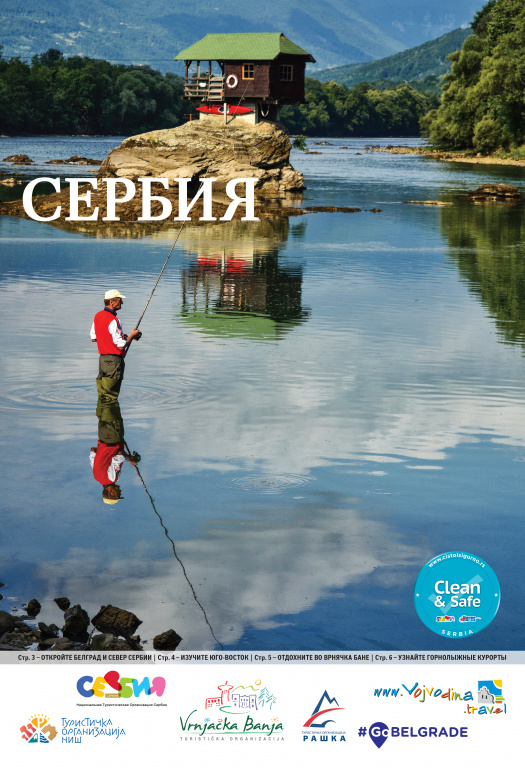 |
|
|
| Exceptional importance of the strategic partnership between Serbia and the Russian Federation |
|
Minister of Foreign Affairs of the Republic of Serbia Nikola Selakovic had talks today with Ambassador of the Russian Federation Aleksandr Botsan-Kharchenko.
Minister Selakovic stated that Serbia was firmly committed to the further development of political relations with the Russian Federation on the basis of traditional friendship and closeness of the two peoples, strategic partnership and readiness to deepen cooperation in all areas.
Selakovic expressed satisfaction with the existing intensity and continuity of meetings at the high and top levels, expressing the expectation that the visit to Serbia by the President of the Russian Federation Vladimir Putin would be realized in the near future. The interlocutors also discussed the upcoming visit by Minister Selakovic to the Russian Federation.
The Head of Serbian diplomacy expressed special gratitude for Russia's strong and consistent support to the territorial integrity and sovereignty of Serbia, as well as to our side's efforts to resolve the issue of Kosovo and Metohija by peaceful and diplomatic means, through dialogue. The importance of permanent mutual support in international organizations was emphasized at the meeting.
Serbia attaches great importance to the strategic partnership with the Russian Federation and the promotion of overall relations, Selakovic said noting that Russia was also one of the most important economic partners of Serbia.
Minister Selakovic underlined in particular his gratitude to the Russian Federation for the efforts made to make the Russian vaccine "Sputnik V" available to the citizens of Serbia, both on the basis of deliveries from Russia and on the basis of agreements reached on future joint production of the vaccine in Serbia.
Belgrade, 13 March 2021
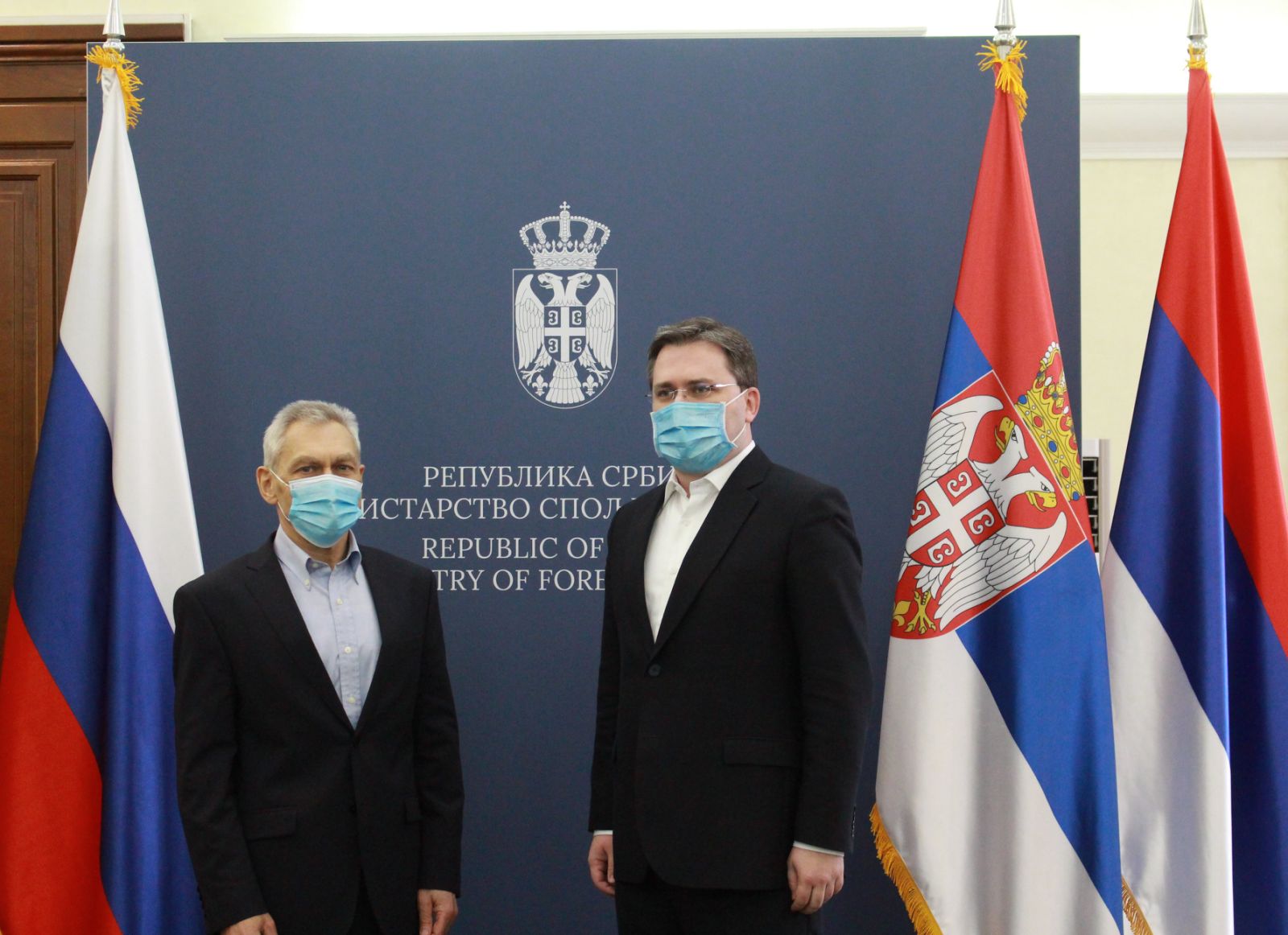
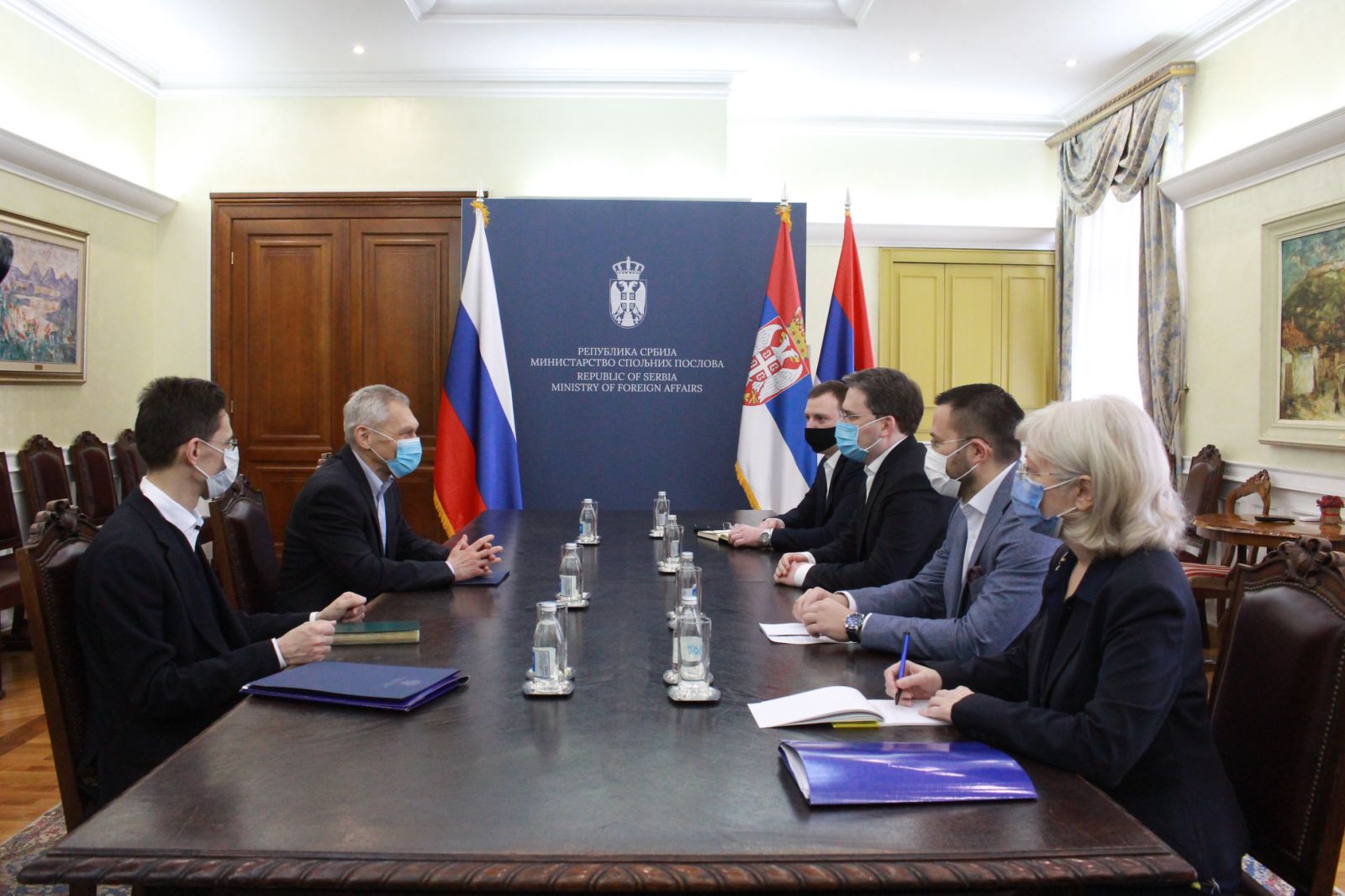
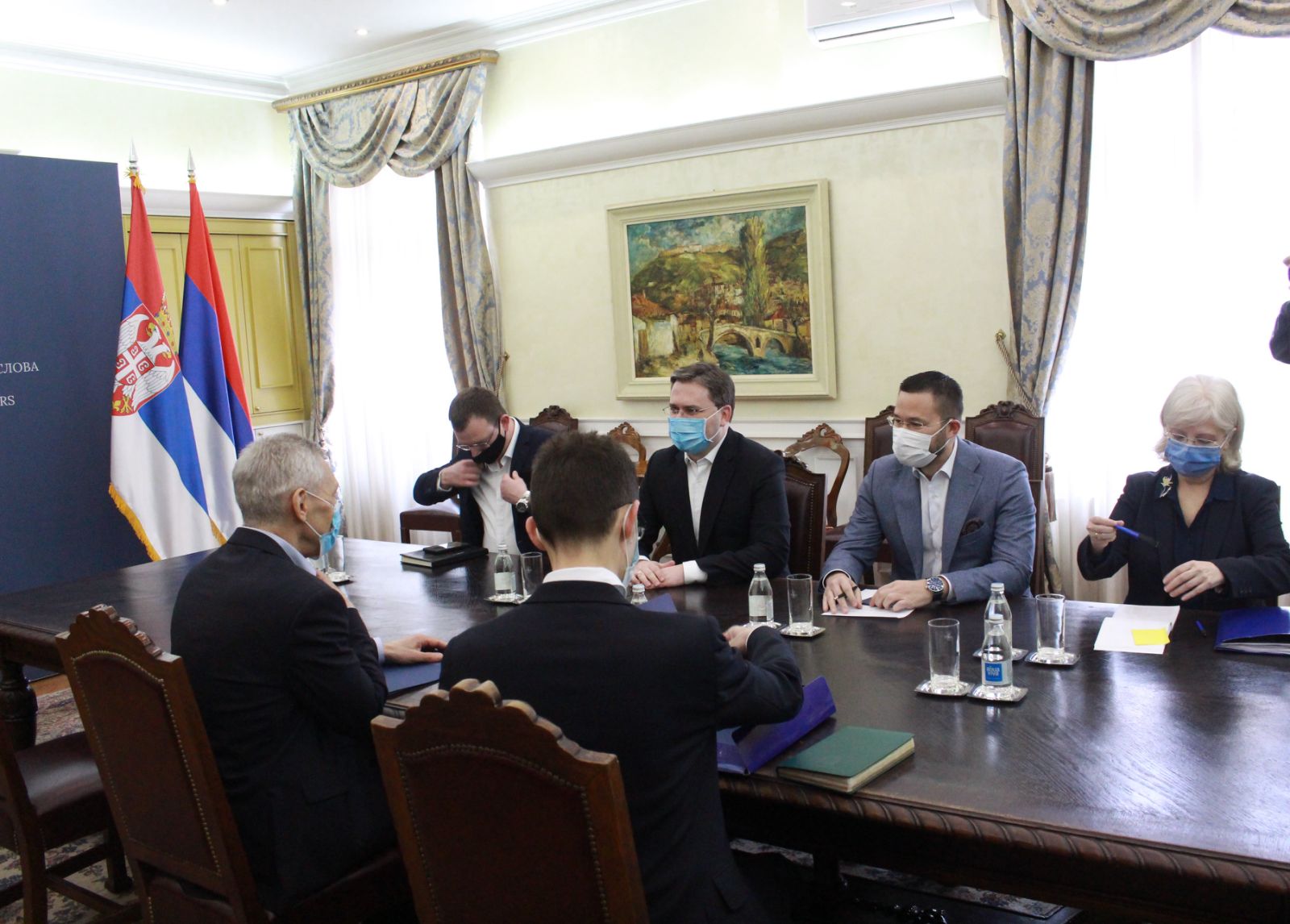 |
|
|
| Selakovic: Fight against all forms of crime is a priority of the Serbian Government |
|
Minister of Foreign Affairs of Serbia Nikola Selakovic said today that the fight against all forms of crime was a top priority of the Serbian Government and an integral part of the EU accession process.
"It is also our moral duty, in order to leave a better world for the generations to come", Selakovic said participating via video-link at the 14th UN Congress on Crime Prevention and Criminal Justice, held in Kyoto.
Minister Selakovic emphasized that Serbia, in its Second Serious and Organized Crime Threat Assessment from 2019, identified as its goal to eliminate cybercrime, human trafficking, terrorism and irregular migration.
The Serbian Foreign Minister pointed out that our country had established in a timely manner a normative and institutional framework that regulates prevention of abuse in this area, as well as that the Office of the Special Prosecutor for Cybercrime, a special court department and a special police unit were established.
The Minister underlined that, in the field of the fight against corruption, Serbia was guided by the postulates set out in the UN Convention against Transnational Organized Crime and the UN Convention against Corruption.
Selakovic pointed out the efforts made by the Anti-Corruption Agency, as an independent state body, to protect the public interest, build individual and institutional integrity, strengthen transparency and accountability of the public administration.
"We strongly condemn all forms of terrorism, including extremism and radicalism, and call for them to be fully eradicated, while implementing the relevant UN resolutions and conventions and the UN Global Counter-Terrorism Strategy", the Head of Serbian diplomacy underscored.
In order to combat these complex phenomena efficiently and successfully, Selakovic said, it was of vital importance to build capacities of our societies and states, while exchanging experiences at the regional and global levels.
Minister Selakovic thanked Japanese Ambassador Hikihara for the skill he showed in conducting the talks on harmonizing and adopting the Kyoto Declaration, which, as he stressed, was an important indicator of the commitment to creating and maintaining the institutional framework for crime prevention as one of the main preconditions for promoting sustainable development goals.
"Back in 1970 when Japan hosted this event for the first time, we demonstrated strong political will to draw attention to the problem. Today, it is incumbent upon us to reaffirm this willingness and resolve and translate it into concrete steps", the Serbian Foreign Minister said.
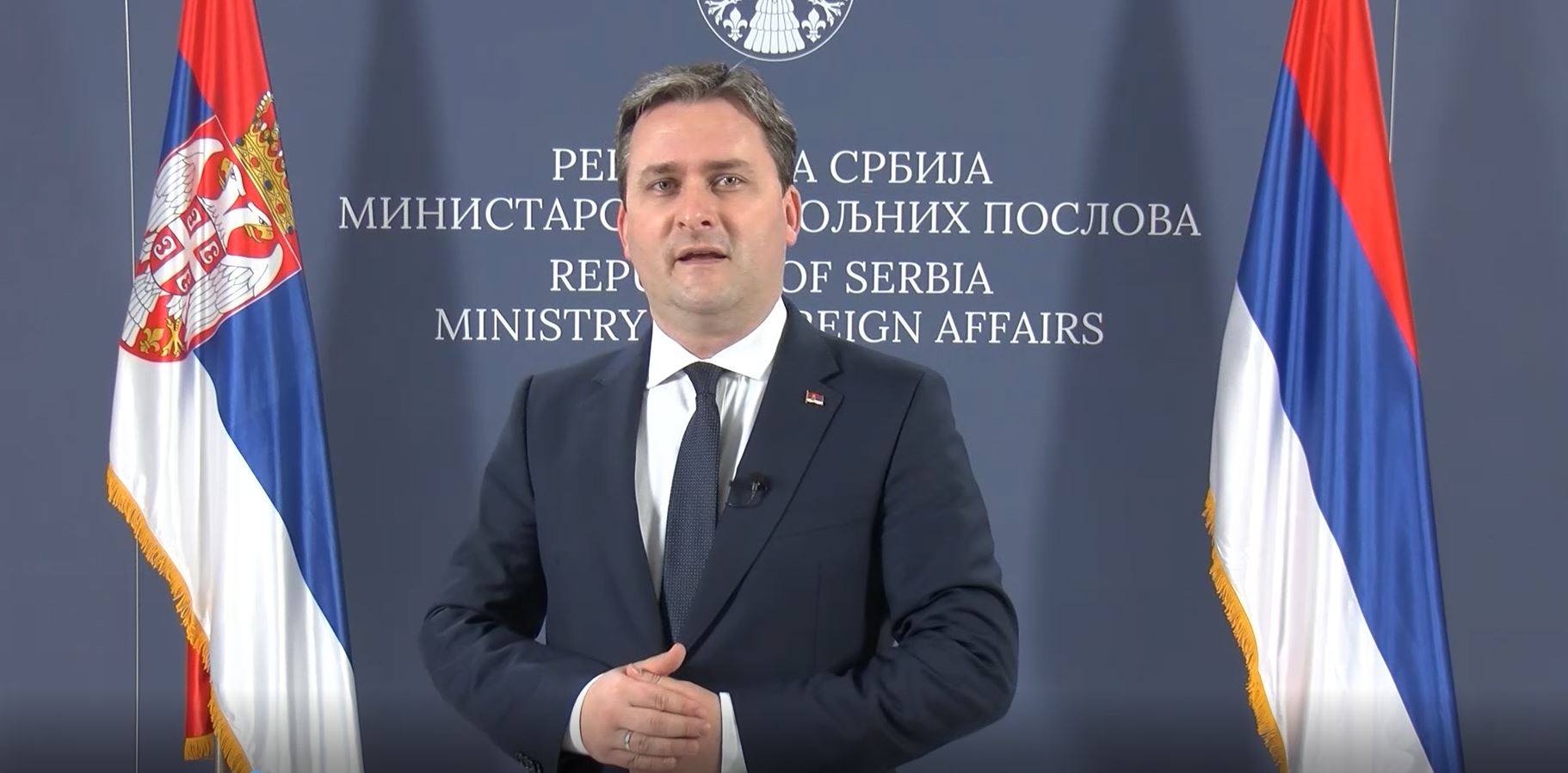
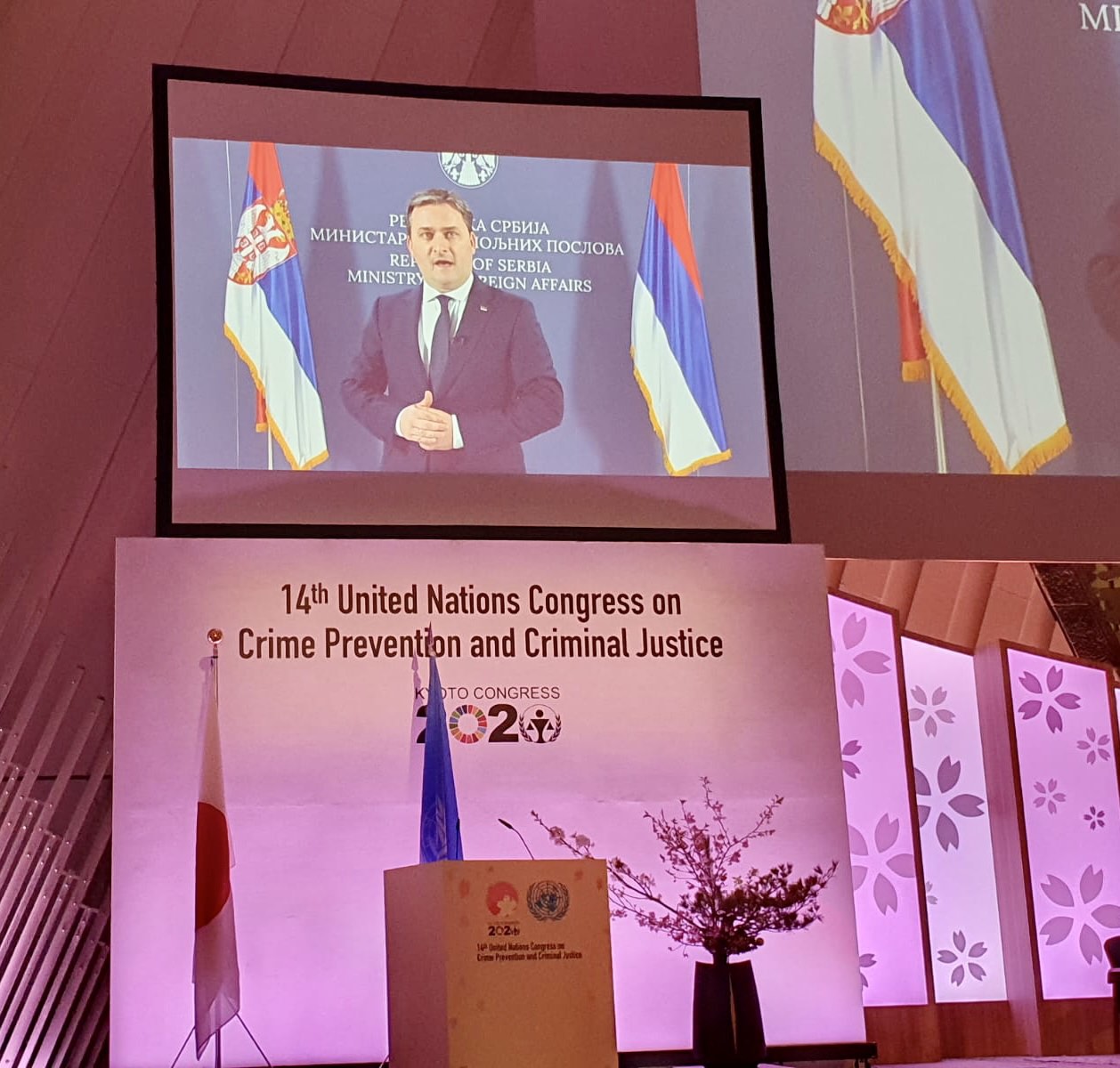 |
|
|
| New contingent of Russian vaccines arrives in Serbia |
|
President of the Republic of Serbia Aleksandar Vučić welcomed tonight the Air Serbia plane carrying Sputnik V vaccines to Serbia and said that with 100,000 doses that arrived at Belgrade Airport tonight, Serbia provided slightly over 2,620,000 vaccines that are sufficient for the vaccination of 1.4 million citizens.
Addressing the media, President Vučić explained that this contingent consists of 100,000 second-element doses of the Russian vaccine, adding that the first and second doses differ in components.
"Our Russian friends complied with everything we agreed on and we are infinitely grateful", said President Vučić, emphasising his particular gratitude to the President of the Russian Federation, Vladimir Putin.
"We are aware of how many problems Russia has faced regarding the pandemic, but they have had sufficient understanding for Serbia and they found a way to help. This is the result of our talks, but also of his will and desire to help the Serbian people," said President Vučić, adding that in the coming period an essentially important work lies ahead of us, and that is - the production of Sputnik V vaccines in Belgrade.
"It would solve the problems in the long run, because the coronavirus will not go away and disappear; we will just have to get vaccinated regularly and procurement is not a problem for us. It is a big and difficult task and I am infinitely grateful to our Russian friends and President Putin for giving us a chance to enter the production process, which, I believe, will enable the transfer of technology and knowledge", stressed President Vučić and added that the capacities of Torlak would be up to 20 million doses and that all quantities exceeding five or six million doses would be distributed to everyone in the region.
"We have provided vaccination and revaccination for 1.4 million people. That is more than 20 per cent of the population and over 25-26 per cent of adults. I am proud of Serbia, its citizens, our work. We managed to provide this thanks to our friends and our independent policy", President Vučić pointed out.
The Ambassador of the Russian Federation to Serbia, Alexander Botsan-Kharchenko, thanked President Vučić for the highly evaluated cooperation between the two countries.
"Today's event shows that our cooperation in combating the pandemic and the consequences of the pandemic is proceeding according to the plan - fruitfully, constructively and following agreements at the highest level between Russian President Putin and Serbian President Aleksandar Vucic," said the Russian Ambassador, adding that the cooperation underlined that we are friends and that we have fraternal relations. He said that Russia would do everything possible, based on the agreements and contracts, so that soon - perhaps as early as June - Serbia gets the opportunity to pack and distribute vaccines, and by the end of the year, produce Sputnik V.
Belgrade, 28th February 2021
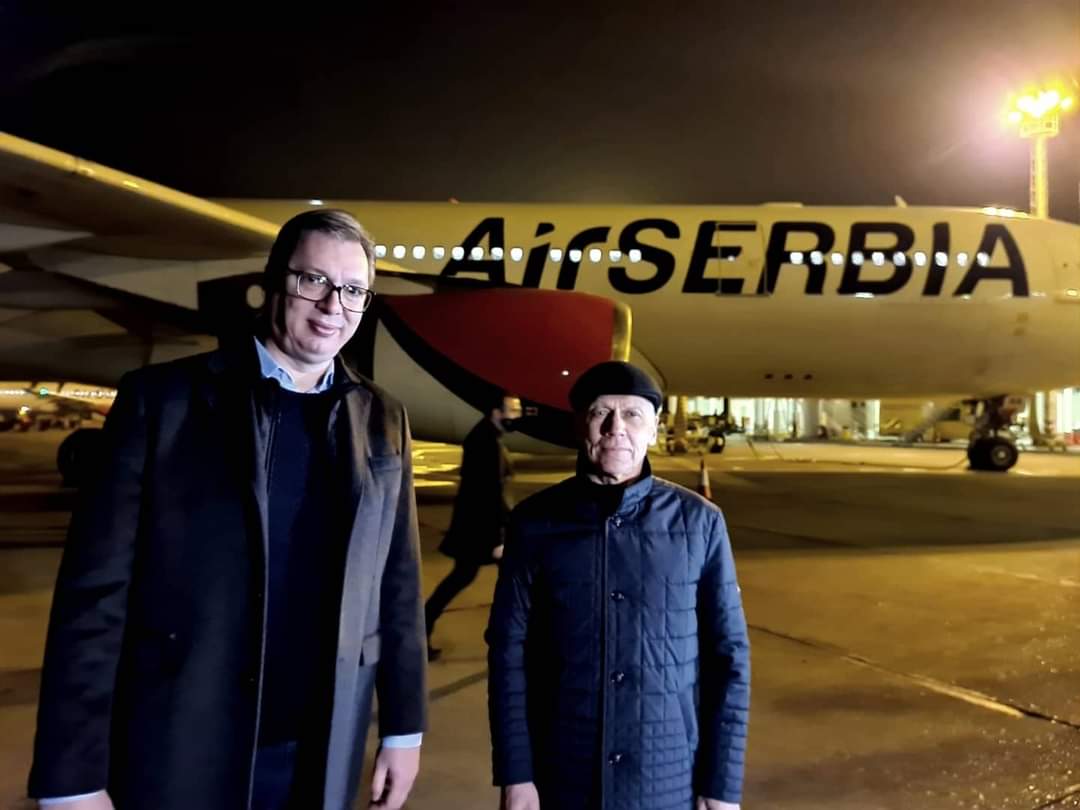
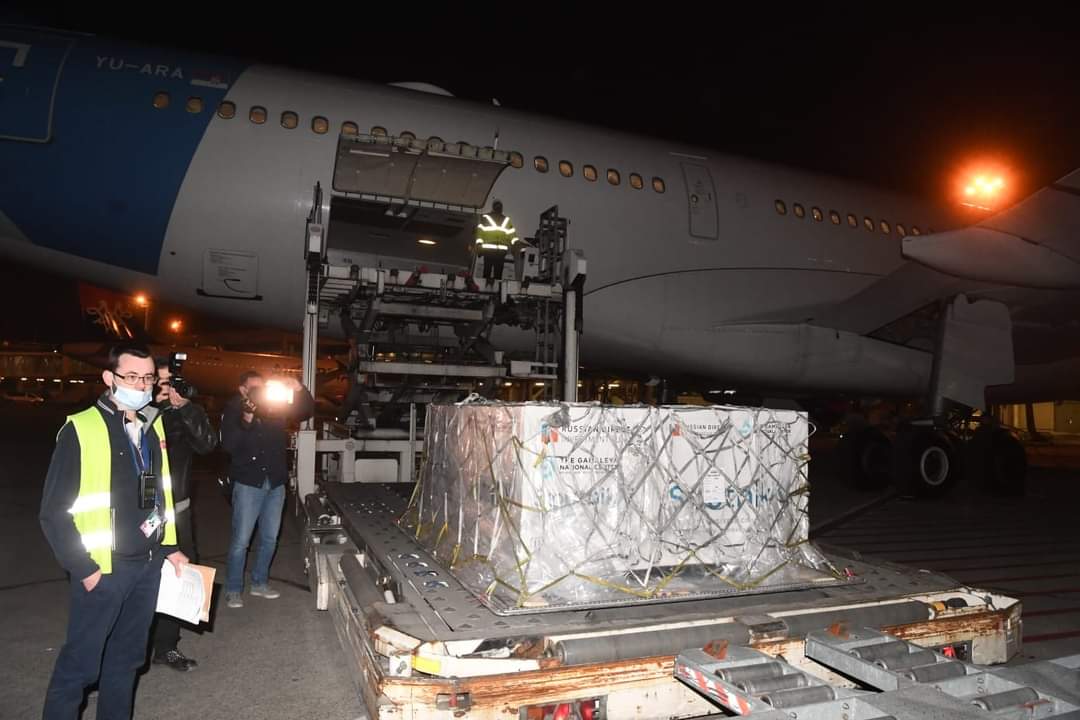 |
|
|
| Metropolitan Porfirije of Zagreb and Ljubljana elected as the new Patriarch of Serbia |
|
The Holy Assembly of Bishops of the Serbian Orthodox Church elected His Eminence Metropolitan Porfirije of Zagreb-Ljubljana, PhD, as the new Serbian Patriarch, in its convocation in Memorial Cathedral of Saint Sava in Belgrade on 18 February 2021.
Immediately after the election a thanksgiving service was officiated and Many Years was chanted to the Archbishop of Pec, Metropolitan of Belgrade-Karlovci and Serbian Patriarch Porfirije. Bells at Saint Sava Cathedral in the Vracar district of Belgrade rang a few minutes before 4:00 pm indicating that the 46th Patriarch of Serbia was elected.
Newly-elected Archbishop of Pec, Metropolitan of Belgrade-Karlovci and Serbian Patriarch Porfirije (Peric) was born on 22 July 1961 in Becej, to father Radivoje and Mother Radojka. He was baptized as Prvoslav. He finished primary school in Curug, and the “Jovan Jovanovic Zmaj” Grammar School in Novi Sad. He was ordained a monk according to the rite of small schime by his spiritual father, then hieromonk Dr. Irinej (Bulovic), at Decani Monastery on Sunday of St. Thomas in 1985.
He graduated from the Faculty of Orthodox Theology in Belgrade in 1986, when the then Bishop of Raska-Prizren Diocese, future Serbian Patriarch Pavle of blessed memory, ordained him a hierodeacon at the monastery of Holy Trinity in Musutiste.
He attended postgraduate studies in Athens from 1986 until 1990. That year, upon the blessing of Bishop Dr. Irinej of Backa, he joined the monastery of Holy Archangels in Kovilj, where he was ordained as hieromonk and became its abbot.
Many young monks and novices came to the monastery following him. These were the years when the Kovilj Monastery became a spiritual center for many young people: intellectuals, artists, popular actors and rock musicians, especially from Novi Sad and Belgrade. Since then abbot Porfirije has particularly dealt with drug-addicted patients. In 2005, he formed for this purpose a therapeutic community called “The Land of the Living”, which is recognized as the most successful drug-addiction therapy project and, under the leadership of Bishop Porfirije, it has more than a hundred residents in camps throughout Serbia today.
During the ordinary meeting of the Holy Assembly of Bishops of the Serbian Orthodox Church in Belgrade on 14 May 1999 he was elected as Bishop of Jegar, Vicar of the Diocese of Backa.
He defended his PhD thesis Possibility of knowability of God in St. Paul’s understanding according to the interpretation of Saint John Chrysostom at the Faculty of Theology of the University of Athens in 2004.
He became a lecturer at the Faculty of Orthodox Theology - Department of Pastoral Psychology - succeeding famous psychiatrist, academician Dr. Vladeta Jerotic. His lectures have been attended not only by students of the Faculty of Orthodox Theology, but other Belgrade faculties as well.
Together with a group of experts: psychologists, doctors, criminologists, sociologists, Bishop Porfirije founded a civic association that deals with the resocialization of victims of destructive religious sects and cults.
Bishop Porfirije has not been just president of the Steering Board for a decade, but a real spiritus movens of the Humanitarian Fund “Privrednik”, which has provided scholarships for a great number of gifted, but poor pupils and students, regardless of their nationality or religious affiliation.
In 2005, the National Assembly elected him as representative of all Churches and religious communities, to be a member of the Council of the Republic Broadcasting Agency, and in 2008 the RBA elected him its president. As President of the Council of the Republic Broadcasting Agency, Bishop Porfirije supported the long-term interests of society and citizens, unaffected by political influences.
Since then, church radio stations have been heard in the broadcasting spectrum of Serbia. He has made a key contribution to launching of a series of radio and television shows dealing with religious topics.
In 2010, The Holy Assembly of Bishops entrusted him to establish military chaplaincy in the Serbian Armed Forces. The fruits of his labour in that field include not only the suitable legal regulations, but also the selection of military chaplains, the organization and equipping of churches at barracks and performance of the first religious services.
His expert theological works Bishop Porfirije published in magazines both in Serbia and abroad. He participated in a large number of scientific conferences and symposia across the globe.
Bishop Porfirije, as one of the most prominent contemporary Serbian clergymen and intellectuals, has an extremely wide circle of friends, not only in the Homeland, and he fosters personal friendship and close cooperation with priests and representatives of other Churches and religious communities.
He speaks Greek, English, German and uses the Russian language, while his style of communication is always adapted to his interlocutors.
He was enthroned as the Metropolitan of Zagreb and Ljubljana on 13 July 2014 in the Cathedral Church of the Transfiguration of the Lord in Zagreb. The solemn Hierarchal Liturgy was served by Serbian Patriarch Irinej, accompanied by a large number of archbishops of the Serbian Church and other sister Churches, as well as priests and monks, and pious people.
Source: SPC/Serbian Orthodox Church
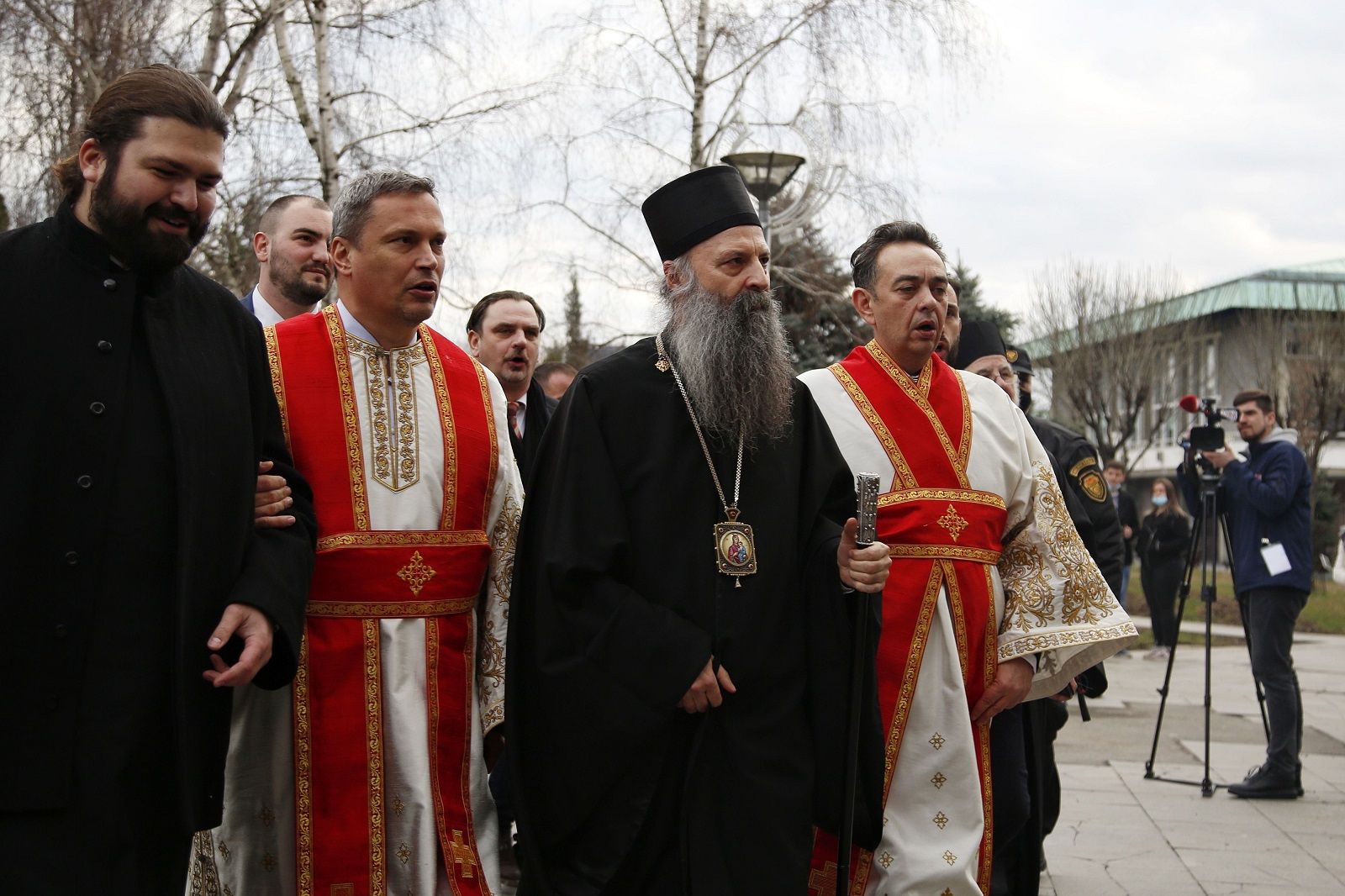 |
|
|
| Meeting with the Chairman of the State Duma Committee on International Affairs of the Russian Federation |
|
Chairman of the State Duma Committee on International Affairs of the Federal Assembly of the Russian Federation Leonid Slutskiy was on a one-day visit to Serbia, on which occasion he met with Serbian President Aleksandar Vucic and Speaker of the National Assembly Ivica Dacic.
In the conversation with Slutskiy, Vucic pointed out that every meeting with a Russian official was a demonstration of the high degree of mutual understanding and trust characterizing the relations between Serbia and Russia.
He reminded of his recent telephone conversation with President Putin and said that the friendly relations between Serbia and Russia were being proven in the face of various challenges, including now, during the Covid-19 pandemic, and reiterated his deep gratitude for the deliveries of the Sputnik V vaccine.
President Vucic expressed gratitude for Russia's strong and active support in defending the integrity and independence of Serbia and its state and national interests.
Chairman of the State Duma Committee on International Affairs Leonid Slutskiy said that Moscow was proud of the closest possible relations existing between our two countries, which was also demonstrated through frequent high-level contacts being maintained. He expressed satisfaction with the progress made in the area of economic cooperation between Serbia and Russia, emphasizing that he was pleased that joint infrastructure projects, such as the Stara Pazova-Novi Sad railway, as well as energy projects such as the gas pipeline from the Bulgarian to Hungarian borders, contributed to our country's economic prosperity.
Speaker of the National Assembly Ivica Dacic pointed out that the relations between the two states were close and friendly, and that they were further strengthened during the difficult times experienced across the globe amid the coronavirus pandemic. He thanked for the assistance that the Russian Federation provided to Serbia during the pandemic, emphasizing the personal contribution made by Leonid Slutskiy who, through the "Russian Peace Foundation" he is heading, sent a donation to Serbia in the form of medical and protective equipment at the very beginning of the epidemic.
Dacic took the opportunity to reiterate gratitude to the Russian Federation for the support it provided to the Republic of Serbia at the international level, and in particular with regard to the issue of Kosovo and Metohija.
Leonid Slutskiy underlined that Serbia can always count on the support of Russia.
Belgrade, 17 February 2021
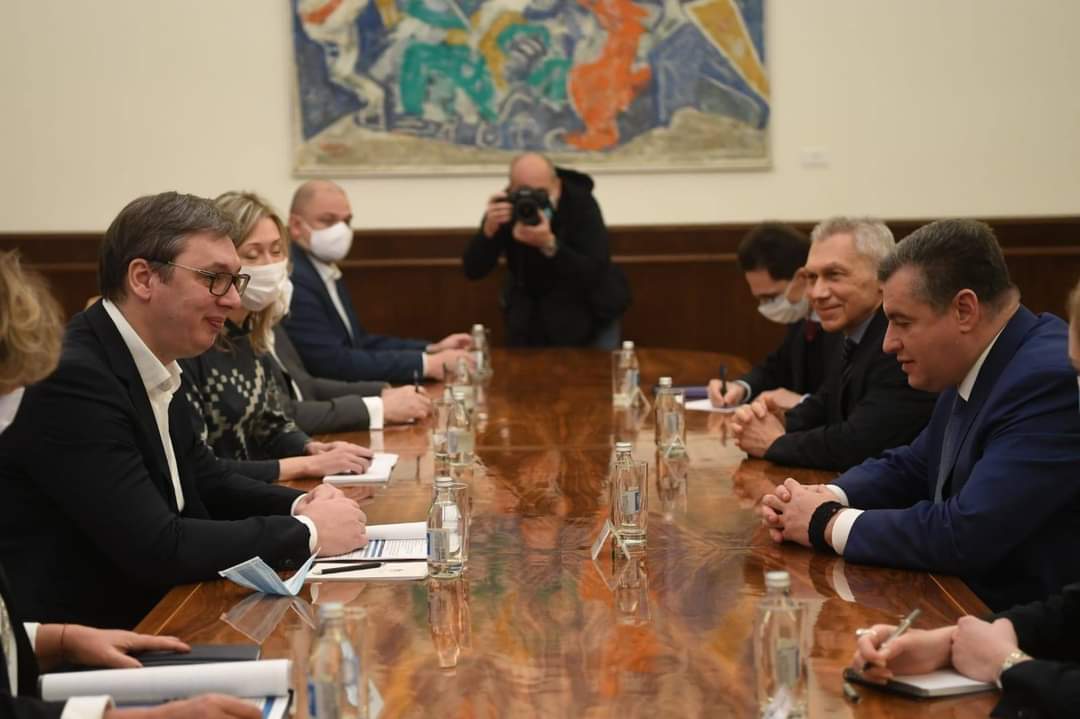 |
|
|
| Cooperation with science, technology park Skolkovo in digitalisation of Serbian health system |
|
Prime Minister Ana Brnabic talked today with the delegation of the Science and Technology Park Skolokovo from Moscow, led by the President of the Skolkovo Foundation Arkady Dvorkovich, about further forms of cooperation, one of which is digitalisation of Serbian health system.
After the meeting with this delegation in the Science and Technology Park Belgrade, Brnabic stated that this delegation accepted to be involved in the further development of the start-up strategy on the ecosystem.
The Serbian government has set up a working group to develop the strategy, which is made up of experts. We are now including Skolkovo, she pointed out, assessing that it is a pillar of Serbia's development.
According to her, our cooperation with Skolkovo began in 2015, when Aleksandar Vucic visited that science and technology park as Prime Minister, and in January 2019, during the visit of President of the Russian Federation Vladimir Putin to Serbia, a cooperation agreement was signed.
The Prime Minister reminded that she visited Skolkovo a year ago and that since then our start-up companies have become part of their educational programme in order to have a chance on the Russian market.
Brnabic emphasised that it is a great honour for her to have the opportunity to host a delegation from one of the best research centres in the world.
President of the Skolkovo Foundation Arkady Dvorkovich said that there is great potential for cooperation with Russia in Serbia.
We hope that we will set up the same system in Serbia as in Russia, and maybe even better. Some markets are not very open for Russia, and that is why I am very optimistic about our future cooperation, he said.
Belgrade, 17 February 2021
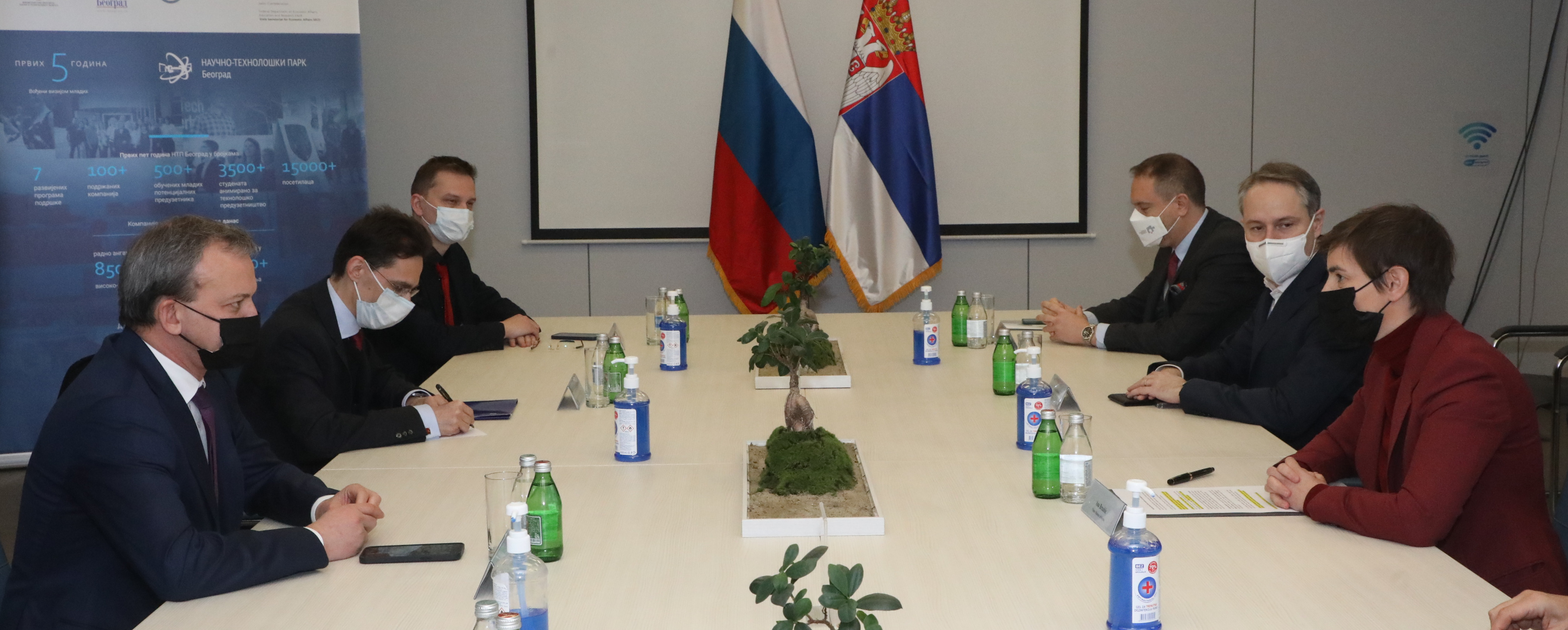
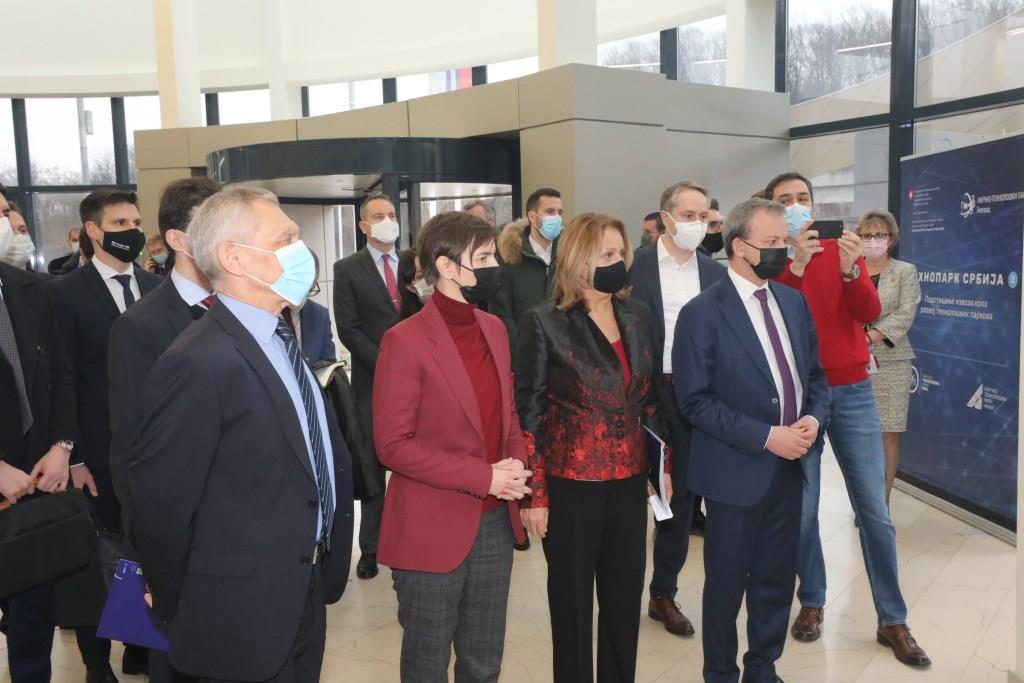 |
|
|
| Congratulations of the President of the Russian Federation on the Statehood Day of the Republic of Serbia |
|
President of the Russian Federation Vladimir Vladimirovich Putin sent a congratulatory message to the President of the Republic of Serbia Aleksandar Vučić on the Statehood Day of Serbia, which reads as follows:
"Please accept my cordial congratulations on your country's national holiday - Statehood Day.
Russia highly values relations with Serbia, based on ancient traditions of brotherly friendship, cultural and spiritual closeness.
I am convinced that the further development of the bilateral strategic partnership, constructive cooperation in various areas corresponds to our nations' fundamental interests, and is developing to ensure security and stability on the European continent.
I sincerely wish you, Mr President, good health and success, and well-being and prosperity to all your fellow citizens," reads the congratulatory message from President Putin.
Belgrade, 12th February 2021
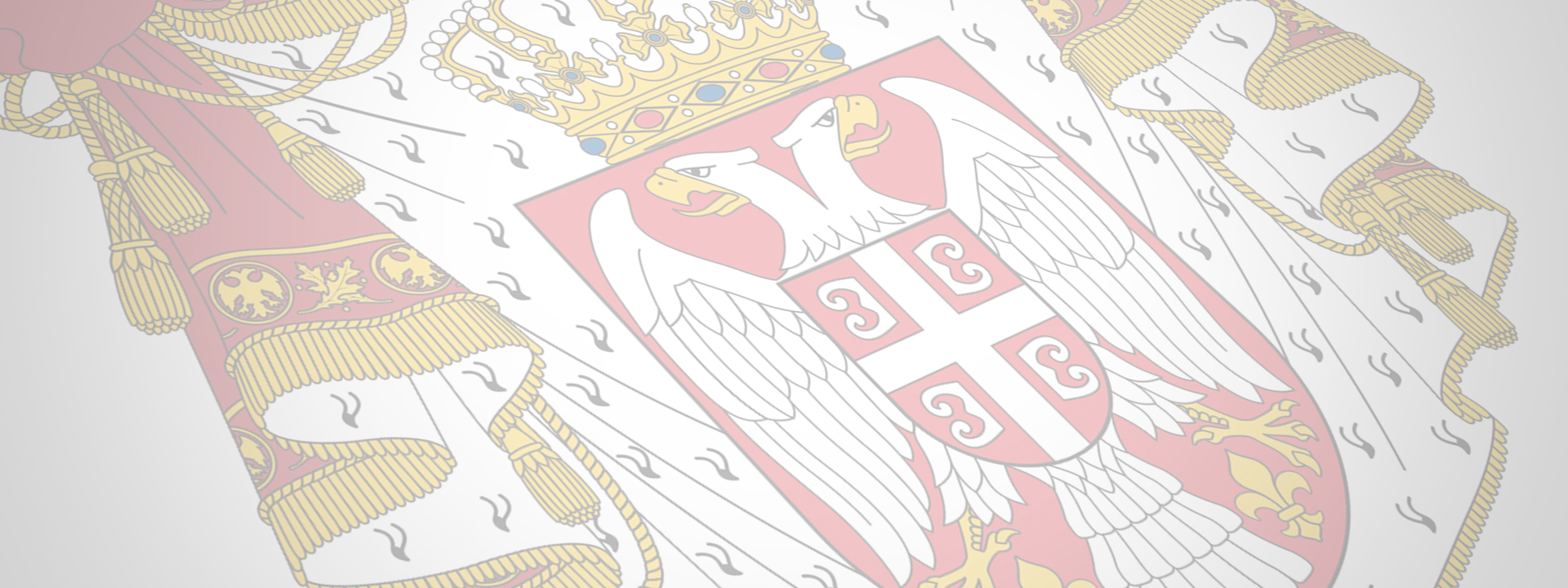 |
|
|
| Meeting with the Ambassador of the Russian Federation |
|
President of the Republic of Serbia Aleksandar Vučić met earlier today with the Ambassador of the Russian Federation Alexander Botsan-Kharchenko and asked him to convey his gratitude to President Vladimir Putin for the congratulations he sent him on the Statehood Day.
President Vučić said Serbia and Russia have strong, friendly relations proven in various challenges, even now, during the COVID-19 pandemic. That is why he asked Ambassador Botsan-Kharchenko to convey his gratitude to President Putin for the shipments of the 'Sputnik V' vaccine. They contributed to our country leading the way in vaccination and providing the population with a reliable defence against the coronavirus. In this regard, President Vučić and Ambassador Botsan-Kharchenko discussed Serbia's possibility to independently produce vaccines with the help of experts from Russia and based on Russian technology.
President Vučić and Ambassador Botsan-Kharchenko, on the eve of the visit of the Deputy Prime Minister of the Russian Federation and Co-Chair of the Intergovernmental Committee for Trade, Economic and Scientific-Technical Cooperation Yuri Borisov, stated that the realisation of joint infrastructure and energy projects is well implemented. The construction of the railway section from Stara Pazova to Novi Sad, which we build with the Russian RZD, is running according to the planned dynamics, and the completion of works is expected at the end of this year as President Vučić promised. At the same time, they discussed specific proposals for future cooperation.
President Vučić and Ambassador Botsan-Kharchenko also discussed the regional situation.
Belgrade, 12th February 2021
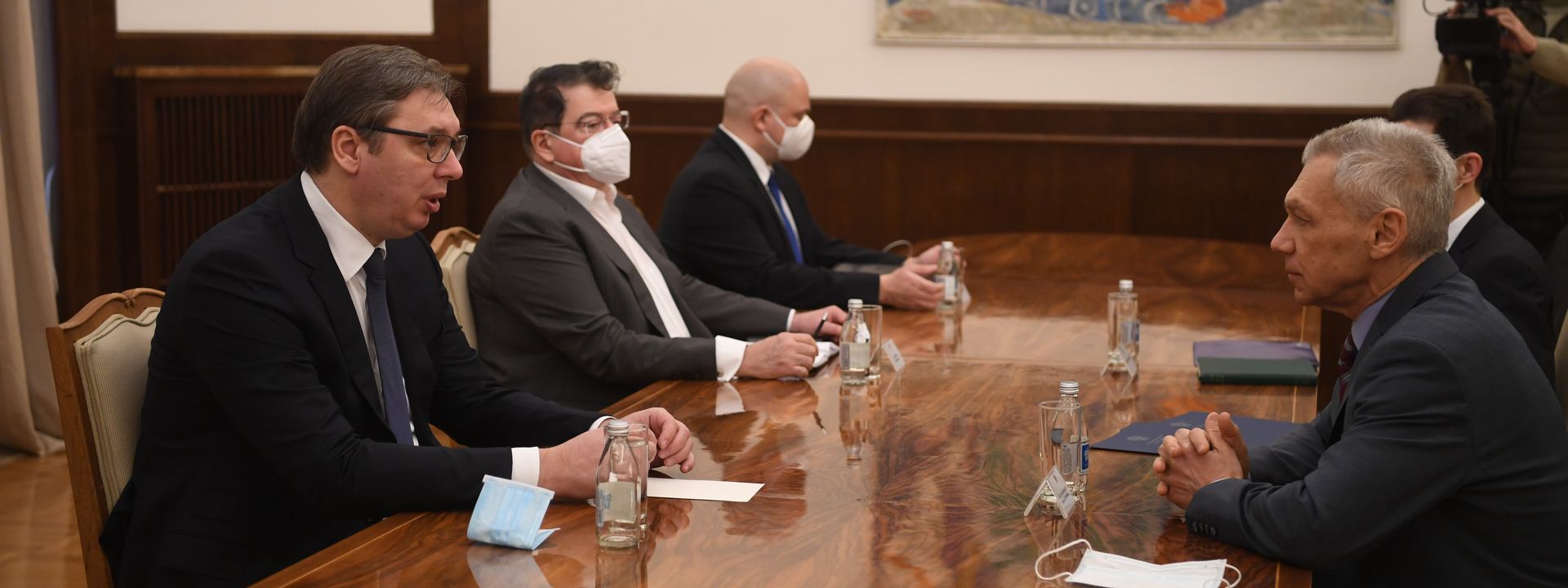
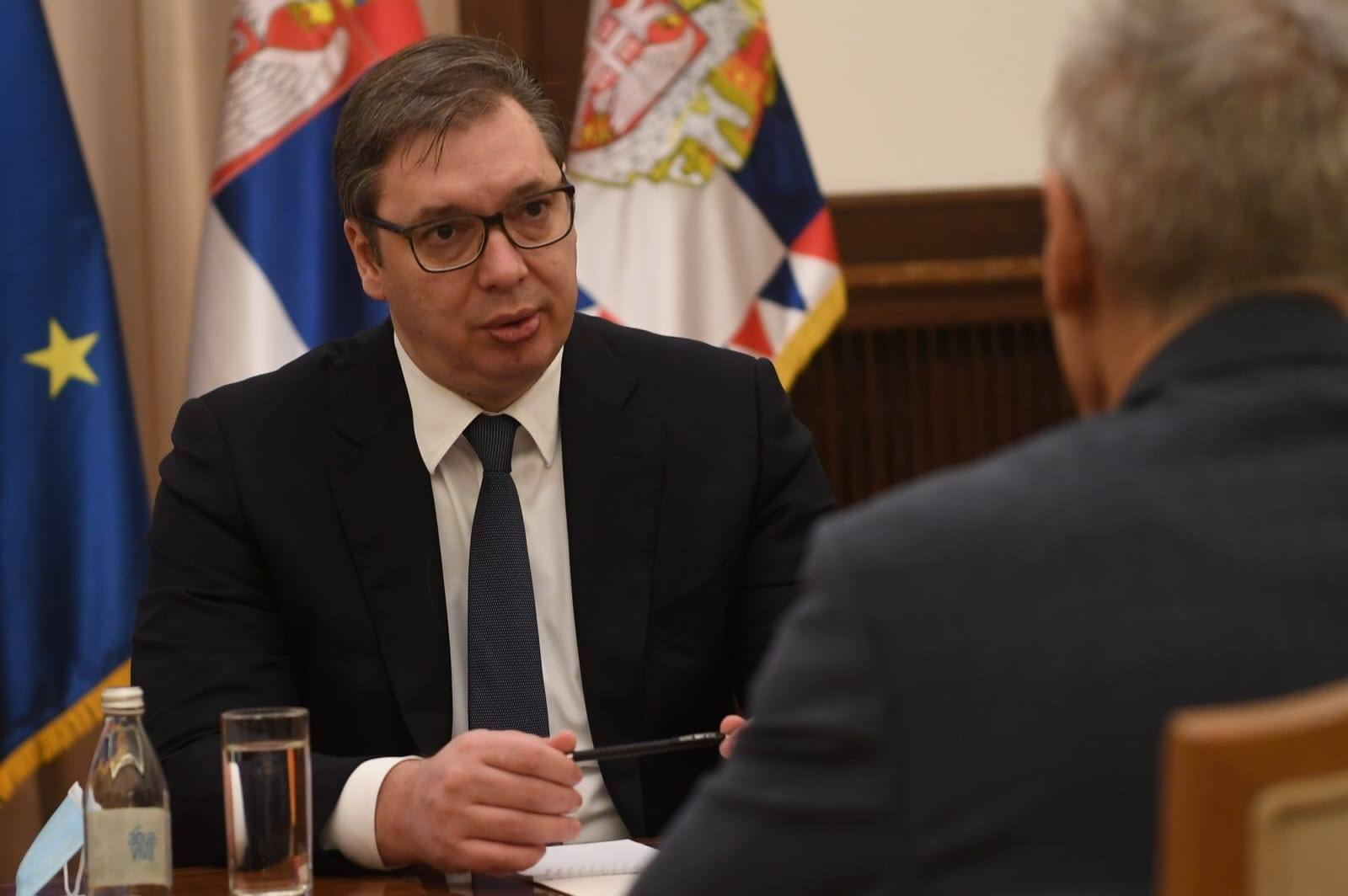 |
|
|
| President Vucic: Serbia is ready for dialogue on Kosovo and Metohija, but will refuse being humiliated |
|
President of the Republic and Supreme Commander of the Serbian Army Aleksandar Vucic attended a demonstration of capabilities of one part of Serbian Army units in the "Rastko Nemanjić" barracks in Pancevo. On this occasion, President Vucic stated that Serbia was ready to continue the EU-facilitated dialogue with Pristina at any point, while respecting also the position of the United States as well as the positions of Russia and China.
The President said that he would rather put his "head on the chopping block" than sign any document with a recognition and reminded that he had already once refused to do so in Washington, where there were two versions of the agreement.
He stated that he immediately had his delegation leave the meeting, that he told the U.S. delegation that Serbia would not sign such an agreement, while conveying that Serbia would always endeavour to hold peaceful talks in order to preserve peace, but that it would not take any humiliation.
The Serbian President thanked the U.S. President Joe Biden for the letter of congratulations on the occasion of the upcoming Statehood Day, in which, in addition to the usual emphasis on commitment to promoting economic cooperation, regional stability and democratic values, he unequivocally called for mutual recognition of Serbia and "Kosovo" as a result.
Mutual recognition between Serbia and "Kosovo" is not part of any act of any world organization, the President pointed out and reiterated that Serbia was ready to continue the EU-facilitated dialogue with Pristina at any point, while respecting also the position of the United States as well as the positions of Russia and China.
According to the president, the situation is difficult and will only be increasingly difficult.
"As I told you three days ago, I can see it and I expect it, I can see the situation slowly tightening, because the conflicts between them at the global level have been increasing and intensifying, and then we have to pay the price", the President said.
President Vucic said that said that it was up to our state to continue strengthening the country in the economic sense.
The President added that the role of the army was very important in the highly complex security and political conditions of the modern world, and that was why Serbia needed to do everything it could to deter any potential aggressor and attacks on citizens and the country.
"The policy of strengthening the armed forces will continue at a faster pace", the President emphasized, adding that the goal was for the Serbian Army to play a stabilizing role with regard to the political developments in the region.
According to him, it should be clear to everyone that Serbia was not a punching bag and that not everyone could attack and threaten it like it was the case in the past.
Vucic said that he was pleased with what he saw and that a lot had been done in the previous period, pointing out that the salaries of military personnel would be significantly increased as of April.
President Vucic also stated that investments in the Serbian Army would continue, whom he told that he expected the Army to continue to be the guardian of our country, its integrity and freedom.
"We expect you to be the guardians of our country, its integrity and freedom, the defenders of our people, the guardians of the homeland, the protectors of the interests of the state of Serbia and to be a deterrent factor for every aggressor and anyone who might consider attacking Serbia", Vucic said.
The military exercise called "Spearhead" demostrated the capabilities of the 72nd Special Operations Brigade, and the event, which the President of Serbia and the Supreme Commander of the Serbian Army assessed as very good, was also attended by Deputy Prime Minister and Minister of Defence Nebojsa Stefanovic and Chief of General Staff of the Serbian Armed Forces, General Milan Mojsilovic.
Photo: Presidency of Serbia / Dimitrije Goll
Belgrade, 7 February 2021
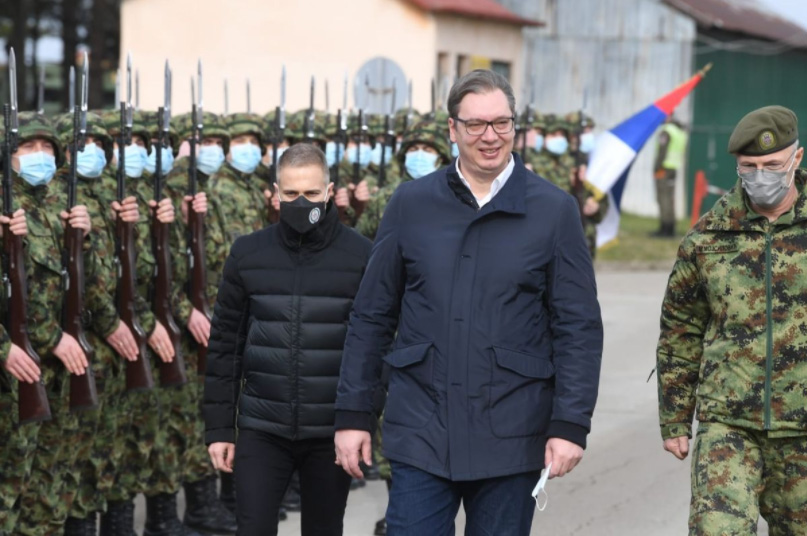 |
|
|
| Vucic: Cordial conversation with Putin |
|
Serbian President Aleksandar Vucic shared on Instagram today that he was very pleased with the results of today's, as he stated, cordial, sincere and friendly conversation he had with Russian President Vladimir Putin.
"The cooperation between Serbia and Russia has been developing in all areas, and I specifically asked President Putin to enable Serbia easier access to Sputnik V vaccines. Years of excellent relations between Serbia and Russia are ahead of us", President Vucic stated in a post at the buducnostsrbijeav Instagram account which also included an image of the Serbian
President with President Putin. President Vucic talked on the phone with President Putin earlier today, whom he asked to help Serbia get additional quantities of the Russian vaccine as soon as possible so that as many Serbian citizens as possible would receive reliable protection against the coronavirus in the nearest future.
Source: Tanjug
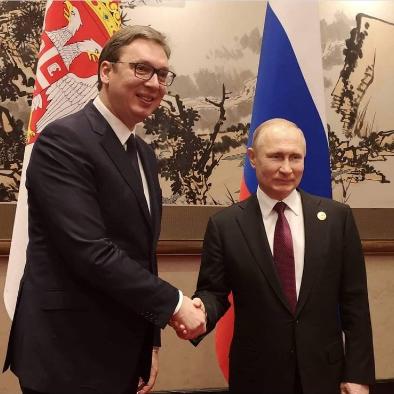 |
|
|
| Telephone conversation with the President of the Russian Federation |
|
President of the Republic of Serbia Aleksandar Vučić talked on the telephone today with the President of the Russian Federation Vladimir Putin. The two statesmen asserted that no one can break the friendship between Serbia and Russia and that relations between the two countries are stable and on the rise.
President Vučić thanked President Putin for his support in the fight against the coronavirus, especially for the Sputnik V vaccine's delivery because it contributed to our country leading the way in vaccinating the population. President Vučić asked President Putin to help us get additional quantities of the Russian vaccine as soon as possible so that as many Serbian citizens as possible would receive reliable protection against the coronavirus in the nearest future. He also stressed that Serbia, with the help of experts from Russia, will build the facilities and produce vaccines independently.
In a long friendly conversation, the two statesmen discussed the whole range of topics covering the areas of bilateral cooperation, as well as regional and international situations.
President Vučić and President Putin stated that Serbia and Russia had confirmed a high degree of mutual understanding and friendship in the past period, marked by difficulties brought about by the coronavirus. President Vučić expressed his gratitude to President Putin for Minister Lavrov's message in the Saint Sava temple.
President Vučić confirmed that Serbia intends to further develop strategic relations with Russia and stated that economic cooperation opportunities are much greater than those employed. Therefore, he said that special attention should be paid to increasing trade, completing current and launching new joint energy and infrastructure projects, further strengthening cooperation in technological development and innovation, and military-technical cooperation. In that regard, President Putin highlighted the importance of the Intergovernmental Joint Commission for Cooperation.
President Vučić underlined the importance of the Balkan Stream gas pipeline, which contributes to Serbia's energy stability.
Discussing the regional situation with President Putin, President Vučić thanked him for his unwavering personal support for Serbia's territorial integrity and sovereignty, as well as for the active support of the Russian state on the issue of Kosovo and Metohija.
"Russia understands our efforts to ensure peace and stability in the region and Serbia's readiness for dialogue and compromise as the only way to resolve open issues", said President Vučić.
Belgrade, 3rd February 2021
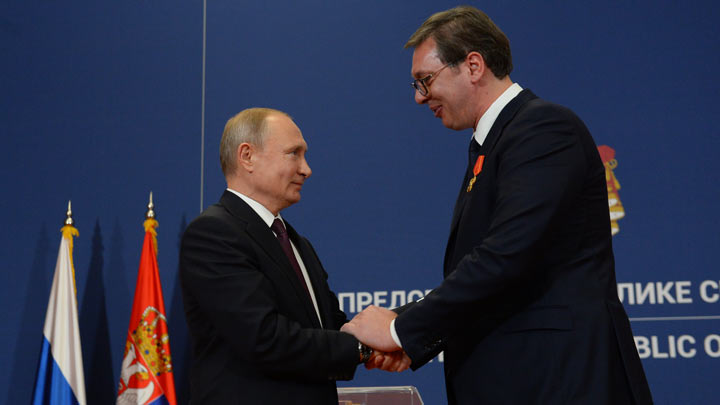
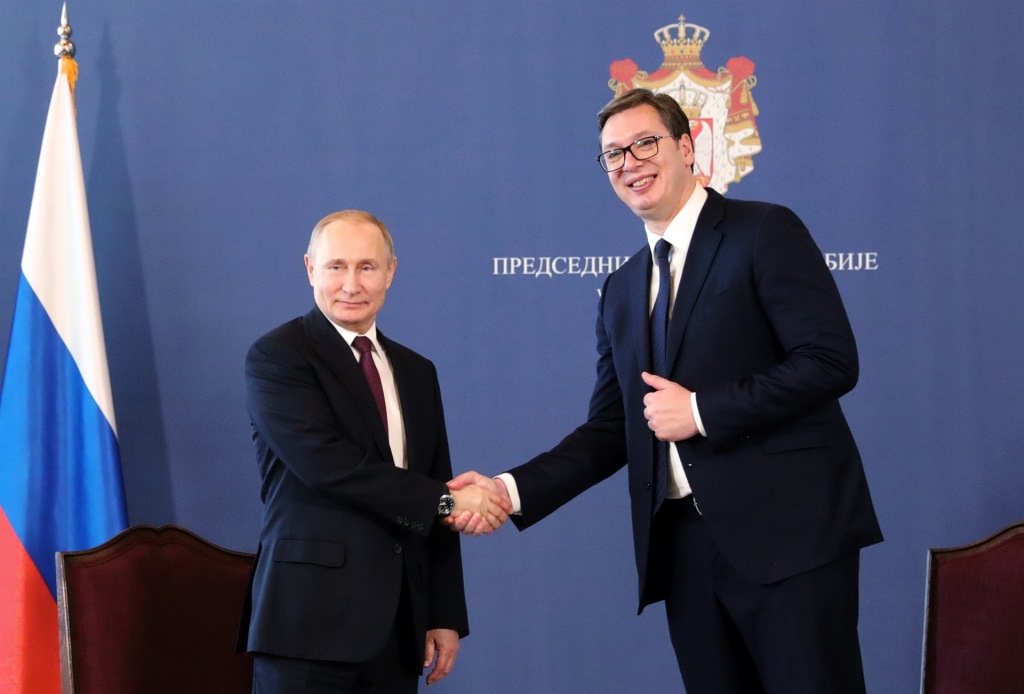 |
|
|
| Minister Selakovic speaks for Politika: The year of rejuvenation of Serbian diplomacy |
|
Serbia's foreign policy positions are naturally being adjusted to the new developments at the international level, but our foreign policy priorities have not changed in a long time. Our top and most important interest is to preserve good-neighbourly relations and stability and peace in the region and, in the same context, to find a peaceful and just solution to the problems in Kosovo and Metohija, Serbian Foreign Minister Nikola Selakovic said in an interview with Politika daily.
Another lasting interest of ours is full membership of the European Union, because this is the type of society we strive for. At the bilateral level, our goal is to strengthen ties with traditional friends, the Russian Federation and the People's Republic of China, but also to build new partner relations with the United States. One of the most important tasks of our foreign policy is to improve the position and protect the rights and identity of our people in the region, as well as to provide various types of support to Serbs in the diaspora. All these are very important and more often than not complementary goals, Nikola Selakovic pointed out.
What kind of relations do you expect Serbia to have with the new U.S. administration?
It is too early to speculate about this in public. The new presidential administration in Washington is currently preoccupied with internal issues and this will be the case for some time. There are people in the team of President Joseph Biden who have dealt with our region, and it is likely that the Balkans and Serbia will be the focus of the U.S. foreign policy at some point. I will remind you that President Vucic and President Biden not so long ago had very substantive talks in Belgrade, after which our President stated that he had the opportunity to talk to someone extremely well acquainted with the situation in this part of the world and an extraordinarily prepared interlocutor. Taking their personal relationship into account, but also the importance of enhancing the ties between Serbia and the United States, we have reason to expect that a meeting between the two presidents will be organized in the foreseeable future. I am sure that the nature and dynamics of the relations between Serbia and the United States will be influenced by the fact that Ambassador Marko Djuric now represents us in Washington, whose presence at President Biden's inauguration ceremony is an important signal and, I believe, a harbinger of positive developments in bilateral relations between our two countries.
How would you describe our country's relations with Moscow, Brussels and Beijing?
Russia is our traditional friend and that friendship goes beyond merely political ties. These are deep spiritual, cultural and civilizational bonds, and it is only natural that we have a mutual interest in improving those ties, even though they are at a very high level. We have a relationship with the People's Republic of China which is, in addition to the sincere iron-clad friendship between our peoples and high political representatives, based on deep trust and mutual support. Full membership of the European Union is Serbia's strategic orientation that all our friends are aware of, but our country does not forget its friendships, but strengthens and promotes them instead, and approaches all with honesty and no ulterior motives. In this context, we do not seek any preferential treatment, but only the right to freely and independently make decisions about our future and relations with all who respect us.
Could Serbia pursue a different foreign policy than the one it is pursuing at the moment?
It is always possible to have a different policy, just look at the foreign policy of Serbia ten, twenty or thirty years ago, examine the results at that time and you will realize how irretrievably expensive that policy turned out to be. Whether a policy is right, at either foreign or domestic level, is measured through its results and effect on the lives of citizens and the fate of the entire state. Our foreign policy priorities are not being defined on a whim, but are instead the result of a serious and deep examination of our complex position and strategic thinking about ways to improve it. Today, Serbia has a better international reputation and credibility than two decades ago, and the main reason for that is that our results have shown how serious and responsible we are as a country. That kind of credibility is not achieved by trickery, but only by hard and well-thought-out work on oneself. And I need to emphasize on this occasion as well that the main inspiration for such an attitude towards politics, the state and its future comes from none other than President Aleksandar Vucic. As Minister of Foreign Affairs, I have the opportunity on a daily basis to see the level of appreciation and respect President Vucic enjoys beyond the borders of our country.
When can we expect the vacant posts of Serbian ambassadors and consuls across the globe to be filled?
That is one of the main tasks for 2021. This will be a year of reinvigoration and I believe also rejuvenation of Serbian diplomacy. Our country, given its size, has a fairly extensive diplomatic network, which provides it with great opportunities for deepening political and economic relations with countries in all parts of the world. But we need more fresh and energetic staff, people who will be the most honourable representatives of a modern and dynamic Serbia. There are such people in Serbia, and we do need a serious rejuvenation, in order to avoid wide generation gaps in our personnel, and to lay the foundations of a modern career diplomacy.
How would you describe your relationship with Serbian President Aleksandar Vucic?
President Vucic and I are, in addition to having close and friendly relations, by virtue of the work we do and our constitutional competencies, the closest collaborators in the realization of Serbia's foreign policy goals. This allows me to talk to him often, and on many occasions learn a lot of new and important things. President Vucic is a man who inspires people around him with his strategic and visionary approach to politics, and I am proud to have had the opportunity to be part of his closest team of associates over the years, and to have had him as a kind of political mentor. In any case, his vision of Serbia as a modern, progressive and prosperous state, which independently and on its own will decides on its destiny, is my wish as well and key motivation for political engagement. For only such Serbia is a country that its own citizens, as well as Serbs beyond our borders, can confidently rely on, while also being an inspiration to the entire region.
Source: Politika
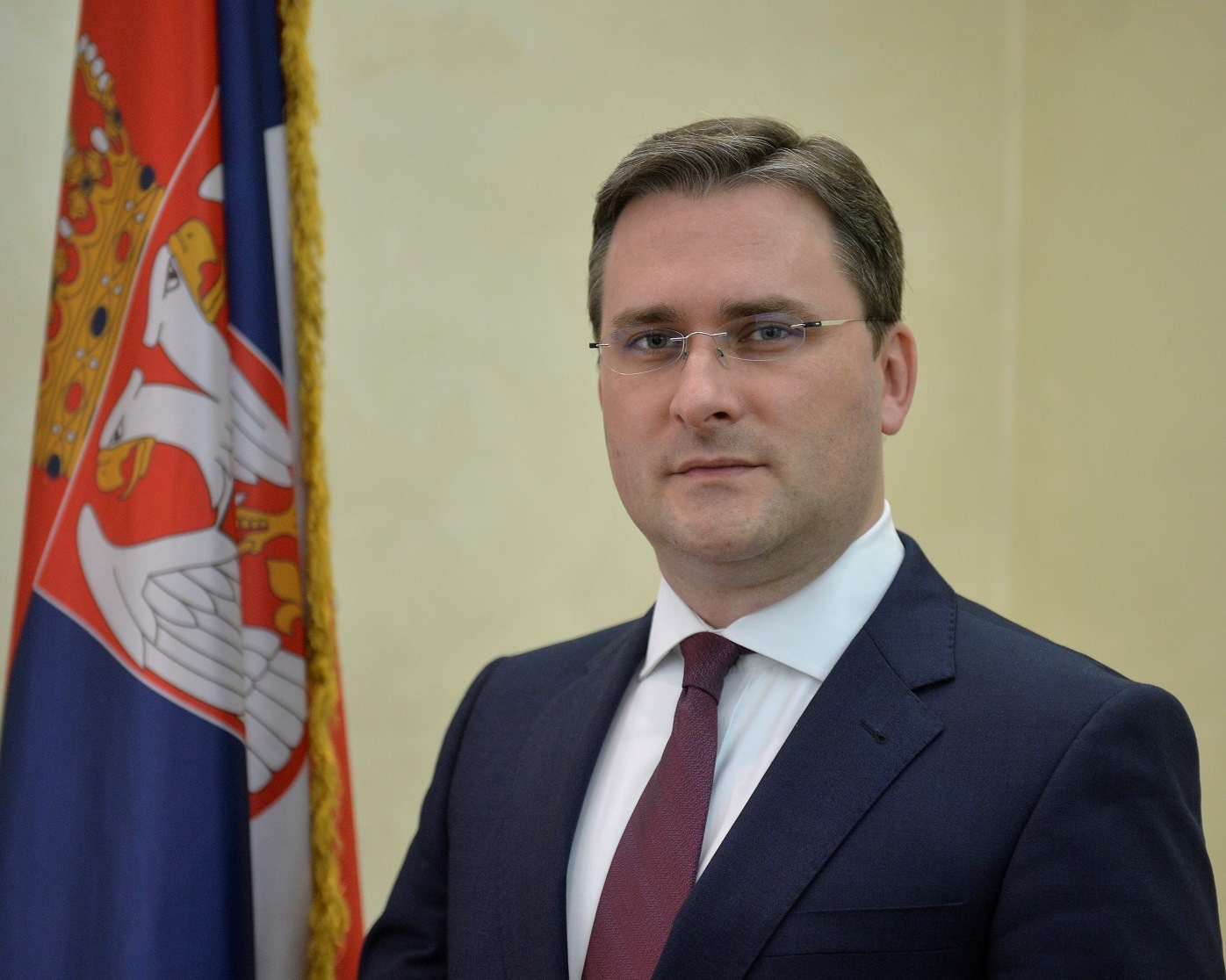
|
|
|
| President Vucic: Serbia is the first in Europe in terms of growth |
|
Serbian President Aleksandar Vucic pointed out that Serbia is the first in Europe in terms of economic growth, which will be officially confirmed at the end of March, and that this was possible owing to the reform measures taken since 2014 and the rapid opening of the country after the first wave of corona virus.
The President pointed out that Serbia had a growth of 5.2 percent in the first quarter, while the Eurozone was at minus 3.2 percent, in the second quarter Serbia had a growth of minus 6.3 percent, while the Eurozone was at minus 14.7 percent, and in the third quarter, when the Eurozone was at minus 4.3 percent, Serbia's figure was only minus 1.4 percent. Vucic stated that Montenegro, for example, recorded as much as 26 percent minus in the third quarter.
Furthermore, the President emphasized that hospitals were built and renovated in our country, and that two hospitals were built from the ground up in just four months.
He said that the state made significant efforts to procure respirators, masks, gloves, protective suits, medicines, everything that was needed, and pointed out that work was being done on 10 general hospitals throughout Serbia, adding that all these were major achievements that were only possible owing to the success of the 2014 reforms, the enactment of the Labor Law, which yielded excellent results, and also through fiscal consolidation measures.
"These are unprecedented results for Serbia. Was Serbia ever before the first in Europe in terms of growth rate? We will get the results on 31 March that will confirm that Serbia is number one in Europe. All that was possible thanks to people who believed in difficult changes", Vucic said.
According to the President, this year, as many as six highways will be built in Serbia at the same time, and in this regard, he noted that Bulgaria has announced that the highway from our border to Sofia will be completed by the end of the year, after which it will be possible to use motorway to travel to Istanbul, which is very important to ensure that our country is on a transport route.
President Vucic emphasized that in 2020, the so-called year of corona, our country had a net inflow of foreign direct investment amounting to EUR 2.9 billion net, and three billion gross, which means that many foreign companies such as Toyota Tires, Boysen, ZTF and Brose have invested in Serbia even in this year of crisis.
The President said that Serbia has the highest average wages in the region, amounting to 511 or 512 euros, and that in February, due to the January increase, the average wage will be 535 or 536 euros, and that only in Belgrade in the last seven years the average wage increased by 180 euros or 40 percent.
The President said that Serbia was fourth in the region in terms of salaries before, and that today we are officially the first, and that the difference in relation to other countries will only increase faster. He also pointed out that the employment rate is growing in Serbia as well as that our public debt increased less than in most European countries. This is illustrated by the data that in Italy the public debt surged to 156 percent, in Germany to 87 percent, in France to 114 percent, in Croatia to 88 percent, while in Serbia it is at 57 percent.
The Serbian President announced that by Sretenje, 15 February, an additional package of assistance to the economy will be earmarked, and as he explained, it will be a new capital injection for companies, the trade, entrepreneurs, small, medium and large enterprises which, as he said, concerns 1,052,000 people within that system.
Vucic specified that it will most likely be help in the form of two or three payments amounting to half a minimum wage each, and that there will also be sectoral aid for tourism, hotel owners, travel agencies, guides, for bus carriers, through another half minimum wage payment.
The President added that efforts will be made to extend the guarantee schemes as well, which proved to be excellent, amounting to 1.5 billion, and this time, through the same system, two more portions amounting to 500 million each could be provided.
Vucic said that the first agreements with DFC worth 300 to 400 million dollars are expected in seven days.
He also stated that the state will endeavour to help pensioners further, in addition to increasing pensions by 5.9 percent in January, which will be reflected in their first checks in February, and added that pensioners should by March receive symbolic aid in the form of packages with vitamin C, D and zinc, which, as the President said, are small things, but they reflect the state's care and efforts made to protect health.
The President announced that negotiations on the procurement of the Chinese vaccine would be completed in the next seven to eight days, after the first quantities of the Pfizer and Sputnik V vaccines have arrived in Serbia, and pointed out that the Chinese vaccine was of exceptional quality, but probably the most expensive, which is why he wrote to the Chinese President and asked for a discount for our country. Vucic thanked the Americans for deciding to sell the vaccine to our country and noted that no one in the region other than Serbia has received it, except for the small quantity that Albania got.
He pointed out that our state relied on itself and its own capacities, and that our state leadership anticipated that vaccines within the European COVAX plan would arrive late.
The President rejected the claims about bad results of Serbia in the fight against the corona virus and stated that our country has recorded the lowest corona virus mortality rate in the region.
He presented statistical information indicating that Slovenia had 144 deaths per 100,000 inhabitants, North Macedonia 126, Bosnia and Herzegovina 123, Bulgaria 115, Montenegro 115, Hungary 110, Croatia 107, Romania 85, and Serbia 51.
"The mortality rate in the region is as follows: Bulgaria 3.9, Bosnia and Herzegovina 3.7, Hungary 3.11, North Macedonia 3.03, Romania 2.48. Slovenia 2.15, Croatia 1.99, Montenegro 1.4, and Serbia 1.0. This can be seen in the graphs and is no fabrication", the President stressed.
He said that the state will fight for vaccines, and that only Serbia, in the Western Balkans, received significant quantities of vaccines, other than a smaller quantity that Albania received, and added that in one day since the registration for vaccination opened, as many as 63,000 persons have registered.
President Vucic expressed his belief that the year ahead will be better than the previous one as well as that the corona virus will be defeated through vaccination of citizens.
Belgrade, 12 January 2021
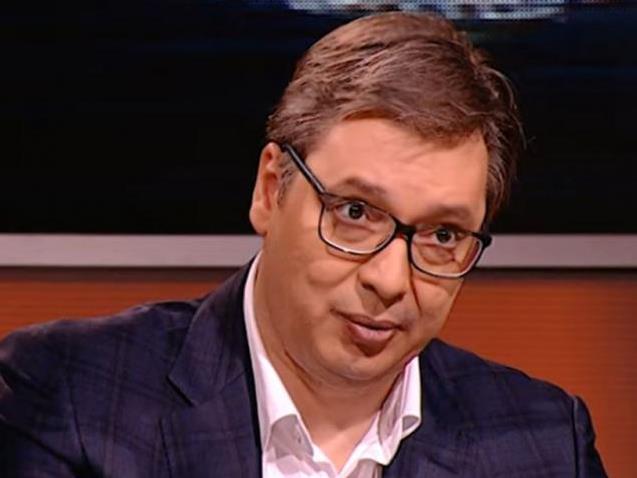 |
|
|
| Letter to the President of the Russian Federation on the occasion of Christmas |
|
On the occasion of Christmas, President of the Republic of Serbia Aleksandar Vucic, sent a letter to the President of the Russian Federation Vladimir Putin, which, among others, states the following:
"To you and all Orthodox Christians in the Russian Federation, I extend my heartfelt Christmas congratulations and sincere wishes that you spend it in good health, peace and tranquility. May this most joyous holiday of reconciliation, unity and family harmony bring love and good will to all hearts, and happiness and every progress to homes.
The year behind us was a difficult one, but it showed that in times burdened by challenges, through understanding, solidarity and love for one's neighbor, we can resist temptations. I am glad that Serbia and Russia, even in this time of uncertainty, have shown closeness and firm friendship.
I also take this opportunity to thank you for the active support that Russia lends to Serbia in defending the interests of the Serbian people and the Serbian Orthodox Church in Kosovo and Metohija. I would like to express my special gratitude to you for your personal commitment to completing the works on the mosaic in the Church of St. Sava and for the warm message you sent", reads the letter from President Vucic.
President Vucic also sent a letter with Christmas greetings to Patriarch Kirill of Moscow and All Russia.
Belgrade, 6 January 2021
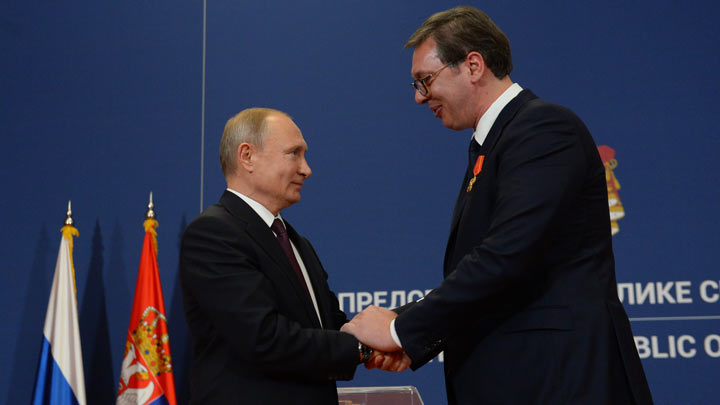 |
|
|
| New "Balkan Stream" gas pipeline opened |
|
President of the Republic of Serbia Aleksandar Vučić opened this morning a new Balkan Stream gas pipeline in Gospođinci near Žabalj. The pipeline passes through Serbia from the Bulgarian to the Hungarian border.
"This is an important day for our country, let the gas start flowing and let us be even more successful. I wish you a Happy New Year, and I want to thank all our Russian friends who participated with us in constructing this pipeline. Congratulations on a tremendous job, this is of great importance for the industry, the progress of the Serbian economy, but also of great importance for all the citizens of our country," said the President.
President Vučić pointed out that Serbia provided energy stability and security through the "Balkan Stream" gas pipeline, which is vital for attracting new investors, and added that gas is distributed from that place through the system of primary and secondary gas pipelines.
"This guarantees us a more certain and secure future. When you have gas in each municipality, then you can attract everyone who wants to open factories. There is still work to be done, but this pipeline guarantees us a more certain future. With the support of Russian partners, Serbia has managed to secure supplying its territory with gas. But from here, it will also go to Hungary and Bosnia and Herzegovina," said President Vučić.
He pointed out that we procure gas through that gas pipeline at a price of up to 155 dollars, with much lower transport costs than through another gas pipeline through which we have been supplied so far. The President noted that additional USD 30 were charged for delivering gas through Ukraine and Hungary to Serbia plus USD 18 for distribution across our territory.
Considering the high price of the gas pipeline construction, the favourable circumstance is that together with our partner, we will charge the transit tax and thus pay those costs, said the President.
President Vučić announced that the gas would be brought to many municipalities where it is not available, which will additionally attract everyone who wants to open factories.
The Ambassador of the Russian Federation, Botsan-Kharchenko, said that this is the best New Year's gift.
"This gas pipeline will provide stability to Serbia and an opportunity for the development of internal infrastructure and energy stability," the Ambassador pointed out.
The Balkan Stream is part of the Turkish Stream gas pipeline, a project of Russia's Gazprom and Turkey's Botash, to provide a stable gas supply to Turkey, southern and southeastern Europe. The pipeline is 930 kilometres long with a capacity of 31.5 billion cubic meters of gas per year. The first arm passes through Turkey, while the second arm runs to Bulgaria, Serbia and Hungary. Serbia and Bulgaria call that part of the gas pipeline the "Balkan Stream".
Belgrade, 1st January 2021
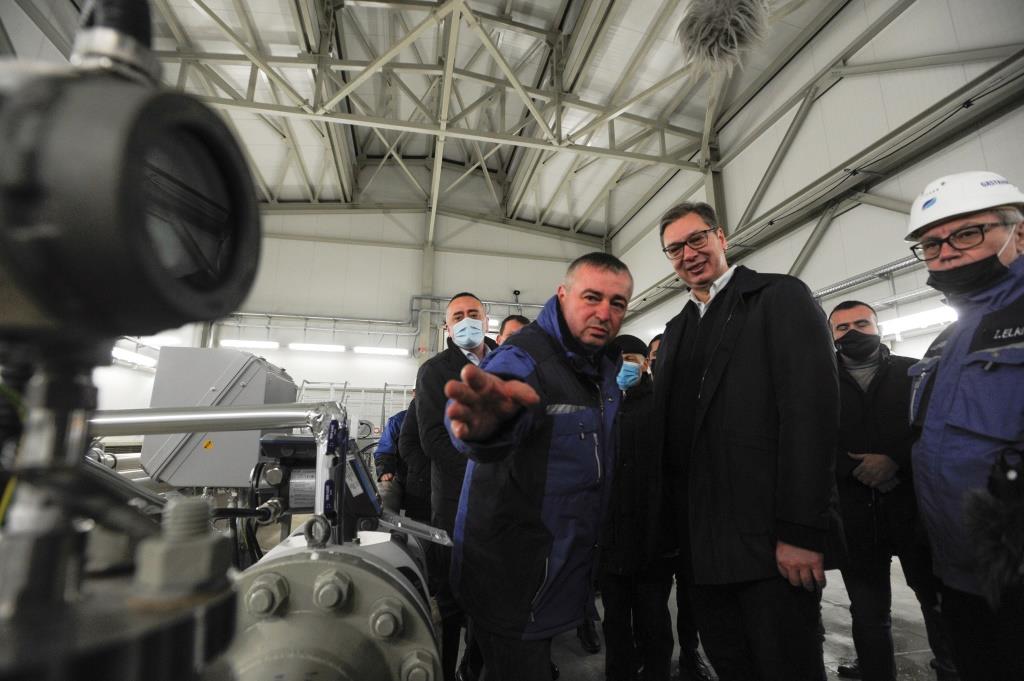
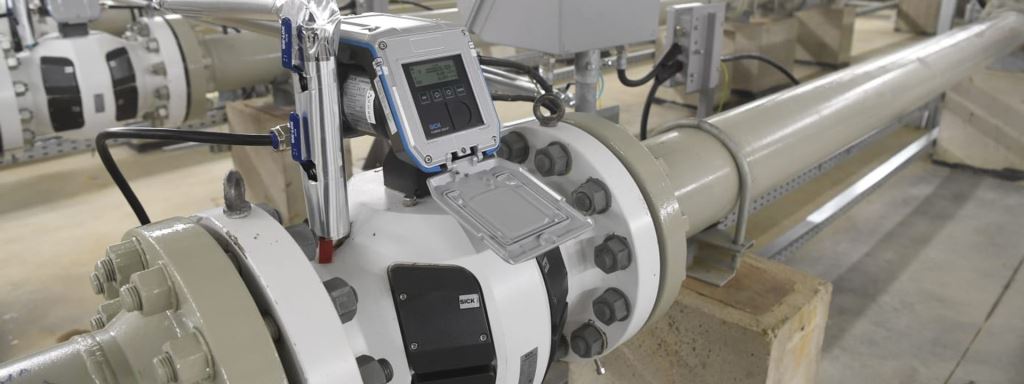
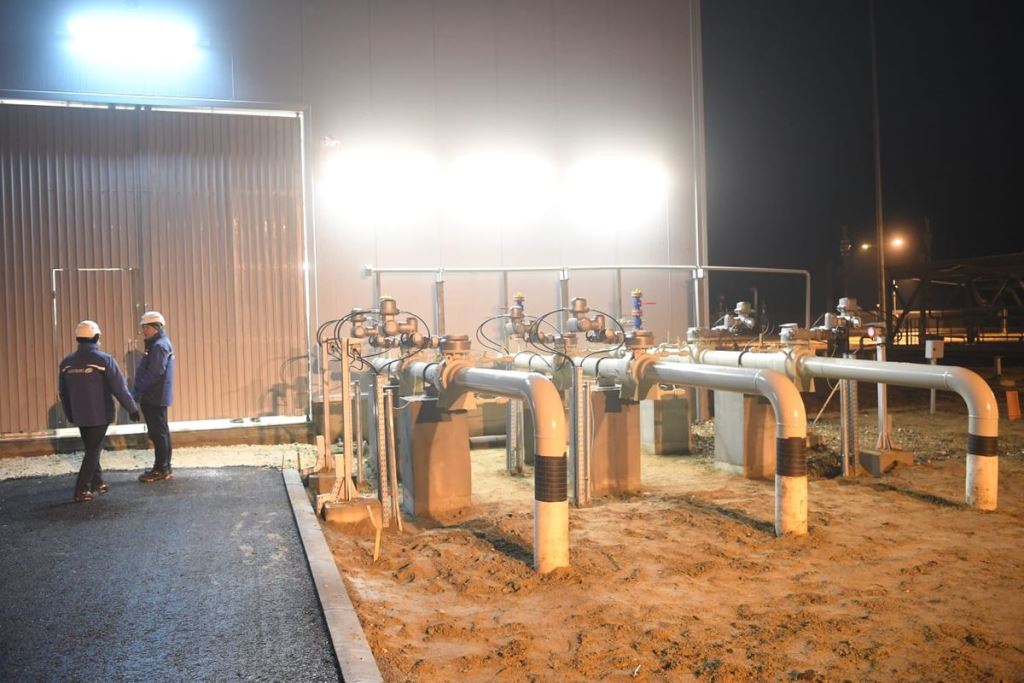 |
|
|
| Every Serb in the diaspora is potentially a lobbyist |
|
Our compatriots living abroad are one of the great potentials that the state has not recognized in the right way so far, which is why a different approach is needed to the issue of how to strengthen our diaspora and use the good will of people who are potential lobbyists for the interests of Serbia and the Serbian people, Foreign Minister Nikola Selakovic said.
"When it comes to Serbs in the diaspora, and especially in the region, this issue has been a kind of an unattended crop which requires a lot of work, and even when a lot is done at once this is not apparent immediately ", Minister Selakovic stated in an interview with Tanjug.
He emphasized that the appointment of the Director of the Office for Cooperation with the Diaspora and Serbs in the Region for the first time after almost seven years since this body was formed within the Ministry of Foreign Affairs, shows that it is one of the priorities of the Ministry he is at the helm of.
Selaković notes that intensive efforts have been long underway on forming a plan to make the diaspora more visible both outside the borders of Serbia and in the mother country itself.
"Every person in the diaspora is a potential lobbyist for the interests of our country and people, and we need to find the right way to use that", he said.
That much can be done in that regard Selakovic illustrates with the fact that only in Switzerland, in 24 cities, there are Serbian cultural and artistic associations which amounts to more than 3,000 young people who get together in order to preserve our tradition, culture, the Serbian language and history.
"If they were able to set up such associations in 24 cities, it speaks volumes about the enthusiasm of these people. There is so much enthusiasm, energy and love in these people. We need to explore ways to help them and use their good will and potential", the Minister points out.
He also cites the example of an emigrant family in Canada, the Varaklic family from southwestern Serbia, who sends Christmas packages for children in the Raska region every year. He adds that they have so far donated hundreds of thousands of dollars to non-governmental organizations for those needs alone, but he says that we do not see that here.
"The state does not recognize this, and these are people who gained success as entrepreneurs working in a distant country, who can be serious lobbyists for Serbia, for Serbian interests, someone who represents us in the best possible way", Minister Selakovic said.
Minister Selakovic also pointed out that Arnaud Gouillon has been appointed as head of the Office for Cooperation with the Diaspora and Serbs in the Region and described him as a man of extraordinary energy, great love for the Serbian people, which he showed in his engagement towards Serbs in Kosovo and Metohija, where they were seriously endangered.
"By doing so, he showed and set an example to many of our compatriots of what an individual can do. And when one such individual focuses energy, enthusiasm and love for people, on work done within the state administration system, I think that the preconditions have been created for such activities to yield good results", Minister Selakovic said.
Source: Tanjug
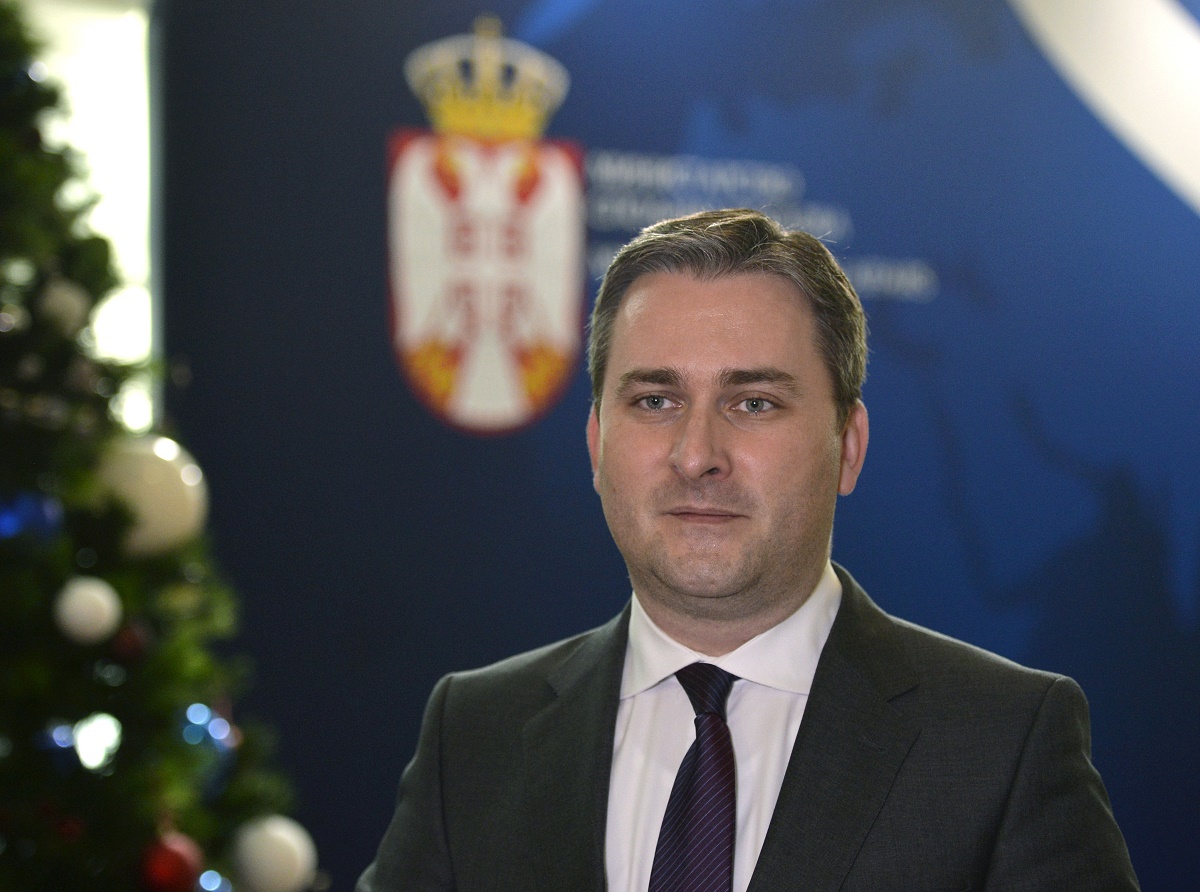 |
|
|
| Minister Selakovic: New ambassadors will be appointed this year, but the goals remain the same |
|
This year, Serbia could finally have Ambassadors and Consuls General appointed to about a third of the currently vacant positions in the country's diplomatic and consular missions in the world, and Minister of Foreign Affairs Nikola Selakovic is convinced that most of these positions will be filled, as he points out, by the best possible people.
"In the next year, I am convinced that the majority of these vacancies will be filled", Selakovic told Tanjug, emphasizing that the work is being done gradually, because the state wants to show that is has a quality staff who will represent Serbia's interests in the best possible way.
The Head of Serbian diplomacy reminded that in a number of diplomatic missions, the four-year mandate of Ambassadors and Consuls General has already expired, so that the procedure for appointing new ones will follow, after their recall.
One of the "vacant" spots is the post of the Serbian Ambassador to China.
"We are working hard to find the best possible solution for our new Ambassador to China and as we appointed one of the best people in the state system as Ambassador to the United States, who, I am sure, will perform his duties in the best possible way, I am convinced that it will be the same for the Ambassador in Beijing", Selakovic said.
The Minister, who took over the foreign policy sector in the Government a little over two months ago, points out that circumstances in the world, as well as Serbia's position in it, have changed, but that Serbia's foreign policy goals do not change: the country remains strategically committed to European integration and, while pursuing the EU path, it will also strengthen traditional friendships with Russia and China, as well as promote and strengthen new partner relations with the United States.
"Relations in the region, good-neighborly relations, regional cooperation are also important for Serbia, because this fits into the set of requirements on the European path. But, even regardless of the European path, it is always important who you live next to, who you live with, what your neighbors are like and what the relations are like in the neighborhood", Minister Selakovic said.
He also points out that the issue of Kosovo and Metohija is of inestimable importance, it being the main national and state issue for Serbia and the Serbian people.
"When I say that circumstances are changing, but not the goals - the EU and European integration was our goal seven years ago as well, but look at what our room for maneuver was then, in terms of economic aspects, and look at it today. Circumstances changed, and then you adjust your actions to these changed circumstances, to the best extent possible", Minister Selakovic said.
He reminds that foreign policy priorities for 2021 were also outlined by the President of the Republic, and that maintaining peace and stability in the region is the absolute priority.
"Only in a peaceful and stable region of the Western Balkans and Southeast Europe can Serbia thrive economically, culturally and scientifically - in every respect. Peace and stability in the region are “sine qua non” without which there is no development and progress. Serbia has acted, is acting and will act as a factor that stabilizes the entire region and maintains peace in the region, showing that it is the region that benefits everyone the most", Minister Selakovic said.
Relations in the region have always been complex, and the region, Minister Selakovic noted, is to our great regret, burdened with issues that we cannot have a bearing on, and which concern the past.
Serbia's approach is to seek room to influence what is happening today and what will happen happen in the future.
In this context, he states that the so-called "mini-Schengen" initiative for market unification of the region, which originated from Aleksandar Vucic and was met with a positive response from the Prime Ministers of Albania and North Macedonia, is one of the opportunities to do much more for the region.
"To show how much more we can do if we act together and if we seek our common denominators, and not what separates and divides us ", Selakovic points out.
When it comes to relations with the United States, Selakovic said that one should not expect the great powers to change their positions the way we would like, want or imagine, but that it is important that the Ambassador in Washington, Marko Djuric, also emphasized that his task, among other things, will be to make efforts to change the climate in bilateral relations with the United States - the most important country in the world, as our lacking communication with them in the past seriously affected the position of the Serbian people and Serbia.
"I am convinced that Djuric will work seriously on that, together with President Vucic, Prime Minister Brnabic and the Ministry of Foreign Affairs, and contribute to a large extent to changing that climate", Minister Selakovic said.
He points out that it is extremely important for Serbia to promote its partner relations with the United States to a higher level.
"This is a country with which we cooperate closely in many areas and a country with which we must strive, and not give up in doing so, to find what we have in common, our common ground and good examples of our cooperation in the past, and to create space for such cooperation in the future as well", Minister Selakovic concluded.
Source: Tanjug
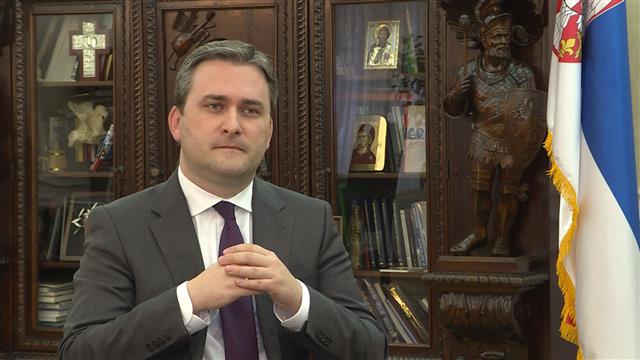 |
|
|
| President Vucic: Serbia to remain on the course of a winning policy of stability |
|
Preservation of peace, taking care of the health and better living standard are key for Serbia in 2021, underlined President of the Republic Aleksandar Vucic, convinced that even though the completion of this ambitious and by no means easy task will be anything but straightforward, best results can be achieved by working in concert with the Government, while ensuring security and a future of certainty for the citizens.
The President said that Serbia has set for itself great and ambitious goals for the next year, notwithstanding the complex international and regional circumstances, and that it will endeavour to fully preserve peace and stability in the region and the country, while safeguarding the vital national and state interests.
"Serbia will remain on the course of a winning policy - the policy of stability", President Vucic said and stressed that our country remains on the European integration path and that it will carefully foster its friendship with Russia and China, while building a friendship with the United States as well.
According to the President, Serbia will continue to pursue a winning policy, with the country itself as a top priority, i.e., a policy that will enable Serbia to continue being one of the top three countries in Europe in terms of growth rate in the next two years.
A precondition for that, the President noted, is to crack down on criminal groups, but also to ensure even bigger investments in the police and army forces.
"Serbia is the country that recorded the highest growth in Europe in 2020", the President pointed out at the annual press conference and added that he expects to conclude a new arrangement with the IMF, as well as that Serbia, by the end of next year or early 2022, will raise its credit rating to an "investment" one, which will put our country's rating on par with the most developed EU countries.
As the greatest success in 2020, Vucic noted that Serbia will end the year with the highest growth rate in Europe, which, as he said, is expected to be from minus 0.75 percent to minus one.
"I am proud to be the President of a country that is the European champion in terms of GDP", Vucic pointed out and added that German Chancellor Angela Merkel was also pleased with Serbia's success.
According to President Vucic, this result will encourage Serbia to accelerate its European path, while continuing friendships with those who did not turn their backs on Serbia when it was at its darkest hour, namely Russia and China.
The President pointed out that the activities to attract foreign investors will continue, then that work will be done on investments in agriculture, primarily the food industry, new machinery, and digitalization of agriculture.
President Vucic also emphasized that the goal is for salaries in the public sector to average between 560 and 570 euros by the end of the year. Only in Belgrade, the average salary would be around 700 euros.
President Vucic reminded that the salaries of health care workers will increase by five percent from January 1, while the salaries of others in the public sector will increase by 3.5 percent and an additional 1.5 percent as of April 1, while corporal, private first class and non-commissioned officer army ranks will get an increase of an additional 10 percent. He noted that the minimum wage will be increased by 6.6 percent and so will pensions from January 1, by 5.9 percent, with the plan that the average pension amounts to 270 euros by the end of 2021. The President especially pointed out investments in health care, reminding that two new covid hospitals have been opened and that the renovation and construction of health facilities continues throughout Serbia, while stressing that Serbia is by far the first in the region in terms of hospitalized persons per 100,000 citizens, which is why it has recorded a low mortality rate , and also that Serbia this year has been among the top three countries in the region according to the number of PCR tests performed.
Speaking about tourism, the President said that, next year, efforts will be made on the development of the Danube basin region, from Apatin to Kladovo, that the Ovcar-Kablar Gorge will be developed, as well as our mountain centers.
Discussing the field of culture and information, President Vucic said that the implementation of the media strategy and the completion of the reconstruction of the National Theater in Subotica are important for next year, and he announced investments in museums, especially emphasizing the relocation of the History Museum to the train station building. He also stated that the floor heating in the Church of Saint Sava will be completed next year.
He pointed out that the state will continue to take care of our citizens in Kosovo and Metohija, that no one can forbid Serbia to help its people, and that Serbia will not give up on helping our people.
As he emphasized, Serbia is ready to send medicines and vaccines to the Albanian population as well, and pointed out that in the upcoming period our country will pursue a policy of peace in the region and will endeavour to cooperate with Zagreb, Sarajevo, Podgorica and others.
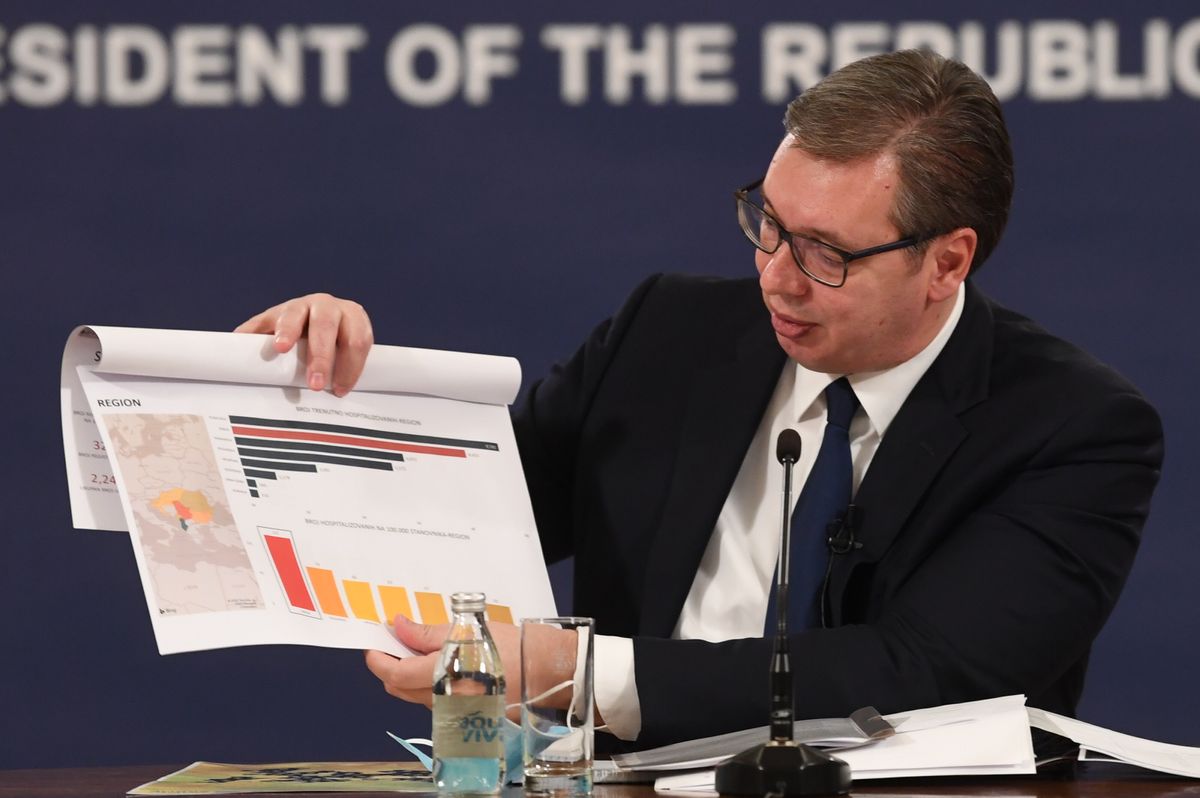
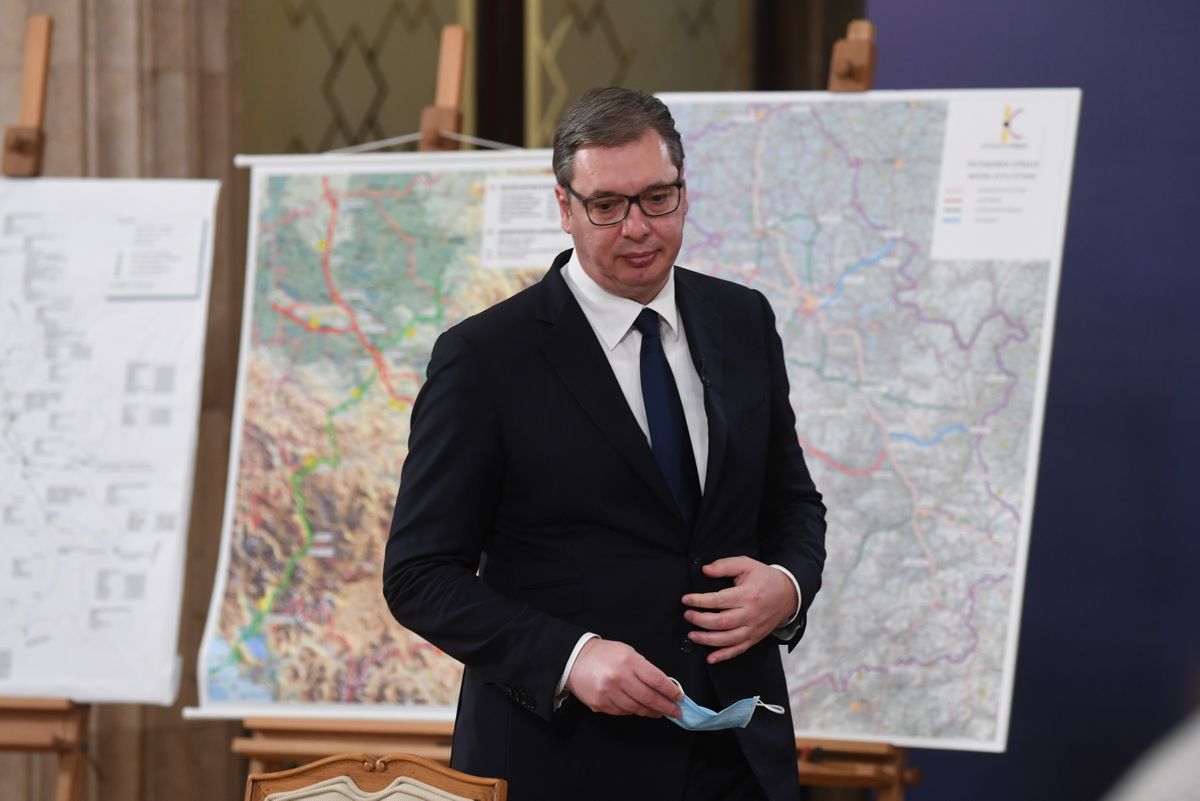 |
|
|
| Continuation of strengthening of strategic partnership with Russia |
|
Prime Minister Ana Brnabic talked today with Ambassador of the Russian Federation to Serbia Alexander Botsan-Harchenko to whom she extended New Year and Christmas greetings and expressed gratitude for generous help which Russia sent to Serbia for the fight against coronavirus and the readiness for cooperation on the Sputnik vaccine.
Brnabic assessed that the relations between the two countries are very good and developed at the political, economic, cultural and other levels and added that the Serbian government will continue to work on their further strengthening on the basis of strategic partnership.
The realisation of joint projects will contribute to the improvement of cooperation, she underlined and highlighted the importance of the completion of works on the Russian gas pipeline through Serbia which will take place soon.
The Prime Minister said that the news that a certain amount of the Sputnik vaccine will arrive in Serbia before the year-end is very good and expressed gratitude to Botsan-Harchenko on Russia's solidarity on that matter.
The Russian Ambassador conveyed to the Serbian Prime Minister the regards and greetings for the upcoming holidays from Russian Prime Minister Mikhail Mishutin and assessed that the relations between the two countries are at a high level and that they are characterised by good cooperation in all areas.
The two officials confirmed readiness to continue with the successful economic, political and cultural cooperation next year as well.
Belgrade, 28 December 2020

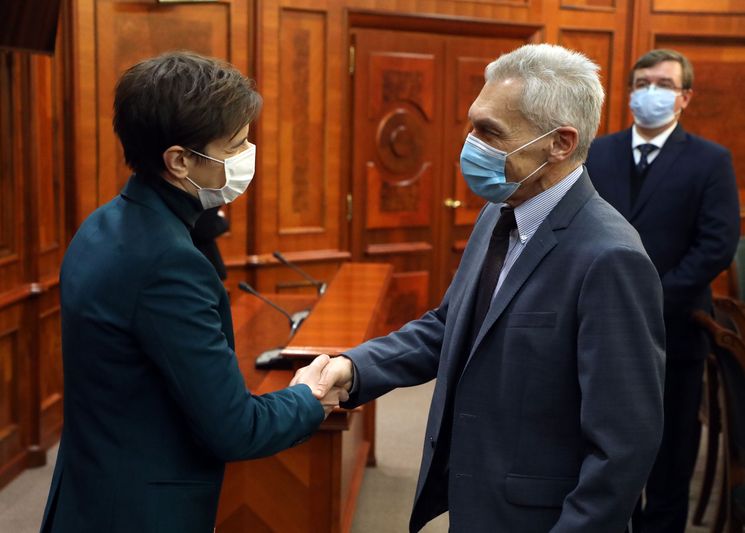 |
|
|
| Congratulatory message extended by the President of the Russian Federation |
|
President of the Russian Federation Vladimir Vladimirovich Putin extended today a congratulatory message to President of the Republic of Serbia Aleksandar Vučić on the occasion of the New Year and Christmas. The message of congratulations reads as follows:
„Dear Mr. President,
I would like to cordially wish you a happy New Year and Christmas.
The outgoing year has brought difficult challenges for all of us. We have fully affirmed the importance of the relations of strategic partnership which enables our countries to join their efforts in response to modern-day threats and challenges, including the coronavirus infection pandemic.
I am confident that we will continue our close cooperation in all key directions and succeed in implementing the existing agreements and joint projects. This is without a doubt in the interest of the brotherly peoples of Russia and Serbia and is carried out on the path of strengthening the stability and security on the European continent.
I wish you, your nearest and dearest ones good health and success in all your endeavours, while wishing happiness and prosperity to all citizens of friendly Serbia", reads the congratulatory message from President of the Russian Federation Vladimir Vladimirovich Putin.
Belgrade, 24 December 2020
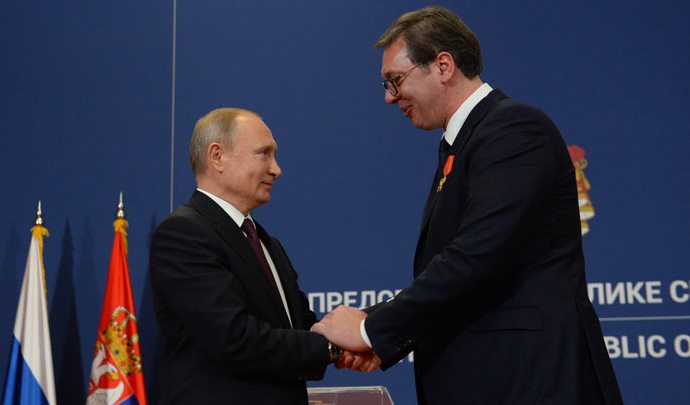 |
|
|
| Meeting with the Ambassador of the Russian Federation |
|
President of the Republic of Serbia Aleksandar Vučić met today with the Ambassador of the Russian Federation, Alexander Botsan-Kharchenko, and asked him to convey greetings to President Vladimir Putin, with congratulations on the New Year and Christmas holidays, as well as best wishes for the Russian Federation's progress and prosperity.
President Vučić and Ambassador Botsan-Kharchenko stated that last week's detailed talks between the two delegations, during the visit of Russian Foreign Minister Sergey Lavrov, confirmed the strategic commitment of the two countries to continue developing relations in all areas based on exceptional mutual respect.
President Vučić and Ambassador Botsan-Kharchenko, based on what was agreed at the meeting with Minister Lavrov, paid particular attention to the implementation of specific joint projects and stated that the works on the gas pipeline through Serbia are nearing completion and that the works executed by RŽD continue on the railway section to Novi Sad.
The two interlocutors also emphasised the importance of the Eternal Flame lighting ceremony at the Liberators of Belgrade's Cemetery. President Vučić once again stressed the shared libertarian tradition of the Serbian and Russian people and their struggle for peace and pointed out there is no more important mission than preserving the truth about that just struggle.
President Vučić and Ambassador Botsan-Kharchenko also discussed the results of Russian experts in the fight against COVID-19 and the Russian vaccine.
Belgrade, 24th December 2020
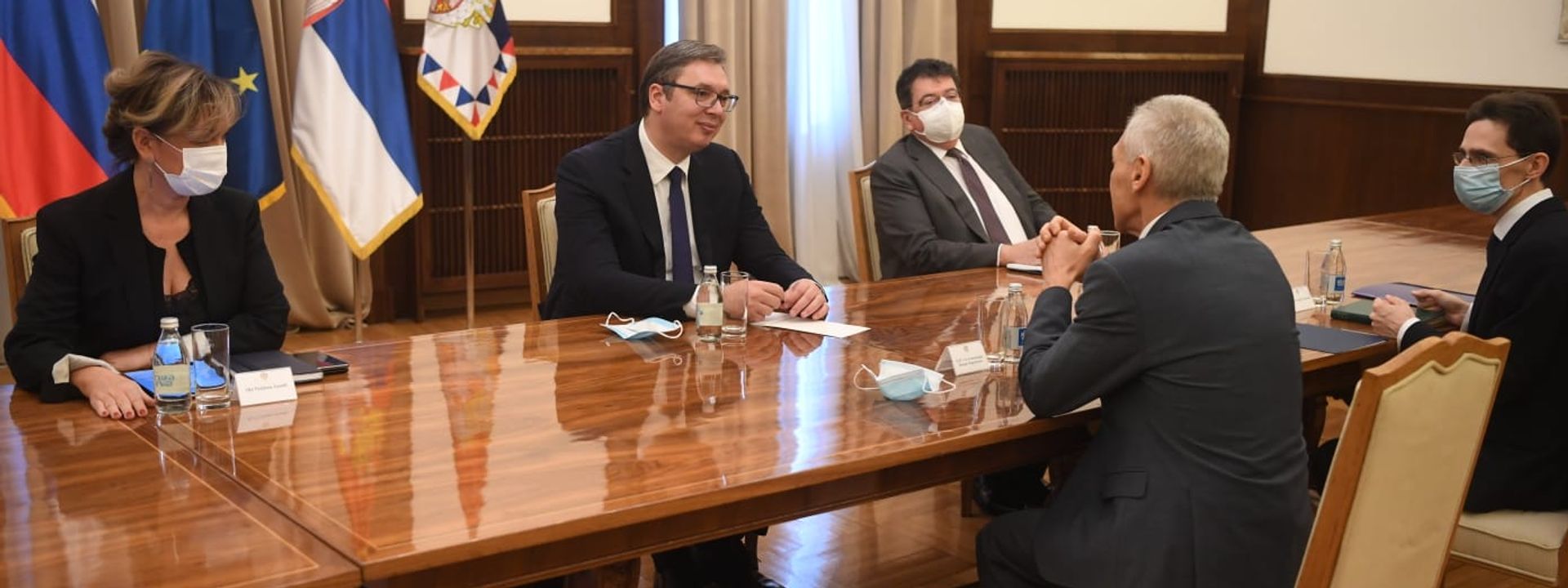 |
|
|
| Serbian Prime Minister the first PM in Europe to receive a Covid-19 vaccine |
|
Prime Minister of the Republic of Serbia Ana Brnabic received today the first vaccine against the coronavirus made by Pfizer company, at the Torlak Institute of Virology, Vaccines and Sera.
Brnabic, who is the first European Prime Minister to receive the vaccine, pointed out that this day may be the first since 6 March that we have a reason for a smile on our faces as it marks the beginning of the end of the coronavirus pandemic in Serbia, but also in Europe and the world.
As Prime Minister and as someone who leads the COVID-19 Crisis Response Team, I felt obliged to be the first to receive the vaccine, to show that we believe in it, as well as in our institutions - the Medicines and Medical Devices Agency of Serbia and experts who worked round the clock to test the vaccine, she said.
Underlining that it was an honour to do this for her country and be the first to pave the way for all citizens, the Prime Minister said that she agreed with President of the Republic Aleksandar Vucic that the two of them receive different vaccines, so he will most likely receive the next one that arrives, most probably the one produced by China.
At the moment we have the Pfizer-BioNTech consortium vaccine, and the vaccines from the Chinese Sinopharm are expected in the near future, as well as certain quantities of the Russian vaccine Sputnik V.
She expressed her belief that at the end of the first quarter or the beginning of the second quarter of next year we will have the vaccine of the company AstraZeneca, and after that the vaccine manufactured by Moderna.
As we promised, all vaccines licensed in their countries and approved by relevant international agencies will be available to our citizens, and of course they will be tested by all of our agencies and institutes as well, the Prime Minister pointed out.
She said that prior to the vaccination of health care workers, Minister of Health Zlatibor Loncar will also receive a vaccine shot as we endeavour to serve as an example and show how confident we are in the vaccines and institutions.
Brnabic pointed out that Serbia, not counting Great Britain, is the first country in Europe to receive the Pfizer-BioNTech vaccine, and the third to start a mass immunization and campaign for giving the vaccine - after Great Britain and Switzerland.
We achieved something very important and we will not stop even for a moment until the immunization of the population is completed, the Prime Minister said.
She specified that our country will receive another 16,000 doses of Pfizer-BioNTech vaccine in January, as well as that together with other vaccines we will have a total of one million doses in January, and a total of approximately two million doses during the first quarter of next year.
There is a dynamic on which Pfizer delivers vaccines and it varies depending on the production, and this is the case with deliveries to both Serbia and all other countries worldwide. We expected to receive 10,000 doses from Pfizer-BioNTech in December, however 4,807 doses arrived, the Prime Minister explained.
Serbia demonstrated that it is able to fight and succeed if we all work as a team, Brnabic said and called on all not to see the beginning of vaccination as the end of the fight already, but to continue to apply all measures instead.
This is to be certain and to be able to help our health care workers, and once the immunity is acquired we will be able to slowly start taking off the masks in 2021, but until then we should not see this as a victory but as the beginning of the end, the Prime Minister concluded.
After the Prime Minister, vaccine shots were also administered to the Minister of Labour, Employment, Veteran and Social Affairs and a member of the COVID-19 Crisis Response Team Darija Kisic Tepavcevic and to Predrag Kon who is also on the COVID-19 Crisis Response Team.
Furthermore, vaccine shots were also given to Head of the MMA Department for the Prevention and Control of Nosocomial Infections prof. Dr. Vesna Suljagic and academician Predrag Pesko, professor of Belgrade and Heidelberg universities and full member of the Serbian Academy of Sciences and Arts.
The first quantities of the vaccine arrived in Serbia on 22 December, and today they will be administered to patrons of nursing homes in Belgrade and Novi Sad.
Serbia is the first country in the region to receive a shipment of Pfizer-BioNTech vaccine.
In addition to procuring the vaccine among the first countries in the world, even before EU countries, Serbia is one of the rare countries that managed to build and open two covid hospitals in record time. The hospitals with 930 beds in Batajnica and 500 beds in Krusevac are a major contribution to the expansion of capacities and strengthening the health care system in the fight against coronavirus and, as President Vucic said, represent a monument of the future, that will talk about the accomplishments the state made in a short time.
Also, we recall that investments in health infrastructure have been large in Serbia, and since 2016, 80 health centers and clinics have been renovated, and works are underway on six large health centers. This way more than EUR 200 million was invested in the reconstruction, construction and equipping of hospitals and more than 300 million in the renovation of clinics and specialized hospitals, and many have already been completed, such as the University Children's Hospital Tiršova, and KBC Zemun nad KBC "Dragiša Mišović" hospitals.
The absolute priority of the Serbian Government is the successful completion of health infrastructure projects that are underway, but great attention is also paid to health workers, whose salaries have, by 2020, been increased by 56.8% for specialist doctors, and 66.9% for nurses, while significant funding is invested in the education of health professionals, as well as in equipment and working conditions.
Like other countries, Serbia has faced great challenges this year, most notably health challenges, and all factors in the state were focused on preventing the spread of the virus and safeguarding the lives and health of citizens. Serbia has faced these challenges better than many wealthier and more developed countries in Europe and the world.
Belgrade, 24 December 2020
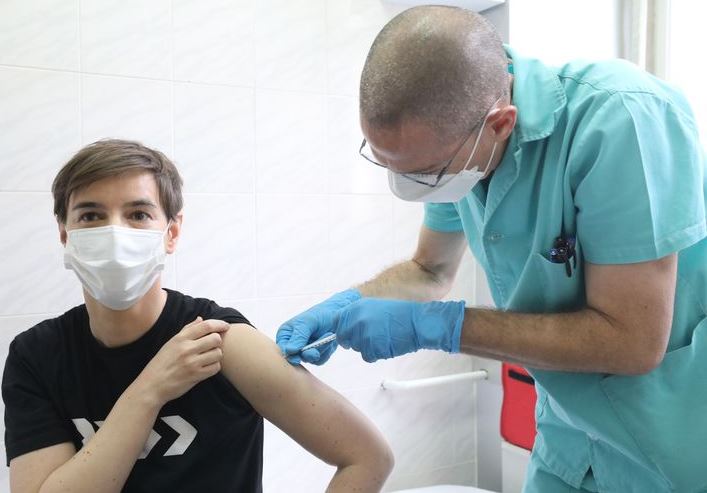 |
|
|
| Minister Selakovic met with leadership of the Danube Commission in Budapest |
|
Minister of Foreign Affairs of the Republic of Serbia Nikola Selakovic met today in Budapest with leadership of the Danube Commission and discussed importance of the Danube for the promotion of regional economy and an intensive flow of people and goods.
The interlocutors assessed that it is important to use the economic potentials of the Danube, but also to preserve its natural beauties, i.e., to meet the environmental standards.
Minister Selakovic emphasized that Serbia will be able to invest more in infrastructure on the Danube, owing to the successfully implemented reforms in the past years, and to take part in the implementation of the strategic projects of the Danube Commission.
Minister Selakovic wrote into the visitors' book that, since it was founded in Belgrade in 1948, the Danube Commission has been a thread of cooperation and friendship among the member countries.
"The Danube was a river of peace throughout all the difficult periods in the turbulent history of our region", Selakovic wrote down.
Source: Tanjug
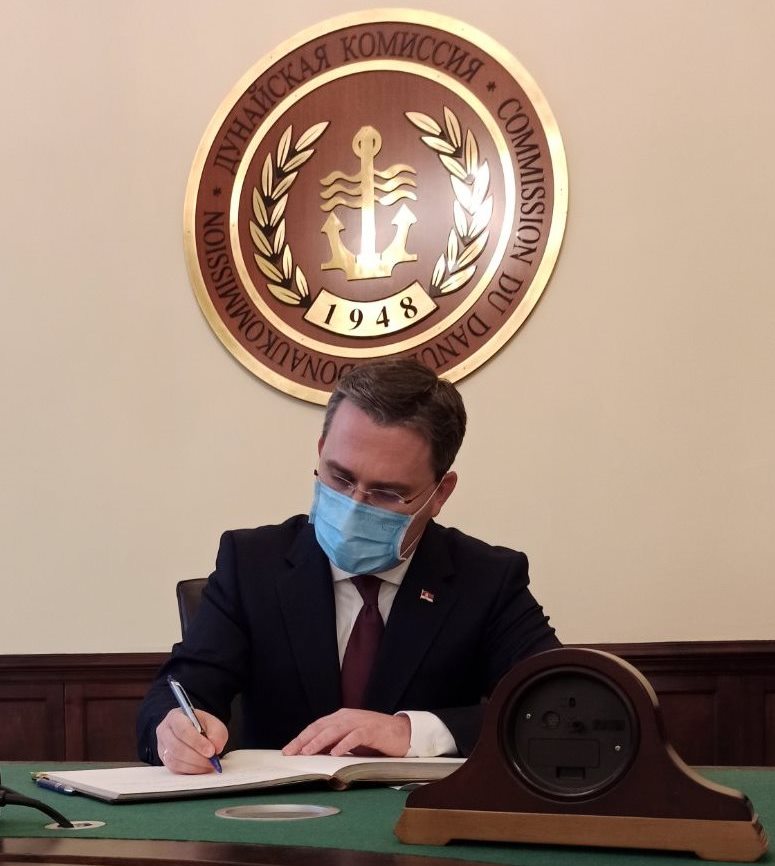
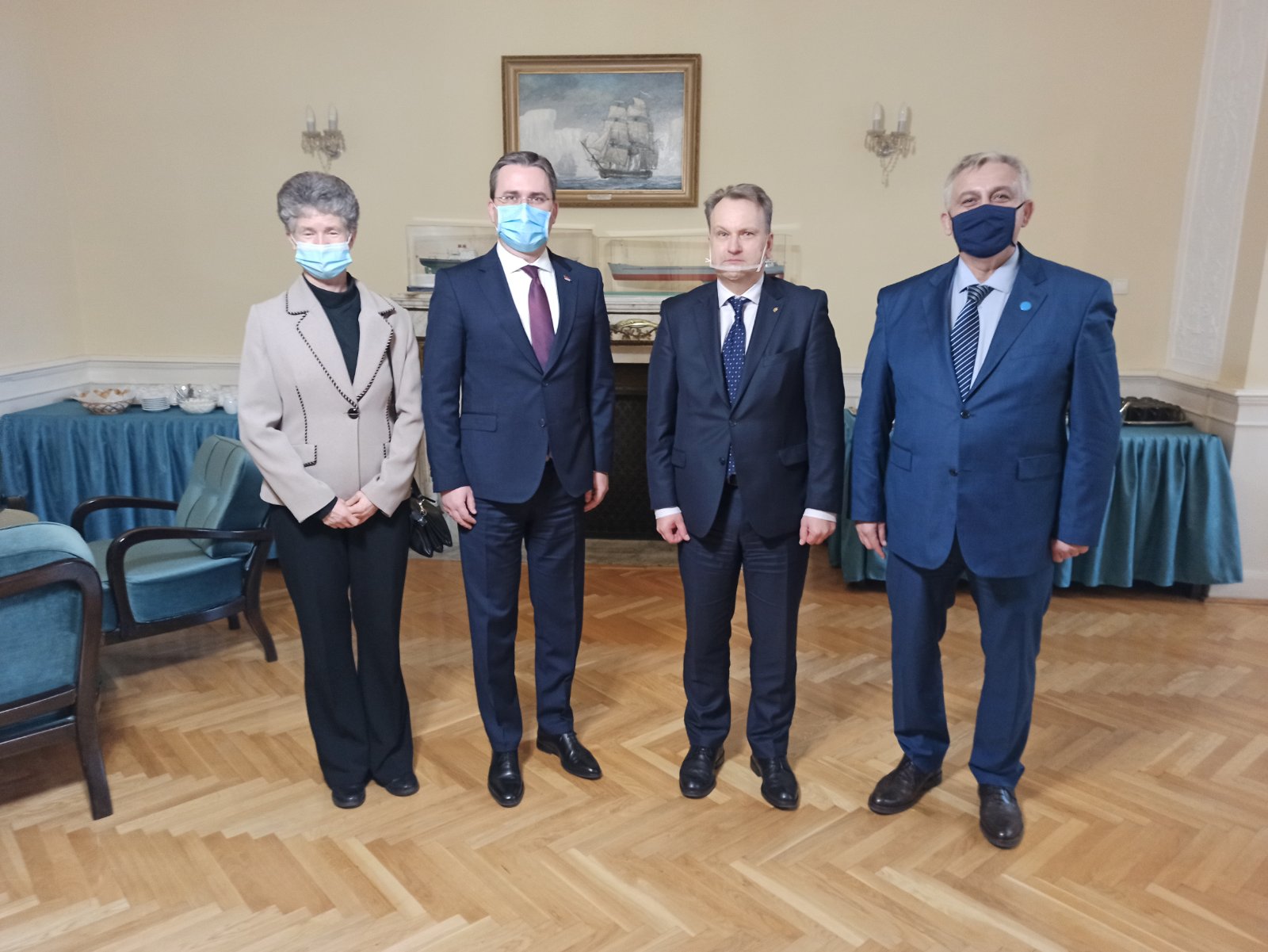 |
|
|
| Minister of Foreign Affairs of the Russian Federation Sergey Lavrov on a visit to Serbia |
|
Minister of Foreign Affairs of the Russian Federation Sergey Lavrov paid an official visit to Serbia on 15 December and met with President of the Republic Aleksandar Vucic, Minister of Foreign Affairs Nikola Selakovic and Speaker of the National Assembly Ivica Dacic.
Serbian President Aleksandar Vucic, Serbian Foreign Minister Nikola Selakovic and Russian Foreign Minister Sergey Lavrov attended the lighting of the 'Eternal flame' ceremony and laid wreaths at the Eternal Flame monument at the Memorial Cemetery of the Liberators of Belgrade. After that, they visited the Saint Sava Temple located in Vracar municipality and laid flowers on the tomb of Patriarch Irinej.
Lavrov and Selakovic held a bilateral meeting and signed a Consultation Plan between the Russian and Serbian Foreign Ministry for the period 2021-2022.
Serbian President Aleksandar Vucic emphasized that he had a detailed discussion with the Russian Foreign Minister on all essential relations, primarily bilateral ones which are of exquisitely amiable nature, as well as that a strategic commitment of both countries was confirmed to continue to develop our relations in various spheres of social life on the basis of friendship and exceptional mutual respect.
President Vucic emphasized that he was grateful to Russia for supporting Serbia's sovereignty and territorial integrity and added that this was reciprocated by Serbia in its relationship with Russia. He stated that he conveyed "his personal concerns as the Serbian President" about the situation in the region and said that he hoped that "we will all together have enough reason and strength" to resolve all differences peacefully, which was a commitment of Serbia.
The President added that Serbia played a role together with Russia in "defending the truth" about the World War II, adding that there were "various attempts" made to rewrite this part of history that the two countries will oppose together, President Vucic said.
President Vucic conveyed to the Head of Russian diplomacy his concerns regarding the situation in the region.
"I presented our views on the situation in the region and my personal concerns as the President of Serbia. I hope that together we will have enough reason and strength to solve all problems peacefully, through dialogue and talks. That will be a permanent commitment of Serbia," he emphasized and thanked Russia for supporting Serbia's territorial integrity and sovereignty.
The Russian Foreign Minister conveyed to Serbian President Aleksandar Vucic greetings from Russian President Vladimir Putin and a message that Russia was committed to the realization of all agreements reached with Serbia at the top level.
Expressing gratitude to the Serbian President for the receiving the Russian delegation at such a high level and for the traditional Serbian hospitality, Minister Lavrov emphasized that in the substantive talks with the Serbian leadership a commitment was affirmed to the agreements reached at the highest level and to the strengthening of strategic partnership in all areas including the political dialogue, economic, and military and technical cooperation.
The Russian Foreign Minister pointed out that cooperation will continue in all directions of foreign policy, and that specific directions of this policy were agreed and harmonized by Russian President Vladimir Putin and Serbian President Aleksandar Vucic.
"Our positions are harmonized regarding the necessity to respect international law and the Charter of the UN which envisages the respect for the principles of sovereignty and territorial integrity and non-interference in internal affairs of other states", Minister Lavrov said.
He added that he welcomes the balanced foreign policy pursued by Serbia and its policy of military neutrality.
"We welcomed Belgrade's commitment, reaffirmed once again by President Vucic, to the policy of preserving military neutrality by renouncement to join the anti-Russian sanctions, regardless of who introduces them", Lavrov emphasized and noted that Russia was committed to respecting the principles of Dayton that is - the equality of the three constituent peoples and the existence of two entities - Republic of Srpska and the Federation of Bosnia and Herzegovina.
Furthermore, Minister Lavrov stressed that Russia extends full support to Serbia concerning the issue of Kosovo and Metohija and reiterated that UNSC Resolution 1244 is a fundamental document and a framework in which all activity related to Kosovo and Metohija should be carried out. He stressed Russia's interest that the EU's role as a mediator achieves practical results, to be implemented impartially and to overcome open sabotage by Pristina of all agreements that were reached, among which is the agreement on the establishment of the Community of Serb Municipalities.
Lavrov emphasized that Russia's position remained unchanged - a compromise should be sought based on the Resolution 1244, and that they will only support a decision that suits the Serbs as well.
Minister of Foreign Affairs Nikola Selakovic said that the visit by Minister of Foreign Affairs of Russia Sergey Lavrov was not a technocratic but a friendly one and that it reaffirmed the traditionally good relations between Serbia and Russia.
"It had a friendly tone. And if there is someone among the great powers whom with we share an absolutely friendly tone, those are Russia and China. Of course, the goals of our foreign policy are European integration, European future and a different relationship with the western countries as we develop the level of cooperation with them, but with Russia there is a decades-long continuity", Minister Selakovic underlined.
The Serbian Foreign Minister said that the ceremony of bringing the eternal flame from the tomb of the unknown soldier in Moscow to the Cemetery of Belgrade Liberators was particularly solemn and touching.
"Much like the cemetery of Belgrade liberators is a symbol of brotherhood in arms and the joint fight against the fascist-Nazi enemies in the World War II, the Church of St. Sava is a symbol of new cooperation between Serbia and Russia, because it is owing to the significant assistance extended by our Russian friends that we managed to bring the works on this temple to an end", the Serbian Minister said.
On his visit to the Church, Minister Lavrov read out loud the letter by Russian President Vladimir Putin in which he congratulated the Serbian President and people bringing to an end the works on the mosaic in St. Sava's Church and stressed that the cooperation between the Serbian and Russian masters in this undertaking is a symbol of the brotherly friendship and spiritual closeness between the two peoples.
Ministers Lavrov and Selakovic signed a Consultation Plan between the Ministry of Foreign Affairs of the Republic of Serbia and the Ministry of Foreign Affairs of the Russian Federation for 2021-2022.
On that occasion, Minister Selakovic underlined that the bilateral cooperation between Serbia and Russia is at a high level, maintained and developed in many areas, and added that it received special impetus through the visit of Russian President Vladimir Putin in January last year.
Furthermore, Minister Selakovic said that Russia defends Serbian interests in other international and European organizations Serbia is a member of, stressing that Russia's support is of great importance for the protection of the rights of the Serbian people in Kosovo and Metohija, the property of the Serbian Orthodox Church, but also regarding the use of Serbian language and Cyrillic script.
Minister Selakovic added that what left the greatest impression on him was hearing Minister Lavrov repeat at least three times that President Vucic was particularly respected by the Russian state leadership for his attitude and a unique, unusual way he spoke and behaved, which resulted in Serbia today being an independent and self-sufficient state.
Minister Lavrov said that he discussed with his Serbian counterpart all issues related to further steps in international organizations, including the UN, OSCE and the Council of Europe and invited the Serbian Foreign Minister to pay a visit to Russia.
Sergey Lavrov arrived to Belgrade from Bosnia and Herzegovina and after the visit to our country he continued his travel to Croatia.
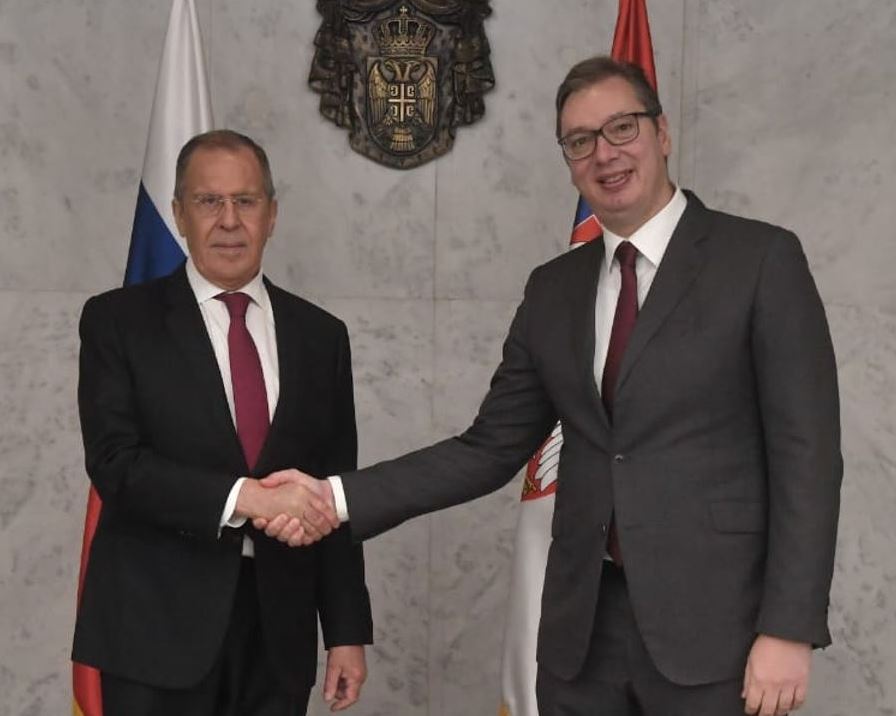
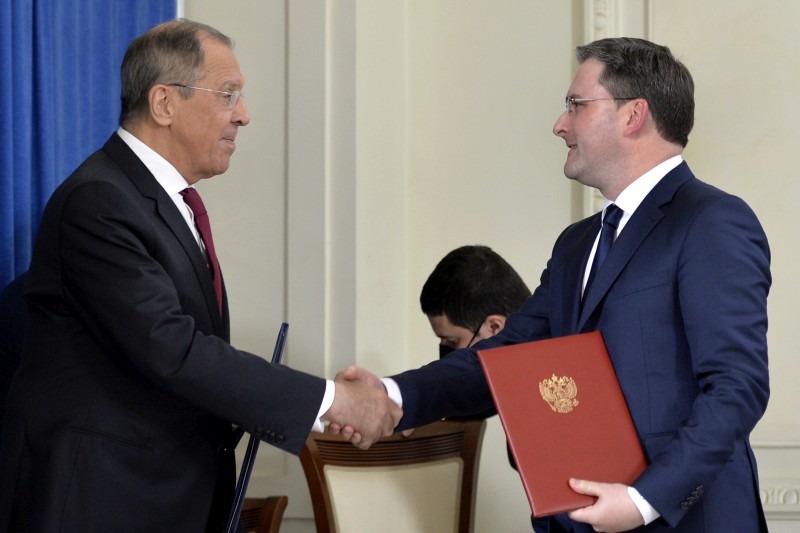
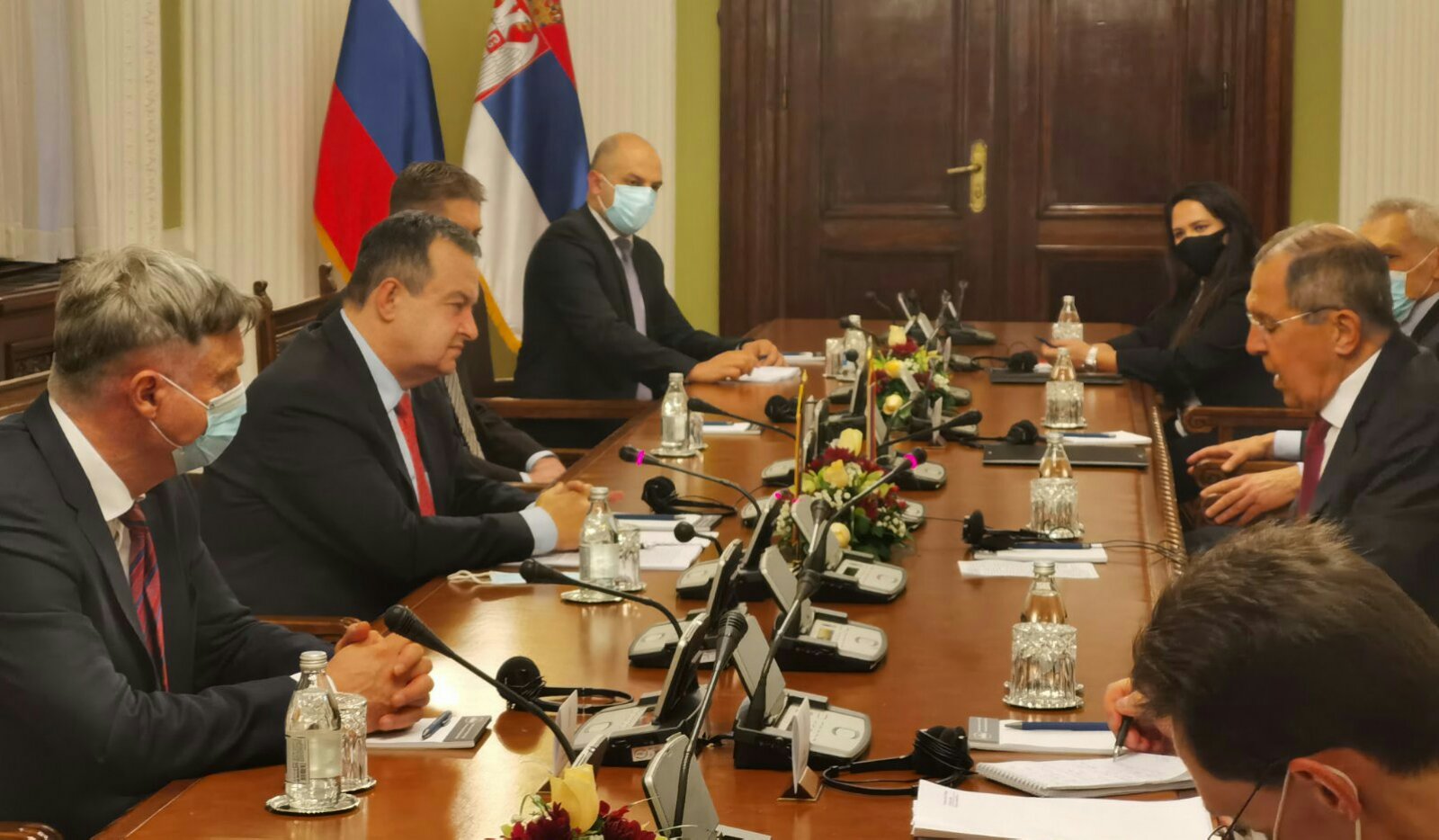
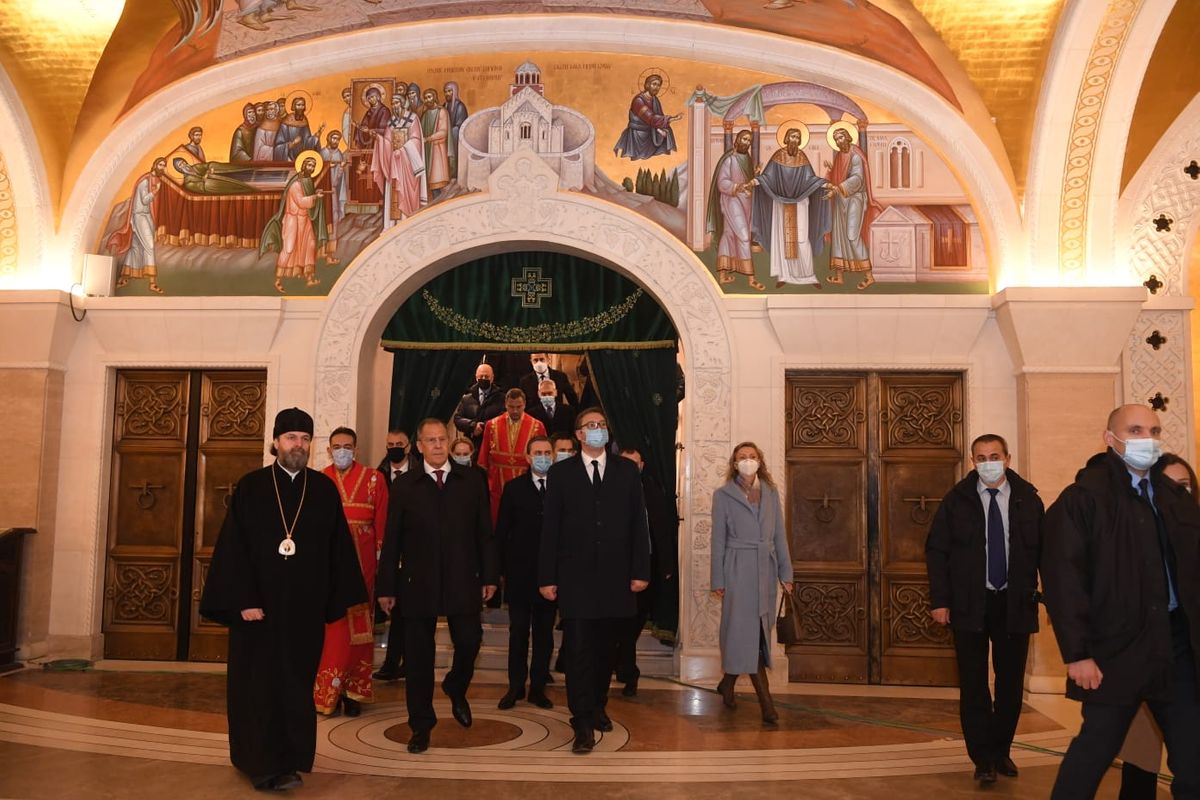
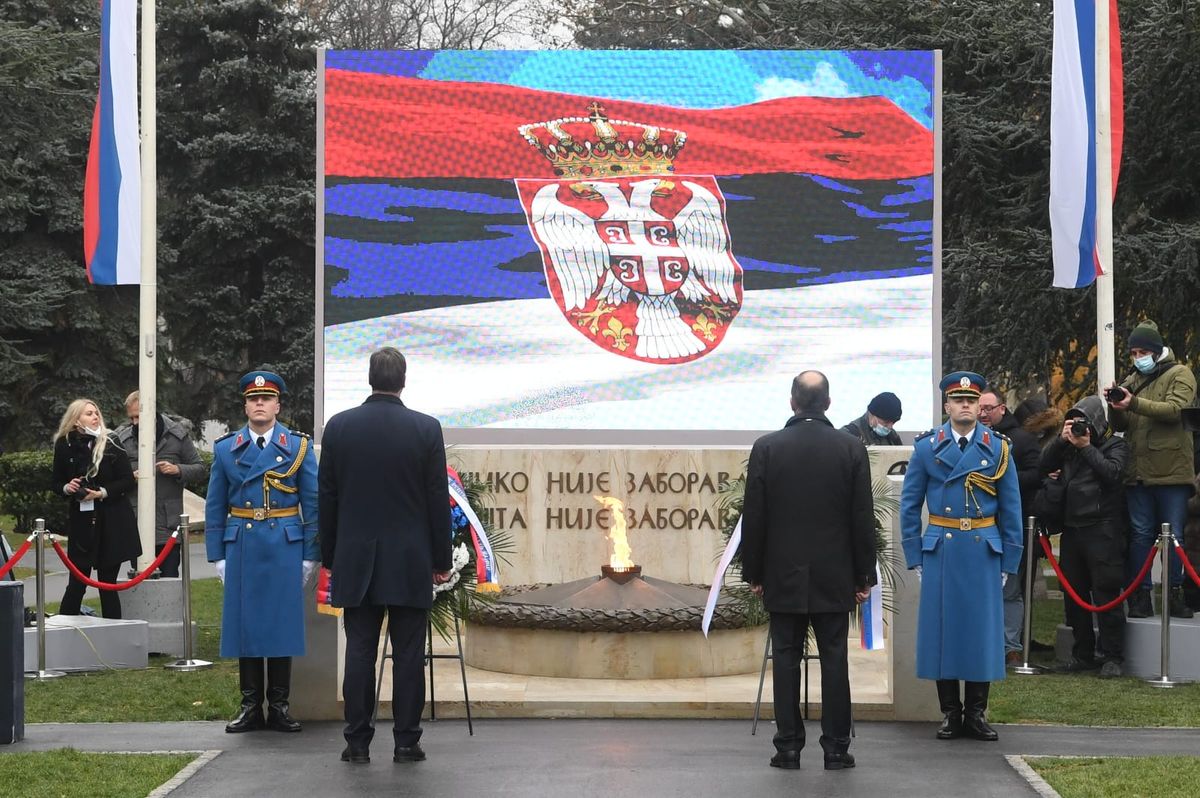 |
|
|
| Minister Selakovic: Russia is a strong political and economic partner of Serbia |
|
Ahead of today's visit by the Foreign Minister of the Russian Federation Sergey Lavrov, Minister of Foreign Affairs Nikola Selakovic said that Russia was a serious and strong political partner of Serbia and that all meetings with representatives of this state were an opportunity to demonstrate mutual significance of the relations between the two countries.
Minister Selakovic said for RTS that the relations with Russia were highly important for Serbia and that the discussions with the Russian Minister today in Belgrade will not only include political issues, but also railway, energy, military and technical cooperation, vaccines and combating the coronavirus, namely all matters in the mutual interest of the two countries.
The Minister recalled that it was planned that the Russian President Vladimir Putin pays a visit to Serbia in October this year, but that its realization was largely hindered by covid, while stressing his hope that this visit will be realized.
"I hope that this visit will take place and that President Putin will attend the great consecration of the church. No-one can tell when this will happen", Minister Selakovic said.
He recalled that foreign trade cooperation between Serbia and Russia in the previous year amounted to over three billion dollars, which is a historic high and a top figure as well as a demonstration of the seriousness, significance and closeness of the relations between the two countries.
Referring to the speculations that the Serbia-Russia relations have cooled down after the signing of the Washington agreement, Minister Selakovic noted that the individuals sending such messages are being inconsistent because at one point they level criticism because of good relations, having an issue with the fact that the Serbian President was awarded the Order of Alexander Nevsky, and then go on to say that the relations have cooled down.
Minister Selakovic said that the Russian Foreign Minister, a doyen of international diplomacy, will bring an Eternal Flame from the Tomb of the Unknown Soldier in Moscow to the Cemetery of Belgrade Liberators, as a symbol of brotherhood in arms and joint fight against the common enemies, Nazism and fascism.
He said that Minister Lavrov will meet with the Serbian President, President of the National Assembly, Foreign Minister, and that he will visit the Church of St. Sava - a modern symbol of cooperation, brotherhood and friendship between the two countries.
Minister Selakovic noted that Minister Lavrov will read out loud a letter by the Russian President at the St. Sava Church, lay flowers and light a candle at the tomb of Patriarch Irinej, during whose time "this temple was crowned".
Selakovic said that this was initiated by our Russian friends who assisted with the initial works on the mosaic, and that Serbia has managed to bring this to an end.
Source: Tanjug
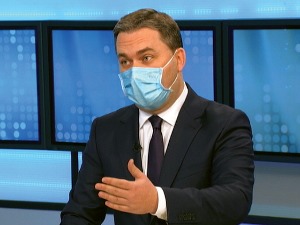
|
|
|
| STATEMENT BY THE MINISTRY OF FOREIGN AFFAIRS |
|
On the occasion of 10 December, the international Human Rights Day, the Ministry of Foreign Affairs of the Republic of Serbia reaffirms its commitment to the principles and values of the Universal Declaration of Human Rights, adopted on this day in 1948.
The principles enshrined in the Universal Declaration of Human Rights have been the foundation for the development of international law in this field, and of the international system for the promotion and protection of human rights, as a unique achievement of modern civilization. It is incumbent upon us today to safeguard and strengthen the international system ensuring respect for human rights, to develop human rights standards, control the implementation of commitments, and also to continue cooperating with international and regional institutions on the protection of human rights.
Serbia is fully committed to the universal values of human rights and implementing in practice the international legal instruments relating to human rights. Our continued cooperation with the Human Rights Council mechanisms in the framework of the United Nations, with the Council of Europe and the mechanisms of the OSCE human dimension, represents an important segment of activities carried out by all state authorities, thus demonstrating our consistent commitment to the implementation of international human rights standards.
The international Human Rights Day is an opportunity to point out once again that Serb and other non-Albanian population is being deprived of its rights in Kosovo and Metohija and to call again on the international community to ensure the respect for the guaranteed international human rights norms and contribute to creating conditions for the return of internally displaced persons and giving them back their usurped property.
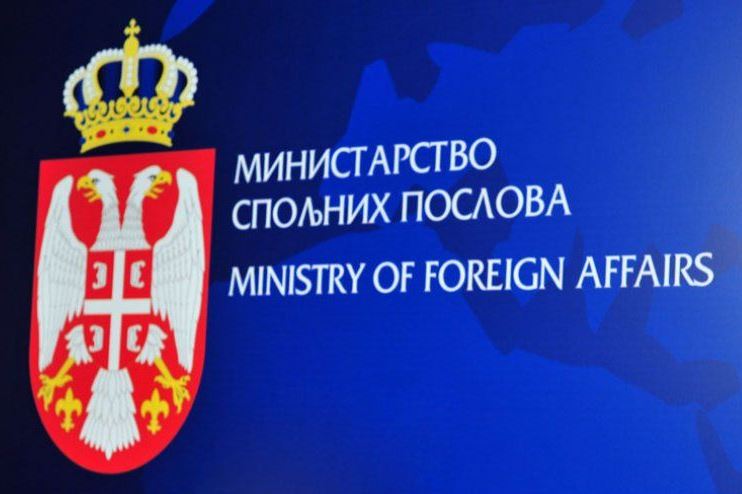 |
|
|
| President meets the ambassadors of the EU member states accredited to Serbia and the head of the European Union Delegation |
|
The President of the Republic of Serbia Aleksandar Vučić met today the ambassadors of EU Member States accredited to Serbia and the Head of the EU Delegation Sem Fabrizi in the Palace of Serbia, to talk to them about topics such as dynamics of the accession negotiations between Serbia and EU, stability in the region, regional projects, as well as the Economic and Investment Plan presented by the European Commission together with the Enlargement package. President Vučić once again confirmed that cooperation with the European Union and fully-fledged membership of Serbia remain one of the key foreign policy priorities of our country. He particularly emphasised that in this respect Serbia is honestly dedicated to further and deeper reforms, approaching them with responsibility and seriousness, and that it tries to adopt and apply the best practice through cooperation with institutions of the EU and its member states.
"Serbia will continue being dedicated to the promotion of peace and stability in the region, by improving bilateral relations with neighbours, and by strengthening regional cooperation while respecting all concluded agreements", President Vučić stated, adding that the European future of the Western Balkans is of utmost importance for both stability of the entire region and security and further prosperity of the EU.
Ambassadors pointed out that declarations on the common regional market and the Western Balkans green agenda, which were signed by Serbia and all leaders of the region, received a warm welcome in Brussels and EU Member Stated, and that good and solid connectivity and integration of the region largely facilitates the cooperation of the very Union with the Western Balkans in all areas of joint interest.
"As much as 70% of foreign investments come from the countries whose representatives are sitting here today", Head of the EU Delegation to Serbia Sem Fabrizi said, adding that Serbia can rest assured the EU will continue supporting and investing in the Serbian economy. While Covid-19 has put all economies under stress, Serbian economy has resisted and proved its resilience. With the Economic and Investment Plan for the Western Balkans, the EU will remain Serbia's strongest partner for economic recovery which will support infrastructures, green and digital transition. We welcome the announced reforms in the areas of rule of law, including judiciary reforms and media freedom. This is precisely the base for acceleration of the accession process and we encourage the new government to keep working and implementing in this direction", Fabrizi said.
President Vučić pointed out that Serbia highly appreciates that the EU, despite numerous challenges it is facing has managed to preserve the enlargement issue on its agenda, especially through the recent adoption of a new, changed methodology of the negotiation process.
"In this respect, we expect from the EU that Serbia's accession negotiation dynamics follows and values our reform efforts", President Vučić said pointing out that Serbia is ready to continue working with its European partners on implementation of the reforms and numerous joint projects.
President Vučić particularly noted that Serbia welcomes the Economic and investment plan presented by the EC together with the Enlargement package, and expressed our country's readiness to continue working with the partners in the region on the implementation of this Plan so as to improve the economic potential of the region and achieve better infrastructure connection, which would bring us closer to the single European market.
"In this context, we hope the Multiannual financial framework 2021-2027 will be adopted soon, because that will mean a possibility to use funds designed for reform implementation in Serbia and in the region", President Vučić said, reiterating that Serbia remains on its European path with an honest faith in cooperation with the European partners.
"2020 has been an extremely difficult year for all, especially the impact of COVID–19. When I look at new Government's commitment to implement reforms, the Economic and Investment Plan of the EU, the new methodology and increased cooperation to fight COVID-19, I see 2021 with a much more favourable perspective for progressing the enlargement", Fabrizi concluded. President Vučić also pointed out that Serbia is prepared to work intensively with the EU Member States on finding an adequate response to the new challenges, such as COVID-19 pandemic.
Belgrade, 8th December 2020
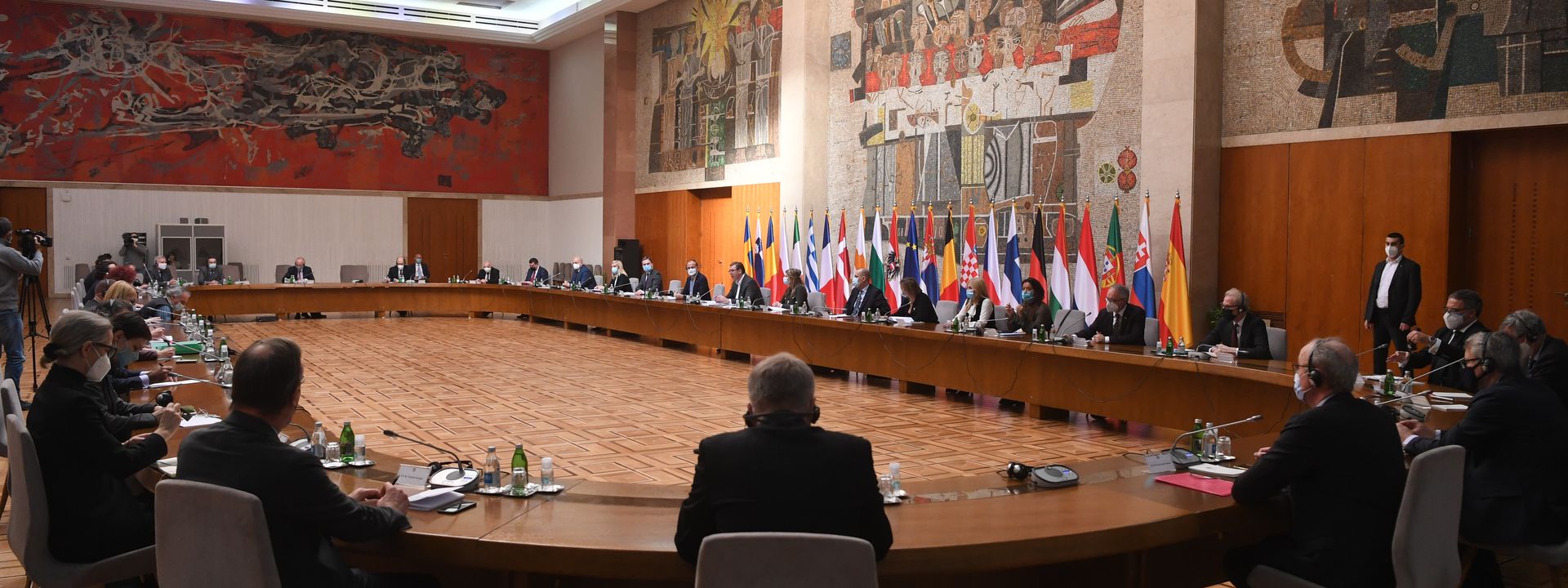 |
|
|
| DIGITAL CONTENTS - SERBIAN CULTURAL INSTITUTIONS 2020 |
|
In order to safer overcome the social situation due to COVID-19 epidemic, and to facilitate access to cultural contents to the citizens of Serbia, as well to users from other countries the Ministry of Culture and Media of the Republic of Serbia offered a large scale of programs of National Cultural Institutions available in digital format (virtual tours, digital audio and video materials, photos, texts, 3D scanned objects, etc.) in different languages.
The official site of Ministry of Cultural of Serbia:
Link
Culture and art - digital programmes 2020 (National institutions - Republic of Serbia)
Link
Serbian movies (disponible on-line / feature-length films / subtitle in english)
1. ''Next to me'' (''Pored mene'', 2015, drama, 110 minutes), Stevan Filipović
Link
2. ''Skinning'' (''Šišanje'', 2010, drama, 98 minutes), Stevan Filipović
Link
3. ''Sheitans Warrior'' (''Šejtanov ratnik'', 2006, fantastic comedy, 94 minutes), Stevan Filipović
Link |
|
|
|
|
|